You're currently viewing a custom sorting.

Star Trek Voy - 5x12 - Bride of Chaotica!
Originally Aired: 1999-1-27
Synopsis:
Janeway and Paris must defeat Doctor Chaotica. [DVD]
Problems
None
Factoids
- This episode features a rare mention of a bathroom on a starship.
Remarkable Scenes
- Neelix mentioning that only 4 bathrooms and 3 sonic showers are operational.
- Tom: "Satan's robot." Tuvok: "Naturally."
- Tom: "Intercepted communications between Doctor Chaotica and Arachnia. Stop. Chaotica at war with aliens from 5th dimension. Stop. Must strike now to disable death ray." Tuvok: "Stop. Please summarize the message."
- Tuvok and Tom meeting the photonic alien. I like how he said "all life is photonic" and that Tuvok and Paris didn't register on his instruments and must therefore be the simulation.
- Janeway: "Let me get this straight. Transdimensional aliens have mistaken your Captain Proton simulation for reality." Tom: "Yes ma'am." Janeway: "And now an armed conflict has broken out between these aliens and Chaotica's holographic army." Tom: "Yes ma'am. His army of evil."
- Janeway being nominated to play Arachnia.
- Tom instructing Janeway on how to best fit into her role: "It helps to say things like: 'The clever fiendishness of your evil plan is brilliant!'"
- The doctor masquerading as the "president of Earth."
My Review
A great humor episode, it was especially fun to watch the various crew's reactions to witnessing elements of the Captain Proton simulation out of context. This episode was meant in many ways to be a parody of Star Trek. Tom is "researching" how ancient humans viewed the future. And they didn't get it quite right. The same may very well happen to us. Additionally, Tom impresses Tuvok with his technobabble, an allusion to Star Trek, Harry wonders why the Planet X set is identical to the Mines of Mercury set, another allusion to Star Trek, and so on. Aside from the general parody, this episode makes me really wish we'd seen more of Bashir's holosuite programs on DS9. I would have liked to have seen Bashir and O'Brien at the Alamo, or at the Battle of Britain. And if it was half as fun as this episode was, it would have been amazing.

Originally Aired: 1999-2-10
Synopsis:
All the crew's dreams seem to come true. [DVD]
Problems
None
Factoids
- We get to see Tuvok's wife in this episode.
- The ship eating creature is over 2,000 kilometers in diameter. The largest Seven of Nine has ever seen. The doctor estimates that the life form is at least 200,000 years old.
Remarkable Scenes
- Naomi, bored with her away mission on the Delta Flyer: "Can't we make first contact with somebody or get in a space battle?" Tom, playing along: "Yeah, can't we?" Seven: "Another time, perhaps."
- Seven regarding the supposed wormhole: "The odds of finding such an anomaly are infinitesimal."
- Seven of Nine's very quick hackjob allowing her access to Janeway's personal logs.
- Seven of Nine enlisting Naomi's support in her little insurrection.
- Seven of Nine beaming into Engineering and shooting everybody.
- Naomi walking into a forcefield.
- Seven of Nine's initial discussion with Qatai after they entered the creature.
- The doctor: "Please state the nature of the medical emergency." Qatai: "Your ship is being devoured. I'd say that's an emergency."
- The doctor: "This is a sickbay, not an arsenal." Not exact, but I'll count it. Count 30 for "I'm a doctor, not a (blah)" style lines, which McCoy was famous for.
- The doctor: "I'm a doctor, not a dragonslayer." Count 31 for "I'm a doctor, not a (blah)" style lines, which McCoy was famous for.
- The final scene depicting Qatai flying back into the creature again. Go captain Ahab go!
My Review
A rehash of TNG: The Game. No, really, a complete rehash. Replace Wesley with Seven of Nine, Robin with Naomi, and Data with the doctor and there you go! Except that this version is greatly improved. We do have an additional good guy to add to the plot, the local "dragonslayer." He was a cool character, I liked most the doctor's interactions with him. It's definitely appropriate that a man may become obsessed with hunting Moby Dick style this enormous space "monster", as Naomi put it. Also different from TNG: The Game is instead of brainwashing through pleasure and addiction, the "space monster" uses elaborate telepathy to make the crew of a ship "see exactly what they want to see" thereby making them let down their guard. Ultimately the ending is pretty predictable, obviously they were going to find a way out of the creature. But I liked the way Seven of Nine, Naomi, the doctor, and Qatai went about doing it. The four characters had nice chemistry. Naomi was especially useful, which is rare, and her child's perspective added quite a bit to the plot. I also liked the subtle twist at the end. The teaser depicted Qatai entering the space creature, intent on killing it when in fact it was deceiving him. The final scene depicted the very same thing. The space creature was probably tricking him again...
The following are comments submitted by my readers.
- From McCoy on 2017-09-18 at 3:13pm:
Qatai was indeed a great character. I would like to see him joining the crew. But that would be a bit out of character for him. Ahab must hunt the whale... I really liked the last scene with him. - From J B on 2021-06-03 at 11:18pm:
Finally, a good episode after a run of many in a row that I found unpalatable. I think the framing of this episode, bookended with those scenes of Qatai-as-Ahab, is what makes it land so solidly.
Early on, I also noted similarities to TNG: The Game, but for me the similarities ended when the crew became incapacitated. From there it became its own episode. Best of S5 so far.

Star Trek Voy - 5x22 - Someone to Watch Over Me
Originally Aired: 1999-4-28
Synopsis:
The Doctor takes an interest in Seven. [DVD]
Problems
None
Factoids
- There are 146 crewmembers aboard Voyager according to Neelix.
- Voyager was designed for long range deep space exploration according to Neelix.
- According to the doctor, species 8472 may have as many as 5 sexes...
Remarkable Scenes
- Torres discovering that Seven of Nine is following her and Tom.
- Torres: "How the hell do you know when we're having intimate relations?" Seven: "There is no one on deck nine, section twelve who doesn't know when you're having intimate relations."
- Torres: "Borg provokes Klingon. Klingon breaks Borg's nose."
- Janeway: "This is a starship, not a nature preserve." Not exact, but I'll count it. Count 31 for "I'm a doctor, not a (blah)" style lines, which McCoy was famous for.
- The doctor: "They say gossip travels faster than warp speed."
- The doctor: "You're a woman, Seven." Seven: "Is that an observation or a diagnosis?"
- The doctor's silly slideshow.
- Seven of Nine attempting poorly to get a holographic date.
- Tom making a bet with the doctor.
- The doctor: "Seven, has anyone ever told you you have have a beautiful voice? It's a true gift!" Seven: "The gift is from the Collective. A vocal subprocessor designed to facilitate the sonic interface for Borg transponders."
- Seven of Nine's "flawless" singing, along with the duet.
- Harry discussing Seven of Nine's date candidate selection.
- Seven of Nine asking out Chapman.
- Seven of Nine's behavior on the date.
- Seven of Nine tearing a ligament in Chapman's arm.
- The drunken ambassador.
My Review
This episode is original and a nice change of pace. Neelix' role with the alien ambassador is a lot like the Enterprise crew's roles with the alien ambassadors in TNG: Liaisons (especially Troi's ambassador), which is certainly a compliment. But Seven of Nine steals the show. I don't know whether her attempts to start dating are embarrassing or hilarious to watch, maybe a little of both. The episode is almost tragic, as the doctor desires a relationship with Seven, but is unable to bring himself to ask her out. Maybe he felt it would be a conflict of interest, or maybe he feels more content in a fatherly role than as a lover. In any case, the mingling of the two plot threads worked extremely well and ended up being one of Voyager's surprisingly better episodes. I like being pleasantly surprised.
The following are comments submitted by my readers.
- From Rob UK on 2013-10-26 at 11:08am:
I enjoy this episode for the quirky backdoor feelings and insight you get into the crew and life onboard, the confrontation about hearing the intimate relations was great, being on a starship in the future is like living in a tower block in modern day, i could do a nature reserve study on any one of my neighbors with great accuracy.
The key swing comedy factor for me is the doctors slideshow
"Here we see how fortress ovum is besieged by countless little warriors" with all the arm movements and hand gestures is a classic.
- From thaibites on 2015-02-14 at 12:56am:
Another horrendous soap opera episode that gets an 8 rating from HRM Eric Newport. Are you people all gay? Unbelievable... - From parkbench on 2016-02-12 at 9:54am:
well, a truly mediocre episode with lackluster pacing and based purely on the novelty of seeing the characters in a banal situation. but rather than explore this in any profound way or use it to get behind some of the themes of voyager, we get more voyager aimless meandering--another crappy love interest episode that star trek is famous for, recycling a hundred stereotypes a minute and wielding them all in the least-thought out, least creative and safest character on the show--seven of nine, unfortunately little more than eye-candy in most of the episodes. it's like they felt bad for having janeway for the first few seasons and had to pander even more than they usually do. so embarrassing.
apparently the writing for this one was so bad that it caused the above commenter to lower several grades of intelligence and equate mediocrity with emotions, and emotions with gay people. the discovery of the century, no doubt. i fear for this (no doubt) man, anyone who must care for him, and whatever offspring he may one day produce. be on the lookout for profound moments like this one. oh, i'm gay, by the way.
anyway, back to seven. really i can't stand most episodes about her, because they read like poor imitations of Data episodes, and even some of those aren't that amazing! i found myself compelled to skip at the beginning and now wish i had.

Star Trek Voy - 6x01 - Equinox, Part II
Originally Aired: 1999-9-22
Synopsis:
A renegade starship causes problems for Voyager. [DVD]
Problems
- How can the Ankari only be 50 light years from Voyager when Ransom has traveled in excess 10,000 light years on the nucleogenic aliens since he first met them? Do they use the nucleogenic aliens to travel too? ;)
Factoids
None
Remarkable Scenes
- Ransom: "You know, Janeway's not the only captain who can help you explore your humanity." Seven: "You would be an inferior role model."
- The evil Voyager EMH singing as he extracts information from Seven of Nine.
- Voyager locating and battling the Equinox.
- Janeway interrogating Lessing.
- Chakotay saving Lessing.
- Janeway negotiating with the nucleogenic aliens.
- The evil Voyager EMH making Seven of Nine sing.
- Burke regarding Ransom's decision to surrender: "Rudy, with all due respect, have you lost your mind?"
- Burke taking over the Equinox.
- Voyager's second battle with the Equinox.
- The Voyager EMH deleting the Equinox EMH.
- Ransom undermining Burke's efforts, letting the aliens destroy his ship.
- Burke's foolish attempt to make it to the shuttle bay.
- Ransom going down with his ship.
My Review
Well, it seems my predictions all came true. Nobody important died in the cliffhanger and Janeway tracked down the Equinox and destroyed it. The second part even managed to make another fairly serious distance / speed mistake documented in the problems section. That said though, the second part is a a lot better than the first. Janeway becomes Captain Ahab hunting her Ransom and she starts to let her ethics slip, ironically all in the name of protecting ethical behavior. There's a method to her madness though. She's angry that Ransom and his crew are murdering the nucleogenic aliens and she's willing to make sure they pay for their crimes at any cost. Janeway was most certainly in "the ends justify the means" mode here. To her, stopping the killing and salvaging relations with these aliens was more important to than the Equinox crew's lives. This of course breeds a nice level of conflict between Chakotay and Janeway. And the various space battles in the episode were quite spectacular. In the end, it's fitting that Ransom finally realizes he'd made a critical mistake and decides to go down with his ship. I liked the look of forgiveness in Janeway's eyes when Ransom was about to meet his end.
The following are comments submitted by my readers.
- From Pete Miller on 2006-12-24 at 2:21am:
I thought that Janeway was really off base in this episode. She has always been something of a hypocrite, but it's really clear here. She will lecture Ransom about being ethical, and then try to execute a fellow officer. She seemed to be insane with revenge, even surpassing Sisko's obsession with Eddington. It's damn scary that she was allowed to continue in command of the ship, despite constant objections from her first and second officers regarding ethics and tactical decisions. She absolutely should have been relieved of duty, not Chakotay.
This leads me to another point about Voyager that I'll keep brief. The structure and order aboard Voyager is pathetic. Janeway regularly has loud arguments with Chakotay, as well as other crewmembers, on the bridge. She NEVER listens to anyone, even (especially) if they are right. The first officer is a really weak person, and just shuts up when he is overruled. (Point in case this episode when Chakotay just goes to his room like he's been bad) Can you imagine Picard and Riker screaming at each other on the bridge, or Picard ranting to Worf loudly while they both walk out of the ready room? Of course not.
Bottom Line: Janeway is a terrible captain. The worst. I'm sorry to all her fans out there, but she's irrational, impulsive, vengeful, and spiteful. - From Bernard on 2010-03-29 at 9:58pm:
Just been revisiting some of my favourite episodes of voyager, which isn't many, but anyway.
Just a couple of comments on this episode:
The two parter as a whole is very good. Unfortunately, and as per usual for Voyager as a whole, there are missed opportunities. I love the clash in styles between the two ships, I love seeing a ship that has been in the delta quadrant and under constant threat. The Equinox has obviously suffered major losses and damage, very realistic. I liked the plot in general, Janeway has to stop the renegade captain.
What I don't like is how the Equinox crew are all written to be psychopaths. Why did they have to polarise the episode like that? If the lines had been made more blurry they could even have written some voyager crew as having sympathy with the Equinox crew thus creating tension between Janeway and crew. Also they could have created some sympathy for the Equinox crew from the viewer, making the inevitable ending all the more effective.
I also dislike how Janeway is written for the second part of this two-parter. I agree with all of the points made by Pete. She is out of character, even for Janeway, and it seems ridiculous that Chakotay ends up relieved of duty! - From Steve Mohns on 2012-08-23 at 4:12am:
Agreed with the above comments. I was thinking after watching this show again, that the person who should have mutinied was Kate Mulgrew when she saw the script. After 5 seasons she should have known the character and the series well enough to recognize that this was out of character and a good way to ruin the legacy of her version of a Starship captain. The basic Captain Ahab idea of the writers was a good one. We saw it with Picard in "Star Trek: First Contact". We saw it with Kirk in "Obsession". And we saw it with Archer in the Xindi arc. In each of these cases the personal conflict that shaped the actions of those captains was a good one, and the way they responded was believable. All were well executed. But the writers did a poor job on both counts for Janeway and diminished her character in the process. And Chakotay says that mutinying would have been crossing the line? Hardly, with the behaviour she showed. Bones would have relieved her from duty in a nanosecond. Spock or Riker would have hesitated to mutiny out of Star Fleet duty. Archer or Picard would have had her in the brig to stay, and she never have been trusted again.
Entertaining episode, but a major flaw. - From Jem 5x5 on 2013-10-13 at 10:52pm:
Just watched this episode on a first-time run through Voyager, and I genuinely thought Janeway must have been somehow possessed by the alien that knocked her over at the start of he episode, she was so wildly out of character. - From Hugo on 2015-02-18 at 2:23pm:
I hope we will see some of the adopted Equinox crew in the future! I thought Marla (the engineer) seemed like an interesting character.
Wasn't it odd that there were only humans on Equinox btw? - From parkbench on 2016-02-23 at 10:56am:
i was just so absolutely happy with this two-parter. i wish every voyager episode was like this.
i wish they did story arcs, or something like this kind of character depth, transformation, fragility. so many twists and unexpected turns--not in anything "dangerous", as site author mentioned (obviously Janeway was never going to be in danger)--but how the different alignments of good/evil played out, with ransom coming round in the end.
i also appreciated it because it respected the intelligence of the viewer--rather than bluntly hitting us over the head with janeway going a little bonkers you see it happening slowly--and while chakotay vocalises it, other characters make noted faces or brief objections but the point is not belabored. a lot is left to the imagination which is good; there are no gratuitous scenes of people debating how far gone the captain is--still leaving it, in a sense, up in the air, though by that time i was with chakotay.
and that's perhaps the greatest thing about this two-parter: it's the first time in...almost ever (with a voyager episode at least) that i felt like they truly presented the idea of principles vs. a slippery slope and it wasn't cheap or dull.
finally we see what the consequences of just choosing expediency are, not merely because we should "believe" it's wrong (the unfortunately milquetoat conclusion of many lesser ST episodes across all series), but because you can see it qualitatively produces different results.
everything janeway was doing as she was "becoming" ransom could be seen to deteriorate everything: strategy, morale, consistency, ethics itself--and this way the moral quandary, unlike most episodes, is actually way more polarising and tense. it's not just a vague "let's turn the other cheek and not hurt our enemies" plot, but actually mixed and compelling arguments for either approach (though i still am firmly w chakotay), in that you can see that the situation tactically can appear to call for a set of steps that, though logical, are very harmful in the long run.
these are how real-life situations, and real-life violence is. it is very layered and complex. it often deteriorates into bloated, festering situations that go way beyond their original scope and launch a sort of dragnet drawing all kinds of people into its maw that have varying levels of agency and responsibility, as well as being coerced into it. and rather than that all of that being a reason to just abjure responsibility and try to pretend that everyone is right, or that everyone's wrong in some kind of simplistic relativism (because ultimately, action needs to be taken)...we get an episode that tells the hardest story of all: that in the DEPTHS of these moments, in the very hardest of them, is when we must STILL center ourselves, even more than usual, b/c your moral center can get away with you in a blink of an eye, and it will not be dramatic: it will be gradual, until it's sudden. if you catch my drift.
in real-life genocides, massacres, mass sterilisation programs, ethnic cleansing projects, violent statecraft, you name it--this is the dilemma. there is such a complex set of decisions and procedures to arrive at the result--millions of dead beings--that it is impossible for any one person to execute. it requires the consent of and infiltration of massive social structures, which also implies culpability for more than just the "leader". the whole scenario itself becomes a toxic lake baptisiing its swimmers with an unholy burden--enough ethical dilemmas to last a life time, and if one does not take a stand, look for an alternate route, and potentially even face death (a scary thought indeed), one inevitably ends up part of it. the platitudes about german society being partner to the shoah would come right about here.
and on that note, as i have no doubt said before in a million places and on this very site, i will always come back to hannah arendt's "the banality of evil", and say that this is precisely the scary thing: that the question of evil is not one of supervillains, but of its being actually quite banal--something that can appear so simple, and often executed by seemingly "normal" people, that it escapes us if we always think about the Big Bad and not the true evil that permeates the systems that surround us, affecting everyone and leaving no-one untouched.
this is why i don't think janeway was 'out of character', as some people mentioned. if you look carefully, you can see that beneath the cool exterior there is an inner seriousness and sort of uncompromising passion that drives her to do her "job"--even in a situation where there is (potentially) no federation to do a job for. like most people in high places, she is a mix of intelligent (in a calculating sense) and ruthlessly ambitious, not merely a "nice person" who knows how to run a
bureaucracy, but somebody who had to work incessantly and no doubt beat out other people for her position--such are top-down military hierarchies. and most high-ranking jobs require a certain kind of total sacrifice of the person to the job itself, an insane thing to ask of a person but also why it is so easy to lose yourself and be corrupted in such roles. even if we imagine a rich CEO vacationing and enjoying all their life at a level of luxury almost no one experiences--as in, "how could this be sacrifice?"--you are still losing a piece of your soul, since it is this very luxury that provides the direct incentive to blithely make horrifying, oppressive decisions on the daily (remember that worldwide colonialism almost always began as a business venture, the most famous case being the east india trading company).
the fact the we haven't seen more of this side of her is actually the weirder part. seeing her inner passion, obsession with the federation ideal & image--the only thing she has LEFT in this land far away from her home--totally makes sense to me, and again, when people break, they are not usually "the joker". they break and they act increasingly off until you don't recognise them anymore--and her stubbornness only made me enjoy this more. because frustrating as it was, rather than capitulate to chakotay, she truly had tunnel vision until it was over. and if you've ever gotten yourself into a rut and lost yourself, well...that tunnel vision is real. and it's f'ed up. i do wish she had repented a little more at the end. but at least they sort of tease it out.
now i can only hope--though i doubt--that this sets up the 'maquis dynamic' we always wanted for voyager, with the theme of these new crew members integrating into the crew and janeway's dance with the devil, the other side of the line that marks the prime directive. my god, that would be amazing; halfway through pt. 2 i even imagined a battlestar reboot-style season where they chase the equinox onto that planet and crash land there, leading to a whole season where they have to figure out how to survive on this planet as they repair voyager and interact begrudgingly with the survivors of the other crew, also showing how janeway's heedlessness lead to real consequences--a la bg on caprica...and yes, i clearly am a noob for having seen BG and not voyager first :P.
now THAT would've been brave. but we know that that's not what voyager's about...at least, unless it's about to surprise me...
thanks to kethinov for giving us over-thinkers an outlet for our grey matter. - From McCoy on 2017-10-09 at 4:40pm:
I see a problem with The Doctor. Two things: Why he didn't completed his surgery on Seven's brain? He had enough time to turn her into vegetable.
And second, far more important - just when exactly his ethical subroutines were activated again? On Eqinox he was evil, then after beaming on Voyager boom, and he's good again? Why?
I was thinking all the time, he's just faking his psychopatic behavior, because he evolved so much, he doesn't need ethical subroutines to act ethically (I was even thinking he uploaded Seven's image into Ransoms "vids" to influence him). Just like human brain can sometimes take over functions of his damaged part - Doctors program could do the same. But well, it's not the case. A bit of wasted opportunity. - From Mike J on 2023-11-13 at 11:56pm:
A lot of fair criticisms of Janeway in this episode. One comment above compares this with Kirk, Picard, and Archer in their various "Captain Ahab" moments. And I think someone else added Sisko with Michael Eddington.
The difference between all of those, and this, comes down to writing and acting. Neither Mulgrew nor the writers sold me on the idea that Janeway was consumed by revenge. I got the impression she was just intentionally being stubborn about pursuing Ransom with no real emotional or logical reason for doing so, because that's what was in the script. And I have to say, Beltran didn't sell me on the protesting First Officer role, either. To me, this two-parter illustrates one of the main problems with Voyager: bad acting.
Now, Mulgrew and Beltran are both talented actors, and there are plenty of fantastic Janeway and Chakotay moments in this series. But it wasn't consistent. I feel like there were often breakdowns between the writers and the actors on Voyager, and comments by Robert Beltran in the years since Voyager went off the air convince me that's true, as well as Garrett Wang and a couple others. I think some of the other cast members had frustrations about how their characters were being written.
In any case, this was an exciting two-parter. I also feel like Equinox gave us an example of how things might've turned out for Voyager. As the webmaster said, we rarely got the sense that Voyager was in dire straights during their long journey across the galaxy; Equinox, on the other hand, reflects a formerly noble Starfleet crew that has been reduced to a desperate rabble living on the edge of privation. It was an astonishing contrast that I wish had been more thoroughly explored.

Star Trek Voy - 6x02 - Survival Instinct
Originally Aired: 1999-9-29
Synopsis:
Seven is confronted with her past. [DVD]
Problems
None
Factoids
- Borg species designation: 521, Shivolian.
- Borg species designation: 571, name unknown. Humanoid. They worship Brothera.
Remarkable Scenes
- The sight of the trading outpost and all the people aboard Voyager.
- Seven's flashbacks.
- The former Borg attacking Seven.
- The flashback depicting the crashed drones beginning to regain their memories.
- I like the scene when Tom and Harry get into trouble for getting into a fight.
- The revelation that Seven was responsible for linking the drones together.
- Chakotay arguing to Seven for fleeting freedom while the doctor argues for survival.
- The different reactions of each of the three drones once they were freed of their neural link.
My Review
A great episode exploring both the psychology of the Borg Collective as well as the psychology of Seven of Nine. The three former drones in this episode give a wonderful performance playing mentally tortured pseudo individuals. And the ethical issue of whether a month of freedom is better than a life of slavery was well presented. Additionally, I enjoyed the connection between this episode and Voy: One. In that episode, Seven stated that she'd once been separated from the Collective. It's very possible she may have been referring to the events described in this episode. A nice bit of continuity.
The following are comments submitted by my readers.
- From badure on 2011-12-15 at 7:02am:
I actually thought this was easily the best psychological exploration of the Borg in all of Star Trek (much better than TNG's I Borg), and one of the best Seven of Nine episodes in all of Voyager.
The triad's description of what it was like to be intimately and perpetually linked to two others was fascinating and quite compelling.
Basically, by "scaling down" the notion of belonging to a collective intelligence, reducing it down to just a group of three, effectively demonstrates what its really like to be sentient but not fully differentiated...no other episode gets this across as well as this one.
There are other redeeming features in the episode, but that's the main one, and a very important feat. I gave it a 10.

Star Trek Voy - 6x12 - Blink of an Eye
Originally Aired: 2000-1-19
Synopsis:
Voyager encounters a strange new world. [DVD]
Problems
- Why doesn't Voyager send sped up messages to the planet so that they can communicate with them?
Factoids
- This episode is quite similar in both name and plot to TOS: Wink of an Eye.
- Seven said: "For each second that goes by on Voyager, nearly a day goes by on the planet."
Remarkable Scenes
- Tom: "That's one planet that never showed up on the multiple choice exam."
- Chakotay: "A few hours? We might miss the rise and fall of a civilization." Torres: "So we'll watch the next one."
- The doctor: "What if they're big purple blobs of protoplasm?" Janeway: "Then you'll be the best looking blob on the planet."
- The doctor's three second away mission, the return failure, and the subsequent scramble to get him back before too much time had passed.
- Naomi regarding the name of her report: "How does this sound? The weird planet where time moves very fast and so do the people who live there, by Naomi Wildman." Seven: "Your title is... verbose. I suggest you try to condense it." Naomi: "The weird planet." Seven: "Better. But it lacks precision. The weird planet displaced in time?" Naomi: "Perfect."
- The first alien space vehicle approaching to and docking with Voyager.
- The aliens collapsing on the bridge and transitioning into Voyager's timeframe.
- The attack on Voyager.
- The aliens making first contact in advanced space ships, pulling Voyager out of orbit of their planet.
My Review
Add this species to the list I hope we see again, like the Voth. This episode was excellent in many ways. First, it's important to point out that the very premise of the episode is fascinating. An extremely fast rotating planet, affected by spatial anomalies on which time moves extremely fast. Truly science fiction at its best. Second, the idea to place a civilization on this planet may have been a little convenient, but it's exploited well. Chakotay's admittedly brief anthropological enthusiasm works much better in this episode than in Voy: One Small Step, and the implications of watching this entire civilization evolve are both enormous and fun to watch. Finally, another nice detail is that Voyager stays true to the Prime Directive all throughout. I enjoyed the fact that the interaction between Voyager and the planet was initiated by the aliens, not by Voyager. Overall the episode was well above average.
The following are comments submitted by my readers.
- From TheAnt on 2013-10-09 at 9:54am:
This is one of the very best Voyager episodes, and that on several levels.
One good touch is that we get to experience the development and speculation of the alien race on the nature of Voyager.
And we are presented with a good idea that provides a sense of wonder.
(Though not completely original, the compressed time theme have been used in at least one novel about life on one neutron star, and this is also to some part reminiscent of "Mission of Gravity" by Harry 'Hal' Clement.)
The problem I see is why the visiting astronauts would be slowed down as much as they are unable to communicate with their mission control. Yet get to see the crew of Voyager frozen to statues?
But it provide with some cool scenes so I can let that detail pass.
Full score and a must see IMO. - From Fic on 2014-02-16 at 10:41am:
I absolutely loved this episode. However, I'm surprised that a rather sizable problem hasn't been picked up.
I'm not sure if the time rate differential is quite consistent throughout the episode.
If one second is nearly a day as Seven points out, then surely a few hours wouldn't represent the "rise and fall of a civilization" as Chakotay says... a few hours would be equal a similar number of decades! Above all: how much time in Earth years would have passed between the primitive civilization we encounter at the start of the episode, and the highly advanced civilization who tug Voyager free? 3000? 4000? Let's say the former - on Voyager, this would correspond to two weeks. Were they really stuck in orbit that long? I guess one could check stardates and all, but my impression was that they were there for a couple of days. The only way to explain this away is to state that the development of the civilization was hugely accelerated by Voyager's presence, such that they went through millennia of Earth's development in several centuries. Possible, but it would have been nice to clarify.
Of course, this doesn't detract from the fact that the episode is one of the Voyager episodes that will stick with me - in fact, on my recent revisitation of the series, I was eagerly awaiting "The weird planet displaced in time"... ;-)
To sum it up, it's a 9 for me. - From Mike on 2017-06-04 at 2:16am:
I agree this is fantastic science fiction. This is Voyager's Darmok: an encounter with a unique species (or rather, their unique world) that is difficult to make contact with but ultimately efforts are successful.
The episode is fascinating on many levels. The rapidly rotating world was amazing to see. The progress of a civilization, and how Voyager was perceived at different stages of that progress, was also remarkably shown in such a short time. I also liked the episode's showing how cultural taboos are formed, in this case a taboo developed around the eating of "fire fruit" as a result of Voyager's arrival and the tremors coinciding with an offering containing fire fruits. And like you say the idea of having the inhabitants make contact with Voyager, initially out of sync, was a very nice twist.
In response to Fic: if we assume Voyager is using Earth measurements of time in its conversion, then one "Earth day" seems to be approximately 250 years. That is enough time for a civilization to rise and fall as we've had many in our history that didn't last that long. So Chakotay's assessment is possible.
As for the other point, I think the episode drops a few hints agreeing with your reasoning as to why the species goes from Stone Age to warp-capable in a few centuries. The desire to signal, contact, and eventually reach Voyager has been their collective focus for generations. It fueled their progress. When Voyager is under attack, Chakotay says that they've done enough damage to the inhabitants over the last thousand years. Even if he's using that figuratively, it implies that Voyager has been in orbit for 3 or 4 days. That seems about right. - From McCoy on 2017-10-17 at 2:58pm:
Great fiction, but terrible science. I admit, this episode is enjoyable but only if you switch your brain in offline mode:)
If the planet rotates so fast - what with day/night cycle on the surface? And how the planet orbits sun? Fast too? Or normal?
Plus Voyager arrives in stone age - too convenient:) And we suppose to believe this planet just exist in space from eons of normal time and life is evolving now? They should have warp capable civilization before Mars lost his atmosphere:) - From Axel on 2018-06-08 at 10:32pm:
DOCTOR: "He was my...son."
GOTANA-RETZ: "But you're a hologram"
DOCTOR: "It's a long story. He's dead by now. But perhaps you could discover what happened to him. Maybe he had children, or grandchildren, if you could tell them..."
JANEWAY: "Janeway to Doctor. I hate to ruin a touching moment, but may I remind you WE ARE UNDER ATTACK by anti-matter torpedoes! Shut up and let that guy get back to the planet!!!"
Anyway, I don't think there are as many problems with this as pointed out. It would still have a day-night cycle if it rotates; the speed wouldn't be perceptible to the inhabitants any more than our relatively fast rotation is perceptible to us. Its revolutions around its star aren't mentioned, and don't need to be. The time difference was already explained: Voyager's only been in orbit a few days which is centuries on the planet. Finally, the planet might've had other civilizations that rose and fell, as Torres and Chakotay imply at one point. I don't think you have to shut your brain off to enjoy this. You just have to keep in mind that it's sci-fi. - From jtax on 2022-02-18 at 8:25pm:
Janeway: "I'm beaming you down there for three seconds, Doctor. THat's almost two days in their timeframe. Gather seismic charts, meteorological records, whatever you can..."
I'm just trying to imagine gathering that kind of stuff in two days. I know he ends up being there a lot longer, but...what do they expect him to do? Walk into the nearest weather station or research lab and say, "hey, you guys know where I can score some charts or seismic data? I need as much as you can give me, and I'd really appreciate it if you didn't ask me any questions at all about why I need it..."
I also love B'Elanna verbally counting out the three seconds. Sometimes, you just don't need to get all high-tech to get the job done.
I agree though, great episode. One of Voyager's better ones. The series ages well because you can watch the good ones and skip over the bad.

Star Trek Voy - 7x02 - Imperfection
Originally Aired: 2000-10-11
Synopsis:
Seven suffers a breakdown. [DVD]
Problems
None
Factoids
- Janeway is shot during transport and is not hurt.
- This episode was meant to be set after Voy: Drive, but the air date order was changed.
Remarkable Scenes
- Mezoti, Azan, and Rebi departing.
- Icheb expressing interest in joining Starfleet.
- Tom pointing out that the last time she took the Delta Flyer it ended up being destroyed. :)
- Janeway extracting a cortical node from a dead Borg in a Borg debris field.
- The Delta Flyer battling the alien scavengers.
- The doctor's surgery simulation.
- Seven discussing with Torres afterlife.
- Icheb disconnecting his cortical node himself so as to force the doctor to give it to Seven.
- Seven: "This debate is pointless, I won't accept the node." Icheb: "And I won't keep it." The doctor: "Someone had better use the damn thing! If it stays disconnected much longer it won't do either of you any good."
- The surgery.
My Review
Out of left field, we're shown a wonderful episode. It has all the components necessary for a good Star Trek episode. A contention, namely Seven's illness, putting her in danger. An attempt to save her that doesn't go so well, namely stealing a cortical node from a dead drone. A decent helping of action, namely the aliens who attacked the Delta Flyer at the Borg debris field. And finally a genuine moral issue concerning Icheb's radical solution to Seven's problem. I liked how mature and grown up Icheb has become and how logical his plan is. Most of all, I loved how he forced this plan upon everyone in order to save Seven's life when he realized he would fail to convince anyone. The ends justified his means, and Seven has grown much closer to Icheb as a result. Maybe our Borg action thriller that was last episode wasn't so great, but the drama in this episode is top notch.
The following are comments submitted by my readers.
- From Tony on 2008-09-04 at 11:03pm:
A brilliant episode except for one thing: I'd like to either have the aliens in the debris field play a larger part in the story, or have them removed entirely. As is, they seem rather random, almost like the writer(s) said, "Hey, we need some action to fill this part, let's add some hostile aliens." Provided, it would seem odd not including and implant stealing scene, and it would be a dull suene if they just took the implant and left, but I feel that they could have done better. Otherwise a great episode. - From McCoy on 2017-10-29 at 7:48am:
I think my ocular implant was malfunctioning while watching this. 10/10.

Star Trek Voy - 7x07 - Body and Soul
Originally Aired: 2000-11-15
Synopsis:
The Doctor experiences actual human senses. [DVD]
Problems
None
Factoids
- According to Tuvok, the Vulcan libido increases with time.
Remarkable Scenes
- Seven's decidedly odd behavior once the Flyer was boarded.
- The doctor in total control of Seven's body.
- The doctor smelling Harry.
- The doctor enjoying eating.
- The cheesecake scene.
- The drunken Seven/doctor.
- The doctor as Seven: "It wasn't not my fault, Sevne's unique physiology is... unique. It doesn't react well to synthehol."
- Seven recovering her body, decidedly pissed at the doctor.
- Tom offering to make Tuvok a hologram of his wife.
- Tuvok's fun being disrupted by the battle.
- Janeway: "We're both reasonable people. I suggest a compromise. Your vessel will escort us through Lokirrim territory. That way you can keep an eye on us; make sure we don't reactivate our holodecks. The other alternative is we destroy your ship."
- Seven getting pissed at the doctor a second time.
- The waltz.
- Neelix' faux pas with Tuvok.
- Janeway sucker punching her escort and running.
- The doctor saving the life of his captors.
- Seven and the doctor making up at the end.
My Review
We have both an interesting plot concerning racism against holograms, as well as the body switching plot in the tradition of TOS: Turnabout Intruder, among others. It goes without saying that Jeri Ryan did an amazing job playing the doctor's character, and the writing for both characters was great. It was more than fitting that the doctor would immediately over indulge and Seven would object to any indulgences whatsoever. The aliens of the week weren't very interesting, but served as successful plot devices. My favorite scene with them was when Janeway arrogantly threatened to destroy her opponent's ship, then later surprise attacked them to make a clean getaway. Rarely have we seen Janeway act so maliciously. Tuvok's Pon Farr was a nice secondary plot. The writers knew this had to come some time, and having the doctor away so Paris had to treat him was very nice writing. All things considered, this is a very intelligently written episode that combines humor with danger and action very successfully. Most impressive.
The following are comments submitted by my readers.
- From Hatstacks on 2008-11-22 at 7:04am:
Is it bad I liked the 7/Doc better than both 7 of 9 and the Doctor? Best show of the season, hands down. - From Hugo von Ahlenius on 2015-12-17 at 7:23am:
Great to see the hard-headed aliens not being so hard-headed! - From parkbench on 2016-03-07 at 10:10am:
oh, come on guys...really? this episode had some fun star trek moments, but it was one of the laziest i've seen in awhile.
first of all, somehow a prisoner-captor dynamic becomes 'innocent flirting' that everyone, including other members of the alien ship casually shrug off, with no explanation. even if we assume they're sadistic and don't care about fraternising with those they kidnap, that's not how it's portrayed at all--we're just supposed to take it for granted that 'you get lonely on a ship'. riight.
then, while it was a joy to see jeri ryan do something new--just like w/ reg in the last episode, and the doctor before that--as a plot it was also preposterous. we're to believe a jumble of photons that comes to sentience inherently has a gender identity and sexual expression? just b/c "he" is programmed to look a certain way, look how long it has taken for him to learn and naturally 'feel' other human traits as simple as sarcasm or singing. and somehow one of the most complex of those--sexual attraction and gender expression--which is by no means fixed, is just naturally read (unsurprisingly) as the doctor being a straight male...
yes, we could retcon a decision somewhere along the way to artificially restrict his curiosity to what he perceives as the opposite sex and the 'correct' sexual attraction he feels for "his" gender, but the problem of believability is his disgust when renek or whoever tries to kiss him in 7's body. it just doesn't make sense. if anyone was to have an open-minded view of sexuality, it would be the doctor, who is curious about all human experience. i can't imagine he would have disgust for something which the show hasn't even hinted at allowing him to explore.
and obviously, you can point to "relationships" he's had in the past, which i've had the same issues with--but episodes like this, just like his initial attraction to 7 herself, strain credulity. i'm going to go out on a limb and say that zimmerman didn't program EMH with a sexual drive per se--meaning it is, like many of us, a mix of inclinations and deliberate filtering. since this show would never explore such themes--why take them on? oh yes, it is a lazy, bottom-of-the-barrel technique to get a surefire filler/fan-cruft episode out of the way and keep moving.
but none of that even matters since this weird melodrama is during their captivity! where is this episode going? the writers certainly don't know, other than a heaping mountain of excuses to get jeri ryan to prance around the screen in a skin-tight suit.
so, in conclusion: the scenes jump back and forth and the pon farr plot is totally disconnected. lots of "telling" rather than "showing" moments (the doctor comparing himself and seven's respective traits in the jail cell). a weak sci-fi bro "wink-wink" premise that is barely fleshed out.
yeah...this episode was purely fun for the technical enjoyment of actors doing new things, not for anything else. - From Dstyle on 2016-03-10 at 4:31pm:
Just wanted to comment to give parkbench a shout out: I'm loving all of your commentary! - From tigertooth on 2018-02-23 at 5:09am:
Even though it goes without saying, the Seven-as-Doctor stuff was great. She didn't totally get the eyes right, but that might have been a restriction due to the prosthetics she had to wear. The vocal tics were fantastic, and the body language was great, too.
I assumed the Doctor was heterosexual because Zimmerman, on whom he was based, was. Seems pretty simple to me. - From Graham Bessellieu on 2019-09-10 at 2:22am:
This was a charming and hilarious episode! I re-watched on a whim and was most pleasantly surprised. It's some of the most fun I've seen on Voyager. :)
Wholeheartedly recommended to any fans of Seven or the Doctor. Logged as a personal favorite.

Star Trek Voy - 7x15 - The Void
Originally Aired: 2001-2-14
Synopsis:
Voyager is pulled into a void. [DVD]
Problems
None
Factoids
- The Vaadwaur, or at least the remnants of the Vaadwaur are mentioned as being present in the void.
Remarkable Scenes
- Seven chiding Chakotay for wanting to change his wine and Paris for wanting some salt regarding the meal she prepared.
- Seven: "In six years you haven't chosen a name for yourself but you've given Fantôme one in a few days." The doctor: "Choosing the right name for myself is extremely difficult. I'm a complex individual." Seven: "And Fantôme isn't?"
- Seven of Nine teaching Fantôme to communicate.
- Janeway forming an alliance.
- The native void species communicating through music.
- The alliance making it through the vortex.
My Review
Rarely do we ever see such brilliant displays of the spirit of Star Trek. This episode could have been just another boring anomaly of the week episode, but instead we're given a character driven drama depicting the struggles many groups of people trying to survive in a barren environment. Indeed, survival is impossible unless you prey off of the other prisoners. Janeway's idealism is exactly the kind of thinking which made the Federation so great in the first place. Pooling the resources of many ships in the void was exactly what was necessary for a long term survival plan. I most enjoyed Janeway's dedication to her principles even when things seemed grim. In the end, we had five alien cultures (including the Hierarchy) cooperating toward their common goal of escape. Probably the most impressive aspect of the show are the native aliens of the void. Initially regarded as vermin, or parasites by the other aliens, and an unintelligent burden to some of the Starfleet crew, Seven and the doctor devise a way to communicate with them, and they repay Voyager for their kindness. The message there is to never discriminate. All things considered, this episode is kind of like a much improved version of TAS: The Time Trap. I wonder if the author was inspired by that episode.
The following are comments submitted by my readers.
- From Pete Miller on 2007-03-26 at 8:11pm:
So Janeway will use the research from Crell Moset, even though it was obtained through illicit means. Yet she won't use the device that the aliens got by killing some other people?
Seems like another Janeway contradiction to me. - From Jane on 2012-06-26 at 8:44pm:
Pete miller you have commented negatively on every Voyager episode omg!! get a life or go back to watching DS9 seriously. - From Psycroptic on 2013-05-29 at 2:18am:
He has a point, she's a very inconsistent character - From Dstyle on 2015-08-10 at 7:29pm:
I watched this episode over a week ago and I can't stop thinking about those awesome aliens native to the Void. Where did they come from? I imagine they were originally a space-faring species that got stuck in the Void millions and millions of year ago, and over time evolved and adapted to become the species they are today. But there are only so many ships in the Void, so there can't be many of this species around. Fascinating.
You know what else I find fascinating? The discussion that has cropped up in the comments to this episode (if you can call three comments spread out over the course six years a "discussion"). I've been thinking a lot about Janeway as I've watched this series and read reactions to the episodes, and there seems to be a lot of anti-Janeway comments: she's a bad leader, she's inconsistent, she makes bad decisions, etc. Some of this is a result of the show being a bit of a disappointment in general: some great premises, but uneven writing and execution. But you know what other show was sometimes inconsistent and uneven? Star Trek: The Next Generation. I bet we can all think of some bad TNG epsiodes where someone was acting horribly out of character, or someone was terribly inconsistent or made some questionable leadership decisions with zero consequences. Yet you don't see comments about what a bad leader Picard is or how he makes contradictory decisions. I don't see a lot of people who dislike Picard because of these episodes, but I do see people hating on Janeway for the same sins. When Picard makes a frustrating or questionable leadership decision he is either given the benefit of the doubt--the issues are seldom black and white, after all--or the blame is placed on the writers (see TNG 2x15 "Pen Pals" for an example of some of this: a thoroughly awful episode IMO). So what's the difference?
You all know what the difference is. Janeway is a woman. I know folks tend to get all offended and clutch their pearls when anyone dares be so impolite to suggest that maaaaaaybe, just maaaaybe, they're being a little unconsciously sexist. But I definitely see sexism at play when I look at the ways all the different Star Trek captains are discusses by the fans. Picard has a bad episode, people blame the writers. Janeway has a bad episode, she's a bad, inconsistent captain.
Here's a fun game you can try: if you're one of the folks who dislikes Janeway, whenever she does something you don't like pretend it was an episode of TNG and Jean-Luc Picard was the captain. Still a bad decision? Or was it, perhaps, the actions of a complex and fallible character? Or just bad writing? Rinse and repeat as needed. - From QuasiGiani on 2017-10-08 at 11:35pm:
Co-operation is logical.
Simply put: this is the litmus test.
Yes, yes, if you do not get this; if you do not recognize this; if you need to get pedantic in the face of this... you are not a true fan.
Clutch* clutch cluck cluck cluck.
It is the truth.
And is The Truth.
Co-operation is logical.
(*DStyle, let the clutchers clutch, let the reactionaries react, as the "cards" are laid bare. You goddamned right.)

Star Trek Voy - 7x16 - Workforce, Part I
Originally Aired: 2001-2-21
Synopsis:
The crew works on an unknown world. [DVD]
Problems
None
Factoids
- The Quarran ships are a reuse of the Breen ships from DS9.
Remarkable Scenes
- The sight of the impressive Quarren city.
- Janeway to her supervisor: "I can already tell it's going to be much better than my last job."
- Seven the "efficiency monitor."
- Tom having discipline problems
- Tuvok, the funny man, a joke teller.
- The doctor as the Emergency Command Hologram. Nice reference to Voy: Tinker Tenor Doctor Spy.
- The sight of Neelix' ship leaving the shuttle bay.
- Neelix and Chakotay "abducting" Torres.
My Review
Impressive. Voyager has been abusing two part episodes lately, squandering time. But this is a case where the two part episode is used well. Part one is sufficiently complex, giving us many sets and many problems. I was very pleased to see the doctor get to play Emergency Command Hologram for real, fantastic continuity with Voy: Tinker Tenor Doctor Spy. The way he and eventually Chakotay, Harry, and Neelix all deal with the problem was very professional and a lot of fun to watch. Part one has thus far made great use of Voyager's diverse elements and continuity. Besides the ECH, we see the return of Neelix' shuttle, Torres' pregnancy is used in the story again, Tom's delinquency is made an issue, Janeway's desire for a relationship shows up again, and even Seven of Nine's efficiency fetish plays a role. It's remarkable how the characters were selectively brainwashed so the essence of who they were remained, even if their memories were tampered with. The episode's climax is exciting, leaving us with a (most literal) cliffhanger after Chakotay had been discovered and Torres "abducted." Finally, the graphics in this episode were spectacular, some of the best ever shown.
The following are comments submitted by my readers.
- From Dstyle on 2015-08-05 at 9:42pm:
Despite possessing the complete technical knowledge of the Borg Collective, the aliens of the week decide to make Seven of Nine their new Efficiency Officer. Geez, if you're going to criminally underutilize her, why not just put her in charge of handing out paper towels in the bathroom?

Star Trek Voy - 7x20 - Author, Author
Originally Aired: 2001-4-18
Synopsis:
The Doctor works on his new holo-novel. [DVD]
Problems
None
Factoids
None
Remarkable Scenes
- The intro to the doctor's holonovel is a nice bit of special effects.
- Tom playing in the doctor's inflammatory holonovel.
- Torres playing in the doctor's holonovel, complete with the mobile emitter backpack.
- Harry finding out his character is a hypochondriac.
- Janeway watching her character condemn the doctor.
- The doctor trying to justify his story to the crew.
- Harry explaining to his parents why promotions are in short supply when there is only one ship in the delta quadrant.
- The doctor experiencing Paris' sabotaged version of the doctor's holonovel.
- The doctor: "My publisher assures me he won't distribute the program until he receives the revised version." Torres: "That must be the one where we assimilate the Borg and take over the quadrant."
- Torres talking to her father.
- Broht legally stealing the rights to the doctor's holonovel, which satires the lack of holographic rights in the Federation, because the author (the doctor), as a hologram, has no legal rights in the Federation.
- The arbitrator contending that the doctor is not a real person.
- Annika meeting her aunt Irene Hansen.
- The doctor winning the case gaining the right to control his own work.
- The scene on the dilithium refinery.
My Review
Lots of mud gets thrown at this episode for being mindless entertainment and in some ways downright offensive. But I personally enjoyed the doctor's absurd recreation. I also think that it's important that the doctor learned not to use such a provocative tone in his writing so as not to offend his friends. The absurd recreation while a fine plot in and of itself is expanded into an episode with a much more serious tone though, which is why I ended up liking it so much. Voy: Author, Author becomes for holograms what TNG: The Measure of a Man was for androids. Granted this episode lacks the level of profoundness the TNG episode had, it retains quite a bit of it. The ending of the episode more than peaked my interest, and I thought it was handled well. What better irony is there than Broht stealing the doctor's work, which satires the lack of holographic rights in the Federation, because the author, the doctor is a hologram and has no legal rights in the Federation! The timing is perfect too. We've seen so many episodes already dealing with holographic persecution, such as Voy: Flesh and Blood, among others. I was waiting for an episode that would spearhead the issue, tackling it once and for all. I'm annoyed that the arbitrator would not declare the doctor a person, closing the issue once and for all, but then again for the sake of the plot I'm kind of glad he didn't. You don't want to do too much in a single episode, now do you? ;) Overall, I think this episode is quite underrated.
The following are comments submitted by my readers.
- From Corporal Crust on 2007-04-01 at 8:54am:
I felt this episode was quite terrible. It tried to be too much, and in the process was ultimately nothing. Had the writers not banked so much in the knee-slapping hilarity of masterwork, "Photons be Free", we could have had a decent story. I guess we had to get to holo-rights soon or later. Since we're six episodes away from no more voyager, this would be far to much later. Better time would have been spent on the doctor logging time in the holodeck for his first sexual experience, or medical breakthough. Two hyposprays down....way down. - From Alec on 2010-01-16 at 8:28am:
I think this episode portrays Tuvok's legal skills (and anyone else who assisted) very poorly if they could not even mention Data's case in TNG: The Measure of a Man. It seems as though referencing that case would be an extremely obvious and effective tactic. - From zook on 2011-08-22 at 2:14am:
No matter what you think of this episode, you have to love Tulok's evil Vulcan goatee. Nice nod to TOS. - From Rick on 2014-02-21 at 11:44pm:
Same flaw as in Measure of a Man: even if the Doctor was ruled not to have rights, then Starfleet would own the rights because they own the Doctor. There is no way for the publisher to win. - From MrSoftware on 2023-01-09 at 8:17am:
Very interesting watching this episode in January 2023, six+ months into the popular rise of AI generated art (Midjourney and Dall-E etc) and a few weeks/ months into the popularity of AI ChatGPT for writing. The issues feel more relevant now than perhaps possible to reviewers in the past - and it was impressive to me how well the episode navigated them and balanced with both humor and an array of turns that all felt true to the characters.
Also found it funny that the “live view” of Earth was ultra famous 1970s photo The Blue Marble.

Star Trek Voy - 7x24 - Renaissance Man
Originally Aired: 2001-5-16
Synopsis:
Janeway is held hostage. [DVD]
Problems
None
Factoids
None
Remarkable Scenes
- The doctor: "I'd never admit this to anyone else, but there was a time when I would have given anything to be flesh and blood. But I've come to realize that being a hologram is far superior."
- Janeway's freakishly weird behavior.
- Chakotay discovering Janeway is an impostor.
- The doctor pretending to be Torres.
- The doctor jumping through the wall and grabbing his mobile emitter. Nice!
- The doctor hiding in a sea of copies within the holodeck.
- The doctor as Torres defeating Tuvok.
- The doctor as a Hierarchy member.
- The doctor's program destabilizing.
- Tuvok and Tom retaking the Delta Flyer.
- The doctor's confessions.
- Torres casually explaining that she's fixed the doctor.
My Review
A lot of nice details in this episode. I was fond to see the return of the Hierarchy. Probably most amusing was the doctor's clever use of holographic technology. We get to see the Emergency Command Hologram again too. And we get some incredible special effects as well. I am particularly fond of all of the doctor's athletic maneuvers. There's no doubt that just about everything the doctor did in this episode was one blunder after another, but it made for such wonderful story. Like Voy: Workforce, this episode makes great use of Voyager's continuity. Voy: Renaissance Man remains one of my favorites of the season. Maybe one of the best performances of the doctor ever.
The following are comments submitted by my readers.
- From g@g on 2012-01-25 at 8:32am:
Ok, I'm not quite done with the episode but I think there's a bit of a problem here. On Voyager, the doc acts like he's Neo from the Matrix, aerial kung fu included... then when he's beamed onto the ex-hierarchy vessel, he's quiet and obedient as a lamb. Doesn't really square. That's not even mentioning the fact that photons should probably be able to pass through a force-field, no? Otherwise the forcefield would be opaque (I'm sure there's lots of examples of holograms and the doc in particular going through forcefields in previous episodes, I just can't quite list them at the moment - rather sure he's done so pretty much anytime he's confined someone in sickbay). So, his sudden powerlessness could've been tweaked or explained or something. Both otherwise awesome episode (so far). - From Vengeance on 2012-07-07 at 2:55pm:
Photons may be able to pass through a forcefield, but the Doctor's mobile emitter certainly couldn't. - From Rick on 2013-04-24 at 1:28am:
More treason from the doctor with no consequences. Special rights for oppressed minorities, where have I heard this before? I do agree with the reviewer that everything the doctor did was stupid but the episode was still pretty good. - From QuasiGiani on 2017-11-09 at 1:46pm:
"Special rights for oppressed minorities, where have I heard this before?"
Nazi rallys. Limbaa radio. Reagan/Bush campaign stumps.
Pretty much anywhere AWMs are being suckled and suckered.
...
Excellent episode.
Loved the death-bed confessions. Especially loved how 7Of9knew what was coming and did her best to get him to stop!
Was hoping they'd "adopt" the guy from Hierarchy.
But what does it matter, dammit?! Only one episode left. I cannot watch it! I cannot look away! Goodbye my friends! Speak well of me!

Star Trek Ent - 1x01 - Broken Bow, Part I
Originally Aired: 2001-9-26
Synopsis:
The Enterprise crew sets on a maiden voyage with a mission to return a wounded Klingon to his people. [DVD]
Problems
- Four days to reach the Klingon homeworld from Earth on a ship as slow as Enterprise puts the Klingon homeworld way too close to Earth.
Factoids
- Scott Bakula, who plays Captain Archer, is formerly of Quantum Leap. He has been quoted as being reluctant at first to play the lead in this show, but eventually the idea of playing the first captain of any Earth starship named Enterprise appealed to him after all.
Remarkable Scenes
- The human farmer shooting a Klingon.
- Archer and Trip admiring Enterprise.
- Trip bumping the shuttlepod into Enterprise, scratching the paint.
- Archer making a scene regarding the injured Klingon.
- Archer to T'Pol: "Volatile? You have no idea how much I'm restraining myself from knocking you on your ass."
- Reed and Travis expressing fear of the transporter.
- Cochrane: "Imagine it, thousands of inhabited planets at our fingertips. And we'll be able to explore those strange new worlds and seek out new life and new civilizations. This engine will let us go boldly where no man has gone before."
- Phlox' absurd smile.
- The "sweet spot" scene.
- Hoshi trying to communicate with the Klingon.
- Trip's various reactions to the people on Rigel X.
My Review
Preliminary remark, I'm going to talk about the premise in part I and the plot of the pilot in part II. So here goes nothing. "Enterprise" - Perhaps the most controversial Star Trek series yet. There are many things about this show that are... different. First of all it's a prequel, taking place before TOS. It manages to present a convincing setting without looking too cheesy like the low budget TOS show did nor too much like TNG, DS9, or Voyager. The name of the series deviates as well, there's no "Star Trek" in it, which is annoying. I'm also slightly annoyed that they named it something so generic as "Enterprise." This creates a lot of confusion with TOS, and TNG. TOS was "the old" Enterprise. TNG was "the new" Enterprise. Is "Enterprise" supposed to be "the new old" Enterprise? The opening theme is a deviation too, no longer being a classical composition accompanied by special effects. Instead, it depicts various NASA accomplishments along with some selected Star Trek history. A lot of people complained about the new opening theme, but to be completely honest, I like it. Although I would have preferred the traditional style more. The opening themes of DS9 and Voyager were much better. (Voyager's was probably the better of the two, but I just liked DS9's more...) Anyway, enough of that. Broken Bow, Part I presents us with an interesting glimpse of the 22nd century. A lot of people complained about the behavior of the Vulcans, but I loved it. No, really! Remember back in Star Trek VIII: First Contact in the short scene in which we glimpse Cochrane confusing his new Vulcan friends with his music and other customs? I knew right from that moment that the road to friendship between humans and Vulcans would be shaky. I was hoping for this kind of conflict. In the future, a luddite-like McCoy still pokes at Spock. And in the distant future, people still make fun of Vulcans in a joking manner. Doesn't it at least stand to reason that at the developmental stage of the human-Vulcan relationship that the various insults might have been real and not sarcastic? I think so anyway. The only thing that really bothered me about this pilot episode was the introduction of two new alien species. You know, as a prequel, Enterprise really shouldn't introduce new alien species. Especially one as a main character! Don't get me wrong, I like Phlox. But if you think about it, is there any reason Phlox can't be of a species we already know about, like the Bolians? I would have loved Phlox as a Bolian! The potential for comedy would have been even higher! While the Suliban are convincing villains, as a prequel, I'm looking forward to Klingon first contact and the Earth Romulan wars as being the center of attention. Not new aliens. Anyway, considering all the initial bad press the show got from various sources, I think for the most part it turned out fairly well. It's not without its flaws though. Only time will tell if they can be ironed out.
The following are comments submitted by my readers.
- From warp factor 10.1 on 2012-08-09 at 4:21pm:
The reason I was looking forward to a prequel series was that the wonder and excitement of first contact would be so great. It was a big disappointment therefore when species started coming thick and fast and aliens we had never seen before were almost commonplace. All we needed was a subset of the many species found in TOS. There was still plenty of opportunity to discover how we came across them etc. This was done with the Andorians but that was all.
Although two of my favourite episodes of all are to do with time I usually don't like them and basing a story arc on some incomprehensible time story was again disappointing for me.
There was some good stuff in this series but for me it was all to do with finding out more about known alien species. - From TK8 on 2012-11-07 at 5:33pm:
As a kid who was a bit of an amateur astronomer and TOS through to the present form of Star Trek fan, forgive a pet peeve here. Rigel was named by Arabic astronomers hundreds of years ago. Archer says, it's called Rigel as if was an alien moniker. How's that for a nerdy niggle? This is the first comment I've posted on the internet since 1996. - From OmicronThetaDeltaPhi on 2015-02-25 at 12:47pm:
@TK8 Actually, the "Rigel" thing wasn't an error, but a correction of a blunder made in TOS. The Original Series made several references to a star system named "Rigel" which is fairly close to earth.
For years fans have assumed that this was supposed to be the real (human named) star Rigel, which is problematic because the real Rigel is over 800 light years away.
So the 'Enterprise' writers cleverly solved this decades-old problem, by stating that Star Trek's 'Rigel' is an alien name for a nearby star. A star that has nothing to do with the human-named 'Rigel', except for the coincidence of the two names sounding alike.

Star Trek Ent - 1x26 - Shockwave, Part I
Originally Aired: 2002-5-22
Synopsis:
After apparently causing the obliteration of an alien colony, Enterprise is ordered to return to Earth, until a surprise visitor offers Archer startling evidence about what really happened... [DVD]
Problems
None
Factoids
- This episode establishes that Daniels comes from the 31st century.
Remarkable Scenes
- The shuttlepod igniting the atmosphere of the mining colony.
- The resulting confusion after the shockwave.
- Reed denying pilot error at all costs.
- Archer announcing the mission's been canceled.
- T'Pol trying to cheer up Archer.
- Trip venting to Phlox.
- Archer waking up in San Francisco in his past.
- Daniels revealing that the explosion at the mining colony wasn't caused by Enterprise.
- Archer confusing Trip with technobabble.
- Enterprise revealing a cloaked Suliban vessel.
- Archer, T'Pol, and Trip performing their heist.
- The shuttlepod ripping away its docking interface.
- T'Pol: "As I've told you, the Vulcan Science Directorate has concluded that time travel is impossible."
- Trip regarding the Suliban ships: "It looks like we're in a swarm of cloaked bees!"
My Review
At first it looks like the crew of Enterprise made a major mistake costing the lives of thousands of innocent colonists. But as it turns out, Enterprise didn't cause the shockwave, but a cloaked Suliban vessel toying with the timeline did. The Temporal Cold War arc comes to a head here. Archer's "noble sacrifice" and departure of the ship, only to have Daniels interfere, Enterprise attacked, and Earth's future devastated leave us with a major cliffhanger. Personally, I'm not so fond of the Temporal Cold War arc, but at least it was well used here. I'm hoping part II finally gives us some progress after a total lack of progress in the previous episodes dealing with this arc. One thing I liked a lot about this episode was the running fear, uncertainty, and doubt concerning Enterprise's mission after the shockwave that ignited the mining colony's atmosphere. The cancellation of Enterprise's mission could easily spell disaster for all of humanity. Which brings up another point. Is this Temporal Cold War intended to be an excuse to alter continuity permanently? Is Enterprise the start of a new Trek timeline set in a parallel universe? I sincerely hope the answers to these questions is no.
The following are comments submitted by my readers.
- From Pete Miller on 2006-12-18 at 6:22am:
The temporal cold war was just a bad idea. WTF are they thinking doing a prequel like this and then going around all cavalier-like and fucking things up?
The whole "We can't get you back to your own time" thing was dumb. Of course he gets back to his own time. Not convincing.
That faceless bad guy is soooo stereotypical. He reminds me of a James Bond bad guy or something. "Do you remember what happened the last time you failed me?" What is this guy, Darth Vader? - From Zorak on 2016-09-26 at 3:21pm:
Like most episodes of Enterprise, this was well done and enjoyable despite it's glaring flaws. I definitely agree that the Temporal Cold War stuff really doesn't belong, but it's never the plot that really grates on me. Instead it's usually a combination of Archer being Archer and one specific scene.
Putting the Archer stuff aside (I mean come on, despite all evidence to the contrary he is 100% certain his actions destroyed the colony and refuses to consider any other possibilities), it's the boarding of the Suliban vessel that bothered me in this one.
This scene is far too Star Wars-y for my taste. Archer, T'pol, and Trip are not Han, Luke, and Leia. They shouldn't be running through the Death Star and taking out battalions of storm troopers despite all odds. Star Trek isn't a space opera. It's sci-fi with a heavy focus on social commentary and characterization. Even with support from stun grenades and the Enterpirse, it's completely illogical for 3 officers (the senior most officers at that)to attempt a boarding action against all odds for the sake of action scenes.
I guess the core of what bothers me is the writers relying on Archer making poor decisions to drive the plot and action forward. It makes it very difficult to root for Archer and like him as a captain.

Star Trek Ent - 2x04 - Dead Stop
Originally Aired: 2002-10-9
Synopsis:
Enterprise docks with a mysterious high-tech space station which proves too good to be true. [DVD]
Problems
- So the station gets its processing power from people. All right. So where's it getting it's energy from?
- Rigelian fever sure is a lot more harmless in this century. (See TOS: Requiem for Methuselah)
Factoids
- The Enterprise computer is 3 decks high and is the most advanced in the fleet, and is three decks tall.
Remarkable Scenes
- Archer and Trip surveying the damage from the last episode.
- Enterprise transmitting a distress call.
- Reed: "It can't be ethical to cause a patient this much pain." Phlox: " It's unethical to harm a patient. I can inflict as much pain as I like."
- Trip: "They've isolated every hull breach, every damaged system... I'll be damned. We scratched the hull right there a year ago. I bumped it with the inspection pod, remember?" Archer: "I thought I told you to have that repainted?"
- Trip and T'Pol playing with the replicator.
- The automated station repairing the ship section by section.
- The automated station repairing Reed.
- Trip and Reed being most embarrassingly beamed from the station to the Enterprise bridge.
- Hoshi describing a prank Travis pulled on her with strawberry jello.
- Phlox discovering that Travis' body is not really Travis.
- Archer and T'Pol recovering Travis and escaping the station, destroying it in the process.
My Review
Another above average offering from Enterprise. The story is fairly original, but the devil is in the details. The damage from last episode's minefield is still very much a problem. How often has Voyager suffered severe hull breaches only to repair them in short order a week later? And remember when the Jem'Hadar destroyed an entire pylon on Deep Space Nine? That was sure fixed fast. This episode is a reminder of just how low tech the 22nd century really is. The alien space station is of course an exception to this. It featured some amazing replicator technology. You've got to wonder what kind of power requirements a station like that would need in order to sustain the advanced bio computer and the advanced replicator. Personally, I don't think 200 liters of warp plasma will sustain all that technology for long. It would have been nice if we could get a look at the power source as well as the computer core. There's some other great continuity in this episode, besides last week's damage. I liked how Reed was still injured. I also liked the mentioning the scratch Trip made on the hull when he bumped it with the inspection pod in the first episode. I also liked Archer getting annoyed with his squeaky floor again. A Tellarite freighter responds to Archer's distress call, they were an alien species featured in TOS. Finally, Phlox says mentions Rigelian fever, which was featured in TOS: Requiem for Methuselah. Obviously by then it mutates into something more deadly. While the episode is not without its flaws, it was a pleasure to watch. It managed to retain almost as much excitement as Ent: Minefield. In fact, it almost felt like Ent: Minefield, Part II. I home we see more of this careful attention to continuity.
The following are comments submitted by my readers.
- From Wayne on 2009-07-24 at 12:27am:
Roxann Dawson did the voice of the station computer as well as directed this episode. I built a windows theme using Roxann's voice from this episode and "Dreadnought" from Voyager. I met Roxann at a Star Trek Convention and was a little bit in love with her (ok a lot in love with her.) She's is so tiny, pretty and sweet. - From Kethinov on 2009-07-24 at 12:54am:
That's one of the creepiest comments I've ever seen posted here, but I must admit it made me smile. :) - From TS on 2012-07-28 at 5:14am:
This episode reminded me of the video for ZZ Top's "Rough Boy"

Problems
- Why did Picard blatantly break the Prime Directive when he retrieved B4?
- I'm not one to nitpick too much about looks, but we've seen photos of young Picard before. The one they show here (with Shinzon in the picture...) looks nothing like the ones we've seen in various TNG episodes.
Factoids
- Picard has represented the Federation in first contact with 27 alien species.
- Riker now commands the USS Titan.
- Worf seems to be back at his old job! I guess life as a diplomat didn't suit him. :)
- Remans are considered an undesirable caste in the hierarchy of the Romulan Empire.
- In the Dominion war, Reman troops were used as assault forces in the most violent encounters.
- Shinzon fought in twelve major engagements in the Dominion war, all successful.
- Some perhaps non canon things that were in the script but not the movie... Dr. Crusher was to leave the ship and go back to Starfleet Medical. Picard's new first officer was to be a Commander Madden. B4 was originally named B9. Wesley had lines which were cut.
Remarkable Scenes
- The gradual zoom from space into the Romulan senate. Great graphics and great music.
- The assassination of the Romulan senate.
- The wedding scene.
- Admiral Janeway. Wow, her return from the delta quadrant sure earned her some pips!
- The briefing on the Remans.
- The appearance of the Scimitar.
- Shinzon's appearance.
- Shinzon telling Picard about his origins.
- The revelation that Data was pretending to be B4 during Picard's capture.
- The Enterprise firing phasers randomly to try and locate the Scimitar.
- The Romulans joining the battle.
- The Scimitar playing dead, ambushing the Romulan ships.
- The hull breach on the bridge. Wow! Gotta love how that forcefield waited to activate until a redshirt was lost. ;)
- Shinzon when he realized the Enterprise was about to him his ship: "Hard to port!"
- Picard ramming the Enterprise into the Scimitar. Some damn nice graphics there.
- Data's jump across space.
- Picard's fight with Shinzon
- Data sacrificing himself.
- Riker recalling the first time he saw Data in TNG: Encounter At Farpoint.
- Picard chatting with B4, trying to make him understand Data.
My Review
This film was not at all timed correctly. But with the Dominion war over and the Borg Collective all but rendered impotent, the only major villain the writers had left was the Romulan Empire. In this respect, the right political players were picked. But the story of Shinzon vs. Picard was a poor choice, even if well executed. A better film would have shown us real progress between the Federation and the Romulan Empire instead of this comparative filler. Granted, it looks as though relations between the Federation and the Romulan Empire will improve after this film, but instead of showing us the likely progress, we're shown a lot of unnecessary fighting instead. And let's not forget that whole Argo scene. That's about as unnecessary as it gets, Prime Directive violation and all! Additionally, a better film would have been a film which did more to address the finales of DS9 and Voyager. I would have liked to have seen DS9 again as a cameo in this film. I would have liked to have known more about what happened to Sisko. I would have liked a current status report on the Dominion. I would have liked a current status report on the Borg Collective. And perhaps most importantly, I would have liked to have known exactly what happened to all that technology Janeway brought to the Federation from the future. Star Trek X: Nemesis features no use of the futuristic armor or transphasic torpedoes. I wonder if Janeway classified it all as soon as she became an admiral. ;) Due to all of these important omissions, I have to subtract points from the film. All of that being said, Star Trek X: Nemesis is really a solid film. It was every bit the action sequel to Star Trek VIII: First Contact the fans wanted. This film featured the longest starship battle sequence in history. It's about time we got to see the Enterprise E flex its muscles! The battle may not have the numbers DS9 had, but it is easily the most impressive one ever done. I'm getting the impression that Star Trek X: Nemesis was intended to wrap up TNG the same way Voy: Endgame was intended to wrap up Voyager and DS9: What You Leave Behind was intended to wrap up DS9. With Data dead, B4 being shown as unlikely to pull a Spock style Data resurrection (or at least, I hope not), and Riker and Troi leaving the Enterprise, it's just all too clear that this is the final TNG production. Besides, it's been hinted numerous times behind the scenes that this is the final TNG film. As a finale, Star Trek X: Nemesis is adequate in some ways, inadequate in others. I've already complained about the lack of closure we've seen with the other shows, an opportunity wasted here. But I'm reasonably pleased with the closure that Star Trek X: Nemesis offers TNG. Data's death was extremely touching. The wedding scene was fantastic. It's kind of annoying that we don't get to see Riker's new ship, but that's definitely not a show stopper. I may not have liked Star Trek X: Nemesis as much as DS9's finale, the last three TNG films, or TNG's TV finale but I liked it better than Voy: Endgame and I thought it was a fitting conclusion to the series. Just like the last four TNG productions, this one is open ended. Captain Picard will never retire as captain. No promotions. No stopping. He'll keep on exploring long past the end of the series until he dies of old age, because he's just as stubborn and stuffy as he was in TNG: Encounter At Farpoint. That's what makes him such a great captain.
The following are comments submitted by my readers.
- From EKH on 2007-05-02 at 8:34pm:
Why does this movie get so much flak? Sure, it is darker than most Trek, but it is still a good movie.
And the final confrontation is any spacecraft lover's wet dream! - From JTL on 2008-01-15 at 7:18am:
I believe the critics hit TNG:Nemesis too hard.
Yes, the Romulans aren't as captivating as the terror-race of cyborgs that is the Borg, but the movie had a good deal of effort put into it; and a great execution to boot! It is a solid TNG finale. - From Al Rizan on 2008-05-17 at 7:29pm:
This movie was horrible. I can't believe there are people actually saying it was good. The director was the same guy who directed U.S. Marshals! He made the movie into an action packed, explosive filled story that doesn't belong in star trek. The plot was okay but the characters and outlook were so dark in their natures it wasn't pleasant to watch. - From Nick on 2010-09-01 at 12:32am:
This movie is terrible, terrible, terrible. I was astounded that it got as high a rating as it did.
-Shinzon's motives make no sense.
-Shinzon's existence makes no sense.
-B4's existence was retconned and handled far too lightly. It was the only potential for character development here.
-The Troi mind rape scene was unnecessary and in poor taste.
-The dune buggy chase was campier than anything in ST:V, and they went camping in that movie.
-Overall it feels like an action movie with Star Trek terms and themes thrown in, not a Star Trek movie. The last 3 Star Trek films have had that problem.
-At the end, we learn nothing.
-This film killed the Next Generation film series. No other films will be made in the main continuity of Star Trek now. Only reimagings. - From tigertooth on 2010-12-14 at 4:22am:
I thought this was better than Insurrection, and generally good, though it certainly had flaws, as mentioned above. The mindrape thing seemed like it was originally intended to be a bigger subplot. Once they decided to cut it for time (I'm guessing), they just should have killed it altogether rather than give it short shrift as they did.
Honestly, though, I'm mostly posting just to mention the huge missed opportunity:
When Shinzon gets impaled through the chest at the end, I suddenly freaked out and got excited! I expected him to look down at the metal piercing through his heart, then throw his head back and laugh. That would have been a great reference to "Tapestry" (and Picard's history generally). And to those unfamiliar with that detail, it would have simply come across as Shinzon being creepy.
It would have worked perfectly, and I can't believe nobody thought of it. Why on earth did they kill Shinzon via impaling if they weren't going to go that route? - From Axel on 2015-06-01 at 5:11am:
I agree about the timing problems and storyline omissions in this movie. It could've actually been more than just another TNG film, incorporating DS9/VOY characters (other than Janeway) and building on those arcs a bit. Voyager especially leaves a lot of unanswered questions, mainly about whether the Borg survived that pathogen at all. Using the Romulans to set up the antagonist made sense. DS9: WYLB mentioned that they and the Federation would be the main powers in the Alpha Quadrant for a while. This movie could've focused more on that than Shinzon's own personal agenda. And, Worf's involvement in this one doesn't make any sense. In First Contact and Insurrection, reuniting him with the Enterprise crew was explained decently. But isn't he the Federation ambassador to the Klingon Empire now? Joining the Enterprise crew just because he was there for Riker and Troi's wedding seems like a real stretch.
But this is honestly the only one of the TNG movies I didn't like. It had an exciting premise, but there were just so many parts of it that seemed very far removed from what made TNG a great TV series. Some scenes just seem like they were contrived action for the big screen, like the high-speed buggy. The fact that there was apparently a fifth movie in the works that was supposed to tie up all the loose TNG threads but which didn't get produced because of Nemesis "franchise fatigue" makes me even more dissatisfied with this one. - From Graham Bessellieu on 2019-09-08 at 4:05am:
Honestly, the studio should be ashamed of this film.
It starts out excellent. The wedding scene is a lovely reunion with just the right mixture of humor and camaraderie. Then it's all downhill from there.
The performances and overall tone of the entire film are stilted, monochromatic, and with an air of graveness. There is almost no humor or levity (which First Contact as a fellow action film knew how to balance skillfully). There is no *heart* to the film, which is the essence of Trek.
The rape scene (as Nick mentioned) is in *extreme* poor taste and unnecessary. Shinzon is well acted, but underdeveloped. And unlike Kethinov's reaction, I found Data's death (one of my favorite Trek characters of all time, I might add) to have not much emotional depth, or gravitas to it. Certainly nothing matching the performance of Spock in ST:II. I found it somewhat arbitrary.
Data's sign-off would have been more appropriate in another context and if tied in closer to his ark with both Geordi and Picard.
It doesn't even function well as an action film, in my opinion. I found the second-half drawn out and without the narrative foundation to keep the action justified. Overall, a very disappointing finale to TNG.
Thankfully, with the news of the upcoming "Picard" the TNG narrative finale will have a chance to redeem itself! Crossing fingers.

Star Trek Ent - 3x18 - Azati Prime
Originally Aired: 2004-3-3
Synopsis:
Archer sets out on a suicide mission to destroy the Xindi superweapon as Enterprise faces a brutal attack. [DVD]
Problems
None
Factoids
- This episode establishes that the Klingons will one day join the Federation.
Remarkable Scenes
- Travis and Trip grazing the Enterprise hull with the insectoid shuttle.
- Archer destroying the remote Xindi lunar outpost.
- The sight of the underwater complex and the weapon.
- Daniels bringing Archer to Enterprise-J.
- Archer's interrogation.
- Dolim: "Is this a preemptive strike?" Archer: "I thought that was your specialty." Dolim: "You don't want to know my specialty." Archer: "Let me guess, stinking up the room?"
- Archer telling Dolim about the Earth dinosaurs and turtle soup.
- Archer meeting with Degra.
- The Xindi ships devastating Enterprise.
My Review
A real thriller, but brings up some important questions. We learn that the sphere builders are transdimensional aliens who are terraforming the expanse to suit their needs. But if they can go back 1000 years and build the spheres, why can't they go back 1000 years and destroy Earth? Did they simply communicate with a species 1000 years ago and instruct them to build the spheres like they're instructing the Xindi to destroy Earth? If so, why didn't they instruct that species 1000 years ago to destroy Earth while it was still totally helpless? Furthermore, what's going on with T'Pol? Her blatant displays of emotion over the last several episodes have been not very Vulcan. One wonders if this is leading up to something or if the writers are just abusing her character again. Other than this, Azati Prime is a satisfactory climax for the Xindi arc. I'm a little annoyed that we get another overdose of time travel, but it doesn't really spoil the fun of Archer's capture and the Xindi nearly destroying Enterprise. Lots of eye candy, lots of fun to watch.
No fan commentary yet.

Star Trek Ent - 3x22 - The Council
Originally Aired: 2004-5-12
Synopsis:
Archer and Hoshi stand before the Xindi Council as T'Pol and Reed lead a team into the heart of a Sphere. [DVD]
Problems
- So if the Xindi have had transporter technology all this time, why didn't they beam Rajiin off Enterprise when they retrieved her?
Factoids
None
Remarkable Scenes
- Degra profiling the members of the Xindi council.
- Archer, Degra, and Hoshi appearing at the Xindi council.
- The Xindi insectoid throwing Archer on the table.
- Degra making an appeal to Trip, trying to get him to lose his grudge.
- Archer presenting a holographic representation of a sphere builder.
- Trip and Degra finally making up.
- Dolim murdering Degra.
- Trip talking to Phlox about his weight loss.
- T'Pol: "The needs of the many outweigh the needs of the few."
- The battle at the end.
- Hoshi being abducted.
My Review
This episode was extraordinarily exciting. I complained a number of times about the Xindi arc not advancing sufficiently... well here it gets a kick in the pants! I was sorry to see Degra go, as he was a character I was really beginning to enjoy. The killing of the MACO redshirt was a bit obvious from the beginning as well. Reminds me of the old Family Guy episode when they reenacted Star Trek. Kirk: "The landing party will consist of myself, Mr. Spock, Dr. McCoy, and Ensign Ricky." Ricky then says, "aw crap" foreseeing his fate. In this episode, the landing party on the sphere consisted of T'Pol, Reed, Travis, and minor character Corporal Hawkins. How stereotypical! The reptilians and insectoids betraying the council didn't surprise me in the least; it even kind of annoys me. I would have rather have seen the insectoids as and reptilians as the good guys and the arboreals and primates as the bad guys, but the arc is as I've said stereotypical, portraying the reptilians and insectoids as less intelligent, emotional, and confrontational to an extreme which is obviously supposed to be the norm for their species. I think it's racist and unnecessary. Both entire species were totally two dimensional. Only the single reptilian lieutenant even questioned the motives of the sphere builders. One wonders how the reptilians and insectoids didn't end up like the aviens with such arrogance, bigotry, and zealotry in their ranks. It certainly explains the war and why they destroyed their own homeworld.
No fan commentary yet.

Star Trek Ent - 4x08 - Awakening
Originally Aired: 2004-11-26
Synopsis:
Archer and T'Pol encounter the Syrrannites, a radical group hiding in the Vulcan desert, while the NX-01 crew contends with Vulcan power ploys. [DVD]
Problems
- You've got to wonder why T'Pau doesn't speak in funky language like she does in TOS: Amok Time. ;)
Factoids
None
Remarkable Scenes
- Archer having visions of Surak and the Vulcan wars.
- T'Pau mind melding with Archer.
- Soval: "I lived on Earth for more than 30 years, Commander. In that time I developed an affinity for your world and its people." Trip: "You did a pretty good job of hiding it." Soval: "Thank you."
- Archer regarding T'Pol's "logical" explanation of what Archer is going through: "So I'm suffering from a mind meld hangover?"
- Archer undergoing the katra transfer ritual.
- Surak: "Logic has not won this day. But this day won't last forever."
- Surak instructing Archer to find the Kir'Shara.
- The Enterprise shuttle battling the Vulcan shuttles.
- Archer upon waking up after the katra ceremony: "I feel like I just pulled by head out of a plasma relay."
- Trip: "How many warning shots to Vulcans usually fire?" Soval: "None."
- Vulcan ships attacking Enterprise.
- Vulcan ships destroying the sanctuary.
- Soval revealing that Vulcan is planning to attack Andoria.
My Review
Another excellent episode picking up where the last one left off. It's revealed in this episode exactly what the purpose of V'Las' behavior is. He wants to attack Andoria because he believes they're building a weapon of mass destruction based on Xindi technology, a good connection with Ent: Proving Ground. V'Las and his followers have been suppressing the Syrranites for years because of their pacifist beliefs. V'Las wants to wipe them out because having a group of pacifists around doesn't help when you're preparing to go to war. You can see that V'Las is losing control of the situation as he begins to rely on aggressive tactics more and more, culminating to when he attacked Enterprise and threatened to destroy it. Even some of his cabinet are beginning to question his actions. The episode ends with a nice plot twist in the end with Trip ordering Enterprise to Andoria to warn them of the preemptive strike, leaving Archer and T'Pol back on Vulcan.
The following are comments submitted by my readers.
- From Dstyle on 2015-10-28 at 2:14pm:
One of the things that has always bothered me with Vulcans on this show is how transparently emotional they are. They pay lip service to logic and the suppression of emotions, then they act illogically and emotionally all the damn time. Those tempers flare so easily! So quick to show impatience! I have to ignore it to just enjoy the show, but some times it's harder than other times. I mean, I get it: it's hard to have effective dramatic tension when all the characters are speaking about serious matters with seemingly polite, casual disinterest, but that's how Vulcans need to play it. I'm starting to think playing a Vulcan is far more difficult than most actors realize, and we were all just spoiled by the great performances of Leonard Nimoy. The emotional Vulcan behavior was really starting to bother me during this story line, but I think this episode might perhaps be trying to provide an explanation for that, what with the "getting away from the teachings of Surak" and all. I guess we'll see how it all plays out, eh?

Star Trek Ent - 4x12 - Babel One
Originally Aired: 2005-1-28
Synopsis:
Enterprise journeys to Babel with a Tellarite ambassador on board for peace talks with the Andorians, when a distress call from Shran is received. [DVD]
Problems
- You can easily tell when a stunt double is used for Talas during her fight with the guard. Her stunt double has a vast difference in breast size!
Factoids
- Shrna commanded the Kumari for twelve years. It was the first ship of its class.
- Thanks to Enterprise's upgrades, the ship can now hold warp 5.06 safely.
- Enterprise was officially canceled at about the time this episode aired. Amazing timing, isn't it? Just when the show starts to get bloody good. Just like Farscape.
Remarkable Scenes
- Hoshi and Archer pretending to argue.
- Archer to Gral: "You people are even uglier than I remember."
- Gral: "I've heard this ship is the pride of Starfleet. I find it small, and unimpressive." Archer: "Funny, I was about to say the same thing about you."
- Archer insulting Trip, tricking him.
- Shran and Gral getting into a fight.
- The revelation that the mystery attack ship was in fact Romulan.
- The Romulan ship suddenly coming to life.
- Reed regarding the alien life support system: "With our luck, they probably breathe fluorine!"
- Reed: "There's no rule that says the bridge has to be on the top of the ship!"
- Talas being shot.
- The zoom out at the end when its revealed that the ship was being controlled from Romulus.
My Review
And season 4 continues to deliver the prequel we've been waiting for. This episode expands on the Romulan aspect of the show, showing us once again that in their early days, they tried to manipulate galactic politics from afar, rather than attempt to directly participate. Again, this is perfect for continuity, because Spock said no one had ever seen a Romulan prior to TOS: Balance of Terror. I also liked the nice reference to Babel, which was also the site of a conference in TOS: Journey to Babel. Bringing back the Andorians; especially Shran, and the Tellarites was a perfect development. Daniels once told Archer that Humans, Vulcans, Andorians, and Tellarites were the initial members of the Federation. And T'Pol told Archer that the Romulans probably fear an alliance between these parties. What they fear is the Federation itself. I wouldn't be surprised if the Earth-Romulan wars were a direct attempt by the Romulans to disrupt the founding of the Federation in 2161, which is six years from this episode and plenty of time to wage such a conflict. The Romulan ship itself was fascinating. Controlling a ship remotely could have several advantages, but many disadvantages as well. If these are the types of ships that will be used during the Earth-Romulan wars, I can see how a stalemate might be possible. Earth might even find a way to jam the transmitters so those ships can no longer receive instructions. That could be why the Romulans eventually abandon the design. There was only one thing that annoyed me... I wish we'd got to see a little bit more of that ship. I want to know how it works and why they designed it like that. It's fascinating. Okay, I was wrong, there was one other thing that annoyed me. Did anyone else catch that Travis was interrupted in the middle of one of his lines? First they give him barely anything to say, now they're not even letting him finish sentences! ;) Anyway, this episode was marvelous, and I'm looking forward to seeing more.
The following are comments submitted by my readers.
- From Bob on 2012-03-26 at 11:26am:
OK... so this annoys me, if you watch Balance of Terror, where the Enterprise fist meets the Romulans, Spock says no human has seen a Romulan, because viewscreens where not availiable during the Earth - Romulan war!!
So...just saying we are not seeing the Roulans now is not enough, because your just ignoring the very reason Spock gave!! Either follow the written history,or dont...on this basis the entire Enterprise series is not canon because they have viewscreens. Also, spock makes it clear the Romulan war is fought with old nuclear(?) technology, not phasers and photon torpedoes....*sigh* - From Kethinov on 2012-03-26 at 9:56pm:
Spock's exact line was this: "As you may recall from your histories, this conflict was fought by our standards today with primitive atomic weapons and in primitive space vessels which allowed no quarter, no captives. Nor was there even ship-to-ship visual communication. Therefore, no human, Romulan, or ally has ever seen the other."
He didn't say there were not viewscreens. He said there was no ship-to-ship visual communication. That statement allows for Enterprise's interpretation that the Romulans possessed the capability but refrained from using it to conceal their identities. No continuity error there.
As for "primitive atomic weapons," that one is harder to rationalize. Spock did also say "by our standards today" though which could imply that the phasers and photon torpedos of Ent and TOS may in fact be based on some type of atomic power, with Ent's simply being less advanced. - From krs321 on 2012-11-02 at 3:29pm:
Yeah, the only thing that's way off is the use of atomic weapons. There is obviously no way this is reconcilable with any timeline. I don't think the writers even wanted to waste time on it.
I don't recall which, but there is an episode where the Enterprise is damaged by an old nuclear weapon and I'm pretty sure by now we'd have heard if the NX-1 used atomic-based weapons vs antimatter weapons (slash the antimatter-engine powered phase-cannons) - From Hugo on 2020-05-13 at 5:07pm:
Go Sato!
The whole plot with the insider spy felt unnecessary...

Star Trek Ent - 4x21 - Terra Prime
Originally Aired: 2005-5-13
Synopsis:
A human isolationist leader threatens to destroy Starfleet Command unless all aliens leave Earth immediately. [DVD]
Problems
- Why didn't Archer just shoot Paxton instead of letting him make his speech to buy time while the window got ready to explode?
Factoids
- This is the 32nd planet Reed has set foot on.
- This is the 248th planet Phlox has set foot on.
- The guy who played Masaro wasn't an actor. He won the role in a contest.
Remarkable Scenes
- Trip: "Do you really think I'm going to help you turn that array into a weapon?" Paxton: "Do you really think I'm going to give you choice?"
- Enterprise hitching a ride to Mars using a comet.
- Archer putting Hoshi in command!
- Archer, Reed, Phlox, and Travis taking a shuttlepod down to Mars.
- The sight of the Carl Sagan Memorial Station and the first Mars Rover. Aww, how cute. :)
- T'Pol: "Tagart syndrome. Since you obviously didn't die by age twenty, you're receiving treatment. Rigelian gene therapy?" Paxton: "You're not a doctor." T'Pol: "They very thing you're warning humans to avoid is what's keeping you alive. Alien knowledge, freely shared. You're not only a terrorist, you're a hypocrite." Paxton: "This is not the time for timidity and second guessing. We cannot afford to doubt ourselves." T'Pol: "Colonel Green also said to be human is to be pure. Under his rule you would have been euthanized for having a genetic disorder. I'm not the first significant leader who failed to measure up to his own ideals."
- T'Pol revealing that she had named her dying baby Elizabeth, after Trip's sister.
- Masaro killing himself in front of Archer.
- Phlox' speech about how Enterprise has become his family and how he desperately wishes for Archer to make something good come from this.
- Archer: "Up until about a hundred years ago, there was one question that burned in every human, that made us study the stars and dream of traveling to them. Are we alone? Our generation is privileged to know the answer to that question. We are all explorers, driven to know what's over the horizon, what's beyond our own shores. And yet, the more I've experienced, the more I've learned that no matter how far we travel, or how fast we get there, the most profound discoveries are not necessarily beyond that next star. They're within us, woven into the threads that bind us, all of us, to each other. A final frontier begins in this hall. Let's explore it together."
My Review
The sequel to Ent: Demons impressed me. Coto didn't do such a good job setting up the premise of Ent: Demons to be very interesting, but where he went with it in Ent: Terra Prime was downright moving and would have made a fitting end to the series. Many fans actually consider this episode to be the end of Enterprise because they hate the next one so much, they refuse to believe it's canon. But discussions about the next episode should be held off until my next review. The story shows the almost tragic downfall of Paxton, who's true nature is revealed. He's another Hitler who never had a chance to do any real damage, except of course, to Trip and T'Pol. With regards to them, their relationship has finally shown real progress, something that is much appreciated. I loved how even Phlox broke down when the baby died. The emotion in this episode was well played and totally appropriate. Giving Hoshi command of Enterprise while Archer led the rescue team was also a nice touch. Imagine the frightened little girl that she was in Ent: Fight or Flight taking this kind of responsibility. The scenes on Mars were visually spectacular and the comet ride getting there was even moreso. While in reality this episode isn't much more than your average action episode, the emotional scenes at the end depicting how the alien crew has all become one family is what made me like the episode so much. It's Star Trek at its best.
The following are comments submitted by my readers.
- From Dstyle on 2015-11-05 at 7:33pm:
Gannet: "Travis, I'm not a member of Terra Prime. I'm a member of Star Fleet Intelligence."(at this point every single person watching the show realizes that this is true, because there'd be no reason to include it in the script otherwise)
Travis: "So why don't you tell Captain Archer? One call to your superior and you'd be out of this brig in a second."
Gannet: "Sure and have the real Terra Prime operative know who I am?"
Travis: "Or, you know, just tell Archer anyway, because if there is a Terra Prime operative at large on this ship it'd be incredibly irresponsible of you to not do anything about it. Archer doesn't have to let you out or let anyone other than his senior staff know anything, but if what you're saying is true then you're absolutely telling the wrong person right now. I'm sure you must have some sort of protocol you're supposed to follow in situations like this. Didn't they teach you anything at your space-spy training school?"
Gannet: <flashes a knowing, come-hither look> "Hey, why did you and I break up again?"
Travis: <rolls eyes, walks out>
- From Hugo on 2020-05-12 at 8:54pm:
I was waiting for the mayor from Buffy to bring out his crazy side... !
The lunar mining facility didn't impress me - it looked more like an alien prison camp. At the time of Enterprise it should have been more factory-like and with more machines/robots... - From Mitch O on 2021-03-19 at 10:40am:
Bit of a continuity error in this episode. They talk with surprise that Vulcans and Humans can have a child together, but the characters already know this from the season 3 episode E2. Wh

Problems
- Why would the Romulans design Nero's ship the way they did? The design looks cool and menacing but hardly practical for being a simple mining vessel.
- Why was nobody aboard the Enterprise surprised that the Romulans looked like Vulcans? Did word of this make it back to the Federation after Nero destroyed the Kelvin? Though the crew of the Kelvin didn't seem all that surprised either.
- Spock said to Kirk that in his timeline a supernova threatened the entire galaxy, something that would not be the case. Perhaps a bungled line?
- The planet Delta Vega is not located anywhere near Vulcan. Its presence within the Vulcan system in this film is a continuity error. (Perhaps two planets with the same name?)
- With Delta Vega being close enough to Vulcan that the planet's implosion was visible with the naked eye, why wasn't Delta Vega destroyed too?
- Old Spock beams Kirk and Scotty back to the Enterprise while the Enterprise have been moving away at warp speed for a considerable time. I don't care what technological advancements Old Spock is privy to. That is ludicrous.
- Travel time to Vulcan from Earth and visa versa is too fast.
- The physics behind the portrayal of black holes in this film are a bit fuzzy at times.
Factoids
- Technically the title of this film is just Star Trek, but I have prepended the "Star Trek [MovieNumber]" format to maintain consistency with the other films.
- Tiberius was the name of James Kirk's paternal grandfather. James/Jim was the name of his maternal grandfather.
- Young Kirk gets called on a "Nokia" wireless communications system while driving his step father's antique car.
- This film establishes that the Cardassian Union is known to the Federation at this time.
- This film establishes that Uhura's first name is Nyota. Kirk's fascination with wanting to learn her first name throughout the film is an in-joke reference to the fact that in all the years we've known the character, we have never heard her first name on screen until now.
- In this universe, McCoy's nickname "Bones" is a reference to his divorce. In the aftermath, all he was left with were his bones.
- The Kobayashi Maru test Kirk cheats on was first introduced in Star Trek II: The Wrath of Khan.
- Majel Barrett died shortly after recording her lines as the ship's computer.
- Scotty makes a reference to having performed a transporter experiment on "Admiral Archer's prized beagle." A descendant of Captain Archer from Star Trek Enterprise?
- Old Spock's ship was built in 2387, eight years after the events of Star Trek X: Nemesis.
- There is a distinct break in visual continuity in this film. The inside of the Enterprise looks very different from TOS. This isn't necessarily a technical problem though because the changes in the timeline which begin with the destruction of the Kelvin could have easily had an effect on the Federation's industrial design preferences in the following decades.
- Zachary Quinto, the new Spock, was unable to naturally perform the Vulcan V salute, so they glued his fingers in those scenes so that he could. :)
Remarkable Scenes
- The attack on the Kelvin and the death of George Kirk while James Tiberius Kirk is being born.
- Young Spock being teased by his Vulcan classmates for being half human.
- Young Spock and his father discussing Vulcans and emotion in the aftermath of Spock beating the crap out of his classmate.
- Sarek's reason for marrying a human: "As ambassador to Earth it is my duty to observe and understand human behavior. Marrying your mother was logical." Ouch.
- The Vulcan Science Academy ministers insulting Spock's human heritage and Spock deciding to join Starfleet instead as a result.
- Uhura calling Kirk a dumb hick.
- Pike to Kirk: "You could be an officer in four years. You could have your own ship in eight." Ironic given how the movie ends. Pike: "Your father was captain of a starship for twelve minutes. He saved 800 lives. Including your mother's and yours. I dare you to do better."
- Kirk observing the construction of the Enterprise.
- Kirk meeting Dr. McCoy. McCoy: "Space is disease and danger wrapped in darkness and silence."
- Kirk cheating on the Kobayashi Maru test.
- Nero: "Hello." Pike: "I'm Captain Christopher Pike. To whom am I speaking?" Nero: "Hi Christopher, I'm Nero."
- Pike arbitrarily promoting Kirk from a cadet to first officer of the Enterprise.
- Kirk: "So what kind of combat training do you have?" Sulu: "Fencing."
- The obligatory redshirt death of Engineer Olsen.
- Chekov beaming back Kirk and Sulu.
- Spock attempting to rescue the Vulcan High Council and his parents.
- Spock's mother's death.
- Vulcan imploding.
- Spock: "I am now a member of an endangered species."
- McCoy: "Dammit man I'm a doctor, not a physicist!" Count 37 for "I'm a doctor, not a (blah)" style lines, which McCoy was famous for.
- Spock neck pinching Kirk for mutiny.
- Kirk encountering old Spock on Delta Vega. Old Spock: "I have been and always shall be your friend."
- Old Spock mind melding with Kirk to show him the original timeline.
- Old Spock and Kirk encountering Scotty.
- Old Spock: "I just lost my planet. I can tell you I am emotionally compromised."
- Kirk provoking Spock into assaulting him so Spock would relinquish command to Kirk.
- Sarek: "You asked me once why I married your mother. I married her because I loved her." Aww. Damn liar lied before!
- Spock to Kirk: "I would cite regulation but I know you would simply ignore it."
- Spock mind melding with one of Nero's guards to get intelligence.
- Spock upon taking control of his future self's ship: "Fascinating."
- The Enterprise engaging Nero's ship and Kirk rescuing Pike as Spock rams his ship into Nero's vessel.
- Spock: "Captain, what are you doing?" Kirk: "Showing a little compassion, may be the only way to earn peace with the Romulans. It's logic, Spock. I thought you'd like that." Spock: "No, not really. Not this time."
- Old Spock and young Spock meeting each other.
- Kirk being formally promoted to captain and being given command of the Enterprise.
- Pike in a wheelchair. That's some twisted continuity right there.
My Review
What would happen if somebody went back in time and severely traumatized a significant historical figure, causing them to grow up to be a different person? That's the question this film grapples with in its fresh faced take on Star Trek. James Kirk is a different man now and as a consequence of his paramount importance to the timeline, everything else is profoundly different too. The broader implications of this remain woefully inadequately explored in both a character sense and a timeline sense. The former issue of the inadequate character explorations can be attributed to this film's hyperactive pacing; there is little time to explore what kind of people Kirk and Spock are now that their lives are so different. The latter issue of the status of the original timeline I discuss in more detail in another article, however the short version is based on the evidence presented in the film we can't really conclude one way or the other whether the old timeline still exists or not. It's possible the events of this film exist in an alternate universe like Ent: In a Mirror, Darkly. But it is also possible that this film pressed permanently the biggest, most giant reset button ever pressed on Star Trek, all for nothing but a fun action romp; something that would be unspeakably tragic to the long term health of the franchise.
But regardless of whether or not our beloved timeline has been irreconcilably destroyed, this film by itself is indeed an undeniably fun ride. The action in this film is unparalleled by anything previous, the destruction of Vulcan was horrifyingly touching and compelling, the performances of the new cast (with the glaring exception of Chekov and at times Sulu) were exceptional, and the directing and feel of the storytelling invoked all the best aspects of the dark and gritty universes of Firefly or Battlestar Galactica. The new film is of course not without its annoyances. The score is remarkably repetitive and derivative, much of the action is superfluous, such as the ice monster that attacked Kirk on Delta Vega, and Scotty's alien comrade felt more like the painfully immature comic relief of an Ewok character or Jar Jar Binks from a Star Wars film than something we should expect from Star Trek. What's more, there are a few embarrassing technical and continuity problems (documented above) as well as some painful cliches. For example, why was most of the Federation fleet not available? And isn't it a little convenient that Nero forgot to put up his shields when he attacked Earth, thus allowing our heroes to beam aboard his ship and surprise him?
Some cliches of the film are more deliberate and more enjoyable. There are too many delightful references to previous episodes to list. And while it stretches realism to see Kirk go from cadet to captain in one day, the film's story as a plot device to reassemble the old crew unnaturally early strangely works quite well. It feels like in the face of the trauma they've endured, they've emerged stronger than ever. The characters as well as the franchise has been revitalized by the continuity-contorting events of the story. Having old Spock play a major role was lovely, though as with the murky implications for the timeline, it is not well understood why Spock can't simply go back in time to stop Nero from destroying the Kelvin. Also, Leonard Nimoy's recitation of the "space, the final frontier..." theme was unnecessarily nostalgic and makes the film's ending feel somewhat overwrought. Overall though, this film is enjoyable and establishes the new-old universe quite compellingly. I look forward to the next installment.
The following are comments submitted by my readers.
- From Lennier on 2009-05-11 at 5:24am:
I can't for the life of me figure out when Majel Barrett's voice is used for the computer... Does anyone know when her voice comes up? - From JRPoole on 2009-05-11 at 10:59am:
For many years, you were in love with an incredibly smart, beautiful woman. She excited you, challenged you, changed the way you thought about the universe and humanity's place in it, and she gave you hope that maybe, just maybe, everything was going to work out in the end. Most people failed to understand your attraction to this woman. Even you had to admit that sometimes she was embarrassingly corny, and it was often hard to tell whether she was taking herself way too seriously or just making a big joke. But you loved her, and you were willing to forgive her flaws. She came back to you in several different guises over the years, most of them a little different and better than before, but in the end she drifted away. Then suddenly, she comes roaring back into your life. She's got a whole new attitude, and she's sleeker and sexier than she's ever been. But something just doesn't feel right, like the love of your life has been replaced by a pod person, and though you know that you should be happy she's back, you can't help but think about how it used to be. That's what J.J. Abrams' newly "rebooted" Star Trek is going to feel like to many longtime fans of the franchise.
Abrams set out to completely re-imagine the entire Trek universe, and he has succeeded. The script of the film gives him a neat little loophole for doing that, since the events of this movie take place in an alternate time line, an entirely separate reality created when the elderly Spock's attempt to prevent the Romulan sun from going supernova fails. This drags our villain, a newly stylized Romulan by the name of Nero, into the past, where he kills James Kirk's father just as the future captain is being born. It seems that Nero now has a bone to pick with Spock, and devotes the next 25 years to finding the young Spock in order to force him to watch as he creates an artificial black hole to destroy the entire planet of Vulcan.
Abrams has done well with all the characters we've come to love. The now fatherless Kirk, played adequately by Chris Pine, is a more interesting and fully realized character than William Shatner's Kirk. Thankfully, Pine's performance doesn't ape Shatner's much-parodied portrayal of Kirk, and we see Kirk as a cocky, two-bit punk on the verge of becoming the alpha male of the galaxy.
Zachary Quinto's Spock, meanwhile, is in some ways the best thing about the new Trek. Abrams explores Spock's childhood, focusing on the tension created by trying to fit in on Vulcan as a half-human, and casts Spock's decision to join Star Fleet as a rebellion against the very Vulcan culture he has consciously decided to uphold. The new movie, in fact, is the best exploration of Vulcan ideaology in any Trek production yet. The new Spock is also in a torrid secret relationship with Zoe Saldano's smoking-hot Uhura, who plays a meatier role here than ever before.
Fans of DeForrest Kelley's crochety Dr. McCoy will be happy to find that Karl Urban's performance is a virtual clone of the original. Simon Pegg does an excellent job with Scotty, and John Cho seems to be playing Sulu as if his character Harold from the Harold and Kumar movies had gotten stoned and decided to join Star Fleet, but it works. Even Anton Yelchin's Chekov (who diehards know shouldn't even be on the Enterprise yet) is a pleasant surprise, complete with the Cold War accent.
Aside from the characters, the trickiest thing about this production was updating the look of Star Trek. This is, after all, a movie set before the original series, whose technology and style already seem dated. This is another front on which Abrams succeeds. The new/old Enterprise captures the look of the original one but looks entirely more viable, and its hot-rod-esque lines manage a look at once futuristic and vintage. The costumes and uniforms here manage to pay homage to the original series as well, making it seem entirely plausible that 60s-styled fashions come back into vogue in the 23rd century. The new Trek also does a good job of acknowledging the original series' inherent campiness without falling victim to it, though there are a couple of scenes that are obviously played for laughs and don't seem to fit with the rest of the film.
Despite its successes, the new Star Trek has some pretty serious flaws. The first is the villain. It's a bit problematic within the established canon of Star Trek to have a Romulan villian, since the original series made it clear that no one from the Federation had ever seen a Romulan, even after fighting a war with them, until Kirk encountered one near the neutral zone. But Enterprise clouded the continuity issue during its troubled run, and this is, after all, a reboot of the franchise taking place in a different reality from the franchise as we know it, so I'm willing to drop the fanboy grudge. But Nero is a pretty flat character, nowhere near as interesting as Trek's greatest villains like the unforgettable Khan. His motivation to kill Spock doesn't make a whole lot of sense, and his plan is nebulous at best. The technobabble and the science behind the science fiction is also pretty weak here, with black hole singularities acting as time travel portals and the vague mumbo jumbo about the supernova-inducing red matter.
The biggest risk that Abrams takes in his new vision of Trek is a huge one: he destroys Vulcan. The entire planet, along with most of its billions of inhabitants, including Spock's human mother, dies, turned into a massive singularity. Here's the ballsy part: in a movie that plays with time lines and alternate realities, he LEAVES IT DESTROYED. In effect, this renders all the previous films and series (with the exception of Enterprise) completely moot. They never happened, not in the time line established by this film anyway. This is a huge decision, as it changes the very fabric of the Trek universe in a way that can never be explained away as some minor inconsistency. Killing Vulcan sends a message that the Trek franchise is poised to boldly go where it's never gone before, but it remains to be seen if that place is worth going.
All in all, the new Star Trek is a success. it's a big, loud, sleek, brand new Star Trek, a bona fide summer blockbuster with all the trimmings. For longtime fans, that's both the good news and the bad news.
- From Orion Pimpdaddy on 2009-05-11 at 3:19pm:
What made the previous Original Series episodes, Original Series movies, TNG, and DS9 so meaningful to the hardcore fans was the "commentary" about morality, ideals, and the human experience, not the special effects. This sounds boring, but it is not, because those things made the franchise stand out from other shows and movies, and have kept it around since the late 60's. How many other franchises have lasted so long?
The makers of Star Trek (2009) have decided to do away with all of that "moral stuff" and focus on creating a summer action popcorn movie.
The common belief out there is that today's audiences want to see explosions and action, not meaning. I don't hold this belief, and I think the current generation of movie goers are unfairly stereotyped as having severe ADHD. Give people a chance!
HOWEVER, as a popcorn movie, this is pretty fun to watch. The casting is wonderful, and we get to see them in some funny situations. The soundtrack is also wonderful. These, and other strengths almost make me forget about the "moral stuff," .... almost.
What about the plot? In short, it is pretty pathetic, even for an action movie; lots of clichés and pieces similar to the previous movies (especially Nemesis). I don't want to waste too much space explaining specifically what I found dumb about the plot, but there are some real problems that I think people will be talking about for the next 15 years.
I ended up giving this movie a 5. I'm conflicted, which isn't a good thing. I think they have a chance to do something better in the next movie, they just need to remember Roddenberry’s vision.
- From elim on 2009-05-11 at 6:00pm:
E tu, Kethinov?
I actually am in partial agreement with your “bad idea, good execution” assessment of the movie. It was, indeed a bad idea.
The characters, with the exceptions you gave of Chekov and Sulu, to which I would also add Kirk, were decently to well acted, but they were almost all terribly written. The writers were apparently unaware that frustration and vindictiveness are emotions, so they made all of the Vulcans express those emotions all the time. Then to emphasize Spock’s human lineage and contrast it with the already emotional Vulcans, they made him downright Emo. Kirk on the other hand, seemed incapable of expressing any emotion other than smug, and he came off as a complete asshole throughout the movie and offered no reason for anybody to care about him in the slightest.
Scotty’s acting was fine, but his character was wasted on his pet Ewok. Despite the effort they made to show that Uhura was an expert at xenolinguistics, she only did three things during the entire movie: make out with Spock, take off her clothes, and get accidentally groped by Kirk. The only character who was actually done well was McCoy, and a good part of that was due to the fact that he got to torture the thoroughly unlikable Kirk.
For a movie that tried so hard to be funny, the attempted jokes were groan-inducingly awful. Kirk falling on Uhura’s boobs? Scotty’s pet Ewok sitting on the equipment? Seriously? Then there are all the jibes the human characters make against Spock and Spock makes against the other Vulcans for being so emotional, which really doesn’t work when they have such emotional reactions. Finally most of the “nods to continuity” you mentioned were painfully self-aware meta references to various clichés of the various series that constantly broke the fourth wall.
The action scenes were also uniformly awful, from the flashing-lights-and-jump-cuts direction of the space battles to driving a car into the Great Gaping Chasm of the Iowa Plains (did Nero’s time travel escapades cause the Xindi to attack Earth again?), to the button that retracted the parachute back into its case, to the fact that Sulu and Random Romulan Dude both dropped their guns at the same time, but both just happened to bring archaic weaponry with them just in case. By the time Kirk and Nero had their climactic battle in the Romulan ship that was designed for the sole purpose of being dangerous, I felt like Sigourney Weaver’s character in Galaxy Quest demanding that “whoever wrote this movie should be killed.”
To top it all off, the attempts at tugging the audience’s heartstrings with “intense emotion” fall completely flat (unless you count the burning desire to punch a hole through the screen, but I don’t think that’s what they were going for). The big emotional scene, the destruction of Vulcan, was so utterly contrived and unrealistic it was impossible to take seriously.
Just think of the sequence of events. A supernova destroys Romulus (and all the effort done over the course of the years to make the Romulans one of the more interesting species) Spock tries unsuccessfully to save them. Unfortunately, the few Romulans who survive are really, really stupid so they blame Spock for the supernova and decide to go back in time to suck Vulcan into a black hole. Despite that they are complete imbeciles (and terrible architects) they somehow have enough black-hole-making knowhow that they are able to do this. And why did all this happen? The Romulans motivations don’t make any sense, but the writer’s motivation was clear: it was to teach Spock and Kirk a valuable lesson about the importance of friendship. Also, if Spock’s mother had been standing a few feet to the side, she would have survived.
The treatment Romulans is where the movie gets downright offensive. When the Romulans were first introduced in “Balance of Terror” the best episode of TOS, made especially awesome because of how sympathetic the villains were. Then over the course of the franchise, we get things like “Unification” and “In the Pale Moonlight” and other classics, humanizing the Romulans as a race. How does it all end? The majority of the Romulans die an off-screen death, the rest of them become stupid cartoonish supervillains so the good guys can bond and have a bit of a giggle at the species extinction. They come in with “In a different reality I could have called you ‘friend’,” and go out with Spock: “‘Captain, what are you doing?’ Kirk: ‘Showing a little compassion, may be the only way to earn peace with the Romulans. It's logic, Spock. I thought you'd like that.’ Spock: ‘No, not really. Not this time’.”
The question you asked at the beginning of your review would make for an interesting premise, but this movie, contrary to your claim, does not grapple with the question in the slightest. Kirk is told that in the original reality his father survived, but nobody mentions that he was a wimpy bookworm who got picked on by Finnegan. He never actually learns anything about the “non-traumatized” version of himself and audience members who haven’t seen TOS wouldn’t even know that old timeline Kirk was a different character. The time travel stuff barely gets any attention and it serves two main purposes: to provide an extra cog in the Rube Goldberg Vulcan-Destroying Machine, and to provide a cheap excuse for continuity errors.
This is not a clever examination of the consequences of time travel. It’s a repetition of the half-assed attempts at building a coherent DC Comics Universe. There, because the writers made no attempt at continuity for most of DC’s history, they used a cheap multiverse explanation to cover up their tracks. Thus the golden age characters and the modern characters get their own universes. Adam West’s, Tim Burton’s, Joel Schumacher’s and Chris Nolan’s versions of Batman all get their own universes. The result is that the continuity gets extra convoluted to the point where there is no point thinking about it at all.
Until now, Star Trek never messed things up so badly to the point where stuff like that was necessary to maintain a single continuity. There may have been alternate realities, but it was always clear that we were following a single reality, even if they made occasional slip-ups. This movie turns the entire franchise into an incoherent mess. They should have either made a genuine effort to follow continuity or go the BSG route and make it completely separate without even the pretense that the two realities are connected (frankly I would have preferred a female Spock to Scotty’s pet Ewok).
As it is, the newly introduced continuity is atrocious. But even if we chose to go back to the old continuity, the movie screws that up to, by destroying Romulus in a supernova and making the survivors a bunch of idiots. For those of us who wanted to see a movie dealing with Federation-Romulan relations post-DS9, “Nemesis” was a wasted opportunity, but this movie not only crushed those dreams but salted the earth so nothing would ever grow there again.
Frankly, the only way that I could even tolerate this episode as being part of the same continuity as the rest of Star Trek is if it turned out the whole movie was a Holodeck adventure created by a 12-year-old boy. The whole thing was excruciating and unwatchable.
- From Kethinov on 2009-05-11 at 7:19pm:
Elim, your post is well written and touched me. I feel many aspects of your pain. For a moment you convinced me that the destruction of Romulus was nothing more than a cavalierly conceived of plot device, an egregious insult to one of the founding members of the Star Trek universe. Like Federation replicated Romulan Ale, you had me convinced for a moment. But only for a moment. On further reflection, it occurred to me that the destruction of Romulus didn't phase me because it was actually a pretty smart move.
Suppose the original timeline still exists and the Star Trek narrative returns to it some day. The distinct lack of information this film gives us about the events of that timeline is precisely what could make it a compelling drama again. Consider this: we don't know very much about what led to Romulus' destruction. What if the supernova wasn't a natural phenomenon but was the deployment of a weapon created by an enemy of the empire? That's a pretty good premise for a decent continuation of the 24th century right there.
The potential for drama in that premise is nearly endless. Just as one of the Federation's greatest adversaries is on the verge of making peace, one of the empire's rivals from their warlike past destroys their home world. For all we know, the Romulus star was the only star system in the Romulan Empire destroyed. The empire itself could live on in the remaining colonies and the demeanor of the survivors might be something fierce to contend with.
Thinking up fun premises like that are what give me hope that intelligent storytelling in Star Trek can live on. We may have had an immature action romp this time around, but times change. Maybe Star Trek can get back to its roots some day. Thanks for your comment, Elim! - From MrVicchio on 2009-05-11 at 8:59pm:
I'd like to say I have been a fan of this site, and reading the reviews of TNG as my wife and I re-watched them, so after watching Star Trek: Galactic Reset as I liked to refer to it, I came here eager to see your views, and to be honest, I was surprised, pleasantly that you didn't rip it to shreds :)
A friend of mine is all discombobulated over this movie. "They've destroyed START TREK!!!" he goes on and on about. I did mollify him by pointing out that there is precedence in Trek for this sort of time travel alternating of the Trek Universe. My prime example? Tasha Yar. They changed history, and here it happens again.
I was impressed with the new look, they updated the Enterprise in a way I that just made it seem more plausible. Main Engineering is no longer a small but cozy office, but a working space.
Spock and Bones were near as perfect as you could get, Scotty was fun to watch, Kirk was manageable and the others were... well weak. Uhura was a typical black smart female with sexy sass.. gee we haven't seen that a million times before. The original was much more respectfully and earnestly portrayed, I was very disappointed in her.
I get why they killed Vulcan, to give Spock an emotional depth he lacked, I don't know if that will work out, but I'm willing to give them another movie to convince me Trek has been reborn.
PS Thanks for all the great reviews, and we'll be back here for DS9 when it hits the mail box! - From Bernard on 2009-05-14 at 7:17pm:
I'll get my gripes out of the way first. I have never so far commented on other peoples ratings when I have put a comment on here, but who is giving the ratings of 10 for this movie?? Maybe someone that has could post a message here to explain the reasoning? I would never give 10 unless I consider the episode/movie to be almost perfect in most departments (based on the premise that no production is ever totally perfect in every way)
Okay, onto the gripes. I hate some of the basic flaws displayed in this movie that have already been mentioned in great detail. For example, we have Delta Vega as close to Vulcan as we are to our moon annoyingly just so that Spock can witness the destruction. Couldn't they just have said that he 'felt' all those deaths, after all vulcans are quite apparently sensitive to other beings with mind melds and such. That would not have been such a large leap of common sense for me. I'll leave it right there for the nitpicky stuff, but we can all agree that simple things were done incorrectly and it's not as if the information is hard to come by regarding the trek-verse is it. I also agree with someone above, that the plot is shaky at best, the movie carries itself off at breakneck pace to hide that particular frailty. I think looking for deep meaning in certain areas will give you a headache though.
I have chosen (and had chosen before I even went to see it in case it was awful) to look at this movie in a completely positive light and ignore everything that I dislike.
The characters, the meat of the movie, are excellently fleshed out for me. The central story of Kirk and Spock is really well done. Spock is how I'd always imagined he could have been, well done to Zachary Quinto. Chris Pine could have so easily fallen into the mire that would have been a parody of Shatner, I know some people will not like him. I think he brings some of the Kirk qualities perfectly and the rest I put down to the difference in his upbringing. He is cocky, but also quite disarming too. I loved the interaction between the two characters.
I thought the other characters were all great too. Chekov was always a bit of a goof in the original series anyway, I didn't have a problem with him. Didn't see too much of Sulu or Scotty (played by the superb Simon Pegg!). I disagree that Uhura doesn't do much, yes she doesn't have the dignified grace of Nichelle Nichols, but Uhura is finally given credit for being a member of the team and is played with a bit more zest. I don't see mimics paying off in the long run anyway... Except, McCoy. I absolutely loved watching Karl Urban as bones from the first moment he got on the screen. He was amazingly close to copying Deforest Kelleys McCoy. I'm glad they didn't all do the same though. Nearly forgot about Captain Pike, Bruce Greenwood is superb. The movie is let down by the villain a bit, when you hire Eric Bana, use him better! but I realise they had to focus on the relationship between the central characters for the movie to work.
I adore the look of the movie, the starships, planets, black holes, uniforms, aliens, everything. The soundtrack is excellent, I keep listening to it on YouTube. The opening sequence is something that I loved too, probably the only scene in the movie when I felt true menace, fear and it was done slightly over the top for me but also the self sacrifice aspect. Surely a true Star Trek scene? The scenes showing Kirks youth, spocks youth and the academy days are so much of what I was looking forward to. I wish they'd spent longer on that. Kobyashi Maru lived up to my expectations though, I loved that scene. I'm starting to put my finger on precisely what is wrong with this movie. Many scenes are very well done, characters are interesting, but plot is gaping.
I think that they have done a clever thing in wiping the slate clean. By changing everything they can go anywhere they like with the next movie (and the one after?). They don't have to get anybody into the right place for certain aspects of continuity, what a relief! They can develop the characters and species etc. in any way they want now because this universe now bears no resemblence to anything else in the Star Trek franchise. I don't care about canon too much anymore since they made 'Enterprise'. In fact I wish they had simply 'remade' Star Trek without any explanation. Why is one needed? To satisfy all the trekkies that care about continuity and so forth? Well in that case mission.... not accomplished! Many are not satisfied with the way it fits into Trek canon.
I did really like this film by the way and I'm not disturbed by the fact that it overrides the trek timeline in the slightest. It is a fun romp of a movie and really it is only the beginning. What follows should be far better now they have set it up. For the next installment, I want them to forget trying to explain anything and just write a damned good story. Let them loose on an interesting premise and watch the characters grow up. - From Dave E on 2009-05-15 at 9:42pm:
You wanted to know why someone would post a 10. I am a 10 poster. Here's why. For the entire duration of this movie, I was 100% engaged in what was going on. I laughed, squirmed, and cared deeply about these characters. I was touched by all the references to the old show. It was great seeing Nimoy. I was mad when the movie ended, because I did not want it to stop. A friend of mine compared this to the feeling he got walking out of the theater in 1977 after seeing Star Wars the first time.
A "10" rating does not mean the entire movie has to be perfect. It's not a "Mint" or "NOS" condition rating like collectibles. A "10" rating for a movie means it's on your list of Best Movies Ever. And, for me, this is added to the list, alongside Star Wars, 2001, and a few non-sci fi flicks. - From Obsidian Disorder on 2009-05-17 at 6:11am:
The 3 previews before the film were:
1) The new GI Joe
2) The new Terminator
3) The new Transformers
The previews of all looked similar with lots of explosions and large vehicles/robots/ships blowing up/blowing stuff up. Then we had 2 hours of Star Trek that looked the same and shredded most of Trek history. Vulcan Destroyed? So what! We are going in a new direction for a couple of films! No one cares about TOS, TNG, Voyager, DS9! That's for old folks. I guess they plan to milk their all new Trek universe for some big budget summer movies until one tanks at the box office and then leave it dead on the side of the road. I really wanted to like the film, but I found myself horrified by its assault on all Trek that has come before. Hmmm, one positive: I liked Sulus cool sword. - From elim on 2009-05-18 at 3:17am:
Okay, I will accept that it’s still possible to redeem the franchise and still count the movie as cannon. The premise you suggested for a 24th century storyline does sound awesome but, as you said about BSG, “I will not gush all over the show over the mere implication of good stories to come.” The prospect that maybe, just maybe, someone competent will take over the franchise and tell a good story doesn’t make up for two hours of product placement, dry humping, contrived plotlines, casual genocide, and really boring fight scenes between two-dimensional heroes and one-dimensional villains. Especially since Obsidian Disorder’s predictions are much more likely to come to pass than any Coto-ification.
If they gave any indication, either in the movie or in interviews or anywhere, that they intended to follow through with the destruction of Romulus by telling what really happened in a future storyline, I’d be more inclined to accept it as a smart move. However, given the commitment J.J. and co. have shown thus far towards developing the Romulans (none whatsoever) it’s hard to view it as anything more a cavalierly conceived of plot device.
Hopefully, they’ll establish some coherent criteria for canonicity amongst the Star Trek novels and comic books, because it’s looking like that’s where all the good stories will come from now.
- From Krs321 on 2009-05-20 at 5:53pm:
1. The reason no one freaked out about the Romulans looking like Vulcans is because besides the ears, these Romulans don't look at all like Vulcans like they do in regular canon.
2. No mention here of the what I assume is an Orion chick? Suddenly they're Star Fleet cadets? Maybe she's a half-breed child raised offworld and doesn't have the intoxicating pheromones? And what's with the inclusion of all the other new races? Annoying.
3. I assumed when Spock said that the supernova "treatened the entire Galaxy", he spoke to the political shockwave that the destruction of Romulus would create. Unintented but potentially useful dialogue line.
4. I echo the comments regarding the treatment of the Romulan race character. The most compelling race is whittled down to little more than alien of the week. I guess the fact that the "real" Romulan empire still exists in the Chris Pine timeline means they're still badass, but excrutiating nonetheless.
5. The biggeswt problem with the plot for me isn't the time travelling (abused in Stark Trek, especially in films) or the blandness of Nero, it's Starfleet/the Federation/Vulcan's plan of sending an ancient ambassador on a solo mission into Romulan space with the most dangerous substance this side of Omega particles. WTF?
Side-bar stupidity: Regulation whatever that says a Captain can be relieved because of emotional whatever blah blah blah. Please. "well, we can't have Bones declare him unfit for command because that threat is even more overused than time travel, let's invent something especially damning for Vulcans". Groan.
6. Kirk - C: Chris Pine did alright but he was written too smug and fratty. he just wasn't cool at all. The only reason anyone did what he wanted was that he had the balls to speak up when Uhura didn't. Wouldn't call him a leader really. Reflection on how people define leadership today? Hmm..
I thought they botched the Kobayashi Maru test scene by making it silly and slightly obnoxious; although, I guess we that meshes with the fact that this timeline's Kirk is part douche and less clever.
Spock - A-: The writers seemed to be a little off on what vulcans are like but overall it was pretty interesting to see the alternate reality Spock with a little more emotion. Hated that "no, not this time" line. I felt that betrayed the character and the franchise.
Bones - A-: DeForest Kelly created an iconic character and Urban nailed a younger version perfectly without letting it devolve into parody. I gave him an A- because I like my Star Trek traditional and I loved the nods and thought Urban really hit Bones' cadences and inflections perfectly, but some people might think it's boring and safe to go that route.
The "stallion" exchange between he and Spock is a delightful piece of writing.
Scotty - B+: The original Scotty wasn't funny because he was silly, he just had a knack for the right turn of phrase + scottish accent. Pegg is amusing and I'm waiting to see the character evolve, but not if it becomes the designated forced comic relief. The Ewok character was a bad move but can be quietly disavowed in subsequent installments.
Sulu - D: One of my favorite characters from TOS is suddenly without a shoehorned character with no personality. Not much to say here other than he's asian, at the helm, and uses a sword (katana btw, not an epee, so not exactly fencing, are we? Just say you're trained in swordfighting next time or something). Forgot to take off the space-parking break? Hilarious...seriously.
Chekov - C+, I guess: Meh. Chekov's once delightful accent is suddenly a parody. I liked that the writers had him say that he's 17 thus making it somewhat plausible that he's on the ship when everyone else is just graduating the academy. Not a bad character revamp considering the original was pretty fluffy and somewhat annoying.
Uhura - C: Abuse of generic characterization alert. She's got boobs and a sassy attitude...watch out! Why is a newly minted cadet able to speak 3 dialects of Romulan when the currently stationed officer on the newly minted FLAGSHIP unable to even differentiate between Klingon and Romulan? I guess she's a phenom or something but use her appropriately and not try to make her the Megan Fox of this franchise. I actually thought her relationship with Spock had/has potential, but was too heaviy handed. Chris Pine Kirk's writing also had a hand in making her kind of a waste.
Overall, I actually enjoyed the movie quite a bit. I liked the new visuals, just ease the pacing and cool it on the punching sound effects (every punch sounded like an Ali haymaker! How does anyone still have a face??) I thought it was still "Star Trek" enough, although I'd rather someone other than JJ direct the next installment. I'm willing to see the franchise move in a new direction as long as it makes sense and is done well. - From Dio on 2009-05-25 at 10:12pm:
I have not seen many episodes from TOS or anything before TNG Season 1. I've thoroughly examined the entire TNG and a lot of DS9 however. And I understand what makes Star Trek standout - the episodes that examine emotions and relationships. The fighting and aliens are nice but at the end of the day, I remember "The Inner Light", "Tapestry" and "In The Pale Moonlight...".
That's why, as a fan of the Star Trek universe, I didn't like this movie. The action is all well and good but, as stated above, the emotional side of the story was a complete letdown. Even the main plot was confusing and unnecessarily drawn out - I would have loved to see a lot more introduction between the crew members and how they find themselves onboard the Enterprise.
Also, many people who are unfamiliar with Star Trek believe it to be just about guns, aliens and spaceships. This really applies to all sci-fi of course (I'm an even bigger Star Wars fan, sorry!). I saw this movie with some friends who are new to Star Trek, and it certainly reinforced the idea that action is the main reason why people watch Trek. It just gets on my nerves - I wish they could understand the beauty of "All Good Things..." or Q's games with Picard.
Because I don't feel connected to TOS or the characters before TNG, this movie didn't really upset me and I was able to appreciate it for whatever it is. However, if they try something like this with TNG, they better plan it out A LOT better. - From ek5a on 2009-06-09 at 8:36pm:
This definitely is an alternate timeline - Simply because Old Spock exists. If the original timeline is destroyed by the events of this film that will old Spock will wink out existence. The fact that he remains at the end of the movie means that events of TOS, TNG, DS9 and the rest continue to exist, with Old Spock disappearing from their timeline at some point and diverging into this new alternate one.
So basically it's a long thread that continues on and a split occurs that continues on a parallel plane from the Kelvin incident. I wish I could draw this. - From Kethinov on 2009-06-10 at 4:40pm:
No ek5a, if that reasoning were correct, then all previous uses of time travel would be alternate universes too, which is not the case.
That said, I am fairly convinced this is an alternate universe, but not for that reason. See my article on the subject linked above. - From Giuseppe on 2009-10-26 at 10:38pm:
This movie was pretty much what I expected: very good as a summer blockbuster, but mediocre as a Star Trek story. The special effects are great, the action is what you would expect from a movie made in the late 2000s, but the acting isn't all that great, the story is pretty iffy at times and it relies on too many extraordinary coincidences to be believable.
Basically, if you're interested in two hours of lighthearted fun then this is the movie for you; if, on the other hand, you're looking for a great work of the science fiction genre then you might as well look somewhere else.
Personally this movie was a fun, if rather shallow, experience. But that's just my two cents. - From Kirk 377 on 2010-04-22 at 10:32am:
@kethinov -Maybe traveling back through a black hole to go back in time had something to do with the alternate reality? (I don't know, just a theory) I'm sure it's a alternate universe, because the movie says so. I think Uhuru says it on the bridge once they have figured things out. Plus the release of the Star Trek Online game(I don't know if it's cannon, I read it was set after Nemesis) So don't worry Star Trek has done alternate realities before-just for a standard episode. So why would they throw away everything, if they didnt have to. I love the new movie and also can't wait for whats to come, but I don't wanna give up everything thats been. And who knows Universe B(Star Trek XI) could use things from Universe A(40 years of greatness). They already kept our Spock. Maybe have a TNG character visit Universe B, a universe where they might not even be born! Ah just a little idea, I know it won't happen. but you get the idea. Plus Universe A could have alot left in it. If they do things right than Star Trek XI just raised the bar, by giving us basically 2 different Star Trek's. If Star trek 12 does reset everything, I'm not gonna count it as my version of cannon. - From Pemmer Harge on 2010-07-16 at 7:45pm:
Massively superior to any Star Trek since the end of DS9. Indeed I'd go so far as to say it singlehandedly made Trek relevant again. Bravo. - From wes on 2011-03-21 at 10:04pm:
I agree that this movie was great as a summer blockbuster. It felt an awful lot like Transformers with all the action.
JJ Abrams said that he wanted to make this Star Trek movie much more like Star Wars because he felt that the pace of Trek was a bit slow. I enjoyed getting to know the little bit about the characters in this setting that I could, but I sure hope there is quite a bit more of what we all knew and loved in the rest of Star Trek in the next film(s) -- commentary on humanity and morals. Correct me if I'm wrong, but Star Wars didn't even really deal much with morals and what it means to be human, did it? The original Star Wars trilogy had some good character development, not great character development.
I really hope Abrams decides to get a real good story pinned down for this next film. Have something that makes more sense and that will allow depth for the characters (i.e. The Empire Strikes Back, The Wrath of Khan, DS9 episodes, etc.).
I understand and will defend that this film was a good way to reintroduce the characters and launch into a new wave of films. However, now let's get back to what made Star Trek great.
Kirk annoyed me at times. He's more of a jerk than he is confident and sure of himself. He didn't really show any leader qualities at all.
Quinto did a MARVELOUS job portraying Spock. I'm glad he has signed on for the rest of the films. He should really get to develop his version of Spock a lot more.
Having lived in Russia, I thought Chekov was great. The way he struggles with his accent and even his "Yomayo!" was PERFECT! I got a huge kick out of him.
Zoe Saldana's Uhura really annoyed me. It seemed almost wrong for Uhura to be a major love interest of anyone. She's always had a quiet dignity about her, which was most appreciated. Now she's sassy and has a big role for no apparent reason.
@Kethinov, How can we let Abrams and his writers hear our voice that he should be sure to go back to what made Star Trek great in the beginning -- social commentary? That's what it seems so many of us want to see. - From Kethinov on 2011-03-22 at 12:35am:
@wes The best way I know of is simply to be vocal on the internet about how a summer blockbuster is not the best way to ensure Star Trek's long term health either in the creative sense or in the fiscal sense. This movie may have been a success, but it will not sustain a long term rejuvenation of Star Trek as I have previously argued.
Websites like this one do occasionally influence the creative direction of the producers, but only in extremely rare cases in my experience. I can count on one hand the number of times I have directly interacted with a producer or writer from any sci-fi show. Typically TPTB have their own vision and since most of this stuff is subjective anyway they can be difficult to influence. - From EvanT on 2011-06-25 at 11:14pm:
"it is not well understood why Spock can't simply go back in time to stop Nero from destroying the Kelvin"
It's never implied that they can control where in time they'll get thrust. But that's hardly the issue. Consider this: N
ero takes his ship and delivers it to the Tal Shiar of the past along with the hunk of red matter and his ship's historical and scientific database --> The Romulans conquer pretty much the whole galaxy in short order.
The villain in this movie is portrayed as ridiculously stupid (you'd imagine he'd have enough time to cool off in 25+ years of waiting and do something constructive with all that technology and fire power), acts in distinctively non-Romulan fashion and he doesn't even act on the immediate threat (or we're not told about it). You know which star will go nova. Go and destroy it now in the past with the red matter so it's never a threat. There! You're wife's now safe. That's the least he could've done.
Where's the delicious Romulan guile, duplicity and industriousness?
Nope, we're treated instead to an unrealistic and monolithic slab of idiocy. And I might buy it if Nero was alone on the ship. But he had an entire crew with him. Where they ALL morons? No one had a more romulan-like idea on how to use their ship?
But enough of that. All in all, it's sad that the premise had potential and the film was really well-made for an action movie. And it had enough effects and action scenes to please the general audience. But no, we just had to have a plot no longer than a single paragraph.
In short: WASTED POTENTIAL
I'm waiting for the second movie and I sincerely hope it won't be the final nail on the coffin and it won't completely alienate the fan base (and in the mean time, we're still waiting even for a rumour of a new TV show). - From Cory on 2011-08-27 at 5:46pm:
I'm sorry the more and more I read about these negative reviews of this movie, the more angry I get. Now listen, I've been watching Star Trek since I was born, literally, I was raised on the Trek Movies, in fact I know them more then I even know Disney!
Now this movie was by no stretch of the imagination perfect, but a lot of things a lot of you bash the movie for just don't make any sense to me.
First the Romulans being one dimensional cartoony villains. What do you expect people? These were miners, a ship full of minors, I'm not expecting General Chang Hamlet quoting here, they were simple minors who witnessed the destruction of there home world, and Romulans are established as emotional as it is, so of course they would try to blame Spock, of course they would be savages, insanity isn't supposed to make sense, honestly what do you expect here?
How can people bash any of the minor characters, in TOS the only characters that were given ANY arcs were Spock, Bones and Kirk, this movie at least gave EVERYBODY some relevance and allowed them to do stuff.
Guys, this next one is simple, Star Trek established thousands of times a multiverse exists. See TNG Parallels to confirm this, this is just a whole new universe they are asking us to follow, a perfect way to introduce a reboot by star trek standards.
How can people bash this movie for not having moral implications but defend movies like Voyage Home? Voyage Home at the time was created EXACTLY for this reason, to bring in more of a main stream audience to Star Trek, and the plot was laughable, but that isn't the issue, the reason Voyage Home was so good was because it was a good movie first, entertaining, funny, and had you invested for most of it, just like this one.
This movie did everything it needed to do, it gave us die hard trek fans something to fan-gasm about with all of the inside references only we can pick up, it gave us a great action popcorn flick which brought star trek into 21st century households, making it relevant again, and its not NEARLY as insulting as all of you make it out to be. Any nitpicks can be made about every, single, trek film, period. - From Gul Darhe'el on 2012-01-27 at 4:49pm:
If one’s expectation for any production named “Star Trek” is to be defined by work done prior that had the same label, then by all rights this movie should not be called “Star Trek”. “Star Cowboys”, “Extreme Galaxy Protectors”, or “Fast Times in the Milky Way” would seem more appropriate titles to this film. How could anyone give this movie the same name as a series that produced episodes like “Tapestry” or “The Visitor”? It is akin to labeling an episode of Keeping Up With The Kardashians as “Shakespearian”. For that reason, I think all the debate over whether or not this belongs in the established canon or is an alternate universe is pointless because this movie is simply not Star Trek. It is special effect drenched, soul-less fluff that will be forgotten as quickly as it was watched. The studio may get one or two more sequels out of this before its thrown in the scrap bin with the likes of Thor, Captain America, Transformers, or any of the other short term franchises built around CGI instead of real story-telling. The tragedy is younger generations that this movie was specifically made to target will associate this with Star Trek instead of TNG, DS9, Voyager, or even Enterprise. - From jonnyskillz on 2012-02-24 at 8:12am:
What about the erroneous use of the uniform emblem? It's used on the uss Kelvin and two decades later at Starfleet academy. The emblem on Starfleet uniforms (of the period before w.o.k.) is supposed to be referential to ones assigned starship. Ie t.o.s. doomsday machine or ent. In a mirror darkly II. It's possibly reconciled if the uss Kelvin were assigned the enterprise emblem (as no enterprise was commissioned at the time). So with the tragic and sudden destruction of the Kelvin, maybe as a tribute, Starfleet adopted the "enterprise" emblem fleet-wide. In the prime or original timeline, Starfleet adopted fleet-wide use of it to honor the enterprise's heroics with the resolution of the v'ger incident in t.m.p. also, didn't spocks mom die at birth as mentioned in part v (t.f.f.)? Other than that, I found jj abrams trek acceptable and even enjoyable. - From neoteotihuacan on 2012-03-30 at 5:25am:
@kethinov Thank you for this site. Its awesome.
I was thinking that the world can use a Star Trek review site and, upon discovering you (through the Google) you follow through quite well.
Now, about Star Trek 11...I feel I must take issue with some of the criticisms floating around the page here.
- The Romulan ship could be designed anyway that it needed to be...I agree, it is odd (and remarkably, probably purposefully, reminiscent of the Romulan ship in Nemesis, as they are the same species/same time period, so the ship styles would naturally be related). But, importantly, spaceships even in reality have unique design requirements that are very different than craft that are meant to traverse atmospheres. That, combined with a fictional alien race (with its own fictional, alien mindsets) makes it plausible in my mind that an alien ship can be any shape or color it wants to be without any explanation whatsoever. Really, the thing I find most baffling in the universe of Star Trek (and all sci-fi, for that matter) is the covergent evolution of spacecraft design...I mean, does every single species in the galaxy build their starships with a bridge, for example? THAT seems odd to me.
- Concerning your criticism that no one was surprised that Romulans and Vulcans favor, that would be because Earth already met the Romulans in war between 2156-2160.Its true, in canon, that no one human had seen a Romulan until Kirk's time. However, it is safe to assume that Humanity knew somethings about Romulans through intelligence gathering, and through their Vulcan friends.
- As far as Spock's line about the supernova threatening the entire galaxy...I am willing to bet he meant that politically.
- Delta Vega. Ya, they screwed that up. The TOS crew already encountered a Delta Vega, near the galactic barrier, which is NOT in the Vulcan system. But, let's say that there are 2 planetary bodies called Delta Vega. Why would the Vulcans name a moon in their system in a human language? Why not name it a Vulcan name? I thought this was kinda odd. This is a case of the writers not paying enough attention...and they have no excuse really, I mean the internet is right here.
- Delta Vega is too close to Vulcan to NOT be destroyed. There can be no explaining this away. It is an oversight of the laws of physics suspended to show the audience a heartwrenching shot in the movie. And it was heartwrenching...at the time I was watching it I just couldn't believe the writers were that brave.
- As far as the beaming stuff works...we can give fictional Scotty and fictional Spock the benefit of the doubt on that one, right? The Star Trek universe is filled with lots of technology that escapes explanation.
- Agreed on the time of travel between Vulcan and Earth...obviously cut down to move the story along. Although, when they dropped out of warp...man was that a shot! Crazy stuff...
- "The physics behind the portrayal of black holes in this film are a bit fuzzy at times"...to this I say, the physics of Star Trek in general is fuzzy at times!!
Like many of you that have commented, I am torn by this movie. I loved watching it! It was really exciting; a great popcorn flick. Afterward, non-trek-types would discuss the movie and its fictional implications and, generally, are interested when I present them with back story. This 3rd Generation of Star Trek, as kethinov classifies it, has reignited the franchise to a degree. And this is worth celebrating.
However, the movie does trample a bit on Roddenberry's golden rules. It stays true excellently to form for some characters, and poorly reinvents others (quite disappointed in Uhura's changes). Quinto's Spock is soooo awesome. Seriously. It does mention the point of Star Trek nriefly, in a bar with Pike and Kirk, but does not put this to the forefront as a good episode might. And the villains are terribly two-dimensional, a fault not just of this film but of almost every Star Trek film (all but I and IV have villains!! And only General Chang did not suck!). It is possible, in Star Trek to put together a great villain...Gul Dukat comes to mind. So, this isn't J.J. Abrams & Crew's fault; they were simply following form.
While I look forward to more of this 3rd generation of Trek, I know that it will not be perfect. If a writer does happen to grace these comments and then goes on to write the next movie or TV series, then please let me say only two things that will put you on the right path to proper Trekdom:
1) Star Trek is about the future of Humanity...it is a vessel to discuss current issues we currently face. It is not about 2D villains. Please reconsider the villain in the Star Trek universe. Its very outdated.
2) Please research everything. Continuity is a pet peeve, I imagine, but it is held in high regard by Trek fans. I suppose it helps us to suspend disbelief. The internet is alive with Trek resources. THIS site is an excellent resource. So is the sprawling memory-alpha site. Google it, and you will please the fans.
Thanks kethinov. The site is very great! Keep up the good work. - From Glenn239 on 2012-10-19 at 3:12pm:
QUOTE: I'll get my gripes out of the way first. I have never so far commented on other peoples ratings when I have put a comment on here, but who is giving the ratings of 10 for this movie??
No problem, Bernard. I’ll tell you why I gave this one a ‘10’.
The TNG movies were unmitigated dross from start to finish. VII was the worst pile of junk I’ve ever seen, and the others were not much better. The last good Trek movie was VI, arguably the best ST movie made and the posterchild for the argument that old age, and only old age , finished off the “Kirk” team.
Now, just as Picard and his band of merry morons appear to have ‘double tapped’ the whole franchise out of existence with their painfully bad characters in painfully bad plots, along comes J.J. Abrams. He examined these unqualified atrocities against mankind and decides to ‘punt’ - rebooting the franchise from its original strength, as if Captain Shorty “Surrenderpants” Picard and his Care Bear friends never existed, (which, with a handy asteroid or two on some hometowns in the 2nd film, might even be arranged).
I never cared for Roddenberry’s pompous vision of humanity, and therefore I do not respond to Star Trek’s fantastically tiresome lectures about what the human race shall become. J.J. Abrams got rid of all that pie-in-the-sky TNG ‘huggypants’ stuff and went back to basics. The plot of XI? Terrible. The action sequences? An unending blizzard of over-the-top, completely implausible sequences, (what, the 23rd century cop doesn’t know there’s a cliff coming and so will chase kiddie Kirk right off it? And what cliff like that is in Iowa? C’mon). But all that – beside the point.
I gave this movie a ‘10’ because the rebooted characters are fantastic. The rebooted premise is fantastic. TNG has been expurgated from the face of the franchise. Most importantly, IT HAS BROUGHT THE STAR TREK BACK FROM THE DEAD. It made it cool again. The movie rocked with energy. Kids who walked out of “Nemisis” saying things like, “I wish the bad guy had phasered Riker’s smuggy face off” walked out of this movie saying things like, “That was COOL! When will the next one come out?” If that fact of revitalization, rebirth, of the series, if that alone doesn’t rate this movie at least and ‘8’ or a ‘10’, then one must care not whether the Star Trek franchise lives or dies.
- From Bernard on 2012-11-18 at 1:58pm:
Thank you for your replies Glenn239 and Dave E
These posters made responses to my question, "who is giving this movie 10 ratings?"
So far the reasons seem to be as follows:
1. Because it was better than TNG movies
Well watching paint dry is better than a couple of the TNG movies so to me that's not much of a reason. Besides which I would like to think that you would rate this movie based on its own merits, not the problems of its predecessors.
2. It's a non-stop action piece
Does that mean that the three Bayformers movies are 10/10 movies? No? Didn't think so.
3. The characters are fantastic
I will concede this one, this movie is primarily about how characters deal with situations and how they react to them. But for me, the way you then get a 10/10 movie is to add those characters to a super plot!
4. Fully engaged in what was going on.
Yep, this movie does that. It moves at break neck pace to try to make you forget that it has a terrible plot and everything is horrendously contrived.
I would like to mention that I do give this movie its due... it is a fantastic reboot, it is a fantastic summer action blockbuster with action aplenty. It has fantastic characters that you care about deeply after only meeting them briefly. It has emotionally charged and impactful scenes. It pays homage to what went before repeatedly. I do like it a lot! I therefore gave it a strong 8/10
But I cannot give it a 10 because other films have all of these things AND more. Just look at Undiscovered Country or Wrath of Khan. That is why I wanted others to comment to see why exactly they had given it a 10. It seems they are very easily pleased! You guys must give a lot of movies 10's if those are the things you require to but it on your best ever list.
It would be a boring place if we all agreed all the time though wouldn't it. :)
As an aside, just quickly, because I like to look at numbers. Up above the fans ratings show a fan average rating of 6.53. To me, this is skewed by the number of raters that have chosen not to accept this movie as canon by giving it 0. Let's say we ignore all those 0's and also ignore an equal amount of 10's (so now 23 scores of 10). Now the fan rating average would be 7.71. A figure that I believe to be more in keeping with the actual level of this film. - From k2spitfire88 on 2013-01-16 at 12:53am:
One of the things I think are consistently overlooked in this movie is something I think is worth examining, that the Star Trek XI did, without being "In your face" about it, so to speak. That is, it addressed the issue of "Nature vs. Nurture". Which is more important to who you are? I think this movie looked at this in a very interesting way. Will Spock continue to embrace logic as he has in the past, attempting to be Vulcan as Vulcan as possible, ignoring his human heritage as much as possible, or will he embrace his human side, now that his mother is destroyed? I think there are some key character questions like this worth exploring. It may not be out in the front like some of the other movies, but they are there if you look for them, I think. - From DK on 2013-04-25 at 2:12am:
Wow, a lot to comment on for an old Trekkie like me. Being an old Trekkie it's not hard to figure where I come down. I can't imagine there are very many (any?) Trek fans over the age of 45 who appreciated the reboot vision this movie gave (for any of a number of reasons). I understand why it was done; make a movie that appeals to as wide a range of moviegoers as possible.
Why make a movie? Profit is usually highest on the list and the formula is clear. The action aspect of this movie has been covered extensively elsewhere in this discussion. I would add however that in this movie we see Kirk getting his ass kicked in the bar, then twice by Spock and also it is Sulu who saves Kirk in the fight on the drill (then it is Chekov who saves them both); even the villain in the movie gets a turn at Kirk. I liked how Kirk use to win all the fights. Hell, even Jean Luc won his share of fights. This difference typifies my take on the rest of the film.
Why wear uniforms and follow a command type structure if this is how everyone is going to act? I'm not sure I have the writing skills to adequately describe my feelings about this one but was there any respect for the command structure followed by anyone at anytime? I understand the need to not follow orders or question your superiors when the situation calls for it but shouldn't there be some structure and rules of conduct actually followed by a crew? Which brings up Uhura.
It's not Kirk, Spock and McCoy any longer. Take out McCoy and add Uhura plus Kirk and Spock are now equals. It seems it is now Spock's job to break Kirk like a horse. Once again, I understand why this was done. The formula now days must include a strong, sexy female character and we cannot have a solo leader without someone to question him and challenge his authority. For better or worse, days of yeoman Rand are over. And can you imagine the criticism TPTB would have had to endure if they had Uhura just sitting there answering the phone for Kirk? No, the wider audience now demands that she (or some other woman in the same mold) be front, center and in your face irrespective of previous character history. Which also relates by the way to Kirk now being the ass-kickee rather than the ass-kicker and getting punked for his maneuver during the Kobayashi Maru simulation; it just doesn't fit with the standard of the day or, more to the point the money making formula of the day.
The focus used to always be on how events and situations affect Kirk and to a lesser extent some of the others; you use to always be able to depend upon Kirk killing the bad guy and getting the girl in the end. Add up all the other changes to the formula including all the continuity history and it's just easier to throw the baby out with the bath water and start over.
But for the record. Had I had the opportunityk to make the cash from this movie I'd have sold out too. Hell, I'd have Uhura taking over the whole damn ship and running things her way if I thought I could appeal to just one more demographic (somehow this is likely to happen in the next movie or two anyway).
For those of you who take issue with the tone of my words; your time is coming. The times are changing on you too. One day you will wake up to someone perverting something you are familiar and happy with to fit the times or turn a buck. May you have more grace than I.
So, given the realities that must be followed if we are to get fresh Trek stories with Kirk as a character, is it better to have a perverted Trek or no Trek at all? For me, I will watch the shows as long as I don't have to pay for them. - From Moi on 2013-05-25 at 4:51pm:
The worst plot hole is that Nero hangs around the worm hole exit for close to twenty years waiting for Spock but at no time in those twenty years does he take his advanced mining ship back to Romulus to warn them of the impending disaster and save his family. - From Aki on 2013-11-22 at 6:16pm:
In my opinion this movie is non canon due to Starfleet tactical mistakes.

Star Trek XII: Star Trek Into Darkness
Originally Aired: 2013-5-15
Synopsis:
When terrorist attacks strike London and San Francisco, Captain Kirk is sent on a mission to bring the alleged terrorist to justice. But when things don't go according to plan, Kirk begins to wonder what the true motives behind his orders are.
Problems
- Spock claims that Kirk shouldn't save him from the volcano because it would violate the Prime Directive. But Spock's entire intervention to save the natives from the volcano is itself a violation of the Prime Directive!
- Nothing in the altered timeline satisfactorily explains why Khan's ethnicity so radically changed.
- At one point Kirk says that since the Enterprise is at warp, the Vengeance can't catch up with them as a general principle, however that entire notion contradicts a whole host of prior episodes which have often depicted ships chasing each other at warp speed.
- Travel time between Qo'noS and Earth was way too short. They're at warp for all of a few minutes at most and then suddenly they drop out of warp only 237,000 kilometers from Earth!
Factoids
- Technically the title of this film is just Star Trek Into Darkness, but I have prepended the "Star Trek [MovieNumber]" format to maintain consistency with the other films.
- The title of the film was an attempt to be clever by making "Star Trek" a verb rather than a noun, so as to "trek into darkness."
- Peter Weller, who plays Admiral Marcus in this film, also played John Frederick Paxton in Ent: Demons and Ent: Terra Prime.
- Christopher Doohan, the son of James Doohan (the original actor for Scotty), shares a scene with the new Scotty (Simon Pegg), appearing beside him as a transporter chief.
- The set for the warp core is not a set but an actual experimental nuclear fusion reactor at The National Ignition Facility.
- According to Spock, a five year mission has never been attempted before.
- According to Carol Marcus, Kirk had a brief relationship with Nurse Chapel, but Kirk didn't even remember her name!
Remarkable Scenes
- Kirk and Spock retreating to an underwater Enterprise on the pre-warp planet.
- The Enterprise revealing itself to the natives in order to rescue Spock just as Spock completes his work rendering the volcano inert.
- Kirk to Spock upon being informed that he violated the Prime Directive: "Oh come on, Spock. They saw us. Big deal!"
- Kirk gushing to Spock about the possibility of being selected for the spiffy new "five year mission."
- Pike regarding Kirk: "You think you're infallible. You think you can't make a mistake. It's a pattern with you. The rules are for other people. And what's worse is you're using blind luck to justify your playing god."
- Pike's death.
- Spock: "There is no Starfleet regulation that condemns a man to die without a trial, something you and Admiral Marcus are forgetting. Also, preemptively firing torpedoes at the Klingons' home world..."
- Scotty: "This is clearly a military operation. Is that what we are now? Because I thought we were explorers."
- Kirk to Chekov: "You're my new chief. Now put on a red shirt." Chekov, with a look of terror on his face: "Aye captain..."
- Kirk making a snap decision not to use the special torpedoes to assassinate Harrison but instead to attempt a risky landing on Qo'noS to apprehend Harrison to satisfy due process.
- Kirk ordering his lieutenants to remove their red shirts, perhaps in the hope that will increase their odds of survival? ;)
- Spock revealing that he mind melded with Pike so that he could experience death vicariously.
- The Klingons ambushing the landing party.
- Harrison saving the landing party and then surrendering to them upon learning of the exact size of their arsenal.
- Kirk attempting to beat up Harrison only to fail to even leave a mark after multiple blows.
- Harrison revealing his true identity as Khan and outing Admiral Marcus' secret plans.
- Admiral Marcus attacking the Enterprise with the Vengeance.
- Scotty sabotaging the Vengeance.
- Kirk and Khan jumping from the Enterprise to the Vengeance.
- Young Spock calling old Spock to get advice about Khan.
- McCoy: "Damn it man, I'm a doctor, not a torpedo technician!" Count 38 for "I'm a doctor, not a (blah)" style lines, which McCoy was famous for.
- Khan taking out Admiral Marcus, taking over the Vengeance, and demanding his crew returned to him.
- Spock beaming armed torpedoes to the Vengeance and detonating them.
- The Enterprise falling to Earth.
- The seat belts appearing on the bridge. If only they'd had those in a few of the other 700 or so hours of Star Trek. ;)
- The gravity shifting all over the ship as it falls to Earth.
- Kirk: "You used what he wanted against him. That's a nice move." Spock: "It is what you would have done." Kirk, regarding saving the ship by exposing himself to radiation: "And this is what you would have done. It was only logical."
- Spock: "Khan!!!"
- The Vengeance crashing into San Francisco.
- A year later, Kirk retaking command of the Enterprise and embarking on the five year mission that he had hoped would be assigned to him originally.
My Review
The sequel to Star Trek XI's reboot corrects some of the prior film's sins, repeats others, and commits some new ones in the process. The biggest improvement was the hyperactive pace of the previous film being toned down a bit. This gave the film time to flesh out Kirk's and Spock's altered characters a bit more, doing much to set them apart from their counterparts in the original universe. Minor characters get more appropriate things to do too. The acting performances of Sulu and especially Chekov annoyed me last time around, but no longer. Probably the best minor character moment was Scotty objecting to classified weaponry on the Enterprise on the grounds of possible unintended technical consequences. Was he just jealous about the loss of control, or did he sincerely believe his caution to be warranted? Both the writing and the actor leave that open to interpretation, which I liked. The most important improvement from last time around is this film provides more texture for how Kirk went from cadet to fully commissioned officer with the rank of captain in one day. We already knew from the previous film that Admiral Pike made Kirk into a sort of pet, but here we're presented with a much more nuanced take on their relationship, which establishes the idea that Kirk's rapid rise through the ranks has been unconventional, controversial, and difficult for Pike to continue to justify. At the beginning of the film, Pike has had enough and finally resorts to threatening to demote Kirk all the way back to cadet. These scenes do much to establish the credibility that was lacking the previous film's plot, though in my view they don't go quite far enough.
While this film corrected the main issues with the previous film's character writing, it repeats most of the previous film's other missteps. First and foremost, we still have no on-screen evidence one way or the other as to whether this new universe exists apart from the old one or supersedes it. Also Scotty's magic transporter formula continues to defy my suspension of disbelief. As Emory Erickson stated in Ent: Daedalus, if it were possible to reliably beam people from one planetary system to another several light years away, then why have starships? Khan beaming directly from Earth to the Klingon home world was completely absurd. Likewise, the film once again had difficulty accurately portraying the speed of warp drive, with total travel time at warp speed between Earth and the Klingon home world apparently lasting only minutes. And just like the last film, this film is as sloppy with continuity as it is with its future tech. Admiral Marcus' involvement in Section 31 was a pathetic writing blunder compared to the smooth operation that Sloan ran on DS9, as it's stated that Admiral Marcus was motivated solely by the desire to establish a military-industrial complex. As such, there was no reason to tell Kirk about Section 31's existence at all, as Admiral Marcus could have satisfied his objectives without disclosing that detail. Likewise, it seems nobody on the Enterprise had ever cracked open a history book on the Eugenics Wars, or they'd have known precisely who Khan was well before it was necessary for Old Spock to educate his younger self on the matter.
What's worse, this film commits a striking new sin: it's considerably more unoriginal. For starters, the quickly chewed up and forgotten pre-warp civilization's portrayal at the beginning of the film strongly resembled the similar one in Star Trek IX: Insurrection. But more obviously, the vast majority of this film was a blatant rehash of Star Trek II: The Wrath of Khan. While it was nice to see Carol Marcus in a strikingly different role and it was also nice to see the new character of Admiral Marcus overshadow Khan as the main villain for most of the film, those tweaks just weren't enough. The film just couldn't resist peppering itself endlessly with nostalgic references to its predecessor. Some were tasteful and clever, others were painful and tacky. Added together, the story isn't really much more than the sum of its parts: a more action-packed take on Wrath of Khan with a mildly interesting exploration of New Kirk's reckless youth as opposed to the much more interesting exploration of Old Kirk's decaying youth. Most of the film feels as though it's merely going through the motions of what a somewhat hollow but glitzy rehash of Wrath of Khan is supposed to look like. Even the title of the film doesn't seem to serve much of a purpose other than to simply sound cool. But that disappointing lack of depth, heart, and originality is by no means a showstopper. This film, just like the one it follows, is once again an undeniably fun action romp. It's just sad that these fun action romps must continue to come at the unnecessary expense of the intelligent storytelling and thoughtful embrace of the franchise's rich history that the series used to enjoy.
The following are comments submitted by my readers.
- From Bernard on 2013-05-17 at 11:05am:
Unfortunately I don't forgive some of the things that you do in order to give the film a pretty high rating. The fact that this film contained more than one moment that made me face palm myself and also a moment that made me laugh out loud when it was supposed to be a moment of drama says it all.
Shamelessly ripping off some parts of Star Trek II, this film does so with a heavy handedness that is obscene whilst seemingly patting itself on the back for tweaking some of the nuances slightly such as reversing characters. The writers seem to think this is clever... it is not.
There is a mish-mash of ideas that often culminate in a confused plot. Admiral Marcus is a good example. This guy poses more menace than Harrison and seems to be building to be the films major villain... but then he's not. Again, that's not clever and wastes time that could have been spent fleshing out Harrison's motivations and giving the brilliant Cumberbatch more screen time.
Some of the moments that were intended to grab you emotionally just fell flat. The scene where Harrison attacks Starfleet HQ for example just comes across as corny and the less said about the scene in engineering near the end the better. This is the type of thing that boosted up my opinion of 2009 (Vulcan being destroyed, George Kirk's sacrifice).
Into Darkness does do some of the things 2009 did equally well though. From the phenomenally sublime look, feel and effects of the movie to the raging soundtrack. From the stellar moments involving the Enterprise and also other fantastic set piece visuals this film feels even more spectacular than it's predeccesor. The character interaction between Kirk and Spock is also done consistantly throughout the film and it tells a good story between the two. So well done for that writers, but when I'm picking the bones trying to find good things to say it is not a good sign.
I can't be bothered to explain the lazy writing in this movie that causes me to make it a 0 rating (incidentally, I didn't give Star Trek 2009 a 0). But it has to have zero from me. It is ridiculous in parts, enjoyable but ridiculous. I felt like I was watching somebodies parody of Star Trek at points with Bones appearing simply to serve up gruff one liners, bizarre re-enactments of well loved scenes from STII, and lazy rehashing of a well loved adversary. I think most older Star Trek fans will surely only watch this movie to enjoy some of the better moments whilst laughing at it in equal measure.
When I commented on Star Trek 2009 I said it would be ok if they followed it by writing an ORIGINAL story that focused on building on the great foundation they had laid. Instead we get lazy writing that borders on parody whilst hammering us with visual after visual that whilst they may blow our mind are actually quite boring (anyone else get bored halfway through the scene where Harrison and Kirk are flying through space in space suits? That's boring to me, I don't want to watch a computer game... but unfortunately... the masses do and that's who they're trying to satisfy now and because it's working so well that's all we're going to get. - From Selador on 2013-05-18 at 5:53pm:
This is a hideous, hideous film. It is epitomized by the scene where Spock punches the "bad guy" in the face, over and over and over again. It is violent, mindless and is everything Star Trek is supposed to not be.
The characterisation is awful. Neo-Kirk in horrible and unlovable, there wasn't a single scene where Spock wasn't emotional, Bones is an idiot and if it wasn't for Simon Pegg's brilliance the Scotty character wouldn't make any sense at all.
Throught the film there's an undertone of righteous, violent indignation. Neo-Kirk is constantly on the verge of beating people to a bloody pulp because he is idiotically convinced that he is the "good guy" and that everyone who disagrees with him deserves nothing but to be contemptibly and repeatedly punched in the face. Everything he does seems to me to be justifying American imperialism - he feels it's fine to intervene and that the moral code doesn't apply to his actions since he is infallibly correct. Never before have I had this feeling when watching Star Trek - and I've seen all the films and series'.
I feel there's no need to go into detail about why the plot doesn't make sense since it's so obvious.
This film put me in a bad mood for about a week, I would recommend and anyone who actually likes Star Trek to avoid it at all costs, despite Kethinov's absurdly generous review. If you've seen the South Park episode where indecent things are done to Indiana Jones you will understand what watching this film is like.
Now, back to lovely DS9... - From dario on 2013-05-19 at 7:21am:
one problem you forgot to mention was the klingons had bumpy heads. while during this time their heads were smooth. - From Kethinov on 2013-05-19 at 12:58pm:
Enterprise's resolution of the Klingon forehead problem established that while it would take generations for the Augment DNA to no longer suppress Klingon forehead ridges, that some Klingon families may resort to plastic surgery in the mean time. As such, there is no reason to fault this film for displaying Klingons with ridges, just as there's no reason to fault Star Trek I: The Motion Picture for the same reason. - From Orion Pimpdaddy on 2013-05-19 at 8:07pm:
I literally just saw it about an hour ago, so I haven't formulated all my thoughts, but here's what I think so far:
I enjoyed the film a lot more than the previous one. Here's some reasons why:
-More homage is paid to the Enterprise itself. Let's face it, the Enterprise is the main character of the franchise. I was happy to see some wide shots of the ship while it was being still underwater and in the space dock. I don't seem to remember seeing the ship more than 2 seconds in the previous movie.
-This movie has more of that idealistic morality we Trekkers love. Throughout the film, the crew was trying to do the "right thing," like stopping a volcano, not participating in secret weapons, etc. I didn't sense any of that in the previous film.
-The part where new Spock contacts old Spock established that this Khan was pretty much the same Khan as before. Not some new Khan that was raised differently because of the new timeline. For some reason, I enjoy knowing this.
-There's no car going off a cliff.
-There's no cave where people bump into each other.
-It was cool to see the Klingon moon half destroyed, consistent with Star Trek VI.
That being said, the movie did some things it didn't need to do:
-The chemistry between Kirk and Spock doesn't seem to be there. They mention to each other they are close friends, but I just don't feel it. If anything, they seem like adversaries.
-Reproducing scenes from the Wrath of Khan was a bad choice. When Spock screamed “Kahn!” I instantly thought of the Darth Vader “nooooo!” part in Star Wars Episode III. I'm telling you right now, that part is going to be controversial for decades to come. The whole Kirk death scene itself had only about 10% of the emotion that the original Spock death scene. Once again, it's because the Kirk/Spock relationship doesn't seem to be there.
-The fistfight on top of the vehicles was ridiculous. Why is Spock the only one beaming down? How can they not get sucked off from the wind resistance? I can only imagine how many scenes like this Abrams is going to insert into Star Wars.
-Why remake the Klingon look? That face looked worse than the makeup job of the TNG era Klingons.
Problems:
-From what I remember, in the scene where Pike is dressing down Kirk for letting the natives see the ship, he was also mad about them trying to freeze the volcano. Why? Starfleet rescues civilizations all the time. For example, in TOS they were once trying to stop an asteroid from hitting a planet full of Indians. I know, it's a different timeline, but that aspect of Starfleet's mission should still be there.
-I was confused about why they needed Khan to come back to the ship alive in order to resurrect Kirk. All they needed to do is transfuse blood from one of Khan's frozen men.
Overall, I'm giving the film 6 out of 10. The best thing it did was make me forget about the first movie. - From Wes on 2013-05-19 at 8:56pm:
Kirk and Bones swam back to the ship. Spock was in the volcano.
I liked it much better than the first one as an adventure and the plot twists. This was entertaining. And it seems they are trying to be more entertaining than anything. Although, there were good classic Star Trek elements in this one.
The time to travel to "Kronos" was dumb. And what's with changing the spelling of the name of the Klingon home world to Kronos!? And yes, the rehash of Wrath of Khan elements was a little annoying (i.e. someone dying in engineering, yelling "KHAAAAAAAAAAAAAN!" and others). - From Wes on 2013-05-19 at 10:59pm:
Oh, I forgot.
I look at the title as more of a preface to where this franchise is headed--war with the Klingons and a more militarized Starfleet. I do look for superhuman Kirk going to war with the Klingons in the next movie. Get ready for a rehash of General Chang ;) - From Jem Hadar on 2013-05-22 at 2:29am:
I don't understand people who freak out over this film so much. It is a GREAT movie- this is a new generation of Star Trek, modernized- and I think some people are too stuck in the past. Yeah, it could have tackled "the issues" more- but that's not what this film was trying to do. I think the next movie in the series will have a more 'humanitarian' outlook, but for what this film was going for, it did a great job. I loved all the references to past Trek. The Nimoy cameo was fun, though the problem you pointed out was a sound one.
I loved the new Klingon look- the effects were top notch too. Cumberbatch did an excellent job as Khan. Scotty had some great scenes; it was nice to see him have an even bigger role this time around. The new Carol Marcus was really hot too, which was great. I will say, though, that the Spock "KHAN!" scream had me laughing, which I don't think was the intention.
I think the title of the film was perfect, and a good indicator of where the series is going. - From OmicronThetaDeltaPhi on 2013-05-30 at 8:31am:
Well, Jem Hadar, if expecting the franchise to retain at least an inkling of the optimism and moral values it held dear for 40 years is "being stuck in the past", then I am proud to declare myself as one of those who are stuck in the past.
I'm really sad to see how the Star Trek franchise has transformed into a mindless sci-fi action franchise. And for what? In order to make it "more popular". As if popularity has ever been a measure of quality.
Into Darkness indeed. - From Abigail on 2013-06-04 at 7:44pm:
My main thought about the movie (and this is not especially deep or thoughtful) was that 99% of the plot happened in the first hour and fifteen minutes. Then I watched people jump around on rooftops, fire phasers, and punch each other for the next forty-five minutes. Sorry, but that got pretty boring. That's not really "Star Trek" to me; I need some substance!
I do give them credit for the great special effects, though. I saw it in 3D, which made it particularly fun to view. - From Pete Oliva on 2013-09-16 at 3:08am:
It just always bugged me how Khan's ethinc background changed. I know the new actor is British, but still, for continuity's sake, it stinks. His ethnicity wouldn't have been altered by the timeline fork. - From Rob UK on 2013-09-17 at 8:13am:
Well where to start??
I just watched this for the third time to try and make some sense of it and do you know what i just realised? Obviously you all don't so here goes.
This is the plot and storyline from that ultra cheesy movie of the 90's The Demolition Man with Stallone (whole Enterprise), except shot in a I-phone store and some cgi thrown in, let me explain.
Future benevolent society ruler afraid of the unknown wakes up cryo frozen 'weapon' to use their powers for his own gain, everything backfires and our hero must save the day joining forces with the 'bad guys' to defeat the real enemy the benevolent leader! lame on so many levels, not even starting on all the swearing, the emotions from Spock acknowledging that his human side even affects him, i could go on and on, this is not the Star Trek standards I have come to expect by a long way, it is a nice cgi movie which I was amazed to find the second half was not directed by Michael Bay.
So am i right in thinking (judging by what we have seen so far) that this is the remake of Star Trek II, the last movie ingeniously titled 09(instantly dating it lol,imagine Star Trek the Movie was called Star Trek 1980, it certainly would not still be being watched now) was the new version of Star Trek the Movie and they are now just gonna churn out a remake of each movie rather than advanced the Star trek universe we have been drip fed the evolution of over the last 30 years? very lame, don't think i'll even torrent them lol.
What happens after the Dominion war, Cisco's evolution to join the profits how did this affect B'jor and the whole sector, what about the Mirror mirror lot who seemed to have almost found a permanent way through to our side, trade with the ferengi?????? Holograms rights????? Lame Lame lame lame so dissapointed - From Rob UK on 2013-09-19 at 6:04am:
I think we should all start a fan petition to get some directors and some backing on the continuation of 'our' Star Trek Universe, they could run in parallel just like alternate universes reality theory. One could continue in the world we know and love and the other could churn out sci fi cgi flicks and dumbed down action orientated remakes for the ADHD generation. - From BrentNorth on 2013-12-15 at 3:41am:
There is a potentially decent Star Trek film lurking somewhere here, trying to get out, a post-modern story about terrorism and militarism. But it is overwhelmed but the brutally clumsy attempts at Wrath of Khan nostalgia.
Star Trek is supposed to be about new frontiers of exploration and thought, not cheap imitations of what has already been done. For that reason, I am at least partly of a mind to rank Star Trek V: The Final Frontier above Into Darkness. V may be a terrible film, but its concept is at least worthwhile in theory.
On a specific note, the portions of this film that relate to "Khan" constitute an unforgivable sin in my book (and were completely unnecessary). I have rarely if ever watched anything so excruciatingly cringe worthy. Whoever was responsible for the creative decisions behind those parts should have his/her Star Trek license immediately and permanently revoked. - From Rob UK on 2014-02-17 at 8:48pm:
I have always loved my Trek fix ever since i was a kid, i am oddly amused at how mentally affected i am that 'they' (the Star Trek PTB)are not continuing the tale telling in regards to the STU as of Stardate 2373 when Voyager got home and after DS9 kicked Dominion ass, so much to work with (please see my above rantings on Cisco the profit and more lol).
It is the same type of mind torment all the original fans must have went through between the end of TOS and the Star Trek movies of the 80's, anyway we eventually arrive to my point in writing
http://www.startrekcontinues.com/episodes/
If you are a fan of TOS and you never wanted it to end with Turnabout Intruder s03e24 then you would be crazy not to follow the link i just posted (webmaster permitting of course), I only just found the show a couple of weeks back and they've got my interest hanging on for ep3 coming soon. - From Kevin on 2014-06-07 at 2:27am:
I tried to like it, and honestly bit here and there were good. Good visuals and music and pacing. But the story and all of the silly moments and things that made no sense took over and I realized it was simply a crappy big budged action movie, with no care taken to make a quality movie.
None of these complaints have ANYTHING to do with liking or not liking old star trek.
It was simply a lame, and lazily written movie, that nobody read the scrip and thought, wow this does not make sense.
There are literally about 4 dozen really noticeable plot issues. Things that just do not add up. It was as if they were trying make scenes simply to get to the next action part.
Really squandered their chance to make a quality lasting movie. Instead they took the easy, lazy and silly way out. A comic book parody of Star Trke, and a really not well thought out movie on its own.
Bad not only as star trek, but bad as a movie in general. - From Kelly on 2014-06-07 at 11:07pm:
Really not sure what to say. I get why some like it sort of. But to me as a woman, in my 30's it felt like I was totally the wrong audience. It was very juvenile feeling many times. The plot was not so much confusing, but silly and nonsensical. It seemed okay when I watched it, but later as I thought about it, so much made no sense. Decent acting and filming and all the technical stuff, but it needs someone to double check the science and the script. I rolled my eyes many times.It made me crinnge. I laughed at stuff that was supposed to be serious. That stuff with Spock and Uhura was beyond embarrassing, as was him yelling "Khan". Kirk is not a captain, but a teenager jock in space. Really a bit insulting to me as an adult. - From Bronn on 2014-11-26 at 6:46pm:
This film has many, many problems, which led to me scoring it a 2 (ST[2009] received a 6, Nemesis received a 1, and Final Frontier a 0, just for comparison). Before explaining the flaws that destroy this film, I'll start with what works well.
1) The visual effects are pretty stunning, and the visual style is actually an improvement on the flaws of the previous film. It has a futuristic style without the antiseptic look of the 2009 film (the same kind of problem the Star Wars prequels had, in which CG backgrounds had an unsettling fakeness about them) so it was easier to immerse. JJ Abrams also stopped with the lens flare nonsense.
2) The basic premise actually works for me. I don't mind Khan re-entering as a villain, and I don't mind that there's actually a secondary villain who is trying to steal control of Starfleet for the military-industrial complex. As a pair of plot devices, they work fine, and would have provided a fine story. Unfortunately, they failed to properly realize either plot.
3) The acting from the main cast is spot on. Chris Pine is extremely talented and believable, and I am a big fan of Quinto's abilities. Simon Pegg is nearly a show-stealer as Scotty, just as he was in the 2009 version. I also have no problems with Zoe Saldana as Uhura, even if she's a big intrusive at times.
Okay, now onto the problems.
The biggest failing of this film is the writing. The characters aren't believably written. We accepted the original Kirk and Spock as great friends because we saw that actively develop during their adventures together. We saw Spock nearly emotional at Kirk's fake death in "The Amok Time," and we realized there was an emotional bond there. However, at the end of Star Trek: 2009, this Kirk and Spock were closer to adversaries than friends-which is fine. They didn't HAVE to be friends, since this is a new universe; the writers could do whatever they wanted with this relationship. If they wanted to show them becoming friends, it would be something we could follow during the subsequent films.
That's not what happened, though. We're simply (and CONSTANTLY) told that these two are friends. I would accept that they've had plenty of off-screen adventures in which they've become close, even though it removes that interesting character development, except for what happens in the plot. It's clear that Spock and Kirk are very different people who don't even know each other that well. Kirk lies to Starfleet about their mission, and is surprised that Spock was completely truthful. How does he know so little about his friend that he simply assumes Spock will lie to keep him out of trouble? And if they're so close, why did Spock not anticipate Kirk's obfuscation? They have so little in common. It's like the writers simply went from "Well duh, they're Kirk and Spock, they HAVE to be best friends," and didn't bother actually portraying that.
Furthermore, Kirk's lie irritates me. It starts with ending the previous film with him as captain of the Enterprise when he's clearly got no experience or maturity and hasn't earned that post yet. I kept imagining Picard locking the door to his office and telling Chris Pine that "The first duty of any starfleet officer is to the truth!" It's not like violating the Prime Directive is automatic dismissal from Starfleet, since Picard and the original Kirk did so several times when they felt they had a moral imperative to act. Saving an entire civilization from catastrophic destruction should not be hard to justify. But Kirk just lied about it, and behaves like a spoiled brat when his lie is called out and he gets in trouble for it. Again, he thinks that saving Spock's life is sufficient to get Spock to lie on his behalf, even if lying (and especially a dishonorable cover-your-ass lie) goes against Spock's nature. It was very early on that this mischaracterization grated on me, and it continued through the rest of the film.
This poor characterization was even more deeply demonstrated during the mission to Qo'nos. Kirk asks Spock and Uhura, very frankly, if their personal issues are going to get in the way of the mission. They promise him that it won't, and he believes them because they're professionals, Starfleet officers, and one is a Vulcan to boot. I expect them, on a mission which is supposed to be serious (in which they could easily be killed) to actually get past personal issues, which were frankly fairly petty. I mean, Uhura's whining about the Vulcan she's dating refusing to share his feelings...seriously! And it happens almost as soon as the mission starts. I mean, not only is unprofessional, it's a bit childish. It makes me think of Battlestar Galactica (re-imagined), in which there were deeply flawed individuals who sometimes had severe personal conflicts, even open hatred, with people they worked with, but they were able to get past personal issues in life-or-death situations. Here we have Spock, of all people, drawn into an argument with his girlfriend on a life-or-death mission. It doesn't help reassure me that this junior crew, with an immature captain, is somehow still professional enough to get the job done.
I've rambled about the characters so much that I won't get into the plot very much, but let me say this: Why is it that the climax of the film has two starships blasting each other right next to the moon? I mean, are those the only two ships in starfleet? Why weren't other ships all over the place since they were literally minutes away from star fleet headquarters? They were closer to Starfleet headquarters than the freaking SHIPYARDS at Utopia Planetia. Yet somehow, nobody intervened, and both ships were completely at liberty to blast each without talking to anyone else. If nothing else, wouldn't Starfleet wonder why Marcus killed everyone on the Enterprise rather than have them face the law? Wouldn't other ships arrive to see if they could assist in the situation? Why is Spock able to send a subspace message to future Spock, but incapable of sending a message asking for help from other people in the vicinity of earth? I honestly don't know why this fight had to be near earth, except that they wanted Khan to threaten to destroy Starfleet headquarters at the end of it-would have made more sense if they'd been fighting near Qo'nos or anywhere OUTSIDE of the Federation, when these logical failures would not have existed. - From Axel on 2015-07-13 at 5:10am:
I wish it could just be a thing that all Star Trek movies have their own canon separate from the TV series. I mean, going all the way back to Star Trek I, The Motion Picture. For whatever reason, Star Trek films always seem to fail to capture what the TV shows got right. Maybe it's the fact that the films have to appeal to a wider audience. But the transition to the big screen has always been bad for Star Trek, IMO.
So obviously, I'm not a fan of most Star Trek films and this is one of the worst ever created. By now we've established that the Prime Directive exists solely for the purpose of being violated. We have JJ Abrams pretty much lifting portions of Wrath of Khan's script and not even trying to hide it. We have a ridiculously convoluted timeline in which Old Spock is warning Young Spock about Khan and who knows what else. We have Young Spock going over the deep end with his emotion time and time again. We have utter nonsense like this superblood and the ability of people to transport from one planet to another (maybe someone hacked the Iconians' program centuries before it was discovered?). But mainly what we have is something so far removed from the original concept of Star Trek that it barely justifies staying in the franchise. What was wrong with having the crew explore the galaxy and encounter some entirely new phenomenon or species that they must work together to address? I mean, it worked for three decades worth of TV shows now, didn't it?
I just couldn't enjoy it, despite the noble intentions behind the reboot and the stunning visual presentation. Then again, stunning CGI is no longer that big a deal in modern sci-fi, so oh well. The 2009 film was pretty good, but this just took a turn for the worse. Maybe we'll all live long enough to see the TNG reboot in 2037 and they will learn some lessons from this. - From Jadzia Guinan Smith on 2015-07-19 at 1:56am:
I’m not even getting into a detailed critique or bring up any specific issues. The whole thing just makes me sad.
@ Selador – I should’ve taken your advice and not watched this horrendous thing. @Jem Hadar, if being “modernized” means lacking any discernible moral center, then human civilization is in big trouble.
@Rob, yeah, I’d like to join your petition to continue into the future in the prime universe as well. In fact, I’d like not to even acknowledge this gawdawful new universe – meaning I want a prime universe where Romulus still exists (instead of having been needlessly and causally destroyed offstage)! I want this whole Nero idiocy to have happened in an entirely separate universe (not just an altered timeline). Maybe we can have a "reset" movie, where the JJ Abrams fiascos turn out to be a bad holonovel series by someone or other...
However, this is highly unlikely to happen. Given that the rebooted franchise has made more money than all of the offerings of our old beloved one, I doubt very seriously that anyone is going to heed our “petition” or our sentiments.
We have to accept that Star Trek, for better or worse, is now just another mindless action franchise meant only to churn out summer blockbusters. Gone is any attempt at philosophical depth. The old, cerebral and idealistic Star Trek I loved is now a thing of the past... something for Blue Ray box sets and Netflix streaming sessions, to be indulged in occasionally, like an old, worn copy of War and Peace.
The final frontier is closed. It’s over.
- From Axel on 2018-07-02 at 2:22am:
Despite their rebooted makeup/costume design making them appear more badass, the Klingons once again get completely smoked. This movie further supports my theory that the Klingons are the most overrated villains in all of Star Trek, supposedly a race of fierce warriors but in reality getting conveniently destroyed whenever they face humans. At least the Borg and Jem'Hadar win sometimes.
To me, this movie, like all of Abrams' ST movies, is a compromise. It collects all the names and labels familiar to old-school Trekkies-Kirk, Spock, Bones, Enterprise, Khan Singh-and throws them into the kind of visually thrilling, action-oriented movie that is typical of modern science-fiction. So, as a result, it did great at the box office. What it doesn't do is what Star Trek originally did: explore the galaxy while at the same time, exploring humanity, our issues and our ethical and moral dilemmas. It's not a thinking Trekkie's movie. It's a movie to watch and go "whoa, look how amazing that crash into San Francisco was!"
I'm not saying this as the bitter Trekkie. It's not like Star Trek movies were solid gold and Abrams ruined it. We all know that at least two of the TOS movies and two of the TNG movies were crap. And maybe this movie succeeded in connecting a new generation to the Star Trek tradition. But it just seemed underwhelming to me. Visually spectacular, but...then again, if a movie's greatest strength is its visuals and not its story, then you can honestly enjoy it just as much by watching a few highlights on YouTube.
I didn't mind that it seemed a repeat of Wrath of Khan. In today's cinema, the thing to do seems to be to recreate classics but with better visuals to indulge the nostalgia of an older audience while thrilling a new one. just look at Star Wars: The Force Awakens. It may be lazy story writing, but it's modern movie-making.
As for the characters, the main problem for me was Spock and Kirk. After watching the 2009 film, I thought that in this Star Trek universe, these two were going to have a relationship that more closely resembled rivals or adversaries that grudgingly respected each other. But this movie, out of nowhere, seems to manufacture this close bond between the two mirroring TOS. It's just not plausible given what we've seen so far. Far more believable in this series so far has been the Bones-Kirk relationship, which does an excellent job of imitating its TOS counterpart and to me, has been one of the more enjoyable aspects of these new films.
Overall, I disagree with fellow Trekkies that this is the worst of all time, but it's certainly toward the bottom. It offers more than ST V: Final Frontier, or Nemesis. But, it's still little more than a dazzling 21st century copy of Wrath of Khan with timeline issues and no substance.

Star Trek Dis - 1x01 - The Vulcan Hello
Originally Aired: 2017-9-24
Synopsis:
While patrolling Federation space, the U.S.S. Shenzhou encounters an object of unknown origin, putting First Officer Michael Burnham to her greatest test yet.
Problems
- The holo-communicator featured in this episode was portrayed as a new piece of technology in DS9: For the Uniform. We have to assume that the technology came in and out of fashion several times throughout the 23rd and 24th centuries to justify its continual appearance and disappearance. Indeed, even in DS9 the technology didn't stick around long and was quickly abandoned shortly after its first appearance.
- The warp drive effect in this episode has been altered in such a way that is extremely difficult to square with other Star Trek series.
- It is established in TOS: Turnabout Intruder that women cannot be captains in Starfleet. Likewise in TOS: The Cage Captain Pike was quoted as saying, "It's just that I can't get used to having a woman on the bridge." This kind of sexism was a difficult thing to suspend disbelief on at the time, but since women were shown to be captains not much later during the TOS films, it was assumed this sexism existed prior to the late 23rd century only. Star Trek: Enterprise further complicated this by depicting female captains in the 22nd century, narrowing the window of time for this sexist period in Star Trek's history to only the 23rd century. With Star Trek: Discovery, the issue is complicated even further by depicting a female captain (Georgiou) grooming a female subordinate (Burnham) to rise to the captaincy only a decade prior to TOS: Turnabout Intruder and only two years after the sexism of TOS: The Cage. This narrows the window of this sexist period of Star Trek's history to only a small number of years, making the episode even more difficult to rationalize.
- When Burnham places the call to Sarek, he picks up the phone almost immediately. Like within seconds. Was he waiting at the holo-communicator or something?
- Spock states in TOS: The Tholian Web that there is no record of a mutiny on a starship before. We have to assume that this event somehow goes unrecorded.
Factoids
- This episode establishes that there are 24 warring houses in the Klingon Empire at this time.
- This episode takes place on May 11th, 2256. A Sunday. This is two years after TOS: The Cage.
- Lieutenant Commander Saru is the first member of the Kelpien species to appear on Star Trek. His world "does not have food chains" and refers to his "species map" as binary: either the hunter or the hunted. His species, the hunted, was similar to livestock at some point in its history. He says his species was "biologically determined for one purpose: [...] to sense the coming of death."
- There is an Andorian colony at Gamma Hydra.
Remarkable Scenes
- T'Kuvma's impassioned speech stoking fear about the Federation.
- Burnham: "You do understand that being afraid of everything means you learn nothing? There's no opportunity to discover. To explore."
- Burnham accidentally taking out the Klingon and being launched into space unconscious.
- T'Kuvma's memorial for the fallen Klingon. That howl! So chilling.
- The flashback to Burnham's childhood attending a Vulcan school under Sarek's tutelage.
- A Klingon ship decloaking in front of the Shenzhou.
- T'Kuvma honoring the albino Klingon, Voq.
- Burnham's phone call with Sarek.
- Burnham Vulcan neck pinching Georgiou and attempting to assume command.
- Saru accusing Burnham of mutiny.
- Georgiou pulling a phaser on Burnham and reassuming command.
- A Klingon fleet arriving.
My Review
Before discussing the story itself, the elephant in the room needs to be acknowledged right at the start: this is the third Star Trek prequel in a row and like the others it introduces a litany of continuity problems, perhaps more than ever before. That aspect of the premise is quite problematic, but this review will dwell on that as little as possible, focusing instead on reviewing this series primarily on its own merits, rather than on how it impacts and possibly diminishes the rest of Star Trek's canon. For more on that, see this article.
It is also notable that this is the first Star Trek series to be filmed in a 2:1 aspect ratio. This is an unfortunate choice, as it leaves black bars on the top and bottom of 16:9 screens which are the most common screens this series will be viewed on. This aspect ratio was reportedly chosen to make Discovery "feel more cinematic," which is a strange reason. Game of Thrones is 16:9 and definitely feels adequately cinematic. Wasting 11% of the screen is not how you make something "feel cinematic." Producing good content is.
With that out of the way, The Vulcan Hello is without a doubt the strongest Star Trek pilot so far from a story perspective. This touching and compelling story weaving Burnham's traumatic and quirky childhood with Klingon nationalism is some of the richest drama portrayed yet on Star Trek. This terrific shift in tone for Star Trek is captured brilliantly by the significant departure in the style of the opening theme as compared to previous Star Trek series. This new opening theme is stylized more like a James Bond film than it is like previous Star Treks, and that's a good thing, as this is a different kind of Star Trek; one which grapples directly with the dark side of exploration: sometimes fantastic new discoveries lead to fantastic new terrors. Generations ago, the invention of warp drive led to the discovery of the Klingon Empire and the commencement of a cold war that lasted a century.
This contrast is best captured when Burnham explores the Klingon beacon. She has no idea what it is, nor does she understand the danger it represents, but is nevertheless awestruck by the beauty of its architecture. Her sense of wonder at her discovery is palpable and infectious. And her precocious recognition of its threat due to her personal history with the Klingon Empire, a rare experience during this time period, is a powerful piece of foreshadowing of the danger the Klingons pose to the Federation of this time period. Her explanation of "The Vulcan Hello" also neatly foreshadows how the Federation eventually makes peace with the Klingons: "Violence brought respect. Respect brought peace." That quite accurately summarizes Federation-Klingon relations in the 24th century as depicted on TNG and DS9.
The portrayal of Klingon tribalism and nationalist unification was a particular highlight also. The decision to show lengthy scenes entirely from the Klingon point of view in their native language subtitled was a fantastic way to elicit empathy for them rather than depicting them merely as the violent, savage, one-dimensional antagonists they sometimes seemed like in some past Star Trek productions. Framing their xenophobia as an issue of "self-preservation" and seeing diversity as a threat to their cultural identity evokes powerful comparisons to real life nationalist movements all over the world, both historic and modern. This is a natural fit for Klingon canon and can even be seen rippling across the Empire as late as DS9: Tacking Into the Wind when Ezri Dax confides in Worf that she views the Klingon Empire as dying, and deservedly so; a judgment made in reference to a culture she saw as too attached to tradition for its own good. Worf was uncomfortable with that assessment, but seemed to agree.
Another interesting piece of texture this episode adds to the canon is its potential to clear up some ambiguity surrounding the history of the cloaking device. In TOS: Balance of Terror, Kirk and Spock had a conversation that explicitly stated that cloaking technology is "theoretically possible," and heavily implied that it had never been observed. Star Trek: Enterprise complicated this by depicting both Suliban and Romulan ships with cloaking devices, but it was conceivable given the tone of the show that Archer and crew didn't do a great job spreading knowledge of what they encountered far and wide across human (and later Federation) society. This episode seemingly further complicates this problem by showing T'Kuvma with a cloaking device a decade too early. One way to rationalize this however is so long as it is just T'Kuvma's ship that has a cloaking device and knowledge of this technology is limited to a handful of Starfleet officers, it is conceivable that like on Enterprise, broad public knowledge of this technology does not become mainstream until TOS.
Moreover, T'Kuvma possessing cloaking technology has the potential to deepen the quirky relationship between the Klingon Empire and the Romulan Empire that was established in TOS: The Enterprise Incident. That episode established that the Klingons and Romulans had a brief military alliance, which perhaps stretches back into this era as well. If that is so, it raises some interesting questions, such as did T'Kuvma get his cloaking device from the Romulans, who were already shown to possess an early prototype in Enterprise? If so, it's rather ironic that T'Kuvma, who fears corrupting the purity of Klingon identity by mingling with outsiders, would forge this alliance with the Romulans. We'll see.
Star Trek: Discovery's pilot is not without its flaws, though. For starters, the ship Discovery is nowhere to be found. Given that this is a serialized drama, it seems obvious that the story will get to it eventually, but it seems equally obvious that if you're going to name your show "Discovery," you should find a way to work the ship into the pilot somewhere, at least as a framing device to match the show title. Another rough edge was Burnham's spacewalk. It was pretty contrived to force her out there in a spacesuit. Not having a shuttle "maneuverable enough to navigate the ring" seemed like a pretty weak excuse for that. Similarly, drawing the Starfleet logo in the desert as a plan B rescue plan was pretty campy, as was Saru's hair literally standing on end when he got scared, and frankly the whole concept of an alien species whose magic superpower is to "sense the coming of death" is the lamest thing since Wesley Crusher's sweaters.
We could have also done without Ensign Danby Connor's annoying airline pilot announcement joke, a piece of filler dialog that is so overused in space opera by this point that it's a genuine cliche; one that was never funny to begin with. Likewise the lens flare is an unwelcome aesthetic continued from the Kelvinverse films and while the subtitled Klingon scenes are mostly awesome, the subtitles fly by a bit too fast sometimes.
All things considered though, despite prequel fatigue among most Star Trek fans, this is a strong prequel. It doesn't quite have Rogue One levels of polish, especially with regards to careful treatment of continuity (visual and otherwise), but it comes close and delivers an exceptionally strong story so far.
The following are comments submitted by my readers.
- From Kail on 2017-09-26 at 10:00pm:
"It is established in TOS: Turnabout Intruder that women cannot be captains in Starfleet. This was a difficult thing to suspend disbelief on at the time, but since women were shown to be captains not much later during the TOS films, it was assumed this sexism existed prior to the late 23rd century only. Star Trek: Enterprise further complicated this by depicting female captains in the 22nd century, narrowing the window of time for this sexist period in Star Trek's history to only the 23rd century. With Star Trek: Discovery, the issue is complicated even further by depicting a female captain (Georgiou) grooming a female subordinate (Burnham) to rise to the captaincy only a decade prior to TOS: Turnabout Intruder. This narrows the window of this sexist period of Star Trek's history to only a small number of years, making the episode even more difficult to rationalize."
I have ALWAYS taken Lester's comment "Your world of Starship Captains doesn't allow women" as Kirk's obsession with becoming a Captain left no room for her, not that female Captains are not allowed. - From KosstAmojan on 2017-09-28 at 12:23am:
You're konwn as a reviewer not only of Star Trek series but also of some other SF series. Did you also planning reviewing of The Orville? - From Kethinov on 2017-09-28 at 3:48am:
I have been struggling with that question. I was leaning towards not reviewing it assuming it would be strictly parody, as I have no interest in reviewing things that feel like Galaxy Quest. But having seen some early episodes of The Orville, I'm starting to think it might be worth reviewing, as it's not strictly parody.
FWIW, I am also planning to review The Expanse, Killjoys, Dark Matter, the Star Wars films, Stargate, Babylon 5, Extant, and update several of the old reviews with expanded content. So stay tuned for, uhh... years to come. As this will take time haha. This site will also be relaunching with the brand new design I've been promising Real Soon Now™?. It's close to being finished, but not quite there yet... - From KosstAmojan on 2017-09-29 at 1:43am:
Wow! Just wow. Nice to read :). - From John C on 2017-10-02 at 2:08pm:
Just to say..glad to see you keeping up with it all! Been looking at your reviews since we started watching TNG two or three years a go and now we're half way through Voyager. We had a peep at this episode also, my son liked it "because it was modern". - From Claus on 2017-10-02 at 6:25pm:
Fantastic! This is the first time in history, that I have seen a Star Trek episode when it was brand new. TOS was never broadcasted in Denmark, and the other shows were broadcasted (or sold on DVD's) with years of delay.
Star Trek Discovery looks amazing, and I really like the new darker tone. As one could expect, the pilot has a lot of action. And although it looks great, it is also a little bit boring. I would rather have all the characters introduced first in a slower paced episode. But is is certainly a very promising start.
It is very clear that Kethinov LOVES continuity. Over the last 2 years I have seen/revisited all episodes in all the Star Trek series (TOS and DS9 for the first time). And after each episode I read all the comments in here. Often I agreed, but also many times an episode gets a much too low ranking, just because of some continuity problems.
As for this new series, no one can expect that designs on spaceships, uniforms, weapons etc. would be consistent with the older series. Also, no one can expect that younger viewers have seen TOS. So I think it is very natural to update all of this and not take into account how klingons looked like 50 years ago when the budget was very limited. Furthermore, who really cares what Spock said back then about female captains or mutiny...
In short, I think most of the issues in your "list of problems" should be rephrased "design and reboot updates". - From kevin on 2017-10-03 at 12:52am:
Some good, but overall was a bit hard to watch with how it was filmed. Odd camera angles, lens flares that were not even from the lens, and a lot of zooming in and out. Need to watch a few more to decide. Right now "The ORVILLE" seems to be closer to real Star Trek. - From Kethinov on 2017-10-03 at 3:10pm:
Claus, I strongly disagree that continuity problems should be papered over as "design and reboot updates." In fact, I just finished an entire article outlining why it is terrible storytelling to ask your audience to treat aesthetic canon as disposable here: http://kethinov.com/startrek_selectivenostalgia.php - From Claus on 2017-10-04 at 3:01pm:
Kethinov, I have read your article, and it's very well written. However, it is also a bit disturbing how seriously you view things. I think it's possible to be a Star Trek fan without being a fanatic. In the end it's all about entertainment, it's not a religion (even though many trekkies might see Star Trek as a kind of a religion).
You are right about that there are too many remakes out there (especially regarding movies). But not all remakes are bad. I love it when somebody dares to break convention and try out a whole new path. Just look at the very much alternative X-Men series Legion. Incredible! Or Twin Peaks The Return. I salute you Lynch.
In my mind nothing is sacred. To say otherwise is to restrict the creativity of the artists.
- From Kethinov on 2017-10-05 at 2:16pm:
This disregard for aesthetic canon is bad storytelling, not "religion" or "fanaticism." If you think about it beyond the surface for just a few minutes, it's easy to see why.
What if each season on Discovery they "updated" the uniforms with a new design? What if they redesigned the interior sets? Or the exterior design of the ship? What if they totally overhauled the makeup for Saru? What if these changes persisted in flashbacks?
Wouldn't it eventually get to the point where your "nothing is sacred" attitude about aesthetic canon would reach its breaking point? - From Claus on 2017-10-06 at 8:40am:
Well, we can discuss from now on and forever, but I don't think that will change anything. The main reason is, that I simply don't buy the concept of an "aesthetic canon". It's good fun to watch how the older series looked like, but that's it. I'm not attached to it. So if anyone wants to bring things closer to how it "should have looked", then go for it.
Example: I'm a HUGE Game of Thrones fan. And of course I noticed that the look of the Children of the Forest was changed significantly from season 4 to season 6. I was like, ok, that is also a good interpretation. They looked good before, and now they look even better (but in a very different way).
We are all glad that we now actually have a new Star Trek show. So let's enjoy what we have, instead of being upset about what we don't have.
- From Kethinov on 2017-10-06 at 2:34pm:
That's a pretty good analogy, because visually rebooting the children of the forest in Game of Thrones is another good illustration of this kind of shoddy storytelling, and you're right that your indifference to it (whereas it bothered me and plenty of others) captures the core our disagreement pretty well. Where I'd quibble with you there is the visual changes there were pretty subtle. Nothing like the total overhaul we're seeing today on Star Trek.
What's happening on Star Trek would be closer to if Game of Thrones suddenly totally reimagined the dragons to look more like European dragons (with four legs and wings) than the present Chinese-like dragons for no reason, or recast an actor to someone who looks totally different, e.g. what happened Daario Naharis. Sometimes this stuff is unavoidable (e.g. if actors become unavailable), but they could've at least recast him to a similar looking actor. They didn't even try.
Those things are all good illustrations of bad storytelling because this is a visual medium, not a novel series. Good stories on visual mediums take visual continuity seriously. And a lot of people value it. Their anger at this is valid, and you should not go around telling people to stop caring about aesthetic canon simply because you don't see why it matters to so many.
You said you shrugged when Game of Thrones made those minor visual tweaks, as if that sufficiently answers the question I asked you about when you'd reach a breaking point if the changes became more frequent and with greater magnitude. But that doesn't really answer my question. So I encourage you to reconsider the question, and take it more seriously this time:
What if each season on Discovery they "updated" the uniforms with a new design? What if they redesigned the interior sets? Or the exterior design of the ship? What if they totally overhauled the makeup for Saru? What if these changes persisted in flashbacks?
Wouldn't it eventually get to the point where your "nothing is sacred" attitude about aesthetic canon would reach its breaking point?
Or, put another way:
What if each season on Game of Thrones they replaced all the actors? Changed the anatomy of the dragons? Totally overhauled the makeup for the White Walkers? What if these changes persisted in flashbacks?
Wouldn't it eventually get to the point where your "nothing is sacred" attitude about aesthetic canon would reach its breaking point?
You tried to indirectly answer "no," but that's hard to believe. Most people have a breaking point with this stuff. Many Star Trek fans have reached theirs. And justifiably so. - From Claus on 2017-10-06 at 10:07pm:
Sorry I didn't answer your questions. I just thought they were meant as rhetorical. Because, it goes without saying, that everybody has a breaking point to what they can accept. I'm just more flexible than you.
If Discovery updated the uniforms, interior sets and exterior design each season, I would properly frown upon that. But if it was done nicely, I could certainly live with it. And as for Saru, they are very welcome to change his make-up. His current face does not really look alive. It should be improved.
If the look of the dragons and the Others (White Walkers) in GoT were changed to the better, I also wouldn't mind. I think my breaking point would be if the dragons were changed so they looked like the fellbeasts from LOTR (the Nazgûl dragons). Or if Tyrion was replaced by a non-dwarf. :-)
However, I don't think it's fair to compare changes BETWEEN tv series 50 years apart (from TOS to Discovery) to changes WITHIN a single tv series (from Discovery season 1 to the next season). It is obvious that the show runners have more freedom of creativity when a whole new show is being produced, than when producing the next season of an existing tv series.
Finally, I would like to point out that the attitude of "nothing is sacred" is quite common in my country. I have never met anybody who would be upset by things from your "list of problems". We prefer to just enjoy the show and to shrug off inconsistencies.
Apparently, you are also able to shrug off things, since you gave the first two episodes very high rankings at 8 and 9 respectively. That's kind of admirable. If it were me, and I was very annoyed by something in an episode, I would punish it by a low ranking ;-)
- From Kethinov on 2017-10-07 at 12:46am:
It's important to note that the high ratings Discovery's pilot received here are not a tacit approval of how they're handling aesthetic canon. A good reviewer will separate critiques of the premise from critiques of the execution. Discovery is getting high ratings here because while the premise (with regards to setting and aesthetic canon) is bad, the story is good. Good reviewers should always give a good grade to a good story, even if it's just a well executed bad idea.
Meanwhile, the critique of the premise as articulated in the separate article still stands. Throwing out two generations of painstakingly maintained aesthetic canon will serve only to damage the long term health of the broader Star Trek franchise for no real gain.
Future generations who watch Star Trek in chronological order will be subjected to unnecessarily painful transitions, going from Enterprise, to Discovery, to TOS. Before Discovery aired, the transition from Enterprise to TOS was relatively smooth, due to context clues about the upcoming change in industrial design aesthetics that were foreshadowed in various episodes, most notably when Ent: In A Mirror, Darkly foreshadowed the transition by having 22nd century characters interact with (accurately portrayed) 23rd century technology and comment on the differences.
Likewise in the Star Wars franchise, you can watch the prequels, then Rogue One, and then the original trilogy and it works incredibly well because the producers carefully managed the aesthetic transitions between episode 3, Rogue One, and episode 4. Three generations of Star Wars films can be watched in rapid succession, but they feel aesthetically consistent. What a remarkable achievement!
That's an ideal Star Trek should've aspired to. But Discovery takes Star Trek in the opposite direction because the producers were too lazy to do this right like the Star Wars folks did with Rogue One, or even like Gene Roddenberry did with the original series films and TNG by setting them further in the future each time he wanted to update the look. The producers of each of the five previous series understood this and worked hard to integrate visually into their predecessors' aesthetic canon. After fifty years of doing it right, Discovery comes along and demolishes all that hard work in a single episode for absolutely no coherent reason whatsoever.
I think that sad and unnecessary decision has irrevocably damaged the Star Trek franchise's future. And I don't think history or future generations will look kindly on it whether Discovery's actual story turns out to be good or not. - From McCoy on 2017-10-25 at 2:25pm:
I've watched first 4 episodes and I'm done... Sorry.
Wasn't expecting much after trailers but this is... Wow... I must admit, Discovery is better than Abrams reboots but it's still bad.
I agree completely with every complain about continuity/design errors. I've studied literary theory and I know what a consequence in fictional worlds is. You can't "redesign" C3PO, because "hey, he looks and walks silly, nowadays nobody will take this kind of robot design serious". It's a matter of consequence inside fictional world. If they wanted "updated" visual style, they've should move timeline 10 years after Voyager and no one would complain. But nooo... Let's make prequel... Oh my...
But even in after-Voy times nothing justify new look of Klingons. If you think Klingons looks not enough "alien", then make new aliens instead of messing with existing ones.
And honestly, it's a boring show. I don't see much problems or curious sf ideas. Just generic shooting in space plus "modern" dark themes and killing characters to force tension.
Don't want to spoil, but there is also a "mushroom" concept. And it's stupid as hell. Worse sf than legendary Threshold. I though for a moment they're kidding. Is this suppose to be a parody?
What I like? Burnham, Georgiou, Saru and Lorca are well played. But it's not enough. Good actor won't save the show, if he won't get good scenario and dialogues. - From Inga on 2017-12-26 at 1:06am:
First of all, I want to mention that the 60s sexism is in no way a piece of continuity worth preserving (just like I never understood the need to justify the lack of Klingon ridges in the 23rd century in-canon). In addition to that, as Kail, the first commentator said, it is arguable whether it really was the case at all. When you really think about it, the male-female dynamic in the entire show is pretty archaic because of the times the series was filmed. Should the creators of any TOS prequel try to emulate the 60s gender roles as well?
I also disagree that Discovery had to be present in the pilot. The format of this show is a bit different, which makes a later introduction seem a bit more organic.
Other than that, I’m very glad you’re reviewing this show as well! I used to read your reviews a lot when I first discovered Star Trek (which was pretty late in my life, I have to admit) and I found them very helpful!
I’d also add McCoy’s comment about Klingons. Not only are the new designs unnecessary, they kinda make Klingons less likable. It has already been established that all humanoid species come from the same ancestor, so there is no need to make them look more alien. The make-up is so heavy that their faces look contorted and the female Klingon’s lips don’t always move in full (a part of her lower lip always sags).
As for their language, although I usually love it when aliens speak their own language, the actors were speaking sooooo agonizingly slowly… There is no way an actual species would all speak at such slow pace. Most native speakers of any language speak faster due to language economy – the desire to convey as much info with as little vocalization, which is the reason why we shorten our words.
- From Graham Bessellieu on 2019-07-14 at 7:02am:
Overall, I found this DIS pilot lacking character development. While I'm not as concerned about "aesthetic canon" as Kethinov, the high-tech display does make it a stretch to imagine it pre-TOS. It feels more a re-imagining of the ST universe, (peppered with nostalgia). The showcased performances felt contrived and flat.

Star Trek Dis - 1x10 - Despite Yourself
Originally Aired: 2018-1-7
Synopsis:
While in unfamiliar territory, the U.S.S. Discovery crew is forced to get creative in their next efforts to survive opposing and unprecedented forces and return home.
Problems
- The diagram depicting the U.S.S. Defiant was not accurate, particularly the section depicting the alignment of the warp nacelles.
Factoids
- Culber refers to the Federation possessing a "Manchurian test" that is highly effective at detecting brainwashing, i.e. installation of commands or personality engrams underneath a functioning consciousness.
Remarkable Scenes
- Discovery jumping into the mirror universe and being attacked by Vulcan rebels.
- L'Rell activating Tyler's hidden programming.
- Tilly unexpectedly having to play captain and stumbling through the role with hilarious nervousness.
- Tilly: "Hello, this is Captain Tilly, what the heck—heck—hell—what the hell! Hold your horses!"
- Lorca retrofitting the U.S.S. Discovery into the I.S.S. Discovery.
- Tilly on her mirror universe counterpart: "She's terrifying. She's like a twisted version of everything I've ever aspired to be. I'm gonna have nightmares about myself now."
- Tyler killing Culber.
- Lorca being tossed into the agonizer booth.
- Burnham fending off her assassination attempt.
My Review
Dr. Culber, may he rest in peace, asked Lorca perhaps the episode's most important question: "Do you even want [Stamets] to get better? Or did you want all this to happen?" That seems like much more than merely the emotional conspiracy theory of a grieving lover given that the closing moments of the previous episode depicted Lorca pulling out a computer, going into the "encrypted" section, accessing navigational control, and engaging in some kind of spore jump coordinates manual override shortly before the Discovery ended up jumping to the wrong place. It seems likely Lorca wanted his ship to jump into the unknown to avoid having to return to starbase 46 and face Admiral Cornwell. It's perhaps also possible Lorca might even originate from the mirror universe and wanted to return home. After all, mirror Lorca was stated to have still been at large after his failed coup against the Emperor. What if he traveled to the prime universe and replaced the original Lorca? He even said "let's go home" shortly after inputting the override. If that is the case though, it would be odd for Lorca to almost blow his cover by trying to personally answer the hail from the I.S.S. Cooper rather than asking Burnham to look up who their alter egos were before speaking to anyone from the mirror universe.
By and large, this episode is charming enough to be quite effective in spite of being almost totally irrelevant to the show's otherwise total serialization of the war with the Klingons. Numerous small details stand out as highly amusing, ranging from the hilarious Captain Tilly (now we know why Stamets called Tilly captain in Si Vis Pacem, Para Bellum!) to the fleshing out of the backstories of various characters' mirror universe counterparts. It's fun to imagine Lorca staging an uprising against the Emperor and being put down by Burnham. It would be even better if the next episode establishes the Emperor as being a descendent of Hoshi Sato. Likewise, this episode teases us with the intriguing possibility of the Discovery itself having switched places with its mirror universe counterpart; a remarkably frightening possibility that would parallel the events of TOS: Mirror, Mirror quite well. One remarkably annoying detail about this distraction from the Klingon war though is it doesn't make a lot of sense why the crew of the Discovery didn't transmit the Klingon cloak breaking algorithm they've been working on long before they jumped. Why hoard the data from their superiors?
The only real advancement in the Klingon war story we get in this episode is Tyler's continued creepy behavior. In addition to killing Dr. Culber, he is depicted reciting a Klingon prayer with L'Rell after she activates his hidden programming. Something appears to go wrong though, as she exclaims in an exacerbated fashion that the prayer should've caused him to remember his "other name." The hypothesis that Tyler is Voq seems even more likely now, but it remains a frustratingly weak narrative choice to keep withholding this revelation from the audience for the reasons stated in the review of the previous episode.
Another detail that should give us pause in this episode is the decision to make characters from the prime universe aware of events which will befall the U.S.S. Defiant a decade or so in their future during TOS: The Tholian Web and later Ent: In A Mirror, Darkly. Assuming the crew of the Discovery makes it back to their universe, which seems like a safe bet, they will return with knowledge of the demise of the Defiant and its subsumption into the mirror universe before those events take place in TOS: The Tholian Web. It's hard to imagine why they wouldn't mention this to Starfleet so they could warn the Defiant and prevent it from being lost. There are some possible reasons: for instance, someone could invoke some prototypical version of the temporal prime directive as a reason to keep silent on it. Or perhaps Lorca and his crew will be concerned if they prevent the Defiant from being subsumed into the mirror universe, it will alter their own history by preventing them from being able to use the knowledge they gain from it to return to the prime universe. But regardless, the decision to work the events of Ent: In A Mirror, Darkly into the plot of this episode means they will have to very carefully button this up later to avoid a serious plot hole, which given this show's sloppy approach to continuity so far seems like wishful thinking.
Indeed, while it is usually best to confine criticism of the show's broader approach to continuity to separate, dedicated analyses rather than repeatedly rehash such criticisms in every individual episode review, this episode offers us a remarkable new irony on that front. Ent: In A Mirror, Darkly was perhaps the best prototype for what a modernized show set in the 23rd century should look like. That episode of Enterprise showed us how to update the production quality of TOS to look much better without violating established visual continuity. More recently, Rogue One showed us how it could be done just as effectively in the Star Wars universe. But Discovery has taken a much lazier approach. They cherrypicked the plot out of Ent: In A Mirror, Darkly, and deliberately discarded the episode's central feature: an admirably rigorous respect for visual continuity. It would be like if Rogue One had completely redesigned the storm troopers or Darth Vader "because it isn't the 70s anymore." Because of this, instead of getting something as carefully crafted and stunningly impressive as Ent: In A Mirror, Darkly or Rogue One, each episode of Discovery is an exercise in seeing which piece of established canon they'll lazily throw away next, which is incredibly sad and was entirely unnecessary. Doing almost anything else would've been better than this.
But that broader criticism of one of Discovery's central premises should not play a role in how we should judge this specific episode. And when you look at this episode on its own merits, there is a lot to love. In fact, oddly, some aspects of continuity in this episode are quite additive like Ent: In A Mirror, Darkly or Rogue One rather than destructive like Discovery too often usually is. A particular highlight of this episode in that regard is its potential healing some especially stilted dialog from TOS: Mirror, Mirror in which Kirk jumps to conclusions way too quickly about how they must've been transported into a mirror universe. Perhaps by then Kirk will have read about the Discovery's encounter with the mirror universe, so it won't be such an amazingly wild guess. Plugging a plot hole with prequel plotting is partly what made Rogue One such a fine film: it finally gave us a good answer as to why the Death Star had such an obvious flaw. Perhaps Discovery will give us an answer as to why Kirk could jump to conclusions so quickly about the concept of a mirror universe in TOS: Mirror, Mirror? It's nice that not all of Discovery's contributions to continuity are so overwhelmingly problematic. Let's hope they button up that Defiant stuff correctly.
The following are comments submitted by my readers.
- From Abigail on 2018-01-11 at 7:11pm:
I feel like Star Trek has overdone parallel universes in which we all have an evil duplicate. Much like time loops, I am no longer interested. Give me something new, people! - From Dstyle on 2018-01-18 at 12:50am:
As soon as I realized this was going to be a mirror universe episode I had a similar reaction to Abigail's, but that was quickly replaced by a surprising giddiness. Sure, Trek has done it to death, but I just can't help but LOVE mirror universe episodes. Long live the Emperor! - From Rob UK on 2018-01-18 at 6:49am:
I am amazed they wasted 10 episodes to set up a Mirror Mirror story line in a weak attempt to do the Joss Weddon style with the series long evolving story line and character arcs, you know unlike Star Trek of old they and their world will change drastically and evolve or devolve due to events that happen in their lives and world.
Star Trek usually wraps up a Mirror Mirror story line with 2 episodes, 1 in the early seasons to set up a ripple effect in the Mirror Mirror and then another episode in the later seasons to fix or make worse those ripples.
I have hung in there watching diligently but i sadly have zero emotional or human connection to any characters in this Trek Verse except the nerdy awkward girl as she is the only close to believable character in the whole bloody show, I was very surprised and could not believe how I felt zero about the doctor getting his neck snapped, I didn't even enjoy the surprise violence as it was tee'd up so much you knew the character had to act in an extreme manner to allow the story arc to continue down it's very obvious and so far predictable path.
Then we have the multi verse Stamets's having their own battle between themselves that everything hangs in the balance with in all parallel worlds, if evil versions of Stamets prevail doom doom doom, but which Stamets do we currently have on the ship, is he good or bad the suspense is definitely not killing me
yawn yawn yawn but for some reason i am hanging in there still watching.
On a happy note i am genuinely looking forward to the return of The Orville - From Dstyle on 2018-01-18 at 4:29pm:
Rob UK: I assume the "good Stamets vs evil Stamets" faceoff you're referring to occurs in a future episode? It certainly didn't occur in this one. I personally am not too upset by minor spoilers, but perhaps you should confine the discussion of plot points from future episodes to the comments of those particular episodes. - From Kethinov on 2018-01-19 at 7:46am:
I have no plans to enforce a no spoilers policy in the comments section. That said, I don't think Rob's comment is necessarily a spoiler unless he is aware of plot points beyond 1x11 that I am not aware of. There is some pretty obvious hint dropping starting with 1x05 about the mirror universe and a probable confrontation between Stamets and mirror Stamets which this episode all but confirms. - From Rob UK on 2018-01-19 at 8:42pm:
Sorry folks i definitely had no spoilers at all, it was purely my own speculations based on watching, i thought everyone here was kinda thinking down the same or similar paths based on Kethinov's reviews and the fan comments.
I never read ahead if stuff gets leaked about anything, i don't even like to watch movie trailers and i always read the book before the movie comes out, my genuine apologies if anything i wrote felt like spoilers i was just having a mad midnight ramble about my thoughts on the show like most of my comments on here, check about my other commenst I am always Rob UK and I have been posting on here for about 3 or 4 years now and i have never ever spoilered, my comments are usually so off topic i am sure Kethinov only posts them because of their weird occasional comic value and you can definitely tell i love the Trek.
I'm gonna have a re-read of my post, i might be onto something if it seemed like a spoiler :D it was about 4am when i posted and all i remember is ranting about not being upset when the doctor got killed - From Dstyle on 2018-02-02 at 6:15pm:
Fair enough. :)

Star Trek Dis - 2x08 - If Memory Serves
Originally Aired: 2019-3-7
Synopsis:
Spock and Burnham head to Talos IV, where the process of healing Spock forces the siblings to confront their troubled past. Stamets desperately tries to reconnect with an increasingly disconnected Hugh, while Tyler struggles to shed the crew's suspicions of him due to his past as Voq.
Problems
- Vulcan was stated to have no moon in TOS: The Man Trap. This episode is one of several now to have contradicted that.
Factoids
None
Remarkable Scenes
- Culber lashing out at Stamets.
- The Talosians demanding to probe Burnham's memories of Spock.
- Burnham making fun of Spock's beard.
- Spock denying the murders.
- Culber confronting Tyler.
- Saru: "This must be allowed to play out." Tilly: "Are you sure about that?!" Later, Pike: "You allowed the fight to proceed..." Saru: "I believed the confrontation was a necessary and unavoidable catharsis for both men." Pike: "But hardly an example of by the book conflict resolution."
- Vina showing up in Pike's ready room.
- Spock: "I never believed I would ask this of anyone, but I need you to take me on faith."
- Spock smiling with Pike, like in TOS: The Cage.
My Review
The long awaited moment when Spock finally joins the story in earnest is a pretty satisfying payoff. With only a few relatively minor flaws, this episode delivers a tasteful tie-in to the beloved TOS episode The Cage and its sequel TOS: The Menagerie which adds lovely texture to those stories without creating any problems with the story canon in the process, finally delivers some details about precisely what the stakes are with the red angel, and sets up a story that is finally more about suspense than mystery; though the precise motivations of the red angel are still annoyingly a dangling mystery.
The most irritating thing about the episode is the opening montage of TOS: The Cage using stock footage. Discovery lost all rights to use stock footage the minute they decided to do a visual reboot. It frankly would've been far more appropriate (and impressive!) if they had simply reshot those scenes using Discovery's aesthetics and put those in the recap instead. Gone are the days of TNG: Relics, DS9: Trials and Tribble-ations, Voy: Flashback, Ent: In a Mirror, Darkly, and others when old footage or classic aesthetics were painstakingly integrated into modern Trek aesthetics in a loving and tasteful way. Instead, Discovery has fallen for the absolute worst kind of selective nostalgia: rebooting visual canon, except for when they're feeling sappy and nostalgic and want to literally reuse old shots in a stupid and jarring way. The climax of absurdity here is the cut at the end of the recap from Pike in the old footage to the new Pike which is clearly meant to be seen as an impressive transition, but it's totally disorienting and only serves to highlight just how problematic Discovery's attitude towards visual canon has always been.
What's strange is they actually got at least one notable visual continuity transition right: the transition to a new actor for Spock. Starting off with just his voice so we can get used to that change first was a nice touch. Then the detail of Spock having a beard implicitly grapples with the problem of switching actors (like all visual continuity breaks) being disorienting. If it is absolutely necessary to break visual continuity in this way, which is certainly the case here with the necessity of recasting actors, then changing the character's hairstyle or something and making that change notable in the dialog itself to lampshade things looking different is a good strategy to minimize this disorientation. The disorientation shifts from the actor changing to the hair changing and lets the audience suspend disbelief more easily on the visual changes by rationalizing it as, "Well time passed, so people look different." It's a cheap trick, but better than putting in no effort at all. And putting in no effort at all is what Discovery usually does with visual canon, so this bit of effort is appreciated.
Another wrinkle in the story is the fact that they're still so willing to jump at the chance to use the spore drive again despite compounding evidence that every time they use it they're possibly killing sentient beings or risking destroying whole universes or something. But hey, gotta break a few eggs to make an omelette. Getting to Talos IV is an emergency or something. We can still use the spore drive in the case of emergency right? Break glass and maybe kill a few sentient lifeforms to complete your mission a little faster like Captain Ransom in Voy: Equinox? No biggie.
Beyond that though, there is so much to love about this episode. The Talosians demanding Burnham finally spill the beans on what the details are of her family drama with Spock felt like they were speaking through the fourth wall as the audience to the characters. Like really, Burnham. Out with it. Now. Or we won't let the plot advance. Thank goodness! The acting for the new Spock was also truly excellent, as was the writing. His recklessness was perfectly in character. He encounters the red angel and doesn't understand it. So why not mind meld with it? That'll surely—crap now I have space madness. His exasperated sigh at Burnham making another Alice in Wonderland reference also felt like the audience speaking to Burnham through the characters. Very cathartic.
Speaking of catharsis, Saru letting that fight happen in the mess hall was fascinating. The way he rationalized it to Pike made more sense than it might be comfortable for us to admit. Likewise Pike taking a hard line against that sort of conduct in the future was exactly the right response. A very well-conceived progression of scenes. And of course the interplay between Culber and Stamets in this episode is heartbreaking and once again beautifully acted and written. That Discovery is taking its time with the two of them processing their trauma is quite worthwhile and appreciated. Overall this adds up to one of Discovery's finest episodes.
No fan commentary yet.

Star Trek Pic - 1x0.1 - Children of Mars
Originally Aired: 2020-1-2
Synopsis:
12 year-old classmates Kima and Lil find themselves at odds with each other on a day that will change their lives forever.
Problems
None
Factoids
- The song played during much of the episode is "Heroes" written by David Bowie. This is Peter Gabriel's cover of the song.
Remarkable Scenes
- The gorgeous shot of Utopia Planitia.
- The escalating conflict between Kima and Lil.
- The attack on Mars and the girls bonding over it.
My Review
This is an incredibly touching story that does much to rise above the regrettable Short Trek format. Despite how compacted the story is, there is both a lot of exposition and a lot of heart packed into here. With almost no dialog, we see the portrait of the lives of two girls, the daughters of workers at the Utopia Planitia shipyards, apparently set in the 24th century during events sometime after Star Trek X: Nemesis. At first we see two pretty typical schoolgirls getting into pretty typical petty conflicts which itself is compellingly portrayed as the inevitable consequence of problems at home manifesting themselves at school. But soon their lives are turned upside down when Utopia Planitia and all of Mars itself suffers a cataclysmic attack that presumably will be followed up on in more detail in future episodes.
Like the smattering of details we get in Star Trek XI (2009) about events in the 24th century in the prime universe, we get a tiny tantalizing continuation of post-Star Trek X: Nemesis events here, but it's mostly a tease. While technically this episode could be said to be the pilot for Star Trek: Picard since it is the first episode produced in that setting, it obviously isn't the actual pilot. This is a teaser prequel of sorts. So while this story is surprisingly touching and interesting, it clearly could've been worth even more points if it were, you know, an actual episode, and not confined to this terrible format.
It should also be noted that the aesthetics of ships, technology, and sets presented here are strikingly reminiscent of Star Trek: Discovery. One could be forgiven for not immediately realizing this is an episode of Star Trek: Picard, not Star Trek: Discovery given how the production aesthetics look nearly identical in spite of the setting being more than a century apart. This is indeed an unfortunate state of affairs, but we should place the blame for this on Star Trek: Discovery, not on Star Trek: Picard. The "updated" aesthetics we see here make much more sense in a sequel than a prequel. As such, we shouldn't consider it a continuity error for Picard to borrow heavily from Discovery's aesthetics. The error continues to be Discovery's for attempting the disastrous visual reboot to begin with. When a sequel updates appearance, that's not a reboot. It's just technological and aesthetic drift over in-universe time, so it isn't fair to hold Discovery's sins against Picard.
Overall this episode is a vital shot in the arm to the Star Trek franchise. It's a sequel, not a prequel. Finally! And the story was told in a way that is touching rather than overwrought or manic like Discovery or the Kelvinverse. If this tasteful, touching story is the prototype for what we can expect from Star Trek: Picard going forward, then perhaps all good things don't have to come to an end quite so soon.
No fan commentary yet.

Star Trek Pic - 1x05 - Stardust City Rag
Originally Aired: 2020-2-19
Synopsis:
The La Sirena crew begin an unpredictable and lively expedition on Freecloud to search for Bruce Maddox. When they learn Maddox has found himself in a precarious situation, a familiar face offers her assistance.
Problems
- Hwang's data file described him in feet and pounds (English Imperial Units) rather than the more commonly used (and much more appropriate) metric system units used most commonly on Star Trek.
Factoids
None
Remarkable Scenes
- Icheb getting butchered. Whoa.
- The chilling "Where's your cortical node, buddy?" remark refers to the fact that Icheb doesn't actually have one because he donated it to Seven of Nine to save her life in the very touching episode Voy: Imperfection.
- Raffi: "Rios, you seriously really need to sell this. You can't do your brooding existentialist space man routine."
- Raffi's son rejecting her.
- Seven: "After they brought you back from your time in the collective, do you honestly feel that you regained your humanity?" Picard: "Yes." Seven: "All of it?" Picard: "...No. But we're both working on it, aren't we?" Seven: "Every damn day of my life."
- Seven taking her revenge.
- Picard meeting with Maddox, discussing Dahj and Soji.
- Agnes murdering Maddox.
My Review
Hey guys, remember Icheb? That adorable ex-Borg who Seven of Nine thought of as a son? After Voyager made it home, it turns out he became a Starfleet officer! Isn't that sweet? He put on a red uniform and... oh shit.
The horrific demise of Icheb is not the kind of closure for a previous character many of us expected from this show, but it is appreciated nonetheless. One of many loose ends left by TNG, DS9, and Voyager tied up now for better or worse. We even got an update on what Quark is up to, apparently running a bar on Freecloud, or at least franchising the brand out. Plus the line about Quark being "especially satisfied" with Rios' fictional alter ego's handling of his "trouble with the Breen" implies that Quark was either personally recruited by Raffi to participate in the scam in this episode, or at least that Raffi felt Quark was a reputable enough businessman in this community—such as it is—to forge his name to an endorsement to make it sound credible.
Of course the most notable closure we got in this episode is for Seven of Nine, who we learn has joined a group called the Fenris Rangers, a group that sounds very similar to the Maquis in the sense that both were outlaws trying to keep order as they defined it in a place where law and order had broken down to a degree. It would've been nice to hear if Seven's experience with so many ex-Maquis on Voyager played a role in her radicalization of sorts. A particularly sad omission was we got no mention of her previous relationship with Chakotay which is an omission almost as conspicuous as the continued extremely unfortunate lack of discussion about sentient holograms—Voyager's doctor in particular—and how that relates to the ban on AI.
Indeed, Seven becoming a vigilante is second only to Icheb's unceremonious demise in terms of the most depressing things about this show so far. Seven and Icheb come to the Federation with Voyager brimming with potential, but it is squandered in a tragic and empty way. Depressing outcomes such as this driven by the Federation being demoralized and divided is exactly what Picard is trying reverse in his somewhat loopy quest to save a far flung android. You can see how committed Picard remains to restoring the upstanding and merciful Federation from 15 years ago when he insists that Seven not take her revenge. Seven's decision to let Picard think he had convinced her was quite touching, but yet another tragedy of the story is Seven was actually right to take her revenge. Not because of the principle of an eye for an eye, but because as Seven had noted, Bjayzl operated in a lawless place. If Seven didn't take her out, she was just going to keep butchering more ex-Borg. Maybe Seven could've taken her prisoner or something, but it seems likely that the Fenris Rangers lacked the resources to run a maximum security prison. Besides, Bjayzl seemed like the sort of person who could organize a sophisticated jailbreak if need be.
Another tragic element of the story was the revelation that Raffi's drug-induced bouts of paranoia described in her first scenes were far from just a bit of dark humor as the early scenes implied, but in fact turned out to be a full-blown drug addiction that drove her son to cutting her off, regarding her as a toxic family member. Raffi trots out a slate of cliched stock phrases commonly offered up by struggling addicts about having gotten clean and about having changed and having become a better person. Anyone who knows a drug addict knows how difficult it is to trust such statements, so Hwang rejecting her is an entirely reasonable if perhaps wrong choice in this instance. It is likely Raffi truly did get clean since hitching a ride on the La Sirena and it is likely her wacky conspiracy theory will turn out to be correct as well. But even so, Hwang has no reason to believe any of that until Raffi produces extraordinary evidence for her extraordinary claims.
Speaking of Hwang, the fact that he was at a fertility clinic was a very interesting detail. It's been strongly implied in many previous Star Trek series that interspecies breeding—while possible—is often quite difficult to achieve at times, so adding more texture to that long established fact is appreciated. One detail that we seriously could've done without though was the cheesy holographic advertising scene when they arrived at Freecloud. If it had happened when they were on the surface in the streets or something maybe that would've been less objectionable, but the idea of fully interactive holograms appearing inside of people's ships in orbit raises lots of difficult to resolve questions, most alarmingly related to security. So once you enter orbit of Freecloud, people can just project holograms into your ship which can gather information via interaction or perhaps listen to conversations? Sounds like a good way to spy on people or steal their data!
Of course another shocking development was finally catching up with Bruce Maddox only to see him murdered by Agnes shortly thereafter. She wishes she didn't know what she knows. She wishes "they" hadn't shown her what "they" showed her. Whatever it was she learned caused her to become ideologically opposed to Bruce Maddox's quest to carry on Dr. Soong's legacy of building ever more sophisticated and human-like androids despite having previously been a full partner with him in that endeavor in more ways than one. Hopefully we find out what terrible secrets she learned soon and hopefully it makes her shocking murder of her lover at least somewhat sympathetic somehow.
The following are comments submitted by my readers.
- From Alex on 2020-02-24 at 12:58pm:
This was the episode that made me rethink whether I really want and need to further watch this series. And the decision is rather not in favour of the series.
Let's see, so far ST:Pic has almost more violence on screen than *all* previous Star Trek *combined*. Or is it *really* more? (That's not counting Discovery, frankly I didn't finish even season 1 and I just... I don't count it.)
We had the series start with some brutal killings right away, people melted with acid, people melting themselves with acid, rogue plastic people shooting real people through the neck in slow burning death, and now an ex-borg butchering with all the graphic detail. Maybe I'm too sensitive? Could be. I thought Star Trek always managed to be provocative and even shocking without resorting to just plain visuals of shock-value stuff. And close to the end we have another person turned into red mist. Even if she was built up as deserving to die (right after Picard argues otherwise... so... I don't agree either)
And in the very end when we just rescued Bruce Maddox, after all that setup and introduction (well, his older self, of course we already were introduced to him 30 years ago), he's just killed. Right away. And it showed his agony in full HD for good 30 or 40 seconds. How his blood vessels collapsed, organs failing, eyes darkening, all that.
Just have us wait for the character's reveal for 5 episodes now and then crunch him without any mercy.
I didn't want that. Especially (!) when it happened *right after* Picard got his next lead, his next quest mark out of the professor.
That also brings up a few questions - if the EMH is capable of "background processing" so to speak, as to response to individuals onboard being in some alarming condition - psychologically or physiologically (interestingly the former was made to seem more immediate?) - then... what about security? Was there not one alarm signal going off on the captain's board? That someone was dying right now in sickbay? When they come in, say, 30 minutes later, for some usual business, does Agnes tell them "oh he died because injuries", won't they have any sort of security recording? Or is she gonna erase the evidence?
Bottom line, that was pretty frustrating. First the episode turned me away with the graphic butchery (I get it, things are bad, did I really need to see that much of it?), then it admittedly built some good tension and humor, then it made my stomach turn into a knot as I was watching Raffi's scene with her son (it was painfully good, in a sad way), and then it slapped me with the killing of Bruce Maddox as if he was a scripted NPC that Picard had to meet and talk to once in order to continue on the quest.
Was I supposed to equate and resolve the maturation of the franchise with inevitably turning darker, more shocking? Well, it sounds more like GoT than ST. And I'd rather not. - From Mathalamus on 2020-02-24 at 10:31pm:
I stopped watching picard after ichebs eye was torn out. apparently, i didn't miss out on a lot after that. sorry, but i cannot consider picard to be a good trek series. its just way too different from what i think star trek should aspire to. - From JD on 2020-02-25 at 10:00am:
I thought this episode was bloody excellent.
Icheb... ouch... but there needed to be something properly serious to make Severn go vigilante.
Some people seem to be a bit unhappy about the Star Trek Universe being a bit of a bleak place... however, we've only really seen it before through the lens of Starfleet which is always going to be absolute best of the universe.
What we're seeing in Picard is more akin to what we saw in Gambit or the bar we saw in Unification. Hey, even DS9 was a bit of a sketchy place and that was under Federation control! - From Alex on 2020-02-27 at 12:15pm:
@JD
"Something properly serious to motivate Seven"
A valid point in itself but his death would be equally serious regardless. Actually, the eye scene was for the audience *alone*. She wasn't even in the room when that happened.
If he were to die on some hooks with wires injected into him or something, it would be cruel, it would be motivating, it wouldn't be as shock-value-y.
And, in the end, the most painful part for her was not being able to save him, which could've been provided without us viewers seeing that sort of stuff.
"First Contact" had plenty of people dying in similar circumstances, but it didn't become "Saw".
The episode could've been both fun and gut-wrenching but for me personally that was lost behind "Picard" trying to GoT the franchise. It was already sad to watch Picard being a shadow of his former self, rejected, powerless, fumbling around somewhat, his housekeeper saying he's demented. Now it went into just being too graphic. :( - From Rick on 2020-03-25 at 3:08am:
I agree completely with Alex. Gene is rolling over in his grave with what has been done to trek. - From Gary on 2020-03-28 at 4:55pm:
First: Thanks so much for carrying on reviews, now of ST:Pic... I've always found your reviews thoughtful and balanced, and they add to my enjoyment of the episodes.
Even when, sometimes, it's hard to enjoy the episodes. While I agree with some complaints that the ramped-up gore is pushing ST's envelope in ways that aren't welcome, I can hope they use it sparingly and get back to discussions of morality.
Agnes' murder of Maddox did rely on some sadly-common ST tropes. On his death, surely Picard and the others would want to ask the expert - the EMH - about the details, NOT the roboticist. But in ST, scientists are all physicians and vice-versa. But I suspect that any of the former Starfleet personnel on the ship (3 of them!) would have more medical training than Agnes.
In any event, in past situations they'd look at the "readouts", the data, not just listen to an amateur's description and move on. And finally: should a passenger (that's all she is) be able to disable the EMH during a medical emergency? - From Axel on 2024-03-12 at 1:34am:
I'm glad you brought up the advertising holograms appearing in the ship. This scene is clearly supposed to be humorous. But IMO, it continues the Star Trek tradition of showing us technologies that may not be far in our future. Is what these holograms do much different than how modern social media advertising works? Our Insta, Facebook, and other feeds show us products based on our search histories and browsing trends. Marketing that is tailored to individuals based on data that many people would probably prefer to keep private, but have accepted that it no longer is. Our devices sync with other devices and share information about our profiles. Give AI and holographic technology some time, and I think this is exactly where things will go.
Overall, this was one of the better episodes so far. I can't believe it's taken me this long to watch "Picard" but I'm very glad they used the format they did for this show, making it a continuous story rather than standalone episodes. It also makes me appreciate DS9, which did this long before it was the norm.

Star Trek LD - 1x03 - Temporal Edict
Originally Aired: 2020-8-19
Synopsis:
A new work protocol eliminating "buffer time" has the Lower Decks crew running ragged as they try to keep up with their tightened schedules. Ensign Mariner and Commander Ransom's mutual lack of respect comes to a head during an away mission.
Problems
None
Factoids
None
Remarkable Scenes
- Tendi: "Wait, don't we have to report that we're done so we can get a new task?" Mariner: "Don't sweat it baby girl, like many things, commanders have no idea how long it takes to balance a phase variance." Rutherford: "You never admit the actual amount of time it takes to finish a job. If you did, your days would be packed." Tendi: "Isn't that lying?" Rutherford: "No. It's creative estimating. When you get an assignment, you exaggerate how long it's gonna take, then you're a hero when it's done early!"
- Freeman demanding that Boimler explain buffer time.
- Ransom: "I'm picking up an increase in atmospheric hydromounds." Mariner: "Yeah, they're called clouds, man."
- Mariner: "Hey guy, is this what you wanted to do with your life? Just capture people? Is that what you dreamt of when you were a little whatever you are? Are you fulfilled by that?" Guard: "Yes." Mariner: "Wow. All right, uh, well, do you know what? That means you're lame. You're a loser."
- Ransom injuring Mariner so she can't fight in the duel.
- T'Ana: "Want me to clean up those disgusting scars?" Mariner: "No way, no these are my trophies!" T'Ana: "Congratulations, you look like a fucking scratching post."
My Review
This episode is both wonderful comedy and a fantastic commentary on workism: the cult of hyperproductivity that has afflicted modern society. Captain Freeman becomes obsessed with squeezing as much productivity out of her crew as possible, so she imposes the equivalent of an excessively rigid implementation of the Agile/Scrum-style management fad on the crew, complete with down-to-the-second time tracking like something out of bad Silicon Valley companies or the dystopian Amazon fulfillment centers.
This parody of modern surveillance capitalism might seem especially out of place in the socialist utopia of the Federation, but that's precisely what makes it such inspired comedy. Even in the real world, it isn't just low income people exploited by abusive employers who are worked to the bone. In fact some of the most strict adherents to the cult of hyperproductivity are the more affluent among us who put in excessive numbers of hours working out of a desire to appear as productive as possible since the image of being among the idle rich has long since become passé. As such, it makes sense that people in the Federation would struggle with this impulse too.
The story even peppers the plot with other delightful details that reflect modern commentary on micromanagement fads, such as Tendi's naive discomfort with juking estimates to get more break time, Boimler's bootlicker stance, and Mariner immediately blaming delta shift for the higher workload rather than punching up towards the real villain of management. Indeed, this is among the most class-conscious episodes of Star Trek ever written and the result is exactly what we see in the real world when middle managers mire us in micromanagement, multitasking, and continual interruptions. People get exhausted and the quality of their work declines. Crucially, the crew commits a serious and easily-preventable diplomatic error because they had been so overworked.
The conflict with the aliens could've been written better though. It is stated that they're new members of the Federation, but they also spend much of the episode trying to kill members of Starfleet. It's hard to imagine the Federation would allow a member world to have laws that punish diplomatic offenses with executions. Vindor even suggests reforming their legal system towards something less crazy at the end of the episode and his suggestion is quickly quashed in a glib joke.
The interplay between Mariner and Ransom worked much better, though. The begrudging admiration they develop for each other by the end of the episode was great character development for both of them. It is remarkable that Ransom's lack of scarring was neither because he fails to take risks, nor because he had the scars removed as it may have seemed at first. He is apparently just that good in a combat situation, much to Mariner's surprise and at times girlish glee. Last but not least, what a tease opening the episode with a captain's log outlining a mission to Cardassia Prime only to have it yanked away seconds later. It sure would be nice to see how that unfortunate planet is doing five years after the Dominion War. All things considered though, this is the best episode of the series so far.
No fan commentary yet.
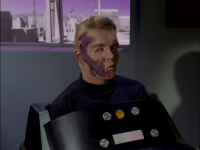
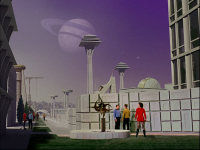
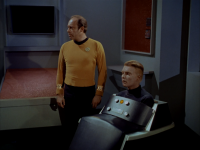
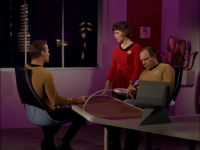
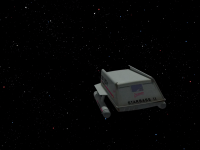
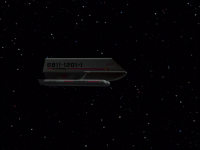
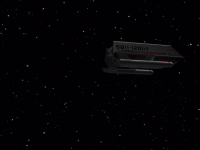
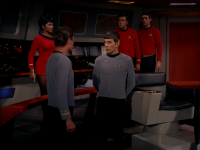
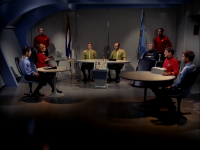
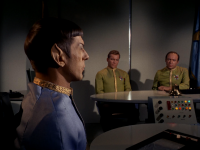
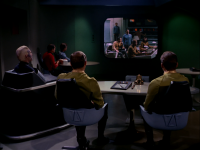
Star Trek TOS - 1x11 - The Menagerie, Part I
Originally Aired: 1966-11-17
Synopsis:
Spock hijacks the Enterprise to return an injured Captain Pike to Talos IV. [Blu-ray] [DVD]
Filler Quotient:
2, filler, but an enjoyable episode nevertheless. You can skip this one, but you'd miss out on some fun.
- Neither the first, nor the second part of The Menagerie is essential viewing if you're trying to plow through only Star Trek's essential exposition and stand-out classics, but it's definitely among the better episodes. If you do decide to watch The Menagerie, I recommend skipping The Cage unless you're willing to put up with the clip show to get the additional texture.
Problems
- This episode unfortunately inherits many continuity errors due to reusing material from The Cage. See my review of The Cage for a complete list of them.
- Unfortunately, this episode also adds to The Cage's list of continuity errors created by future episodes retconning earlier material. In the document Kirk reads about Talos IV, the text makes several human-centric references that imply that Earth is a nation of humans, rather than Earth existing in what will eventually be referred to as The United Federation of Planets, the multi-species nation Star Trek eventually became famous for. The text of the document even explicitly calls out Spock's half-human, half-Vulcan nature as if aliens living among humans is unusual and expressly forbids humans (rather than citizens of the Federation) from visiting Talos IV. All of this is caused by the fact that at this stage in production, the idea of the Federation had not yet been established by the writers. The Federation was introduced in a much later episode, retconning all of this stuff in the process.
Factoids
- The events of The Cage take place 13 years prior to the events of this episode.
- When Pike was promoted to Fleet Captain, he ceded command of the Enterprise to Kirk. That is when Kirk and Pike first met.
- Spock served with Pike for 11 years, 4 months, and 5 days.
- This episode (both parts) won the 1967 Hugo Award for Best Dramatic Presentation.
Remarkable Scenes
- Kirk blindly defending Spock's good name regarding the phantom transmission.
- Spock sneaking around; up to no good.
- Spock fighting with the starbase officer.
- Spock taking over the Enterprise.
- Spock submitting himself for arrest.
- Spock completely outmaneuvering the captain and the commodore at the trial.
My Review
Spoiler warning: my review of this episode assumes you've seen Star Trek's pilot episode "The Cage" which is the unaired episode that the clips Spock shows in this episode were originally filmed for. You should be able to find The Cage in the extras either at the beginning or the end of your home video collection. My review of this episode does not discuss or analyze any of the events of The Cage itself, but instead focuses solely on the new events in The Menagerie and assumes that you have already seen The Cage. If you're looking for commentary on the events of The Cage, then please read my separate review of that episode first. If you're not planning to watch The Cage, I recommend waiting to read this review until you've seen both parts of The Menagerie to avoid spoilers.
The Menagerie, Part I is a cleverly written episode which rises above the many already-established cliches in Star Trek to tell a story that is fresh, new, and unique despite it merely being a shameless framing device so that the unaired material of The Cage could be put to good use. Even the title of this episode "The Menagerie" is a reference to one of the lines spoken by Pike in The Cage. As for the actual clip show, I don't know whether it was good preplanning or just some damn fine luck that the Talosians as written in The Cage had the ability to show people illusions, because it provides quite a clever way to substantiate their ability to show the court the entire episode in flashback form.
The crafty way the clip show was integrated into the episode was certainly among its most memorable qualities, but the centerpiece of the story is Spock going off on a crazy quest against orders, then getting caught and having to defend himself in a court martial. Unfortunately the court proceedings are admittedly weakly written. Why is Spock still able to give testimony after having plead guilty? Why should Kirk be punished too because of Spock's actions? Why is the death penalty of all things considered acceptable for such a minor transgression? Why was court declared to be in recess at the end of the episode? What is this recess being used for?
These are all trivial questions and there are some fairly trivial answers to them if you're willing to be imaginative. But they all stick out as minor plot holes the episode was unwilling to explain away and were unnecessary details to begin with. Better writing could have avoided the awkwardness. That said, Spock being put on trial for his actions was a fantastic dramatic choice and Spock having manipulated everything carefully enough so that he could control the court proceedings up until the cliffhanger was a delightful touch. On a related note, Kirk and McCoy debating with each other over whether or not Spock was capable of treachery was a terrific scene and placing the scene just prior to Spock stealing the ship was an excellent counterpoint.
In addition to being the first episode to feature a cliffhanger, The Menagerie is also the first episode to feature a shuttlecraft. The shuttle Kirk and the commodore use to attempt to catch up with the Enterprise is intriguing in its design and capabilities; it was presented much as I would expect a shuttlecraft to be like given the technologies at their disposal during this time period. It was futuristic, high tech, and even roomy by our standards of space travel, but compared with a ship as advanced as the Enterprise the shuttle was scaled down both in size and capabilities. A commendably realistic technological portrayal given what assumptions we can reasonably make about their technological advances from our perspective.
It might be tempting to pick on poor old Captain Pike for his rather pitiful wheelchair that only lets him beep things to communicate, but I felt that the episode did a fine job of substantiating this. McCoy makes a big point about how the study of the brain has advanced little over the years. Given that, even something as simple a rudimentary neural interface is a technology light years beyond anything we've got. Crafting a custom wheelchair just for Pike that allows him limited mobility and limited communication is quite an achievement by itself. Just because these people have transporters and warp drive doesn't mean they're magical wizards. Giving them limitations is what makes them human.
This episode ends on both the most dramatic point of The Menagerie, since Spock seems to have lost control of the situation for the first time in the episode, as well as ending on the most dramatic point of The Cage, when Pike is abducted, which is another nice touch. I was pleased that the first thing that came out of Kirk's mouth upon witnessing the footage was a demand to know how Spock could have created it and I greatly enjoyed how Pike slowly started to come around to Spock's side. For a character who can only beep yes or no, he was surprisingly compelling. Overall, this is easily the best episode so far in what has mostly been a sea of duds.
The following are comments submitted by my readers.
- From rhea on 2008-04-27 at 6:07pm:
Some additions to your review, which I totally agree with otherwise (especially the absurdities):
- another problem: the peak of the absurdness in this episode is how easily Spock gets off the hook. Last time I checked this was a military organisation, and stealing a starship, insubordination and mutiny, for whatever cause other than protecting the lives of millions against an evil superior is still punishable. So now all of a sudden it is ok because it was an act of compassion? Yeah right.
- another highlight: Kirk, acting as a jury member in the trial against Spock. This is one of the very few occasions we see what a hardass military commander he can be - calm, cool, deadly, convicting Spock to death because this is what military law calls for. We tend to forget this side of him because most of the time he is all chummy with the crew and all angry and emotional with the enemy. Now I understand why he got to command a starship with a crew of 400+. - From Old Fat Trekkie on 2011-12-06 at 9:02pm:
Great site. I do wish to participate in the future.
Here is my comment.
There is a scene where Pike continues to signal "No". Commodore Mendez states that he could be questioned for days, without determining the issue. If I assume he can respond "Yes" or "No" to any questions, then any child who has ever played, "Is it bigger than a breadbox?" clearly knows that this is false. Let me ask 50 questions ... - From Mike Meares on 2012-02-26 at 12:30pm:
I thoroughly enjoyed the Menagerie! And I totally agree with Kethinov’s review! I still remember watching it for the first time and being in shock at what was unfolding right before my eyes! And
I still enjoy watching it today.
I really can’t separate Part One from Part Two, they are linked together and that is the way I will review them. Although I do agree with Kethinov as far as Part One being far superior to Part Two.
However, like Kethinov pointed out there are numerous questions that pop up about both episodes. I am not sure I would call them “trivial” as he does, but as he correctly pointed out in his review they could be explained away. Well most of them but not all. I just wish the writers had spent a little more time on explaining them.
I apologize in advance to anyone who takes offense at this, but just because I have questions about the Menagerie doesn’t mean I don’t think it is a terrific episode. I just feel it isn’t the best written Star Trek episode.
I could name quite a few “mistakes” in both episodes but I will limit my criticism to just two mistakes or problems. And they are whoppers.
The biggest problem with the Menagerie is that it is based upon the court martial of Mister Spock. Why is this a problem you say? Because in order to conduct a court martial you have to have three officers of command rank onboard. Since leaving Star Base 11, Commodore Mendez was an allusion created by the Talosians. Therefore you did not have three officers of command rank onboard; Ergo, Mister Spock could not have been court martial!
However, this raises an even bigger and more serious issue to the story.
If the Talosians could send their allusions all the way to Star Base 11 then why all the charade? When the Enterprise got to Star Base 11 the Talosians could have just created the allusion that everything was normal and Spock could have taken Captain Pike to Talos and gotten back to Star Base 11 and nobody would have been the wiser!
Granted, it would have been difficult to stretch that into a two part episode! LOL!
Nitpick: I could say something about Star Base 11 having back to back episodes( based on the way the episodes were filmed ) of a Court Martial against Kirk and then one against Spock, but I won’t! LOL! It is a good thing the Enterprise never went back to Star Base 11. Dr. McCoy or Scotty would have been next! LOL!
More Nitpick: When they were questioning Pike did anyone ever think of asking a Vulcan to Mind Meld with him? Just asking. - From Old Fat Trekkie on 2012-02-29 at 9:45pm:
Mike, we don't need a mind meld. See my last comment. 50 intelligent questions that can be answered "Yes" or "No" will get to the bottom of almost anything. I do believe we may assume that in the 23rd century, folks will still be able to ask intelligent questions. - From Schreck on 2013-05-23 at 9:41pm:
The first and only two-parter of TOS that gives us a nice storyline about what happened to Pike and it gives us some nice continuity in the series which is lacking. I give it a 7 and my brother a 6.5
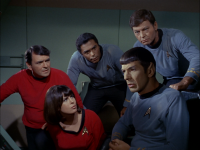
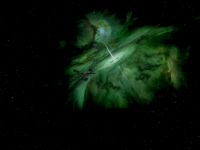
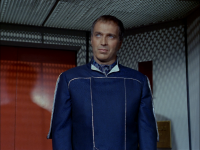
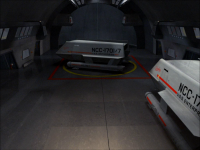
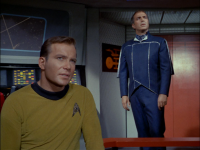
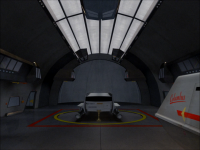
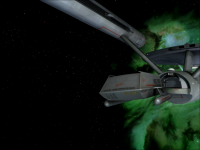
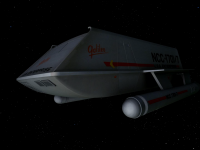
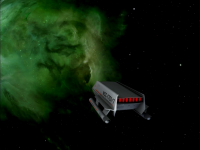
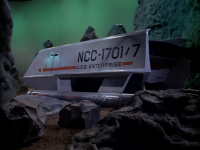
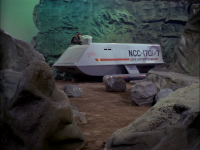
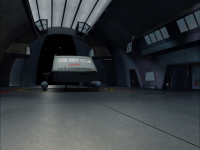
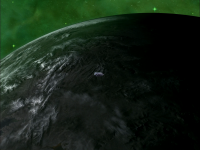
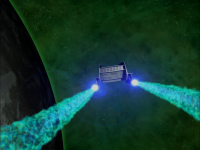
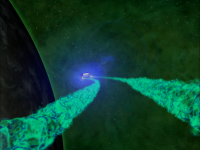
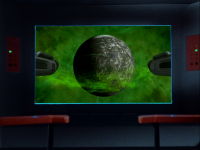
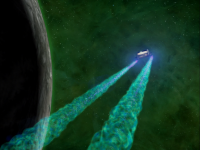
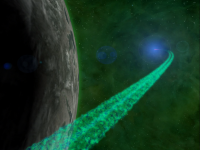
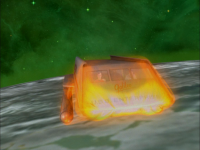
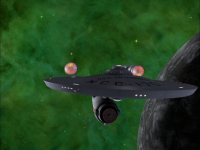
Star Trek TOS - 1x16 - The Galileo Seven
Originally Aired: 1967-1-5
Synopsis:
Seven Enterprise crew members go on a shuttle mission with Spock in command. [Blu-ray] [DVD]
Filler Quotient:
2, filler, but an enjoyable episode nevertheless. You can skip this one, but you'd miss out on some fun.
- There's no essential plot or exposition in this episode that renders it unskippable, but it's definitely a fun ride!
Problems
- Kirk says Spock's shuttle could be lost in one of "four complete solar systems in the immediate vicinity" in the teaser. Uhura later in the scene also mentions one of the "solar systems." This is a common error. The term they were looking for is planetary system. The planetary system we live in is called the Solar System because our star is named Sol. As such, the term "Solar System" is a proper noun, not a generic term.
- The Murasaki quasar system was originally intended to be an actual quasar, but scientific knowledge has advanced considerably since the time that this episode was filmed. As a consequence, we now know that there are no quasars in the Milky Way galaxy. A quasar is in fact an extremely bright but distant galaxy. As such, we must conclude that the system under study in this episode actually a quasar-like phenomenon rather than an actual quasar. This is luckily a reasonable conclusion for us to draw because Kirk's standing orders were stated to be that he study any "quasars or quasar-like phenomena" that he should encounter.
- The rock prop that fell on Spock's leg was so light that Nimoy actually had to quite obviously hold it on his leg to make it appear "stuck" there.
Factoids
- This episode received an extensive visual effects update when it was remastered that was far greater in scope than that of the other remastered episodes.
Remarkable Scenes
- Kirk justifying his curiosity to Ferris.
- The shuttle launch. The first time we see one launch!
- Kirk arguing with Ferris over what should and shouldn't have been done and what to do now.
- Spock declaring that he will decide who will and will not be left behind.
- An alien monster killing one of the crew members.
- Spock's negative reaction to the idea of taking the life of an alien indiscriminately.
- Scotty's idea to rig the phasers as a power source for the shuttle.
- McCoy harping on Spock for making bad decisions.
- Spock: "Strange. Step by step I've made the correct and logical decisions and yet two men have died!"
- Kirk being forced to abandon the search.
- Spock igniting the fuel in a flare in an attempt to get the Enterprise to notice them.
- Spock, explaining his desperation: "I examined the problem from all angles and it was plainly hopeless. Logic informed me that under the circumstances the only possible action would have to be one of desperation. A logical decision, logically arrived at." Kirk: "Ah hah. I see. You mean you reasoned that it was time for an emotional outburst."
My Review
Obligatory Earth bureaucrat of the week becomes a repetitive pain in the ass for Captain Kirk as the Enterprise feverishly engages in the search and rescue of the derelict Galileo shuttle which veers off course not long after beginning its mission and crashes while attempting to study the Murasaki quasar-like multiple star system. I have mixed feelings about this premise. Parts of it are fantastic but other parts are riddled with unnecessary details that drag down the appeal of the plot. None of these annoying details ruin what turns out to be an exceptional story for the most part but are regardless worth a mention. The two most prominently poor choices are the character of Ferris and the choice to have the shuttle crash on a habitable planet.
First let's talk about Ferris. The whole point of his character was to force Kirk into having a short window of opportunity with which to rescue the downed shuttle. We didn't need such an overdone character to achieve that. Something along the lines of Starfleet Command radioing Kirk every now and then and yelling "where the hell are you?" would have even been sufficient to achieve this dramatic effect. Instead we get a useless character trolling the bridge in nearly every one of the Enterprise's scenes acting smug and self-righteous; contributing absolutely nothing useful to the story.
Second let's talk about the habitable planet the shuttle crashed on. Of all the random gravity wells the shuttle could have fallen into they happen to land on a habitable planet? In the middle of a quasar-like system? I find that hard to believe. But even setting that issue aside, the planet's habitability was not an asset to the story largely because the subplot concerning the crew fending off the primitive natives followed by the subsequent burial controversy was not terribly compelling. A much more compelling and realistic story would have had the shuttle crash on a deserted wasteland not unlike Mars or Venus forcing the crew to don spacesuits in order to make repairs. Personally I find the idea of a hostile environment on the planet far more compelling than spear chucking hostile aliens.
Ignoring those annoying aesthetics, this episode is terrific. It's a lot of fun watching Spock handle his first command and getting a chance to see him as fallible just like the rest of us. Granted, many of those serving under him were a bit too quick to criticize the many reasonable choices he made, but it's also clear by his own admission that some of his choices were not at all appropriate. The most obviously poor choice Spock made was to order Gaetano to patrol the periphery of the crash site alone, rendering him an easy kill by one of the aliens. This is counterpointed brilliantly by Spock's innovative act of desperation igniting the improvised flare at the end of the episode. Indeed we learn a lot about our pointy-eared friend in this great Spock character drama, not the least of which is that while he may not be perfect, he is certainly decisive and thinks on his feet well. These qualities in my opinion portrayed him as a fine leader.
The following are comments submitted by my readers.
- From rhea on 2008-04-27 at 7:04pm:
Does anybody else think that Spock's command performance was made a little bit too weak? Sure, he has problems with the human factor, and he does have a different approach than Kirk, but I still thought (and have thought so on several occasions when Spock was in command), that from the way I understood the character (his personality, his training …) he should have been able to enforce his command position more ..well..forcefully, demanding respect, not accepting open hostility etc. The writers' fault, maybe? - From TashaFan on 2008-09-10 at 1:51am:
Good point, Rhea; I noticed in the episode where Kirk is caught on the Defiant that McCoy challenges Spock's command until they view Kirk's final orders, and in "The Gamesters of Triskelion" McCoy is downright insubordinate and doesn't back down until Spock outright asks him if he's planning a mutiny. The same in the epsiode when Kirk loses his memory and becomes "Kirok" on the "Native American" planet. It seems the idea that humans won't follow the unemotional alien was a bit of a theme. This continues in TNG when the somewhat Spock-like android Data takes command of a ship in Picard's makeshift fleet during the Klingon civil war, and the first officer is constantly insubordinate. - From NickyP on 2009-10-02 at 4:44am:
Nice comments you guys about Spock being challenged by McCoy and simply not doing anything about it or demanding respect for his new position. I do think this may be a theme of humans not wanting to follow the unemotional alien. But I also think that when Spock didn't really challenge McCoy until he finally had to ask him if he was planning mutiny, that it just goes to show how cool Spock is. I think that McCoy constantly challenging Spock just rolled right off of Spock's shoulders. - From technobabble on 2010-11-26 at 7:52am:
Time & again Spock was given a pathos test by his human subordinates and accepted it a necessary venting of his overly passionate shipmates but never put the verbal smack down on them as Kirk did.
I believe Spock viewed such heavy-handed command style as an affront to emotional ego on the part of the commander and would not do follow that model. Throughout the series, many viewers & his fellow starfleet servicemen they viewed it as heartless &/or weak. But it was respect in his Vulcan way for letting them express their emotional platitudes...sigh. Spock I get you bro. - From Devlonas on 2011-02-19 at 12:50am:
Kethinov, your's is hands down the best ST review site. To add to all the Spock editorials, I just wanted to say that I love this episode if only for the scene of McCoy (my man) checking on the status of the crew after the crash landing. I enjoy seeing him in the role of competent emergency medic. Also this is the episode where I first noticed that every alien planet has the same "weird chimes" sound effect outside... - From wes on 2011-03-30 at 8:30pm:
The crew laughing at the end of the episode and blatantly dragging it out is pretty laughable in and of itself. - From ProfZoe on 2011-10-03 at 3:44am:
When I first saw this episode, back in 1967 when I was in high school, I remember my friends and I discussing it as an example of the difficulties a woman or a minority would have with command, not just in 1960s USA but other times and place. The 19th century Dreyfus Affair comes to mind: discriminating againsy a Jewish French officer to the point of manufacturing "evidence" and bearing false witness.
Also recall that this time was the height of US involvement in the Vietnam War.The incidents of "fragging" officers (murdering in out of sight locations), because they were either incompetent or "different" had been a growing problem.
The best science fiction addresses current problems in such a way that people are willing to reconsider their previous assumptions, biases, beliefs, or practices.
THAT was the joy of TOS with all its faults.The sum TOS is truly greater than its parts. - From Old Fat Trekkie on 2011-12-06 at 10:41pm:
"Spock's first command?" He is in charge of 7 people. Who was in charge of the Enterprise when: Kirk was down on the planet in "Mudd's Women", Kirk was strapped to a table being Android-ize by Dr Corby in "Little Girls", Kirk was having his mind scrambled by Dr Adams in "Dagger"? - From Kethinov on 2011-12-07 at 6:52pm:
In those previous episodes Spock was not in command long enough, especially in screen time, for the plot to deal substantially with the impact his leadership style would have on those under his command during a crisis situation affecting the ship. - From Josh on 2012-06-06 at 1:51am:
I'd have to agree with the previous commenters: The issue of 'us' vs 'them', the people serving under a foreign officer in a tense situation is the heart of this episode and provides the important drama.
One issue I noticed just having rewatched this episode: in an episode only a few chapters prior, Kodos the Executioner was condemned for making the exact decision that Spock makes at the start of this episode. In both episodes, some people would be sacrificed for the greater good of the rest. Spock makes this determination unfeelingly, of course, but still accepts it as in inevitable fact. As Kodos said earlier, 'if that supply ship hadn't arrived early I might have been seen as a hero.' Had Spock decided to stay and build a new society on this habitable planet rather than leaving men behind, perhaps he would have been seen as a hero by his descendants :) - From Mike Meares on 2012-07-15 at 12:47am:
I really enjoyed this episode! To me the way Spock handles command is one of the great strengths of the Galileo Seven.
I kind of disagree with some of the criticism posted here. If I understand it correctly. I think Spock was very forceful while he was in command. He never gave in to the emotions of everyone else and made discisions that was in the best interest of the crew as a whole.
However, the other part of the criticism was right on. There have been numberous examples of human resistance to alien commanding. Balance of Terror comes to mind. I wish it had come up more often in Star Trek myself. I think it was a very strong statement about human racism and how we deal with it.
And while I agree with Josh that there are some things similar to the Kodos affair there is one major difference. Twice Spock put himself in harms way for the good of the crew in this episode. He went back for the missing crew man which could resulted in Spock being killed. And then again when he was pinned by the rock and told the crew to "take off" without him. These were command decisions that Kodos never made. It showed how Vulcans make their command descisions based on what is the best for the whole and not on their own emotions.
And finally, I loved this episode because it has Yeoman "Mears" in it! Despite The spelling, to hear my family name on my favorite TV show was mind blowing. lol.
- From Alan Feldman on 2013-02-10 at 1:03am:
THE GALILEO SEVEN
My biggest question for this episode: Why couldn't they deliver the emergency medical supplies first, and _then_ check out the "quasar-like" phenomenon?
I understand your gripe about Ferris, but I don't think occasional prods from Star Fleet command would work. I also don't it's realistic that they would be calling often enough to have the same effect. And it's interesting to have the PITA high official actually be right for a change. Sending a shuttlecraft into the Murasaki system before delivering the emergency medical supplies was plain dumb. I mean, really: There's an out-of-control plague on New Paris. Science can wait a few days.
It's also interesting to see our hero, Kirk, being wrong and having to sweat it under Ferris while at the same time trying to save face with his lame scientific-duty routine. You also need Ferris to force Kirk abandon the search at the last possible minute. That wouldn't work with Star Fleet command on the radio. You need a Ferris on the bridge to force a turnaround; otherwise, Kirk would stay.
Two quick asides:
How do these people memorize regulations down to the paragraph number?
It must be no fun to work for Star Fleet, as can be seen in episodes in which they do give direct orders to Kirk.
My second biggest question is about Spock's supposed lack of emotions. He clearly gets angry at the Galileo crew, and is sympathetic to the plight of the aliens. Are these not emotions? And just prior to leaving the planet he exhibits a whole slew of emotions. More on this below.
The problem with being logical is that it is not enough. You need a goal. And goals come from emotions; they do not pour forth from logic. Subgoals, yes -- but not ultimate goals. You could say that Spock has his emotions more or less under control (less in this episode!), but not that he doesn't have them or has completely suppressed them.
There is nothing at all quasar-like about the Murasaki system that I can see. I could go with the "Murasaki effect", but not it being quasar-like.
How could the ship have landed safely so close to all the large rocks? On top of that it's incredible that they had as soft a landing as they did! Look at how hard it is to safely land something far smaller on Mars. And again, as in other episodes: why are there no seat belts?
Yes, landing on a habitable planet is pretty long odds, but that's pretty normal for Star Trek. I'm not sure of what kind of similar story you could have landing on a "deserted wasteland not unlike Venus or Mars", but I think even that would be incredibly unlikely. And Venus is far worse than a wasteland. You couldn't survive there at all. Furthermore, landing on anything at all, much less a solid planet, much less a habitable one, would still be highly improbable.
Just after the soft landing, Boma's explanation is pure babble.
Scotty is really focused on fixing the ship, unlike in "The Naked Time" where he pauses cutting through the bulkhead to talk to Mr. Spock when minutes, if not seconds, are crucial. This was quite welcome.
Spock says he will decide which three people to leave behind on the planet based on logic. Well, I guess this means leaving behind the three heaviest people. Simple! Okay, we need someone who can pilot the ship and do quick repairs, so Scotty is a safe bet. And Spock is the commander, in effect, Captain of the ship. And Spock, as Captain, has to get a seat on the ship, as the Captain always goes down with his or her ship. Yeah, he can pilot the ship and help Mr. Scott fix things, too. And perhaps you can make a case for saving the doctor. But for the rest you go by weight.
I like when Bones and Scotty come to Spock's defense when Boma gets out of line about having a burial for Gaetano.
Phasers do pack a lot of energy in a small device, but enough to launch a space ship? I'm skeptical. And how does "phaser energy" turn into fuel that burns?
Spock ordered Latimer and Gaetano to remain within visual range of the ship. Looks like they disobeyed this order.
Why does Spock instruct Gaetano to be a guard -- a lone guard, no less -- so far from the ship? Seems quite illogical to me. Actually, I believe "foolish" is a more accurate description. Just as you said.
There's an interesting twist here: In the scene starting at 20:37, some of the crew go out of the ship to see what the noise is. Apparently the natives are making their sound and preparing to attack. (The sound is a great sound effect, but is that really what wood on leather sounds like?) Then the crew discusses tactics. Now look at who's getting logical and who's getting emotional!
SPOCK: I am frequently appalled by the low regard you Earthmen have for life. [He says this with anger, and is it not also an expression of sympathy? E-mo-tions.]
GAETANO: Well, we're practical about it. I say we hit them before they hit us.
SPOCK: Mister Boma?
BOMA: Absolutely.
SPOCK: Dr. McCoy?
MCCOY: Seems logical to me.
SPOCK: Yes indeed. It seemed logical to me, also. But to take life indiscriminately. [Sympathy!]
GAETANO: The majority.
SPOCK (_in anger_!): I'm not interested in the opinion of the majority, Mr. Gaetano.
Not only does Spock get angry (emotion!), he just asked their opinions, and after he gets them he says he's not interested. (Illogical!) And just prior to the above conversation he eagerly asked Mr. Boma about how they can use his observation about the aliens being tribal against them. Spock is right that it is he who is in command, not the majority -- but he should have stated it that way. Asking for advice and following it are two different things, as Kirk pointed out in "Dagger of the Mind".
So Spock has no problem leaving three crew members behind to die, but killing the alien "humanoids" to save their own skins is somehow appalling. And he seemed to have no emotional reaction at all when encountering a dead Latimer. [This reminds me of Spock not saving Tomlinson in "Balance of Terror". Was Tomlinson already dead when Spock showed up, or did Spock really, coldly, leave him there to die? It's not clear, but as I said in my review on that episode, I certainly hope it was the former. But if it was the latter, then again he has no problem leaving humans to die (and neither did anyone else in that episode).]
I don't have the remastered version, but by looking at the photos on your site I see that yet again they make things worse. The Murasaki system in the original is just a more or less homogeneous thing of illuminated dust, gas, and solar systems (sorry, we disagree on the definition of "solar system"). In the remastered version there is, at the center, some kind of star with high-energy jets, perhaps even a black hole. Now, if the Galileo were to be drawn to the center of the remastered nebula -- well -- I don't think it wouldn't survive. The Murasaki system also looks too much like a work of art. Its structure looks quite unnatural to me. It was done right the first time, except that it "swirled" a little too quickly.
And the jettisoned fuel doesn't look right. Yes, the quality of the imagery is superior, but I don't think it makes things more realistic. If anything, just the opposite. In TOS, it looks like a plume within a plume. Much more likely and realistic. Scotty clearly said that Spock "ignited" the fuel. The fuel in the remastered version doesn't look like it was ignited, while it _does_ in the original version.
The worst thing about the remastered version is the fact that the rear view is partially obstructed by the engines! That's patently ridiculous, ugly, claustrophobic, and pretty piss-poor for a 23rd-century viewing system. Simply awful. Judging by the photograph on this website, the camera is on the outer rim of the upper part of the ship. One could at least put cameras below the shuttlecraft bay doors.
Near the end of the episode the Galileo is having trouble maintaining orbit. But we see it in what looks like deep space with stars zooming by. This is patently ridiculous, as is the concept of a rapidly decaying orbit outside a body's atmosphere. But such things are, unfortunately, more or less a normal part of Star Trek TOS. Wait, there's more! The stars are moving even when we see Taurus 2 stationary from the Enterprise! I'm sorry, but this is totally nuts.
Notice how Spock exhibits the following starting with being pinned by the large rock: altruism, anger, fear, panic, and a hint of desperation. Are these not emotions? We don't need to wait for his jettisoning the fuel for him to exhibit emotions.
Spock's jettisoning the fuel is the climax of Spock's adventure as commander, of course. I think it was both logical and emotional. You have to weigh being bright for a brief period of time versus dark for a longer period of time. I think all indications are that the former was more likely to be successful. Having won doesn't prove that argument is right, of course, as sometimes the less likely thing will happen. But the best you can do in life is play the odds. Scotty: "A distress signal? It's like sending up a flare. Mr. Spock, that was a good gamble. Perhaps it was worth it." Absolutely. This was a great line, and well-delivered, to boot.
Quick aside: That "FUEL JETTISON" switch is just a little too easy to hit by accident, no?
When the Galileo crew is rescued, no one on the bridge notices that two are missing. They seem to act as if they know what we know, that only five are on board and that no major characters were killed. And since they couldn't know that, we see that they also don't seem to care in the slightest about who died or that anyone died at all! In fact everyone on the bridge is so unaffected by this that only a short time later they can freely laugh at Spock's admitting being stubborn instead of mourning the three dead.
Why does Kirk order the Enterprise to go at only warp factor 1 if they were so pressed for time? Oh, and why only "full normal speed" to go back to Taurus 2 for the rescue? And just what is "full normal speed", anyway? It doesn't sound fast, like "emergency warp". It seems the Enterprise is never moving fast in this episode.
Lots of fun, but lots of problems.
AEF, a.k.a. betaneptune - From Rick on 2014-08-26 at 6:35pm:
Alan Feldman
"My second biggest question is about Spock's supposed lack of emotions. He clearly gets angry at the Galileo crew, and is sympathetic to the plight of the aliens. Are these not emotions? And just prior to leaving the planet he exhibits a whole slew of emotions. More on this below. "
Becoming forceful in order to enforce a position of power is not the same as anger. Spock is not sympathetic to the plight of the aliens but is rather respectful of other lifeforms. Of course there are lots of problems in this episode: just like every episode of every show on tv, and every review that is overly critical and overzealous in trying to find errors that do not necessarily exist...
- From Alan Feldman on 2014-11-24 at 2:41am:
At Rick
C'mon, Spock was clearly angry. There is no question about it. In fact, I just watched it again. That's anger.
Additionally, the scene clearly shows the struggle within him between Vulcan logic and human emotions. In fact, this is in large part what makes Spock such a fascinating character, of course. I recall that as a child I was in awe of his ability to control his emotions, to be lord over them, to master them. What is also fascinating is that in this scene it is the humans who are being logical!
If you respect, in the relevant sense of the word, other life forms, then you care about them. That includes sympathy, or, if you prefer, concern. I mean, if you don't want to kill them, you care about their well being, or at least their being alive, no?
I am not overly critical. And I am not overzealous about finding errors. They stick out like a sore thumb. I call 'em as I see 'em. I make both positive and negative comments, even in my original review on this very episode! Hell, even in this very post!
I love Star Trek TOS. And part of the fun is discussing both its strong points and weak points in a forum like this. And for that I say, thank you, Kethinov! - From Chris on 2018-02-22 at 6:56pm:
Aside from all the other problems folks have described regarding Spock's 'leadership' or his emotional outbursts, it seems to me that Kirk is the bad guy in this episode.
He's willing to endanger the population of an entire planet for seven shipmates, no matter how close they were to each other! Ferris' needling to me is spot on perfect and Kirk is the douche.
Why couldn't he deliver the meds to New Paris and come back to investigate the quasar phenomenon at his leisure? It wasn't going anywhere and He still needs to investigate it even when the episode is over!
Gaetano strikes me as a moron who deserved to die. Trying to climb the cliff instead of trying to get back to the ship is the height of idiocy. Further, he should have been firing his weapon blind into the fog before his phaser gets knocked out of his hand!
Those aliens sure got inaccurate while throwing spears at Spock who is also carrying a body!!! What luck!
As usual, the banter at the end while two crewmates and one from a search party, are dead along with a few badly injured, just really grinds my gears!
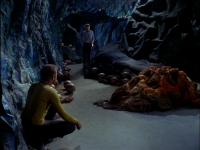
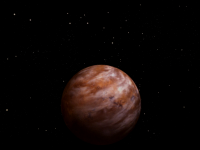
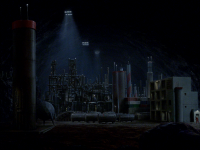
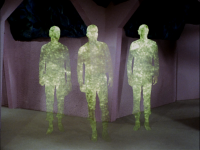
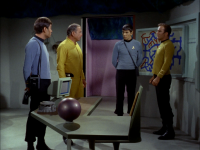
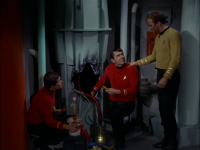
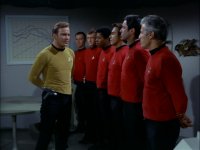
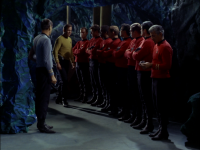
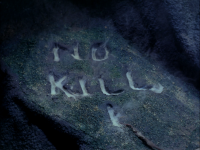
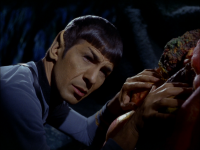
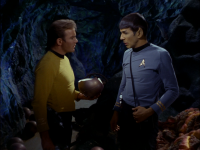
Star Trek TOS - 1x25 - The Devil in the Dark
Originally Aired: 1967-3-9
Synopsis:
An unknown monster threatens a mining operation. [Blu-ray] [DVD]
Filler Quotient:
2, filler, but an enjoyable episode nevertheless. You can skip this one, but you'd miss out on some fun.
- There's no essential plot or exposition in this episode that renders it unskippable, but it's definitely one of the better stories of the series.
Problems
None
Factoids
- This episode firmly establishes that Vulcan mind melds can be performed without touch but are more successful with touch, a fact previously only implied by a couple prior episodes.
Remarkable Scenes
- Spock proposing that the monster might be silicon-based and McCoy's reaction.
- The hilarious looking silicon-based life form.
- Spock hypothesizing that the silicon-based life form may be the last of its kind and that they should protect it at all costs.
- Spock: "The creature is in your area. Take a life form reading." Kirk: "That's not necessary Mr. Spock. I know exactly where the creature is." Spock: "Where, captain?" Kirk: "Ten feet away from me."
- Kirk hesitating to kill the creature.
- Spock's mind meld with the silicon-based life form.
- McCoy's reaction to seeing Spock mind melding with the silicon-based life form.
- McCoy: "I'm a doctor, not a bricklayer!" (Count #2 for "I'm a doctor, not a [blah]" style lines McCoy is famous for.)
- McCoy: "By golly Jim, I'm beginning to think I can cure a rainy day!"
My Review
The Devil in the Dark is a terrific story with excellent pacing, especially at the beginning. I'm not typically a fan of the horror movie aesthetic, but this episode rises well above that by delivering a narrative with a compelling moral dilemma enhanced by well crafted sci-fi texture. Stories about how human resource extraction often comes at the expense of indigenous life are nothing new, but the alien characteristics of the lasagna monster--er, I mean silicon-based life form are what make this story particularly compelling. Scientists have long suspected that because silicon and carbon share many chemical properties that it may be possible for a hypothetical type of biochemistry to exist based on silicon instead of carbon. While I have my doubts that the lasagna monster depicted in this episode is a very realistic extrapolation of what silicon-based life might look like, the episode grapples with the idea in a reasonably intelligent way for the most part, even if it may leave you slightly hungry for lasagna after you're done watching it.
One of the best details of the episode is the plot's constant struggle to reconcile the desire to protect the miners with the concurrent desire to preserve the life of the creature. At first Spock questions the need to kill the creature only to be lectured by Kirk that a murderous rampaging monster cannot be permitted to live. But later on in the story their positions interestingly reverse. When Kirk personally confronted the creature, he realized that in its wounded state it had been rendered far less aggressive and Kirk started to ponder a means of rendering it harmless without killing it. Spock by this point was quite taken with Kirk's prior pragmatic attitude and advised killing it on sight. The way both men wrestle with their duty to save the miners and their scientific curiosity about the lasagna monster was nicely done and the use of a Vulcan mind meld as a means to fully understand the creature was a nice bit of continuity. I just wish those mind meld scenes weren't so frequently poorly acted and painfully slow.
After the mind meld Spock learns a whole slew of fascinating things about the creature which is apparently an intelligent animal, possesses language, and calls itself a horta. While it was fairly obvious from some of the first scenes that the silicon nodules were in fact eggs, thankfully the plot did not hinge its entire dramatic appeal solely on this revelation. Instead the focus on forging a peace treaty predicated on trade and mutual cooperation between the miners and the lasagna monsters was an excellent idea, true to the spirit of Star Trek. Much like in The Corbomite Maneuver or The Menagerie, the alien of the week has turned out not to be an evil monster after all but instead a sensitive intelligent creature which likewise desires peace and cooperation. The idea that all life shares at some level a desire to avoid conflict is perhaps Star Trek's most inspiring theme and this episode is the best one so far to directly tackle it.
The following are comments submitted by my readers.
- From Kelli Tipton on 2008-11-20 at 7:55am:
You have something against English Imperial Units, I take it? And are you sure they are not U.S. Customary Units instead?
If you look at the Apollo plans, components are measured in U.S. Customary Units. Why would Roddenberry use Metric? Seriously, the only people who ever seem to care about Metric are people who feel the need to feel scientific. Meanwhile, they can't seem to use a unit that can be divided by 3. Just think of that... You can't have a third of something, nor measure out 7/16 of an inch easily. How lame is that. - From Giuseppe on 2009-03-10 at 1:03am:
I don't really mind it when they use the Imperial system, however it does make sense that they would use the metric system. After all, the Enterprise is an Earth built ship with a mostly Earth crew and the metric system is the most widespread measurement system on Earth (that was also true back in the '60s). In fact today there are only three countries in the world that don't use it as a primary system: The US, Myanmar and Liberia. Even the Brits who invented the Imperial system now use metric as the primary measurement system.
The comparison with Apollo is forced to say the least. The Enterprise isn't an all-American project like Apollo was.
And yeah, on a starship you'd expect that they use the best scientific measurement system around and, for the moment at least, that's metric. It's based on decimal multiples, just like our numbering system, you don't have to mess with various conversion factors when converting from one unit to another (you just have to move the decimal point or change an exponent), nor is there a need to express measurements in fractions. - From 411314 on 2009-06-15 at 11:12pm:
I loved how this episode looked like a standard fight the dangerous monster episode and turned out to be completely different. I never saw the ending coming until the eggs were found. - From Scott Hearon on 2014-03-31 at 12:04pm:
I really liked this one. Aside from the almost comical appearance of the Horta, there was a lot of thought in this tale.
Most of my gripes are related to McCoy's healing of the Horta. From Kirk's oddly agressive insistence that McCoy shutup and do something that he's not trained to do, to the eye-roll inducing line, "I'm a doctor, not a bricklayer!", I had to cringe.
Aside from these a few other very minor oddities, this was a great little story of rethinking initial impressions. There is, of course, the core Star Trek element of not only seeking out new life, but attempting to forge peaceful bonds with it, whenever possible. This episode took advantage of the opportunity to capitalize on this grand notion, whereas some previous episodes (such as "Arena") missed out. - From Alan Feldman on 2015-01-24 at 5:27pm:
THE DEVIL IN THE DARK
Episode is better than one would think given a synopsis (one without spoilers, anyway) of it.
You wrote: "When Kirk personally confronted the creature, he realized that in its wounded state it had been rendered far less aggressive and Kirk started to ponder a means of rendering it harmless without killing it." Good point. I never thought of that. OTOH, Kirk earlier warns us that there's nothing more dangerous than a wounded animal. So I guess the devil is in the details. (Sorry -- couldn't resist.)
I thought the mind-meld scenes went on for too long.
Units again? Scientists often use non-metric units. High-energy physicists, for example, measure mass and energy in electron volts. An electron has a mass of about 511 keV, which is more convenient than 9.110x10^-28 gm, especially in relativistic formulas. A proton has a mass of about 938.3 MeV; a neutron, 939.6 MeV. In the case of calculating the binding energy of nuclei they often use atomic mass units with a table of "mass excess". They also use feet! Electrical signals travel at close to the speed of light. They take 1 nanosecond to travel 1 foot. This is useful in estimating delays due to cabling. Angular momenta of particles, nuclei, and electrons in an atom are most conveniently measured as integral or "half-integral" (0, 1/2, 1, 1 1/2, 2, 2 1/2, . . .) multiples of Plank's constant divided by (2*Pi). (In the first two cases it's a special form of angular momentum called spin.) Then there're light years and parsecs, neither of which is metric. There are many more examples. Oh, and astronomical units. Bottom line: use the right units for the job. (Similar to, "Use the right tool for the job".)
Notice that Kirk said, "The chart says these tunnels converge a few thousand yards further." A few thousand yards?! That's a few kilometers (to put it in metric units)!
KIRK: You take the left (points to his right); I'll take the right (points to his left). Do they really think we're that stupid?
Notice the cave floor is just a regular floor. Not a biggie. Just sayin'.
23rd level? There are at least 23 levels? That's a lot of levels!
"We'll use clubs." Seriously? 30:31-30:36, 44:08-44:15, 44:25-44:28. I guess so!
At 44:08 the miners club the red-shirts. Shouldn't they be charged with a crime?
AEF
- From Chris on 2018-09-29 at 7:51pm:
I love this episode and was actually more fascinated by the reviewers!
Kethinov - I'm often amazed at your command of the language and truly appreciate the insights you bring to your reviews and thought about these stories! THANK YOU!
As far as unit usage goes, this show was made for American audiences first and foremost, not Europeans. As far as the U.S. usage of metric vs. Imp. measurements go, the military has used metric as far as I can remember, which is a long-assed time!
Feldmen - You seem to be nit-picking a bit.
I like McCoy's, "I'm a doctor, not a..."! Check that, I love them!
Time for Lasgna! - From Chris on 2019-02-03 at 12:06am:
I thought of a true complaint that has not been addressed by anyone including myself which irritates me and prompts yet another comment!
This Horta, "which moves through rock like we move through air" is not accurate at all! The creature moves through rock the way birds move through air, except that birds don't leave the equivalent of vacuums in their wake! These things, er, creatures should have left massive caverns or at least molten rubble in their wake, which would be far more accurate! The rock isn't simply being vaporized. Even if it could, there would be something left, heat, of extraordinary levels that no human could be close to it even months after the creature had gone!
I know no one reads my nonsense this late in the game but I still feel the need to rant a little. - From Chris Long on 2019-05-13 at 2:17am:
... and so here I yam yet again!
How is it that McCoy, The greatest medical mind in the history of the Federation not know about the notion of Silicon-Based Life?
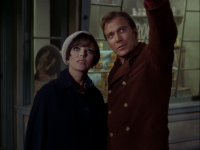
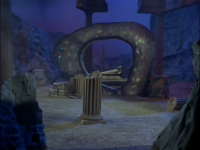
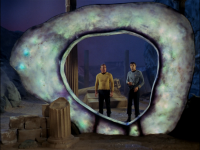

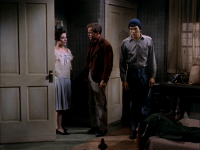
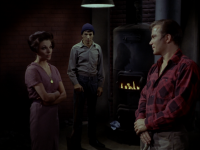
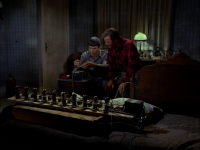
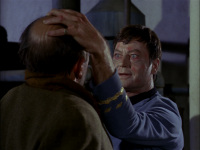
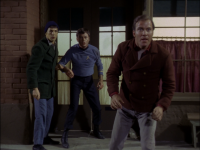
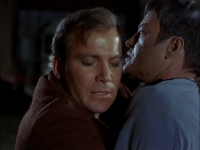
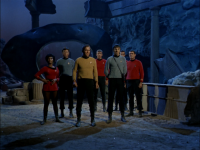
Star Trek TOS - 1x28 - The City on the Edge of Forever
Originally Aired: 1967-4-6
Synopsis:
Kirk and Spock go back in time to save McCoy. [Blu-ray] [DVD]
Filler Quotient:
0, not filler, do not skip this episode.
- Aside from being one of Star Trek's most famous episodes, this episode is also a prerequisite for watching TAS: Yesteryear.
Problems
None
Factoids
- This episode won the 1968 Hugo Award for Best Dramatic Presentation.
Remarkable Scenes
- The look on Sulu's face when he was injected with Cordrazine.
- Kirk and Spock questioning the Guardian of Forever.
- McCoy destroying history.
- Kirk trying to explain Spock to the police officer.
- Edith Keeler's speech: "One day soon man is going to be able to harness incredible energies. Maybe even the atom. Energies that could ultimately hurl us to other worlds in some sort of space ship. And the men that reach out into space will be able to find ways to feed the hungry millions of the world and to cure their diseases. They will be able to find a way to give each man hope and a common future."
- Spock discovering that Edith Keeler may be supposed to die.
- McCoy on a rampage.
- Spock proving Edith Keeler must indeed die.
- McCoy: "I'm a surgeon, not a psychiatrist." (Count #3 for "I'm a doctor, not a [blah]" style lines McCoy is famous for.)
- Edith Keeler's death and Kirk restraining himself from saving her.
My Review
What if going back in time and saving one person from dying in a terrible tragedy led to an even greater tragedy for millions more people a short time later? The City on the Edge of Forever is not the first episode of Star Trek to deal with issues raised by contaminated timelines, but it's certainly the best one to tackle the issue so far as it features both excellent humor and a terrific dark dramatic story. The humor in McCoy's insane rampage, the drama in Edith Keeler's death, the dynamic nature of the storytelling, the unusual pacing, and the unusually high quality acting on the part of the main cast make this story easily among the most memorable episodes produced thus far.
Unlike previous dabbles into time travel storytelling such as Tomorrow Is Yesterday, this episode treats the implications of time travel notably more responsibly. Even little details such as Spock remarking on how much useful historical data he could collect using the Guardian of Forever are an excellent illustration of this, but no scene is more compelling in this respect than Keeler's death. Beyond the dramatic appeal, there is also time travel intrigue. She died crossing the street, trying to find out what Kirk, McCoy, and Spock (well maybe not Spock...) were all so happy about. Thus, they are the direct cause of her death! This episode didn't merely acknowledge the implications of a time travel paradox, it used one for dramatic effect!
Though no matter how captivating this story may be dramatically, it is not without its flaws. Chief among the issues in this story is the Guardian of Forever itself. What was it doing there? Why didn't they investigate it any further? Why did they just leave such a powerful and potentially dangerous piece of technology laying around there for anyone else to find and misuse in the way McCoy accidentally did? Why was the landing party insulated from the changes to the timeline? Did the Guardian of Forever protect them somehow due to their proximity to it? This episode definitely treated time travel more responsibly this time around, but still not responsibly enough for a perfect score I'm afraid. With more careful writing this episode certainly could have earned one.
The following are comments submitted by my readers.
- From Arianwen on 2010-07-23 at 12:29am:
Well, I suppose I can't be applauded for my originality; like the majority of fans, this is for me one of the best TOS episodes ever. I think the reason I find it so enjoyable (I never once feel the need to skip forward) is that it takes the show out of its comfort zone. No redshirts, no all-powerful, murderous or otherwise interfering aliens, no fight scenes, no long, penetrating Kirk-stares... it flows very well. I really appreciate all the detail in the guest characters, the background people, the scenery - as well as in the little twitches in the characters' expressions. As you said, the acting is excellent.
With all of this going on, I wasn't too bothered about their not wrapping up the business with the Guardian of Forever. In fact, I think it makes the episode rather more real - Kirk is in no mood for mysteries, he just wants to "get the hell out of here". The episode had to end there; anything afterwards would have felt false. - From Robert Koenn on 2011-02-17 at 7:45pm:
Of course there is all the controversy concerning this episode. I have never read Ellison's original script, although I think it is available, but from what I have read about it it is even more powerful than the episode. I enjoyed greatly that it dealt with time travel in a very rationale way. The story itself was great and the way the writers wrote in Keeler's insights were perfect, even if slightly corny. And tying her into the existing and the alternative history was plausible. Finally the underlying love story made sense and was heart felt, especially Kirk watching her die at the end. And for me I found the guardian excellent. It was perfect advanced technology scifi the way they did the guardian and I loved the effects and sounds at the portal. This is still my favorite episode of the entire universe although there are many other excellent episodes. Interesting that it was written by an excellent alternative fiction writer. Amok Time was also by an established scifi writer and another of my favorites. - From John Bernhardt on 2014-01-31 at 4:50am:
Shatner's performance here makes me think of the overall issue of William Shatner's acting. He is a very erratic actor. It is often commented on how he overacts, over emotes, does those trademark pauses between words etc. It's all true. The irony is that he actually does have acting chops, he just lacks restraint. The great range he shows here-the charm, the humor, to the extremely believable pathos and anger at the end shows off where his strength's are as an actor when he just shows a little restraint.
- From Scott Hearon on 2014-04-01 at 10:50am:
Kethinov raises just about every issue that came to mind as I was watching this episode, which I thought to be very good but not without some problems.
Time travel stories are always fraught with peril, and this one is no different. As is stated in Kethinov's review, I feel that some of it could have been explained with a tiny bit of smart exposition. Perhaps the landing party WAS insulated from the greater effects of the time distortion, but the fact that this issue isn't even raised by any of the crew was glaring.
I also found the pacing a bit odd. The romantic relationship between Kirk and Keeler seemed both rushed and forced. It was difficult to see exactly what Keeler saw in Kirk, and her strange intuition was a bit nebulous. This part of the story could probably have used more time to develop, though this is unrealistic for a 50-minute TV show episode.
These problems, though, are fairly minor. The overall story was a strong one, and the tragic and emotional punch at the end may be the strongest of the series so far. The entire story was a creative reworking of the classic, "If you could go back in time and kill Hitler, would you do it?" idea. By flipping the script and asking whether you would allow a good person to die in order to save millions, this story adds a far deeper and more probing question.
I didn't find this episode to be my absolute favorite one, but it may be the one that stays with me the longest. - From Peter Collins on 2015-02-25 at 11:14pm:
I've just seen this for the first time in maybe 20 years and I was struck by the use of the song Goodnight Sweetheart, both in itself and as a repeated piece of incidental music - slightly heavy handed in foreshadowing Edith Keeler's death, but also interesting in that Goodnight Sweetheart is the name of a British situation comedy of the 1990s that involved a young man finding a rip in time in east London that transports him back to the wartime London of the 1940s and back. It too had many flaws, not least in making the time traveller - who ends up married to two women in different times - extremely unlikeable. I suppose the sitcom writers chose the music for a reason... - From jd_juggler on 2015-03-22 at 2:41pm:
Under "problems", you list "none", and then in the narrative proceed to list several problems! Clark Gable did not appear in any movies in 1930, and he was far from a household name at the time, yet Edith expresses great puzzlement when McCoy and later Kirk don't recognize the name. At one point, Spock says he needs three or four pounds of platinum, apparently unaware of how rare and expensive platinum is. Hard to believe, since Spock usually seems to know a lot about earth and it's history. When the timeline has been restored (Edith hit by truck), Kirk and Spock, followed by McCoy, return through the Guardian of Forever - but they are leaping through it. How do they know to "leap"? As mentioned by others here, there are always problems with time travel episodes. If there never was an Enterprise, then how did McCoy get to the Guardian of Forever in the first place? - From Pietro on 2019-06-17 at 8:55pm:
Did anyone else notice Uhura taking notes from Kirk with PEN & PAPER?? Maybe this happens elsewhere in TOS but it looks really funny, sitting in front of a giant computer panel. Does that make pen-and-paper the oldest technology in the series, I wonder? :D
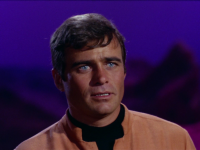
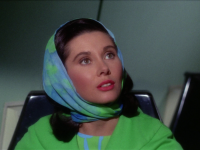
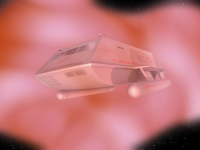
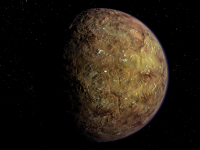
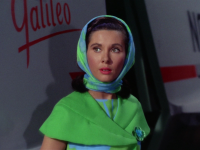
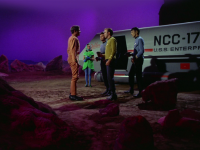

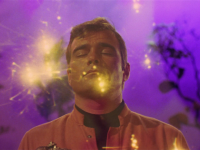
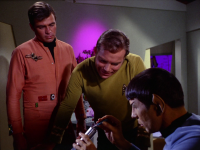
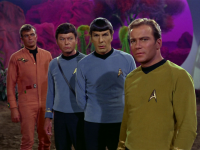
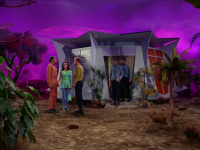
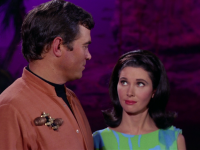
Star Trek TOS - 2x09 - Metamorphosis
Originally Aired: 1967-11-10
Synopsis:
The shuttlecraft Galileo makes a forced landing on a world with a single human inhabitant. [Blu-ray] [DVD]
Filler Quotient:
1, partial filler, but has important continuity. I recommend against skipping this one.
- The Zefram Cochrane character is first introduced in this episode, although it is his chronologically final appearance.
Problems
None
Factoids
- This episode establishes that Zefram Cochrane invented warp drive.
- This episode establishes that Zefram Cochrane is at least 237 years old.
- This is the first episode to feature a Federation universal translator device.
Remarkable Scenes
- Cochrane's sudden appearance before the landing party.
- McCoy, regarding Cochrane: "Talks a lot, but he doesn't say much."
- The revelation of who Cochrane really is.
- Cochrane: "Believe me captain, immortality consists largely of boredom."
- Kirk enticing Cochrane to rejoin the universe.
- Kirk conspiring to attack Cochrane's companion.
- Kirk negotiating with the companion.
- Cochrane agreeing to stay with his now in human form companion.
My Review
This was a charming story with a premise that should not have worked anywhere near as well as it actually did. If I were to describe the episode to someone as "Kirk, Spock, McCoy, and annoying Federation bureaucrat of the week crash land onto a random alien planet," I would likely receive yawns in response. However, adding in details like "whereupon they discover the long lost Zefram Cochrane, the inventor of warp drive, still alive despite being aged over 200 years, sustained by a neurotic alien entity which has fallen in love with him," I suspect I might raise a few more eyebrows.
The appeal of this episode lies solely with Cochrane. It takes an unfortunate twelve minutes into the story before the narrative finally allows Cochrane to reveal his backstory (we can't let the plot move forward too quickly now, can we!), but when he finally does, the implications are fascinating. What kind of life has this man led? As he interacts with the landing party, the story grapples with concepts like immortality, eternal captivity, and inter-species love in remarkably compelling ways.
However, I would have enjoyed a deeper exploration of Cochrane's life on pre-Federation Earth. Why did he invent warp drive? How did he achieve the breakthrough? What were relations with the Vulcans like before the Federation existed? Given Cochrane's "parochial" and arguably racist and xenophobic attitude towards aliens, I can only imagine that Cochrane's era was a considerably different one. But the episode spends little time on the totality of Cochrane's long, storied past.
Both Nancy Hedford's character as well as the entity fell considerably more flat, as Nancy spent most of her time acting irrationally and the entity came off as a female version of Nomad. Even with the two of them combined at the end of the episode, there still wasn't enough personality between them to add up to being a compelling character. It's also worth noting that the companion unilaterally inhabiting Nancy's body could be seen as morally questionable, but since Nancy seemed to be all for it after the fact, it could be dismissed as voluntary. I suppose since her only other choice was death, the moral ambiguity is somewhat moot.
Speaking of death, I found it intriguing that Kirk repeatedly argued that the eternal captivity of Cochrane and the landing party would lead to their deaths. Kirk's statement was at best a metaphor and at worst a lie. Nevertheless, it was a perceptively persuasive tactic. Kirk basically recognized that the landing party was brought to this planet because Cochrane wished for companionship. Kirk expanded on Cochrane's dissatisfaction with the boredom of captivity to convince to the entity that her solution would be ineffective in the long term because that boredom would merely reassert itself in short order. Sure, some of his rhetoric may have been a bit less than accurate, but what good diplomat doesn't fudge the truth every now and then? ;)
A final wrinkle in the story is Kirk's refusal to reveal the discovery of Cochrane to the Federation, nor the true fate of Nancy. I can understand Cochrane's desire to avoid fame, but doesn't Nancy have at least a single person in the Federation who cares about her? Parents, siblings, family of any kind? Won't they want to know what happened to her? Won't they want to come visit her? Perhaps throw a wedding party? Kirk was responsible for Nancy's safety, as he himself so appropriately pointed out in the middle of the story. It was irresponsible for him to lie about her fate after the fact.
Overall though this was a terrific story. I'd love to see the Zefram Cochrane character again in subsequent episodes or at least learn more about his apparently pivotal role in the history of Earth and the Federation.
The following are comments submitted by my readers.
- From rhea on 2008-04-27 at 6:25pm:
I can think of one reason why the episode is disliked, at least by me for: the racist-sexist notion in Cochranes reaction to the gender/sex of the Companion. As long as he does not know it is female he believes it to be a good buddy. When it turns out to be female and maybe in love with him, he is so utterly disgusted, I want to slap him - hard. So what does it mean: companionship is ok, but interspecies/interracial love is disgusting?? Then the Companion decides to give up immortality and live on in Nancy Hedford's body, and all is well again? I for one am happy he stayed on the planet, for all the poison he was spewing against interspecies relationships.
Some may say he felt raped, sexually violated, but I am not sure that I accept that. - From Orion Pimpdaddy on 2008-07-19 at 5:36am:
Decent episode. I love the part where Kirk is talking to Cochrane about how far the Federation has come in terms of the numbers of planets humans inhabit and how much intelligent life is out there. - From Rick on 2010-05-10 at 2:06pm:
Also, Cochrane would be hailed as the "inventor" of the warp drive, for earthlings, but obviously, all the other species discoverd warp drive for themselves. They make it sound like cochrane invented warp drive for everyone in the galaxy, but of course, that's not the case. - From Old Fat Trekkie on 2011-12-08 at 9:16am:
If for nothing else, this episode is great due to the conversation between the Companion and Kirk.
On one hand you have Kirk hamming it up while uttering "Companion ..." on the other, "The man must continue ... It is necessary."
Who thinks this stuff up? - From Scott Hearon on 2014-04-06 at 1:20pm:
I give it a 7/10.
Kethinov covers the same gripes and weaknesses that I have for the episode. Those aside, there was a lot to like about it.
I feel that, rather than the drawn out reveal of who Cochrane was, that time would have been better spent showing us an exchange between the Companion and Nancy. A negotiation between them could have been extremely heart-felt, philosophical, and engaging. As it was, it did raise very serious questions about the ethics of the invasion of Nancy.
More time could also have been given over to the exploration of Cochrane's bigotry. It's actually an interesting idea, and we could perhaps have gotten a glimpse of his true motivation. Maybe it wasn't innocent curiosity about the universe that guided him, but rather a desire to find and dominate other life forms. An idea like this could have set up some interesting exchanges between him and the Enterprise crew about the Federation's mission. This would have been a great opportunity to reveal the true heart of Star Trek, as Roddenberry conceived it.
These missed opportunities aside, there was a lot of great food for thought in this one, with a few great little moments. One that immediately comes to mind is Spock's desire to learn as much about the Companion as possible, seeing it as an invaluable opportunity to learn. That's great stuff. - From Rick on 2017-02-07 at 3:17am:
You guys are completely missing the point on Cochrane's reaction. He felt sexually violated. Understandable reaction.
Cochrane would still be famous throughout the Federation since he discovered warp drive for the planet that would spur the founding of the Federation. Without him... no Federation. - From Chris Long on 2017-11-22 at 9:19pm:
I really liked this episode and your review for me was spot on.
The thing I didn't like about it was Nancy's fever. As was/is done in so many TV shows then and now, they always describe fever symptoms backwards!
People with fevers are NEVER hot, but are always cold due to the elevated body temp relative to the ambient air temp! McCoy is no doctor IMO!!! ;-)
Just a peeve of mine...
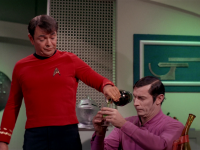
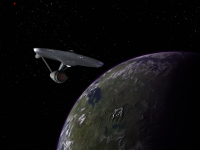
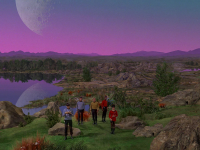
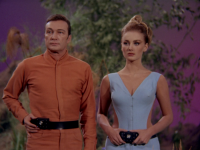
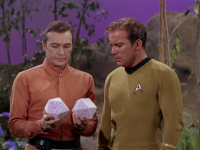
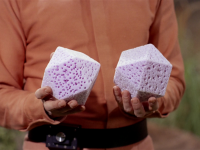
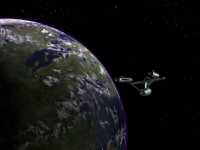
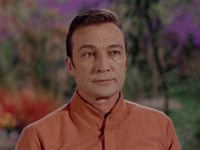
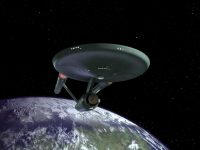
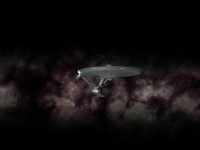
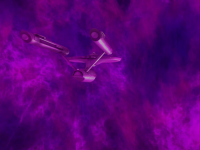
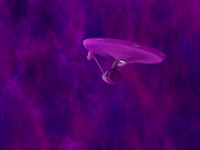
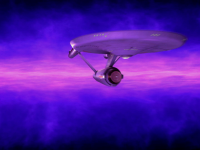
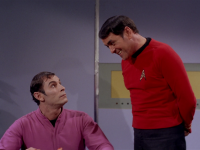
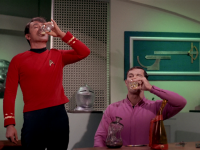
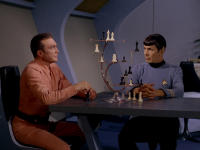
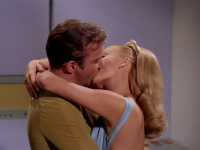
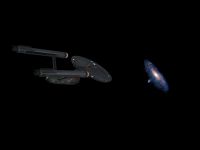
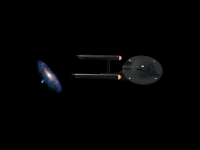
Star Trek TOS - 2x22 - By Any Other Name
Originally Aired: 1968-2-23
Synopsis:
Extra-galactic beings commandeer the Enterprise in an attempt to return home. [Blu-ray] [DVD]
Filler Quotient:
2, filler, but an enjoyable episode nevertheless. You can skip this one, but you'd miss out on some fun.
- There's no essential plot or exposition in this episode that renders it unskippable, but it's definitely a great story nevertheless.
Problems
None
Factoids
- This episode establishes that there are hundreds of uninhabited presumably M class planets which are presumably within the Federation's borders during this time period.
- This episode establishes that due to an unspecified cause, high radiation will make life in the Andromeda galaxy impossible in ten millennia. Although it is not specified whether or not this radiation is only deadly to Kelvans.
- This episode establishes that the mysterious energy barrier at the edge of the galaxy prohibits communication with other galaxies.
Remarkable Scenes
- The aliens thanking Kirk for responding to their distress call and then immediately demanding that Kirk surrender his vessel to them.
- Yeoman Thompson getting killed by the belt weapon.
- Kirk: "Immense beings with 100 tentacles would have difficulty with the turbolift."
- Spock trancing himself into being sick suddenly and all too authentically.
- Spock and Scotty proposing self destructing the ship to stop the Kelvans.
- Rojan announcing that he will execute Kirk's entire crew shortly after they traversed the barrier.
- Scotty's drinking scenes with the Kelvan.
- Spock defeating a Kelvan at chess.
- Scotty: "It's uh... it's green!"
- Spock: "Rojan, you are only a link in a chain following an order given 300 years ago. This is an opportunity for you to establish a destiny of your own."
My Review
Romeo and Juliet, Act II, Scene 2 sports the following iconic line: "What's in a name? That which we call a rose by any other name would smell as sweet." The episode's namesake Shakespeare reference is a metaphor for the fact that while the Kelvans may continue to call themselves Kelvan, they've chosen to take human form and in so doing they are inevitably forced into the totality of the human experience. They begin taking on all characteristics of humanity, including those that they did not expect to adopt, like love, jealousy, and ultimately compassion.
The metaphor is a bit forced and backward given that it is usually meant to convey the idea that language can change our perception of things, but perception is subjective and all things have some objective characteristics which cannot be altered by language. Given that, one would expect the metaphor to work in reverse on the Kelvans and produce the opposite effect on the story. A more traditional interpretation of the metaphor would have left the Kelvans incapable of experiencing what it is to be human because even though they've taken on the appearance of humanity, they cannot fundamentally change who and what they are.
But setting aside literary quibbling for a moment, this is still a terrific story with well conceived science fiction elements. Due to some kind of increasing galactic radiation in the Andromeda galaxy, the Kelvans who are native to the area are preparing to flee their home due to its impending uninhabitability. The next closest galaxy is the Milky Way and they intend to conquer it by force. This is perhaps one of the most epic premises upon which an episode of Star Trek has been built so far and the plot fully explores all the implications of such a grandiose premise.
I can't say I'm happy to see the return of giant energy barrier at the edge of the galaxy which was originally featured in Where No Man Has Gone Before, but at the same time I suppose I'd have been more annoyed if it were conspicuously missing from the episode, as that would have simply been a continuity error. The writing of this episode responsibly deals with its canonical existence and even uses it quite cleverly as a plot device while tactfully not dwelling on the reason for its existence or exploring how it came to be. I'd still like to see an episode dealing with why it's there at some point, but the crisis situation in this episode simply precluded that.
Speaking of long standing issues with the realism of the science fiction on Star Trek, this episode gives us new exposition which either clarifies or complicates the problem concerning why so many aliens in the Milky Way look like humans. It's explicitly stated in this episode that chances are very much against the idea of another alien race evolving to look like humans in the Andromeda galaxy. This implies that there is an extraordinary reason for why so many aliens look like humans in the Milky Way, such as the common genetic heritage hypothesis I outlined in my review of Return to Tomorrow.
Moving onto the actual story, there's a great deal of dramatic detail to praise. For one, while I'm not one to comment much on TV trends regarding gender and racial issues, I was pleasantly surprised to see that given the choice to execute a white girl or a black man, the plot bucked the typical trend by choosing to off the white girl. I also quite enjoyed Kirk's line to Rojan claiming that the Federation has handled foreign invaders before. That threat felt more like posturing than substance; a nice piece of subtle acting from William Shatner.
Perhaps the best dramatic moment of the episode is when Kirk struggles with whether or not to self destruct the ship, ultimately choking on the decision; being unable to go through with it. In my view what we see here is a rare moment of weakness in Kirk. In that moment he had an opportunity to sacrifice his ship to protect the entire galaxy from a formidable threat, but something prevented him from being able to give the order. My suspicion is somewhere in the back of his mind he remained confident that he could thwart the Kelvan threat without destroying himself in the process. This confidence may well have been hubris, or perhaps in that moment Kirk simply feared death and couldn't bring himself to give an order that would take his life and the lives of everyone under his command.
However Kirk arrived at his decision, it ended up being the right course of action. Amusingly, the Kelvans had detected Spock's and Scotty's subterfuge and could have prevented the self destruct if necessary, so all of Kirk's fretting was for nothing. But that removes none of the suspense from the moment, since there's no way Kirk could have known that at the time. After the ship cleared the Milky Way, Kirk seemed to waste no time finding the most beautiful woman in the episode to seduce, as usual. Meanwhile, Scotty's quest to drink a Kelvan under the table provided perhaps the most entertaining scenes of the episode.
Ultimately the resolution of the story was both a piece of clever writing exploring the idea that the Kelvans could be exploited by their newfound humanity as well as true to the spirit of Star Trek in that Kirk refused to abandon his peace proposal throughout the perilous conquest of the Enterprise. The story ends on a note indicating that automated vessels will be sent to the Kelvan homeworld to propose Kirk's peaceful solution, but I have my doubts about that plan's potential for success, even with an endorsement from real, live Kelvans since it is well established that these Kelvans arrived on a generational ship, disconnected completely from a home they never knew.
All in all, this episode has sequel written all over it. I'd love to see a future Star Trek production tackle the return of the Kelvans some time later after having received the message, still bent on conquest. Since few episodes of Star Trek leave me wanting to see more of the aliens of the week, I'd say this episode has earned itself a well deserved place in the above average episodes club.
The following are comments submitted by my readers.
- From Orion Pimpdaddy on 2010-07-07 at 4:08am:
I completely disagree with the scores people are giving for this episode. This is one of the best episodes of the original series. Why? Well, I'll try to prove my point:
-The villian, Rojan, is a very effective opponent for Kirk. Almost as good as Khan. He's cunning and calm, until he starts having feeling of jealously. He's vicious as well, having crumbled one of the redshirts in his hand.
-The crew is completely defeated and faces a perilous situation. In one of the most tense moments, Kirk was about to blow up the ship to stop the Kelvins. The usual sci-fi gimmicks to resolve the situation are thrown out the window at that point, so they have to resolve the situation without the use of technology.
-The takeover by Kirk, Scotty, Bones, and Spock is skillfully done. Each using their own personality to overwhelm the adversary.
-The description of the Kelvans by Spock adds much needed depth, and eliminates the "alien of the week" problem. - From Alan Feldman on 2012-12-20 at 4:06am:
"By Any Other Name"
Great episode, in spite of all its problems.
What's with the energy barrier? What is its origin? I'm with Kethinov on this. And why in blazes can't they just go "over" or "under" it? OK, maybe the barrier envelops the entire galaxy somehow. Nope! Rojan says it's at the rim of our galaxy. Just another absurdity to add to the list.
More "remarkable scenes":
The two that center on the following lines:
KELINDA: Oh. You are trying to seduce me.
KELINDA: Yes. I was wondering: Would you please apologize to me again?
It's pretty amazing seeing our heroes sitting at the table so badly defeated. The hopelessness, despair, anger, and near total resignation about their fate. But then they come up with their brilliant plan for defeating the Kelvans and carry out that plan brilliantly, making this a really fun episode.
But . . .
I really don't think you can have a moon that big so close to the planet. You'd have some serious tidal forces, for one thing.
Converting from 100-limb creatures to humans -- that's quite a feat! And how did they find out so much about humans and the Enterprise and such? And they turned themselves into "textbook humans". And they have the paralysis device. And they can transport themselves around at will with it. And shrink people into polyhedral shapes. Yeah, they're far superior and all that. Yet the energy barrier destroyed their ship. But it's worth going with all this just so that we can have this fun story.
Kelinda's mind, despite now being only "human", can nevertheless propel Spock across the cave. But barely 10 seconds later Kirk grabs her, administers a gentle karate chop to the shoulder, and down she goes.
How can five Kelvans control the entire Federation? Rojan just plainly states it and somehow that's enough. And even if they can, what about the Organians, Klingons, Romulans, Talosians, Metrons, Tholians, Trelane's parents, etc.? Can they control them, too? OK, drop the Tholians.
The Kelvans modify the engines so the ship can go at warp 11. But the ship cannot go that fast in later episodes.
Good luck surviving on just vitamin pills! Really. They're "textbook humans", after all.
Rojan was calm, cool, cold, cruel, plain, straightforward. Well done.
Watching Spock subtly noodge Rojan into jealousy combined with Captain Kirk's fun efforts to push him into a full blown jealous rage was great! I also enjoyed, of course, Scotty drinking Tomar under the table.
Speaking of which, when do enemies like these simply sit down and play a casual game of chess and engage in friendly conversation?
Why did Hanar permit McCoy to give him the shots? And it seemed like a kind of random, out-of-the-blue moment when Hanar confronted Rojan on the bridge. Sort of pointless -- kind of its own self-contained subplot -- but needed somehow. I suppose they had to give Bones _something_ to do.
When Drea neutralized three of the crew on the bridge, one of them was holding one of those Etch A Sketch clipboard things. Actually, I guess its screen is more like a wrinkled version of the gray thing from the same era that you can write on with a stick pencil and erase by pulling up the clear plastic sheet, or something like that. Whatever it is, it didn't make any sound as it hit the floor.
So we have three male and two female Kelvans. And they were going to reproduce for their multi-generational trip back to Andromeda. So that would have been three men sharing two women -- or two women sharing three men. Either way you put it, it doesn't sound like a good idea to me! Maybe Tomar is gay.
Definitely a fun episode. - From Alan Feldman on 2013-12-21 at 4:34am:
More on "BY ANY OTHER NAME"
Man, it didn't take long for the Kelvans to explore our galaxy! They were lucky just to get to that planet in a "life craft". And, while stranded on that planet, with only their life craft, they somehow managed to quickly find out all they need to take over the not just the _Enterprise_, but entire galaxy, to boot! How in blazes did they do that?
More about the energy barrier: Hey, we know there's "dark matter" and "dark energy" in the universe, but we don't have much of a clue as to what they even _are_. If there really were an energy barrier at the rim of our galaxy, we might not know much about it, either. But we presently have no indication that there is such a thing. But assuming it's there, as I said in my last comment, why can't you just go over or under it?
They should send the robot ship just outside the barrier, communicate with the Kelvans in the Andromeda Galaxy from there. Then it can shuttle back inside our galaxy and relay the response to us, and so forth. That should save a lot of time!
Again, this is definitely a fun episode.
AEF, a.k.a. betaneptune - From Scott Hearon on 2014-04-10 at 7:24pm:
This has been one of my absolute favorite episodes, so far. And for some unexpected reasons.
The science-fiction aspects of this story are excellent. The Kelvans are a very interesting race, and the way they are revealed through Spock's thwarted mind-meld was an excellent device. The Kelvans almost conjure up images of Lovecraft's "Great Old Ones," which is terrifying.
The threat that the aliens pose is about as severe as any I've seen in earlier episodes. The sense of powerlessness among the command and crew of the Enterprise is palpable, and the cold-blooded execution of the female red-shirt drives the point home.
The element that I surprisingly enjoyed in this one is the humor. I really haven't been a fan of the humor in Star Trek, since it's almost always exceptionally cheesy and campy. For some reason, though, I thought the gags in this one were great. Scotty out-drinking that ogre of a Kelvan and Spock coolly stoking Rojan's jealousy were comic gold.
One of the best all-around tales of the series, no doubt. - From Chris on 2018-03-20 at 6:45pm:
Loved this episode!
Emotionally swings from horror, sadness, and despair, to hilarity and ultimately triumph!
Now, on to my nits! ;-)
These are shapeshifters who apparently will retain the form they've assumed after several weeks. There was a little contradiction to this in the beginning though when Rojan was talking to Henar about returning home. At least it sounded like that to me. Perhaps they were unaware of this quirk?
The question about the barrier at the rim of the Milky Way always struck as odd. If light can pass through the rim, then so should things that move FTL... at least that's MY science!!! ;-)
I found it weird that the Kelvins felt the need to construct such a kick-ass and overly complex jail cell when they could have simply frozen the crew until needed.
There are other obvious nits, but they've been addressed in the other reviews and comments.
One quote that sort of started all the hilarity for me was McCoy: "If he keeps on reacting like that, he's gonna need a diet..."
He seems to get a lot of good one-liners! "He might take up knitting, but nothing more serious than that!" Ha!!! Gold, man!
Awesome episode!!!
On another note... Mr. Feldman's comment got me to thinking about Dark Matter and Energy.
Perhaps Dark Matter is purely made up of 'Gravitons' which hold galaxies together, and Dark Energy is made up of 'Anti-Gravitons' which pushes most galaxies apart! I realize that no one has ever observed 'Gravitons' before but to me, this explains a lot. Perhaps they really exert a very strong force, but are so few and far between, their net exertion is very little... and are thus VERY hard to detect? Kind of like lasers... not much effect until one is pointed at your light receivers!
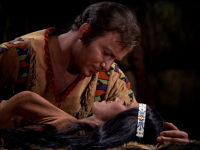
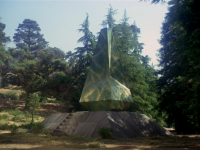
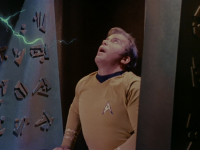
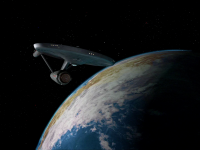
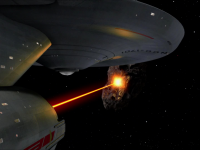
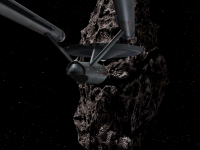
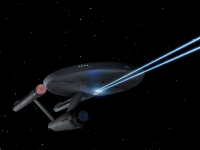
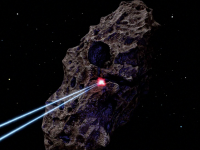
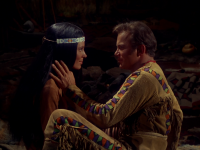
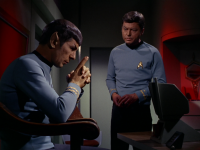
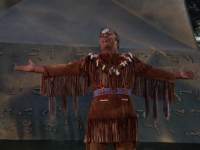
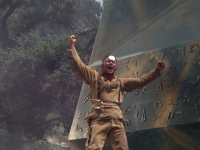
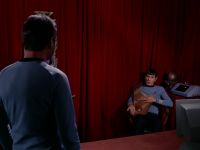
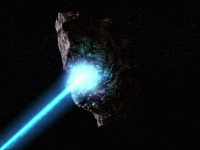
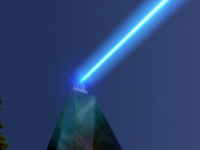
Star Trek TOS - 3x03 - The Paradise Syndrome
Originally Aired: 1968-10-4
Synopsis:
Kirk loses his memory and begins a life in a native village. [Blu-ray] [DVD]
Filler Quotient:
2, filler, but an enjoyable episode nevertheless. You can skip this one, but you'd miss out on some fun.
- There's no essential plot or exposition in this episode that renders it unskippable, but it's a decent episode, even though it could have been better.
Problems
- It's mentioned that the asteroid deflector stops the wind and thunder in order to save the tribe. But why would there be wind and thunder in the first place? It's an asteroid impact, not a thunderstorm.
- This episode incorrectly refers to the Vulcan mind meld as a "Vulcan mind fusion."
Factoids
- This episode establishes that sustained flight at warp 9 is very straining for the Enterprise's engines.
Remarkable Scenes
- Spock's rather elementary school explanation of asteroid deflection to McCoy.
- Kirk giving the drowning boy CPR and then being revered as a god for saving him.
- Spock attempting to destroy the asteroid.
- Scotty bemoaning about Spock's heavy demands on the ship's systems.
- Spock continually ignoring McCoy's advice weeks later.
- Spock deciphering the symbols on the alien monument.
- Spock's mind meld with Kirk.
- The death of Kirk's wife.
My Review
The Paradise Syndrome tackles basically the same "captain burnout" issue as Shore Leave except it attempts to do so dramatically rather than comically. The drama is effective, but the episode overall doesn't work as well as its funnier predecessor for a few key reasons.
The most annoying gaffe in the story is pretty much anything that comes out of McCoy's mouth up until close to the end. In the beginning he fails to understand the most elementary concepts about their asteroid deflection mission and Spock is forced to take considerable time in the middle of a crisis situation to explain these basics to him. Then McCoy has the audacity to complain to Spock about failing to destroy the asteroid, putting the ship at risk, and leaving Kirk on the planet despite the fact that 1. McCoy creating delays only made their problems worse and 2. Spock's decision to immediately attempt deflection of the asteroid was the right move. If McCoy had been paying attention he'd know that. Luckily, McCoy swallows his pride and admits that he was wrong late in the episode, but after all that the apology feels somewhat hollow.
Unfortunately as annoying as McCoy was, he was partially right about one thing: why didn't they keep looking for Kirk? Granted McCoy wanted the whole ship to stay and search for Kirk, but there is a middle ground between McCoy's position on the issue and Spock's: they could have simply left a search team on the planet, then immediately warped out of orbit to deflect the asteroid while the search team searched for Kirk. Perhaps Starfleet regulations prohibit such a course of action, or perhaps there was not sufficient time to properly equip a search team, but someone should have mentioned this.
Another point of vagueness was how Spock cracked the language of the obelisk to begin with. The eureka moment is when Spock claims the language is more music than language, but that doesn't really explain anything at all. Musical notation is a form of written language like any other, so since he couldn't know which symbols corresponded to which musical notes, the problem is analogous to not knowing which letters in an alphabet correspond to which phonetic sounds. Thus, I have a hard time believing Spock could have cracked any of that language based solely on what exposition is in the plot. I suppose some universal translator magic could have done most of the work for him once Spock simply asked the computer to translate it as music rather than language, but that seems like a stretch.
And then there's the almost-but-not-quite Hodgkin's Law moment in the teaser. After all the Earth-like planets we've seen by this point it's vaguely ridiculous for the characters to be spouting lines about how incredibly improbable it is for the planet of the week to have flora so closely mirroring Earth's. I groaned when McCoy saw the natives and referred to them as "American Indians" and Spock replied that they were, without wondering even for a moment how Native Americans could have ended up on some random planet far from Earth. As the episode progresses it does offer us a coherent explanation though: the aliens are actually humans descended from Native Americans. They were brought here by an alien race called "The Preservers" ostensibly to save them from extinction.
As McCoy points out, the historical existence of The Preservers goes a long way towards explaining why there are so many human-like races throughout the galaxy. In that sense, this episode joins Return to Tomorrow in rationalizing that unlikely fact of the Star Trek universe. Perhaps many ancient races have seeded humanoids throughout the galaxy. The Preservers went the extra mile though, furnishing our Native American friends with an asteroid deflector! Handy. I was amused that they integrated the technology into their religious superstitions and I enjoyed how Kirk's foggy recollection of his society's technology made him seem godlike to them.
However, there is something of a dark side to that story point as well, as the episode at times verges on racist stereotyping. For starters, the Native Americans are referred to as American Indians and their entire society is portrayed mostly as noble savages while the plot goes out of its way to make Kirk, the white character, seem superior with numerous scenes depicting how the natives are amazed by such simple things as Kirk's improvised lamp or even the construction of his uniform. Even with amnesia Kirk is regarded as godlike for his superior abilities and when the tribe realizes Kirk is not a god, they react violently and irrationally, even killing one of their own. I don't know if the writers meant it to come across this way, but the sheer number of questionably stereotypical details is hard to miss.
That said, sometimes stereotypes can be amusing and the one I'm most fond of is Kirk's machismo womanizing. This time he even got the girl of the week pregnant! Way to slip one past the goalie, Kirk! Indeed, like the pregnancy, the episode has a lot of highly original details. Kirk's amnesia, the asteroid deflection mission, the sheer amount of time covered by the plot, and even the episode's score (for once) were all refreshingly original. Overall if you can withstand the racial stereotypes and McCoy's borderline incompetence, the episode is a fun and refreshing change of pace.
The following are comments submitted by my readers.
- From rpeh on 2010-07-14 at 8:59pm:
"Beam us up, Mr. Scott", said by Spock is the closest to "Beam me up, Scottie" to which Trek ever comes. - From jeffenator98 on 2013-05-17 at 7:49pm:
God awful. 2/10 - From Scott Hearon on 2014-04-11 at 10:54am:
I gave this one a 5/10. There were some interesting elements to the plot, but far too many nuisances.
As Kethinov points out, McCoy was made out to be an utter moron. This is one of several episodes I've seen where the screenwriter clearly just wanted an excuse to have McCoy argue with Spock, even at the expense of McCoy's intelligence. They took it absurdly far in this one.
I had EXACTLY the same thought about the musical notation. I don't care how intelligent Spock is - without some sort of baseline "key" or Rosetta Stone, there is absolutely no way that he could have discerned what kind of language he was looking at.
Also, how exactly did the natives know that their "machine" had stopped working? And their violent stoning of "Kurok" and his woman was a laughably odd change in attitude.
The general plot was, however, a decent one. Having Kirk become amnesiac and go native was interesting, even if the native culture wasn't exactly very novel. And I do like the span of time that's covered, as it gives the story arc time to settle in and for major changes to occur organically within a single episode.
At this point, I think that Scotty has become my favorite character, along with Spock. - From jd_juggler on 2015-03-28 at 2:35pm:
Pretty amazing coincidence that the "password" to open the obelisk just happened to be "Kirk to Enterprise". And what possible purpose could there have been for the builders of the obelisk to have included that "amnesia" button that could be triggered by an unwary occupant? Lastly, about the enterprise: an asteroid hurtling through space is not going to be traveling anywhere near the speed of light. The enterprise crew must have screwed up pretty badly to reduce the engines to such a state that it couldn't travel faster than an asteroid for several weeks. And why couldn't Scotty restore the warp drive engines in all that time? He's never failed to do before or since, and there were LOTS of episodes in which the engines were burnt out. For that matter, how DID he repair the warp drive after finally returning to the planet and rescuing Kirk? Oh, and what a coincidence that the enterprise could travel EXACTLY as fast as the asteroid, without gaining or losing ground, over several weeks. - From McCoy on 2016-11-13 at 5:28pm:
Horrible episode. For me it was one of the worst TOS stories ever. And more about McCoy's incompetence - why he didn't save the girl's life? Remember the movie - his pills made new kidney grow! And here he just gave up and did nothing. I woud expect more of future medicine...
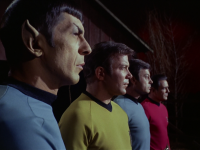
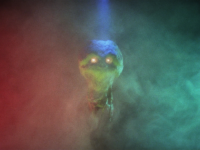
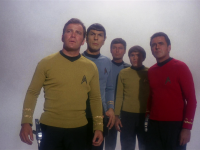
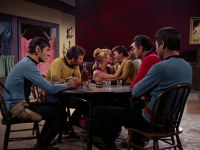
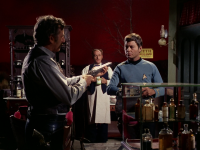
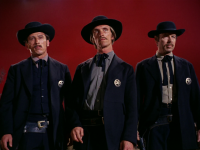

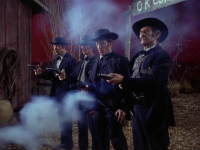
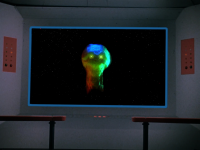
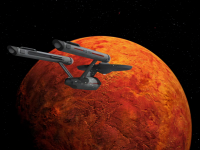
Star Trek TOS - 3x06 - Spectre of the Gun
Originally Aired: 1968-10-25
Synopsis:
As punishment for trespassing, Kirk and crew are forced to re-enact the shootout at the OK Corral. [Blu-ray] [DVD]
Filler Quotient:
2, filler, but an enjoyable episode nevertheless. You can skip this one, but you'd miss out on some fun.
- There's no essential plot or exposition in this episode that renders it unskippable, but it's a decent episode, even though it could have been better.
Problems
- When Chekov is with Sylvia and she proposes marriage, there are several shots that cut between a left angle and a right angle of the two sitting on the bench. Whenever it's from the left angle, her arm is around his. Whenever it's from the right angle, her arm isn't around his. It goes back and forth like this a few times.
Factoids
- DeForest Kelley, who plays Dr. McCoy, has a history of portraying the Wild West characters from this historical event, as he has also played Ike Clanton in a 1955 episode of You Are There as well as Morgan Earp in the 1957 film Gunfight at the OK Corral.
Remarkable Scenes
- The probe warning the Enterprise to leave in the native languages of every crewmember.
- Chekov diving into his role.
- Kirk trying to tell the bartender who he really is.
- Kirk trying to tell his enemies who he really is.
- Kirk and his crew trying to leave the city.
- McCoy meeting Doc Holliday.
- Chekov's "death."
- Spock mentally preparing Kirk, McCoy, and Scotty for the battle.
- The crew standing there while the bullets do nothing.
- Kirk regarding Chekov: "Perhaps that explains why he's here. Nothing was real to him except the girl!"
My Review
The Enterprise encounters a xenophobic race, brazenly ignores their warnings to go away, and faces the consequences they rightly deserved. Kirk's decision to arrogantly ignore the aliens' wish to be left alone was bad enough, but setting foot on their frigging planet on top of that was downright unforgivable. Though without Kirk's brazen act of trespassing, this wouldn't have been much of an episode, now would it?
That said, this episode is the first to explore the power of illusions in a sufficiently novel way since The Cage and does so just as masterfully, if not better. Unlike The Cage, the landing party is well aware that they're inside an illusion right from the beginning, so the focus is instead on figuring out how deep the illusion goes. The delightfully incomplete nature of the sets reflect this conundrum in a strikingly visual way, as the illusionary town of Tombstone is comprised of fragments of buildings missing most walls, exposed to an eerily alien red sky. I suppose it's pretty obvious that this stylization was a budget saving move, but I'd say it's a well earned one, as it added a surrealist quality to the drama which enhanced the discomfort and out of place feeling that the characters struggled with.
The most striking detail of the story is Spock training the landing party to disbelieve the illusion, thus robbing it of its power. This nice piece of writing manages to be both the episode's most dramatic story point when it climaxes in the gunfight scene as well as the episode's funniest story point when we discover at the end that Chekov hadn't in fact died because he never took the whole situation seriously to begin with. The constant sense of dread the rest of the landing party experiences as the episode builds to its climax was overall well played; I enjoyed seeing them try so many different things to avert their fate with each attempt failing in rapid succession as the clock ticked closer and closer to five o'clock.
Unfortunately for the plot, however, the gunfight at the real OK Corral didn't actually occur at five o'clock. It took place near the hour of three o'clock instead. There were other historical inaccuracies as well. For instance, the gunfight is depicted as taking place just outside the OK Corral, but in reality it took place some good distance away near Fly's Photographic Studio. Also a sign visible in this episode at one point noted Wyatt Earp as the marshal of Tombstone. However it was actually his older brother Virgil instead in reality. Wyatt was only a deputy marshal. Finally Kirk during one part of the episode made a big point about how Billy Claiborne (the character Chekov played) was the only one of their crew to survive the gunfight, but apparently Kirk had forgotten that his own character, Ike Clanton, also survived.
I suppose all of those historical inaccuracies could be chalked up quite easily to the aliens having created the scenario from Kirk's inaccurate recollection of history, but unfortunately nobody else seemed aware of all of these errors either, even despite Spock's apparent expert knowledge of the period. Not all of the errors in the plot logic are confined to historical inaccuracies though. Another notably odd detail was the whole subplot when the landing party refused to trust their illusionary guns so they resorted to trusting the other illusionary resources at their disposal instead, which is a striking error in reasoning because if you can't trust the illusionary guns, why would you think you could trust anything else in that illusionary world?
I was also a bit put off by the scenes when the landing party all mourned Chekov's death. There's a ticking time bomb about to go off in their faces and they're all more interested in talking about their feelings for an extended period of time? How silly. Spock had every reason to be annoyed with them all. A final odd detail of the plot was that curious scene when the alien message is noted as having been broadcasted in the native languages of everyone on the ship. It's implied that the alien telepathy enabled that. However, what I find curious is the fact that the crew could tell the difference between an alien speaking in an alien language with the universal translator translating it as opposed an alien speaking the native language of various crew members. This implies that however the UT works, it isn't entirely seamless. Whenever it's translating an alien language on the fly for you, you can tell when it's working its magic and when it's not.
As for the ending, I felt that it was weaker than The Cage's. In The Cage, the aliens learn something. In this episode, the aliens are just engaging in some bizarre test of the Enterprise's resolve and the plot grants little insight into their motives. By the end of the story a magic switch is flipped and they suddenly go from being xenophobic to welcoming a Federation delegation simply because the landing party saw through the illusionary danger they created. But even though the aliens of this episode were less well conceived than those of The Cage, this episode managed to be a bit more entertaining simply due to all the fun aesthetics and psychological tricks noted above. As such, I would declare this episode the superior story of the two, by a hair.
The following are comments submitted by my readers.
- From Orion on 2011-04-01 at 2:06am:
I'm always tempted to skip this one because I can't stand westerns, but this episode goes beyond the standard "put crew in earthlike situation." It stays focused on one thing, the upcoming moment of dread for Kirk and the landing crew. They try so many things to avert their fate, but all of them fail, say one. Kind've gripping for a third season TOS episode. - From Blob on 2012-03-25 at 12:02pm:
I thought the aliens were suddenly friendly at the end because Kirk refrained from killing his adversaries at OK Carrol. This showed them that human beings are decent.
I liked the alien's design btw. It was eerie and effective. - From Andrew Wiltz on 2012-04-06 at 10:27am:
Another problem with this episode:
In the 1880s reality they were forced into, the cause and effect ties directly into the belief of the victim (Checkov dying because he "believed" the bullet was real, and the rest of them not dying because they "believed" the bullets were unreal)
However, when Scotty tests the tranquilizer on himself, he believed it would work - but it did not. Is this not a contradiction? - From Alan Feldman on 2013-04-05 at 1:59am:
"Spectre of the Gun"
Spock says, "History cannot be changed." Say what? As ridiculous as it sounds, history _was_ changed in all their time travel episodes (albeit "restored" in the end). And there weren't buildings with missing walls and our heroes "playing" the Clantons in Star Trek uniforms in Tombstone AZ, and so on. Strikes me as somehow different.
I think it's awesome when Kirk fails miserably to convince various townsfolk that they are not the Clantons.
Chekov "died" because he believed the bullet was real? Please, that's just plain ridiculous.
Kirk says he can't just kill or murder the Earps and Doc Holliday, but in other episodes he killed "humanoids" in self-defense, which is what this would have been.
At the end of the episode when the Earps and Doc Holliday are walking toward our heroes in the corral, they keep appearing in a different order; it changes with every shot!
Notice that the bullet holes behind our heroes aren't really in line with them and the Earps. Well, that's how it looks to me.
AEF, aka betaneptune
- From Scott Hearon on 2014-04-11 at 6:27pm:
Eh. I gave it a 5/10.
This episode, though not having any massive problems, is rife with little ones. Like Kethinov points out, the crew's belligerence about forcing themselves on the aliens is out of character and rather contrary to the spirit of Star Trek. "No" means "no", boys.
The idea of using a Western setting seems little hokey and odd (further justifying my semi-serious theory that many Star Trek episodes' plots were dictated by whatever set pieces were laying around the film studios that day. "Hey! There's a bunch of cowboy stuff left over from yesterday's episode of 'Bonanza'! Let's use that!!").
The exploration of reality is interesting enough, but they seemed to drag out the resolution to a length that defies some logic. The crew, Spock included, very quickly recognized the aliens as "pure telepaths." As such, it seems that at least Spock would have figured out that the things they were seeing and experiencing were illusory. It probably shouldn't have taken Chekhov's "death" and the failure of the gas grenades for him to figure it out.
The recognition of McCoy that humans will always have doubts about reality was a very intelligent touch, and having Spock use the mind meld to assist them was intriguing.
Decent episode, but not one of the better ones I've seen. - From Chris on 2018-03-23 at 6:01pm:
I really like this episode though of course, it has its problems!
Your first paragraph pretty much describes EVERY episode of just about EVERY TV show ever put on the air!
Everything is contrived to make something interesting, and it's not any different than Hitchcock's 'Dial 'M' for Murder' where the protagonist states that every crime book is written so contrived that the hero has to solve things the way they unfold!
My nits with this episode are mostly regarding the Melkot's interpretation of what they see in Kirk's thought record from which they derived the scenario. The town, to me, looked exactly like how one might dream a place, and so I was amazed at how good that was done!
On the other hand, why is 'history' so carved in stone? Especially in Spock's mind?!?
They are getting their 'history' from Kirk and no one else! He could've imagined fairies dancing around for all they knew!
Again, the show is contrived to play out how it did, and I really liked it!!! Nice guns, man!!!
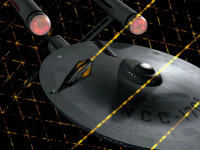
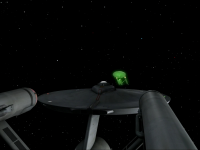

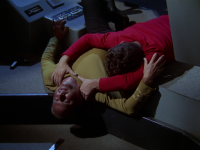
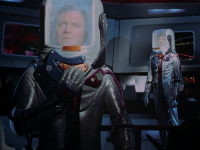
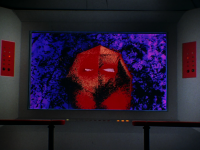
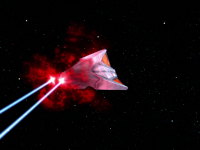
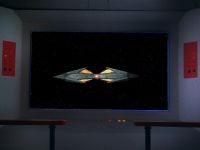
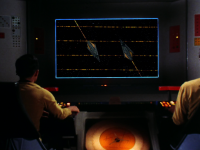
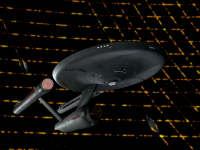
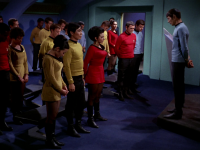
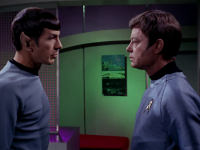
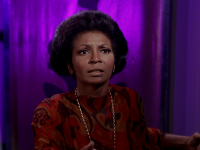
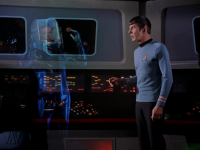
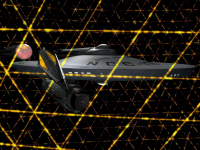
Star Trek TOS - 3x09 - The Tholian Web
Originally Aired: 1968-11-15
Synopsis:
Kirk is trapped in interphase, while the Enterprise is trapped by a powerful energy web. [Blu-ray] [DVD]
Filler Quotient:
1, partial filler, but has important continuity. I recommend against skipping this one.
- This episode (along with Mirror Mirror) is the core premise to Ent: In A Mirror, Darkly. The Tholians are also curiously referenced repeatedly in later Star Trek series.
Problems
None
Factoids
- This episode establishes that there has never been a mutiny on a starship before, or at least no record of one.
Remarkable Scenes
- Chekov freaking out.
- Spock's discussion with the Tholian.
- Spock battling both the Tholians and McCoy at the same time.
- Kirk's recording for Spock and McCoy.
- Uhura pleading with McCoy about having seen the captain and McCoy not really believing her.
- McCoy discovering the antidote.
- McCoy and Spock lying about having heard heard Kirk's last orders.
My Review
The Tholian Web is a cleverly written story which makes prominent use of an unusually large set of characters and multiple plot threads. While the Enterprise is engaging in an already dangerous rescue mission and investigating what befell the crew of the Defiant, an aggressive alien race called the Tholians attacks them for trespassing into what they claim is their territory. Interestingly, neither of these two events seem related to one another, which is a nice surprise. Whatever happened to the Defiant is clearly implied to be the result of a natural phenomenon. The intolerant Tholians are just an inconveniently timed distraction.
But while battling the Tholians Spock must also battle McCoy whose characteristic and predictably endless criticisms of Spock's command decisions rear their ugly head once again. Toward the end of their bickering McCoy crossed the line several times by claiming that Spock had no good reason to fight the Tholians and that Spock's only motive was to secure permanent command of the Enterprise from Starfleet. Luckily, Kirk's "last orders" recording brought some sanity back to their work relationship.
There are a few other unsavory details as well. For instance, early in the episode it's mentioned that while the crew can visually identify the Defiant, that sensors are reporting that it's not there. Once again like my complaint from Operation: Annihilate! do sensors just not measure visible light? What a silly line. Likewise, at one point McCoy uses a hypospray on Kirk through his space suit! Must be a powerful device. Finally, toward the end of the episode Uhura looks over to Chekov who is screaming like an idiot. She looks over to McCoy and asks him "will I become like Chekov?" No Uhura, you won't. Because your character is better acted!
The two biggest gaps in the story though are the fact that we never learn what exactly befell the Defiant and its crew as well as the murkiness surrounding how the Enterprise escaped the Tholian web. I was actually pretty damn annoyed with how they escaped the Tholian web. All that's said is using the ship's power somehow propelled them out of it. We see some brief visuals which might indicate they passed into the alternate dimension which claimed the Defiant, then suddenly the Enterprise is back in normal space, thrown clear of the Tholians. How convenient and vague.
All things considered though The Tholian Web was a terrific episode. The pacing was great, the judicious use of minor characters was a welcome surprise, the Tholians with their unique (if oddly slow) weapon made an intriguing enemy, and trapping Kirk off the ship during the crisis added heightened drama. I certainly wouldn't mind seeing the Tholians again or seeing a followup episode that tells the story of what happened to the Defiant. All in all with a bit more polish and attention to detail, this already terrific episode could have been worth even more points.
The following are comments submitted by my readers.
- From Arianwen on 2010-08-07 at 11:29pm:
I don't know, I find this episode very entertaining and good sci-fi. It seemed very original - no clichés that I noticed, and multiple plotlines. The idea of 'space distorting' and actually causing the psychosis that killed the Defiant's crew was interesting, and a welcome surprise (after innumerable episodes infested by mysterious diseases, finding a dead crew *not* killed by disease was quite a shock). The Defiant and the Captain being dragged into a parallel universe gave the plot added depth and complexity, not allowing the crew or us to focus on the one problem.
It would have been nice, though, to see a little more of the Tholians. They too felt original - they actually *listened* to Spock's explanation! - and it's a pity we never hear any more from them. But I mark it as a sign of a good episode that I was left with questions rather than complaints. - From Orion on 2011-09-05 at 2:50am:
This episode felt like too many people were involved with the script. There's too many things going on, and their combined mass ends up hurting the storytelling.
You got Tholians, but not much explanation about who they are
You got an energy web, but almost no talk about what it actually does
You got McCoy being belligerent toward Spock, with no real resolution to the conflict
You got crew member turning hostile
You got the captain floating around like a ghost
Instead of having so many plotlines, they should have saved some of them for another episode. The plot about Kirk floating around the ship should have had the most playtime since it was the most creepy, but instead it takes a backseat to all the other stuff. All in all, I think Tholian Web was a missed opportunity. - From Andrew Wiltz on 2012-04-08 at 3:15am:
In episode 2 of season 3 of TOS, "The Enterprise Incident," it is established that Vulcans cannot lie.
However, Spock rather blatantly lied directly to the captain in this episode. Spock is half human, so perhaps this rule (which may not even be a rule) doesn't apply to him. - From Rick on 2014-04-01 at 5:09am:
To the reviewer: yes of course the enterprise can measure visible light, its called the view screen (which is presumably fed by external cameras). I think when spock references "sensors" he is not including the view screen because obviously they are looking right at it. - From Kethinov on 2014-04-01 at 5:46am:
Rick, the point was it's pretty ridiculous to assume that the sensors can't measure visible light. - From jd_juggler on 2015-04-19 at 6:46am:
This is a typical low-budget third season episode. Not horrible, but well below average. Rather convenient, isn't it, that McCoy's hand passes through a man's body, and a table, but nobody's feet pass through the floor? Also, neither Uhura not Scotty mentioned that they could see through the captain, a rather important detail, I would think. It is also curious that Kirk's oxygen was running out - yet in TNG we learn that Scotty was trapped for decades in a "pattern buffer", apparently without needing oxygen at all. Also, just before Uhura saw the "ghost" captain, she was doubled over in pain - a symptom she appararently never discussed with the doctor. She seemed physically fine when she ran into McCoy in the hall, and aside from an apparent hallucination, she was nothing like checkov, the lab technician who attacked McCoy, and the crewman who flipped out in engineering, all of whom were completely out if their minds. So why was Uhura admitted to sick bay?
- From thaibites on 2015-07-30 at 7:03pm:
This episode fails for me because of Bones. His treatment of Spock is absolutely ludicrous. He's just over the top, and Spock should've beaten the living crap out of him. But that's the whole problem with Bones always needling Spock - he knows Spock won't kick his ass. Bones takes advantage of this because he is a bully and a gutless coward.
I grew up with TOS and remember not liking Bones' miserable, whining, bitch-boy attitude, and this episode makes me dislike him even more. Bones and Pulaski can both sod off! - From Rick on 2017-02-17 at 3:05am:
Kethinov: Yes, I get that. I just think when conversing on the bridge where time is of the essence, Spock need not tell Kirk that "every sensor other than the visible light which you can clearly see in the viewscreen cannot detect what is out there." I think we all understood what was going on.
Hate to say it, but I think you missed this one again. The crew of the Defiant fell prey to the same space sickness that the crew of the Enterprise began to experience. We dont know why they stayed in that space for so long for the effects to happen, but it is a safe bet that it was to investigate the strange dimensional phenomena. - From Chris on 2018-03-25 at 7:34pm:
I'm in complete agreement with thaibites on McCoy. Bones should've been thrown in the brig for insubordination. Then Kirk should've kicked his ass once he was saved...
Shatner gives another emotional speech similar though not as stirring as his in 'Return to Tomorrow'. I really liked the speech and one would expect that Bones would've followed his beloved hero's orders and obeyed Spock without question! Instead, he goes back to his whiny needling and should have been phasered into that other universe!!!
Other than my gripes about McCoy the episode is great! He really ruined it though and makes it hard to sit through...
- From Michael Plunkett on 2019-10-21 at 3:25am:
Spock lied to Kirk at end of episode????
Spock was not human enough to lie and to lie to the captain would be a violation of his personal moral code and Star Flight regulation.
How can Spock lie to Capitan Kirk????
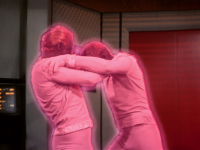
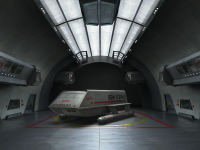
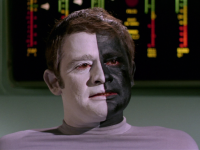
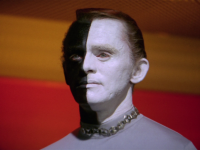
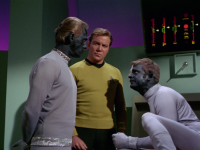
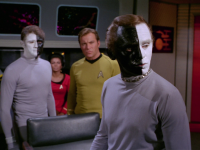
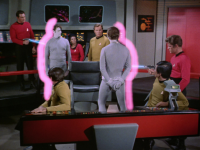
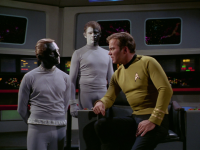
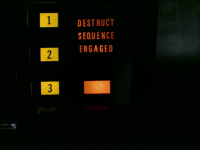
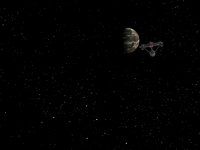
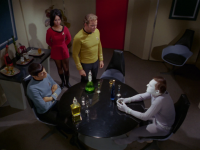
Star Trek TOS - 3x15 - Let That Be Your Last Battlefield
Originally Aired: 1969-1-10
Synopsis:
Two survivors of a devasted planet remain committed to destroying one another. [Blu-ray] [DVD]
Filler Quotient:
2, filler, but an enjoyable episode nevertheless. You can skip this one, but you'd miss out on some fun.
- There's no essential plot or exposition in this episode that renders it unskippable, but it's a decent episode, even though it could have been better.
Problems
- In the original airing of the episode they reused special effects from The Galileo Seven for the shuttlecraft shots. However in The Galileo Seven, the shuttlecraft bore markings which clearly indicated it as one of the Enterprise's shuttles. Reusing that shot would seem to suggest that the Galileo for some reason was now stationed at Starbase 4, with its registry having never been updated, which didn't make a lot of sense. However, in the remastered version of the episode, new visual effects were added replacing the original shot with a new shuttle named da Vinci with its registry number being SB4-0314/2, clearly indicating that it's a Starbase 4 shuttle.
Factoids
- Lokai and his people hail from what is described as the "southernmost" part of the galaxy. They seem to have extensive knowledge of the Federation which implies that the borders of the Federation and Lokai's planet are relatively close to one another. All this would seem to imply that the Federation occupies what has been arbitrarily designated the south of the Milky Way.
Remarkable Scenes
- Kirk's first conversation with Lokai. I love how blatantly hostile Kirk is.
- Kirk playing mediator.
- I love the scene where the auto destruct sequence was being set. Some interesting camera work there.
- Kirk: "Mr. Spock, is this ship headed for Ariannus?" Spock: "Negative, captain. The Enterprise is now moving in a circular course." Scotty: "And at warp 10 we're going nowhere mighty fast."
- Chekov: "There was persecution on Earth once. I remember reading about it in my history class."
- Seeing Cheron a dead planet.
- Spock: "All that matters to them is their hate." Uhura: "Do you suppose that's all they ever had, sir?" Kirk: "No. But that's all they have left."
My Review
This episode is an intriguingly stylized satire of racism; black vs. white racism of the real world in particular. The half-moon aliens do a nice job of demonstrating the innate silliness of racial prejudices by creating a racial difference between the aliens that seems so insignificant to us and yet so significant to them as to automatically shame us for ever having acted like them. That's the power of a science fiction story on society: the power of analogy. These aliens would have been a ridiculous analogy in a real world 19th or 20th century debate on race relations, but in the world of Star Trek where many more things are possible they're not so ridiculous after all.
Sure, the whole idea that such a skin pigmentation would ever be favored by natural selection seems patently ridiculous, but Spock wastes no time pointing that out early in the episode. As long as the story itself acknowledges how unlikely such a thing should be before brazenly going with it, I suppose I can live with it. The layers of absurdity are even nicely staggered. At first Spock assumes that Lokai must be one of a kind for his species. Then when the commissioner comes aboard, Spock is amazed and struck with near-disbelief that all their people must have evolved to be this way and it isn't just a fluke.
Likewise, Spock points out one of my favorite medical cliches to pick on: McCoy is once again using Federation drugs on an unknown alien. I loved McCoy's response insisting that most humanoid life forms have similar anatomy; the blood may be slightly different and the organ configuration may be slightly different, but medical principles are largely sound across species. I also loved the fact that McCoy conceded the fact that it's hard to give a prognosis on a totally unknown alien despite the anatomical similarities. This is the sort of careful scriptwriting that should have been present in earlier episodes.
As for the story itself, I enjoyed the details concerning extradition law, which made a lot of sense for the situation. The Federation's policy on trying Lokai for his domestic crime before considering extradition back to Cheron certainly seemed reasonable and I thought the off the record note that the Federation would most likely grant extradition after his trial in the Federation was a nice touch. It added some humanity to the usual faceless bureaucracy.
Sadly that nice detail was somewhat undermined by the fact that neither of the half-moon aliens seemed content to wait out Federation due process and mediation. They've been keeping chase for some 50,000 years and yet they acted with such impatience while aboard the Enterprise. If they've been at it that long, why not wait a short while longer to see the process through to the end legally?
At least the commissioner had the good sense to let Kirk complete his humanitarian mission before irrevocably commandeering the ship for a course to Cheron, but it all could have been done with considerably less fuss. Although the manufactured drama did give us an opportunity to explore that delightfully overwrought self destruct scene. The camera work in that scene was a lot of fun although not all of their directoral experiments were a success. We've also seen the unwelcome return of the camera zooming in and out on the red alert light, which is nauseating and serves no purpose.
You've got to wonder how Kirk even knew the commissioner wouldn't be able to stop the auto destruct sequence when he had already displayed what appeared to be limitless control over the ship's systems by that point. Maybe it was a desperate bluff. The half-moon aliens had some pretty vaguely overwrought technology at their disposal in general. Throughout the course of the episode they displayed immunity to phasers, apparent telepathic control over the ship's navigational systems, and somehow temporarily enhanced the warp drive to safely fly faster than its typical capabilities.
Although the Enterprise itself possessed some pretty overwrought capabilities as well. I cringed a bit when the Enterprise somehow globally decontaminated Ariannus entirely from orbit in the space of a minute or two. That's some powerful tech.
Other logical oddities of the story include the scene when Lokai gets up and walks out of sickbay without anyone noticing. Apparently no one was guarding the Federation's detained prisoner scheduled to be tried for grand theft shuttlecraft. Likewise, it's kind of ridiculous to assume that not a single survivor was left on Cheron. Even a total nuclear war would leave some survivors, huddling together far from the blast sites, living off of subsistence farming or something. Though given the overwrought technologies of the episode, perhaps they were all killed by some kind of super-effective biological weapon released into the atmosphere globally all at once like the Enterprise's Ariannus decontaminator.
One final amusement: you've gotta love the cost cutting tricks in this episode. An invisible ship saving them from needing a ship model, the destruction of Cheron which is actually just stock video from World War II, and the fact that we never actually see the half-moon aliens on the surface of Cheron ever. The Enterprise just cynically leaves orbit and dooms them to their mutual annihilation. I can't blame Kirk for doing that, honestly. They've been such poor guests, why bother saving them from their self-inflicted fate? Indeed it's an effective satire of racism. With more polish I have no doubt that this episode could have easily been worth a perfect or near perfect score.
The following are comments submitted by my readers.
- From Steve on 2009-04-17 at 2:29pm:
Best feature: a great performance by Frank Gorshin,an excellent actor and impressionist who was also the Riddler on the original Batman series. - From John bernhardt on 2010-01-08 at 9:33pm:
What made Original Star Trek episodes so entertaining was that most episodes even the weaker and average episodes had some memorable scenes, in this episode it is the dramatic auto destruct sequence - From rpeh on 2010-07-16 at 10:00pm:
One problem: the shuttle "reported stolen from Starbase 4 two weeks ago" has NCC 1701/7 (ie, the Galileo) on its side. Why would an Enterprise shuttle have been stolen from Starbase 4?
The camerawork focusing in on the eyes during the self-destruct sequence is the most obvious example of Gene Roddenberry's "western in space" view of the series. Remember the final duel in The Good, The Bad and The Ugly, released just a couple of years before? - From Chris on 2011-06-17 at 10:27pm:
Just saw this episode the other night. The enhanced version deletes the WWII footage. - From Kethinov on 2012-01-17 at 1:44am:
Chris, that's not correct. The footage is still there. Examine the chase scene intercut with the fire. - From sherry on 2012-02-26 at 7:21pm:
This one seems we can make a continuation of this show,,,,
I have been working on it a bit,,,,,
I call it the last Battlefield continuation
I started to make a doll I painted her black and pink,,, same color with her hair,,,, I've been doing this for a little while,,, pink and black boots ,,,, I sew her a uniform,,,, I also made a flag for the cheron,,,, and a flag,,, and even symbol,,,,, and I'm trying to make a language as well,,,,, this is a lot of work,,,, I'm trying to pretend they all went underground,,, and that there was only 30 of them while,,,,, I would say that's a pretty good start,,,,, I also have a main character,,, then I'm working on,,,,
if anybody's interested,,, go to space trek,,, this is where I'm leaving it,,,, they can contact me at ,,sherry63@telus.net,,, anybody's interested,,,,,
- From Orion Pimpdaddy on 2012-03-22 at 3:50am:
The episode inspires a lot of conversation, but it can't escape the black hole of mediocrity that is the third season. I started to realize this once I saw the lame sequence with the "invisible" ship. Sure, there's some substantial commentary about race relations, but at times it feels heavyhanded. I want to like this episode more than I actually do. - From warp factor 10,1 on 2012-08-14 at 10:50pm:
They must have freaked out every time they looked in a mirror.
I also wonder what would happen if they intermarried. I'm white and Mrs. Warp factor is black (actually I'm a sort of pink colour and my wife is dark brown), our son, Master Warp factor, has a skin colour somewhere between the two of us. What would hapen with them? Would the two halves, each black with white, produce an all over grey or would they have four vertical stripes? In a few generations they could end up looking like walking bar codes. The checkouts at Walmart would be thrown into total confusion. Alternatively perhaps they could end up like chess boards.
Despite all this foolishness, and it not being a brilliant episode, in many ways it is indicative of the way Star Trek was a force for good when it was made. - From jeffenator 98 on 2014-10-30 at 5:10pm:
This is one of the episodes when the Enterprise flew faster than warp 9. - From Wes on 2016-04-30 at 1:15am:
One to add to the "Problems" category:
Kirk says that Cheron is in the "south" part of the galaxy. What is South in space? - From Chris on 2018-08-08 at 3:27am:
None of this episode makes any sense! South part of the galaxy... All kinds of nonsense! I understand the point they're trying ot make, and it's actually pretty good!
But come'on man! Throw us a bone!
50,000yrs chasing some clown? I understrand if they threw in some E=MC2 stuff, but they didn't and of course, to an 11yr old it didn't matter!
You know? I'm pretty sure that to most adults in the day, it was meaningless as well!!!
It still bugs me how they threw around time like the did! The Fabrini, the 500+ year war on Anon... I dunno, it bugs the percentages... (where did I hear that?!? ;-)

Star Trek TOS - 3x23 - All Our Yesterdays
Originally Aired: 1969-3-14
Synopsis:
Kirk, Spock and McCoy enter a time portal and get stuck in the past on a planet about to be consumed by a nova. [Blu-ray] [DVD]
Problems
- Spock claims his home planet is millions of light years away. Uh, no? The galaxy isn't even that wide.
Factoids
- I like the small silver disks used for data storage. What? That's not remarkable you say? This episode was made many years before CDs, youngster. ;)
- Interesting names: Mr. Atoz, or "A-to-Z" for a librarian. And the Atavachron (the time travel machine) which means "forefather's time."
Remarkable Scenes
- Atoz: "A library serves no purpose unless someone is using it."
- Atoz in two places at once. Awesome.
- Kirk: "You're a very agile man, Mr. Atoz. Just how many of you are there?"
- Kirk's fencing fight.
- McCoy and Spock stuck in a frozen environment.
- Kirk accused of being a witch.
- Spock getting emotional.
- Spock falling in love with Zarabeth.
- Spock realizing he's losing his emotional control.
- Spock letting go of his woman.
- The sun going nova.
My Review
The last great original series episode before the show was prematurely canceled. Generally the original series' over use of time travel tended to suck, but this is one of nicest uses of it. Spock falls in love with a truly beautiful woman, having lost his emotional control. Spock and McCoy stuck in an ice age while Kirk is stuck in a dark age. It's nice to watch the two storylines unfold, and get a brief look at the people of this world at the same time. It would seem fitting that if a people's sun were to go nova, that some of the people would take refuge by living out their lives in the past. Interestingly, they could alter their own history to better prepare them for that eventual nova. Though this would create a time paradox. If every new altered generation kept going back in time to assist the previous ones, we'd have limitless time with which a society could evolve! Sheesh, time travel gives me a headache, and I seem to have gone off on a tangent. In any case, this is a truly enjoyable episode to watch. One of Spock's greatest moments.
The following are comments submitted by my readers.
- From rpeh on 2010-07-17 at 6:43pm:
Brilliant stuff, and good to see Spock getting the woman for once. The best exchange is with Spock and the Doctor at the end:
McCoy: But it did happen, Spock.
Spock: Yes it happened. But it was 5,000 years ago... and she is dead now. Dead, and buried long ago.
Really makes you feel for Spock.
The time paradox issue is obvious a pretty serious one, but it doesn't detract from a really good story. - From Q on 2010-11-30 at 7:55pm:
Wow! Genuine Star Trek stuff. Unlike many others TOS episodes this one can easily keep up with the standards that were later set by the successor series of the franchise. Timeless. My favorite. - From Strider on 2012-07-03 at 6:24pm:
After watching The Savage Curtain, which was just embarrassing, this episode was balm to my soul. Every character is at his best in this, and like the review says, this is a great and actually sensible use of a time travel setting.
I wanted Spock to have more time with Zarabeth. We knew that was a very significant relationship because we saw Spock justifying why he wasn't moving heaven and earth to find Kirk. The doctor standing up to Spock was excellent and powerful, and it was SO NICE not to have to watch Kirk with some woman again. And of course, Spock's struggle with his deeply written Vulcan nature was so vivid. Why is it we like to see him suffer so?
One of the best.
- From Scott Hearon on 2014-04-13 at 4:53pm:
I guess I'm in the minority on this comment board, as I only found this episode to be "OK," and gave it 5/10.
As with so many other episodes, this one has a very interesting idea that allows for some interesting situations for our main characters to deal with. And yet, there are too many unanswered (and possible unanswerable) questions:
Leaving aside the entire time travel story headaches (they always exist, even with the most carefully planned time travel story), I have to wonder why the "tyrant" referred to set up this entire system? Zarabeth explains that he needed to keep them alive, but it wasn't clear as to why. Setting up a time travel system just to imprison people seems insanely elaborate. (Maybe another poster can explain this to me - it's quite possible that I might have missed it.)
And of course, if this tyrant DID set up a time travel system, couldn't it be used in some way to influence the future? And whose future was it, anyway? These people were from another planet, and yet they seemed to be transported to the history of "our" Earth, including European inquisitions and duelists. Baffling.
The major strength of this story, though, was Spock's struggle with his regressing nature. Seeing him go through the pain of realizing that he is both becoming more savage and experiencing more primal love was touching and heart-rending at the same time. And it was good to see McCoy finally get called out for his tiresome, bigoted antagonism of Spock. If there's one Star Trek cliche that I got tired of very early in the series, it was this one. Even if Spock was acting irrationally, McCoy deserved to be choked out at least once before the series ended.
Some good. Some bad. Very much like most of the episodes I've watched.

Star Trek TOS - 3x24 - Turnabout Intruder
Originally Aired: 1969-6-3
Synopsis:
A woman from Kirk's past exchanges bodies with him and takes control of the ship. [Blu-ray] [DVD]
Problems
None
Factoids
- The 2260s seemed to be a period of sexism. See comments.
- Uhura is remarkably absent from this episode.
Remarkable Scenes
- Lester: "Your world of starship captains doesn't admit women."
- Kirk and Lester swapping bodies.
- Lester-as-Kirk: "Now you'll know the indignity of being a woman."
- Lester-as-Kirk: "Believe me, it's better to be dead than alone in the body of a woman."
- Kirk-as-Lester waking up and realizing who he is.
- Kirk-as-Lester trying to use his knowledge as the captain of the Enterprise to convince Spock that he is who he says he is.
- Spock Vulcan neck pinching the redshirt.
- Kirk and Lester arguing over who's who.
- Lester-as-Kirk freaking out.
- Lester losing Kirk's body.
My Review
A nice episode, even if an unsuitable end to the series. Granted, it's one of the most blatant displays of sexism in Star Trek I've ever seen. It makes canonical that the 2260s was a (most likely brief) period of sexism in the Star Trek universe. This is isn't necessarily impossible; societies can revert to earlier sentiments, although it is unlikely. Despite likelihood, it's a part of the Star Trek universe and we must accept this. Moving on, this is the first of many "personality swapped" episodes we'll see in Star Trek. This one does it well. Kirk and Lester play each other's parts very nicely, making this episode thrilling. Most fun to watch. The best part is how well Lester has planned her move against Kirk. Personally, if I were Kirk stuck in Lester's body, I'm not sure I would have taken it so well!
The following are comments submitted by my readers.
- From rhea on 2008-04-27 at 9:40pm:
... also watch the way especially Shatner acts trying to impersonate a woman (at one point he is sitting at his desk talking to Spock while doing his nails). Very campy, slightly sexist, but for once not too much over the top, which is an achievement for William Shatner. - From Strider on 2012-07-06 at 5:25am:
I don't think it's necessarily true that the "no women starship captains" rule is canonical--it depends whether you feel Janice Lester is a trustworthy source. She was "unsuited by training and temperament" for a command, and we know she's nuts, so she might have just been using that as her excuse to herself why she didn't get that position. We can see she didn't fare that well in a man's body even when she finally had what she wanted.
I thought Sandra Smith was great in this, when she wasn't being "crazy Janice." When she was Kirk, she played with intensity and strength. I liked watching her. - From Alan Feldman on 2012-10-07 at 5:42pm:
"Turnabout Intruder"
I would add the following to "remarkable scenes":
Apparent Kirk knocking down apparent Lester. Again a simple karate chop to the shoulder brings a person down. It doesn't even look like he's hitting her hard.
Apparent Kirk announcing to the entire crew that Spock is charged with mutiny. Here Lester's mind is descending into total wacko-land with a sharp increase in speed.
These two lines of Spock's powerful steadfast defiance:
SPOCK: No, sir. I shall not withdraw a single charge that I have made. You are not Captain Kirk. You have ruthlessly appropriated his body, but the life entity within you is not that of Captain Kirk. You do not belong in charge of the Enterprise and I shall do everything in my power against you.
[...]
SPOCK: Yes, sir. An immediate vote before our chief witness can be left to die on some obscure planet with the truth locked away inside of her.
The entire episode is so jam-packed with remarkable scenes that it's hard to narrow the field!
>----o----<
General Comments
Re "life-entity transfer" in "Turnabout Intruder":
[Apparent Lester's room]
SPOCK: Complete life-entity transfer with the aid of a mechanical device?
LESTER (with KIRK's mind): Yes, that's what it must've been.
SPOCK: To my knowledge, such total transfer has never been accomplished with complete success anywhere in the galaxy.
Did this not happen in "Return to Tomorrow", "What Are Little Girls Made Of?", "Wolf in the Fold", and "Metamorphosis"? Even if you limit this to the use of a mechanical device, the second in the list still qualifies, albeit to an android. This is one thing apparently written into the story just to make it harder for transferred Kirk to prove his case. On the other hand, things could hinge on just what Mr. Spock meant by "complete success". Still, what happened in these episodes is enough to make a case of "complete success" quite credible.
I don't see how Kirk/Lester could have passed the Robbiana[sp?] dermal optic test. How could there have been no measurable psychological changes between such vastly different personalities? This is another thing apparently written just to make it harder for transferred Kirk to prove his case, while at the same time causing some anxiety for Apparent Kirk (Lester).
The scene with Spock and (apparent) Lester trying to leave her room and Spock giving the guards neck/shoulder pinches somehow comes across as a little awkward. Spock takes apparent Lester's wrist.
It's incredible and fun to see Shatner acting as lunatic Lester.
Notice that Lester in Kirk's body is able to duplicate his famous cadence. Impressive! This makes for yet another thing to make it harder for Kirk in Lester's body to make his case. Correspondingly, it would have been fun if Smith as Kirk had imitated this same cadence! I guess cadence doesn't get transferred along with "the life entity". You'd think it would, no? (Perhaps Shatner couldn't help but do his trademark cadence and Smith simply couldn't do it well enough.)
Also, at times, Smith doesn't come across as very Kirk-like when playing Kirk.
One thing I like about this story is the fact that each side gets more and more frustrated as the story unfolds. Lester (apparent Kirk) is continually frustrated that there is an endless stream of obstacles placed in her path while at the same time Spock and Bones (and later, others) are continually frustrated that those same obstacles don't thwart Lester's takeover plans while getting themselves in more and more trouble. Fascinating.
All in all, a fun episode, but not to be taken too seriously.
>----o----<
Re Strider's remark on Lester's excuse for not making Captain:
LESTER: Your world of starship captains doesn't admit women. It isn't fair.
KIRK: No, it isn't. And you punished and tortured me because of it.
Evidently, Kirk agrees with lunatic Lester.
AEF - From Glenn239 on 2012-12-14 at 2:11pm:
‘7’ A much better episode than I remembered. Shades of Mirror, Mirror with the internal conflict in the crew. The power and authority of the captain are really driven home in this episode. (Like The Cloud Minders, it’s good to see that starship captains have some weight to throw around in the Federation). Also, the plot had more of an ensemble cast feel to it; a nice change from the Kirk and Spock show. Uhura’s unexplained absence from the episode yet again makes me wonder if the producers might have been fishing for ratings with with younger eye candy in the communications seat.
McCoy’s testing of Kirk obviously would have included basic memory recall that the imposter would have immediately failed, and then he would have had adequate grounds to relieve him. Scotty’s intention to vote for Spock in the court marshal was in character, but his private incitement to mutiny was not. It is also not clear that Kirk would have the authority to prevent McCoy from treating Lester or examining her as part of his investigation of Kirk’s capacity to command.
Still, not at all bad. I like the last line about ‘what if’ or ‘only if’ or whatever. Perhaps aimed as much at this being the last show as at the episode itself. What if indeed.
My numbers for the whole series are
1st Season 5.48 rating. (Best: 2x‘10’ episodes, 1x‘9’, 3x‘8’. Worst were 1x‘1’, 3x‘2’, 3x‘3’)
2nd Season 5.59 rating (Best: 2x‘10’, 2x‘9’, 3x‘8’. Worst: 1x’1’, 1x’2’, 4x‘3’)
3rd Season – 4.38 rating. (Best: 4x’8’. Worst: 2x‘0’, 3x‘1’, 3x‘2’, 2x‘3’)
The Third Season had serious problems with subpar scripting (only 46% of episodes rated ‘5’ or above, in comparison with 69% for the first two season). It also had no ‘magnificent’ episodes of score 9 or 10. It also had the only two of my zero rated episodes of the whole series (The Empath and Plato's Stepchildren), a rating I reserved for rejecting that the episode was even Star Trek.
But the final 10 episodes of the 3rd Season showed a considerable improvement in quality relative to the first batch of 10, (47 points vs. 42). So I see no reason why the 4th Season could have been better than the 3rd.
- From Alan Feldman on 2013-10-05 at 2:56pm:
Replying to Glenn239:
He writes, "Uhura’s unexplained absence from the episode yet again makes me wonder if the producers might have been fishing for ratings with with younger eye candy in the communications seat."
She was on vacation. Hey, even working for Star Fleet, evidently one gets some vacation time. And probably sick time and personal days, too.
On rhea's comments about Kirk acting ladylike:
Note how he places his hand on his hair after beaming up from the planet when mentioning his previous romantic involvement with Janet. Kirk wouldn't do that.
AEF, aka betaneptune - From Scott Hearon on 2014-04-13 at 6:26pm:
I give it a 6/10. A few rather serious problems, but they're just barely overcome by the amusing and sometimes impressive acting, as well as the general rise in tension throughout the episode.
I agree that there is a strong sexist overtone to this entire story; the funny thing is that there didn't really have to be. With a few thoughtful lines of dialogue, it could have been established that either: (1) Lester clearly had a persecution complex that she saw focused solely on her gender rather than a lack of requisite skills, or (2) that the Federation had no such sexist rule against women as captains. The screenwriters didn't do either one, and the tale suffers for it.
Also, you mean to tell me that not ONE person thought to simply start asking questions to Kirk and Lester about things that only Kirk would know? Any one of Spock, McCoy, Scotty, or the other longer-term crew members certainly had certain intimate moments with Kirk which they could draw from. As Scotty says in his line, "I've seen James Kirk afraid, drunk..." etc. All it would have taken to convince them, even the all-of-a-sudden logically-minded Bones, is to ask about one of these private moments ("Hey Jim, what was the name of that purple alien chick you banged back on Rigel 7?"). The very moment that the false Kirk couldn't and the real Kirk could answer a few of them, end of story.
It was still a compelling enough episode, though, just to gain the satisfaction of seeing Kirk regain his body from a raving loony. I especially liked the passive resistance of Sulu and Chekhov. Understated, but very effective. - From Alex on 2020-06-26 at 4:19am:
Despite how I like "All Our Yesterdays" way, way more (it's one of my favourite episodes!), and despite how the series was cancelled prematurely instead of being wrapped up in a more prepared manner, I'd say "Turnabout Intruder" kind of *is* a decent final episode.
On the character side of things it boils down to "what makes Kirk - Kirk" and how the crew comes to believe it and trust him enough (and Spock and others). I'll even say it has some advantqages over "AOY" in the way how it feels more structured, how it better progresses - "AOY" may feel less cohesive with itself, because it tracks its character lines more separately (still, I like it so much, like I said).
I think "Turnabout..." had some pretty good dialogue and character moments. It has quite a few good laughs from the growing hysterical overacting (of the character, not actor), it has a few bad/omg laughs, it has tension. Also Lester-as-Kirk finds time at one point, to file "his" nails! Lol.
I always like it when TOS manages to remember its continuity and call back to previous episodes. Still, there was totally way more times when stuff wasn't recorded and could've served as proof, right? Well, maybe it all fit into the single mind-meld, I suppose. Without having to be said out loud.
I thought the resolution was a bit anti-climactic, I'd expect them to backtrack to the planet and the ancient equipment, but it just happened on its own, the reverse body switch. Oh well.
I'll give it... yeah, I'll give it a 7 too.

Star Trek TAS - 1x05 - More Tribbles, More Troubles
Originally Aired: 1973-10-6
Synopsis:
The tribbles return for more trouble as the Enterprise encounters Cyrano Jones, the Klingons and a new breed of the popular pest. [Blu-ray] [DVD]
Problems
- While Scotty was beaming the passenger from the scout ship onto the Enterprise, he magically acquires and loses a mustache several times, probably because they were using stock footage of the mustached transporter operator guy for half of the cuts.
Factoids
- This episode is a kind of "part 2" for TOS: The Trouble with Tribbles.
- We get to see a Klingon emblem for the first time in this episode.
Remarkable Scenes
- The Klingons attacking the scout ship.
- The Klingons disabling the Enterprise with their new weapon.
- Uhura, regarding the ship being defenseless: "We could always throw rocks!"
- Spock: "You can't afford to lose that grain!" Kirk: "I can afford to lose the Enterprise even less!"
- Kirk winning against the Klingons using the robot ships.
- A tribble eating creature! Hahaha.
- The tribble eating creature trying to sink his teeth into a giant tribble.
- Kirk reluctantly defending Cyrano Jones from the Klingons.
- The Klingons buried in tribbles.
- Kirk buried in tribbles.
My Review
This episode is a funny homage to TOS: The Trouble with Tribbles. Indeed, it's funnier than the original, even if less intelligent a plot. You have to forgive it for that, as TAS was largely marketed to children. Granted it was cliched to deliberately bury people in tribbles again, I would have seen it as a missed opportunity if they hadn't taken advantage. :)
The following are comments submitted by my readers.
- From Orion Pimpdaddy on 2009-10-14 at 5:02pm:
Funnier than the original? This is a tiny fraction of comedy compared to The Trouble With Tribbles.
Oh yeah, is it me, or are they mispronouncing the name of the grain (quadrotriticale) throughout this episode? - From CAlexander on 2011-04-06 at 2:42am:
I didn't think it was as funny as the Trouble with Tribbles, but it was cute. As you say, a less intelligent plot.
- The tactic of using the robot freighters to overload the Klingon battlecruiser was interesting because it was a real, legitimate tactic, rather than the "make up imaginary scientific words" tactics so often used in later Star Trek shows.
- A weapon that can render the Enterprise helpless and susceptible to boarding hardly sounds useless. I guess it was too expensive, and the Federation must have developed counter-measures.
- The Klingon captain's voice is so wimpy sounding, it is really hard to imagine this is the same species that becomes so ultra-macho in later shows.

Star Trek I: The Motion Picture
Originally Aired: 1979-12-7
Synopsis:
A mysterious entity threatens to destroy Earth, while Kirk and the crew of the U.S.S. Enterprise are recalled to help save the planet. [DVD]
Problems
- Kirk orders "warp 0.5." That's a little absurd. There's nothing impossible about such an order, but he should have said half impulse seeing as how you wouldn't (and they didn't) use the warp drive. Indeed, they actually are using the impulse drive in this film, but the dialog throughout the film is consistently misleading.
- This film was the first Star Trek production to feature ridge headed Klingons. A deliberate break in visual continuity from TOS that, unlike the set and uniform changes, cannot be rationalized without some sort of in-universe explanation. Decades later, this problem thankfully was rationalized, first by a casual reference in DS9: Trials and Tribblations, and later by Ent: Affliction/Divergence. But for many years, this continuity problem was infamously known as the "Klingon forehead problem."
Factoids
- This film was inspired by 2001: A Space Odyssey.
- This film was the first Star Trek production to use the "TNG style" opening music.
- This film was the first Star Trek production to feature the Klingon language.
- This film was the first Star Trek production to mention that Starfleet Command was located in San Francisco.
- This film was the first Star Trek production to use a modern style visual effect for a ship accelerating to warp speed.
- This film was the first Star Trek production to feature a sonic shower.
- This film was created to replace the prospective new series Star Trek Phase II, which never got off the ground.
- This film was nominated for the 1980 Hugo Award for Best Dramatic Presentation.
- This film was nominated for Oscars in Art Direction, Music, and Visual Effects.
Remarkable Scenes
- The opening scene is really great; Klingons and Klingon ships have never looked so cool.
- Kirk is an admiral now!
- Scotty flying Kirk to his refit Enterprise via shuttle.
- It's good to see Mr. Chekov again, after 22 episodes of TAS in all of which he was absent.
- Kirk retaking his ship.
- The transporter failure. It's nice to see technology isn't infallible even in the 23rd century.
- Starfleet Command, regarding the transporter failure: "Enterprise. What we got back didn't live long. Fortunately."
- The space station being engulfed and destroyed.
- McCoy's reluctance to use the transporter.
- McCoy with a huge (unix) beard and a decidedly 70s disco outfit! Many might insult this as being too much a reference to the date of the movie, but I find this hilarious.
- McCoy: "Why is any object we don't understand always called a 'thing!'"
- McCoy: "They probably redesigned the whole sickbay too! I know engineers, they love to change things!"
- The flyby through Earth's Solar System.
- Kirk angrily questioning why his phaser order was countermanded, then humbly accepting Decker's completely valid explanation.
- Spock's appearance and overly cold reactions; even for him.
- Spock: "Who is the creator?" Ilia: "The creator is that which created V'Ger." Kirk: "Who is V'Ger?" Ilia: "V'Ger is that which seeks the creator."
- Ilia busting through a wall!
- Decker: "Jim, V'Ger expects an answer." Kirk: "An answer? I don't know the question!"
- Spock: "V'ger is a child. I suggest you treat it as such."
- McCoy: "Spock! This child is about to wipe out every living thing on Earth! Now, what do you suggest we do? Spank it?"
- The revelation that V'Ger was in fact the Voyager 6 probe.
- Text at the end of the film: "The human adventure is just beginning."
My Review
Star Trek: The Slow Motion Picture... Many insults are thrown at this film for having too slow a plot. Perhaps well deserved. The story seems stretched out. The actual development is probably only enough to cover a single episode. The film also bears a close resemblance to episode TOS: The Changeling, though much improved. Finally, Lt. Ilia happens to belong to an alien species that looks exactly like humans! Okay, so the women of their species don't grow hair; my complaint is still valid. Despite all this, it is still a fine film. Most remarkable are the visual effects which are superb, especially for the time. Many people complain about there being too many visual effects, or that they take too long. This is a valid complaint, but I still like them nonetheless. Additionally, there are complaints about the uniforms being too drab. Again, I liked them. Gene Roddenberry has made claims that many elements of TMP were in fact Star Trek as it was meant to be. One particularly noticeable detail is the uniforms for women are no longer sexist. Another fine detail is the redesigned set of the Enterprise. Incredible, she was absolutely stunning, especially the engineering section and the sight of the absolutely beautiful warpcore. Remarkably, decades later the warpcore of the USS Voyager will quite strikingly resemble this one. Another good detail about the ship is the new deflector dish. The silly looking outward protruding dish is replaced by a futuristic, blue, glowing, cool looking dish. Another nice detail in this film is the multiple points of contention between Kirk and Decker, all of which are intelligently done. The resolution of the plot in this film is something of an anticlimax, but the intent of the movie was that it be viewed as a whole. A work of art, not a Star Trek episode in the traditional sense. In that respect, the film is highly successful. Notably, it was a commercial success as well. It is fitting that Decker and Ilia should be reunited in the end by both joining with V'Ger. It creates something of a happy ending out of their brief but decidedly tragic loss of one another. Indeed, the human adventure is just beginning. A fantastic film true to the spirit of Star Trek.
The following are comments submitted by my readers.
- From Old Fat Trekkie on 2011-12-15 at 10:22am:
I thought the tension between Decker and Kirk was forced, unnecessary, and silly. Kirk is an admiral. He should behave as an admiral and he should function as an admiral. I would have liked to have seen his character grow a bit. Kirk's character never does throughout all of the movies. He remains Captain Kirk, while all of his subordinates become Captains as well.
With such a danger approaching the Earth, why wasn't a fleet sent out? Now, Kirk as an Admiral, could have used the Enterprise as his flag ship with Decker as Captain. Kirk could have assumed a more strategic roll, and left the running of the Star Ship in the more capable hands of Decker in that role. In WWII Admiral Halsey was not the captain of a ship, he was the fleet commander. That is the role Kirk should of had.
It becomes incredibly absurd in STIV-TVH when Kirk is demoted and this appears to be a good thing. In real life this is a career ending event. - From Bernard on 2011-12-16 at 12:04am:
Ahhh, Star Trek: The Motion-less Picture.
I actually really like this film. Yes all the complaints thrown at it are valid and it is a BIG disappointment compared to what it could and should have been. I think they were thinking too much 2001: A Space Odyssey when they should have been concentrating more on the elements that made the original series tick at its best moments.
I have to disagree with Old Fat Trekkie because part of what gives this film the extra notch that makes it more watchable is Captain Decker. His interaction with Kirk is central because it provides some much needed conflict. Conflict, otherwise, is missing from the film because the all powerful VGER has no underhand objective or evil plan it is simply going about its business. Also what happens to Decker throughout the movie, his arc if you like, paves the way for his dramatic exit in what is for me, a special and spectacular ending.
This movie shows how to do dramatic and tense scenes between two characters at odds with each other unlike the latest reincarnation of Trek where Chris Pine and Zach Quinto just shout and ball at each other.
To finish, this movie is a masterpiece in terms of an artistic (effects, shots and music) feature film set in the Star Trek universe. Unfortunately the plot cannot handle the burden placed upon it and the movie drags towards its conclusion with long contrived scenes. Still love it though! - From Old Fat Trekkie on 2011-12-17 at 8:30pm:
Thank you, Bernard for our thoughtful comments. I do find it interesting that you disagree with "Old Fat Trekkie," then go on to state that the tension between Kirk and Decker was needed since the film itself was lacking. In that, I totally agree with you.
I believe a great opportunity was lost by the writers. The reason was laziness on their part. Let’s face it; this movie was going to do fantastic at the Boxes regardless of the story line. Trekkies, such as myself and I am sure you as well, had been waiting 10 years for this film. I still would loved to have see Kirk as an admiral, I mean a real admiral, leading a fleet. - From Bernard on 2011-12-18 at 5:41pm:
I guess I should have been slightly more specific. I disagreed with your statement that the tension between Kirk and Decker was forced and unneccessary. In my view it was absolutely neccessary and well played. Everything else you said I can agree with!
And yes, always nice to have dialogue though isn't it!
- From jeffenator98 on 2014-02-06 at 7:45pm:
After what happened in the transporter room I understand Dr. McCoys fears of "Having my atoms scattered all over the universe." - From Scott Hearon on 2014-04-16 at 1:25am:
Not bad, really. I gave it a 6/10.
The "Slow Motion Picture" jokes are warranted, as I thought that first super-slow pan of the Enterprise was was overdone. I guess they just wanted hardcore Trekkies to have time to bask in the glory, soak it all in, and then have time to recover before any more dialogue or plot movement occurred.
The story is actually a very good one, even if it does take a while to build up to it. I love the notion of a massive, mysterious alien lifeform bearing down on Earth, and then learning that it's not malevolent. The idea of living machines is intriguing, and the noted sci-fi writer Alan Dean Foster used it well.
I have to say that some minor parts of the story were ill-conceived and a bit contrived. As others point out, there seemed to be no need to have Kirk an admiral. It just complicated and mucked up the tale unnecessarily. And having to "get the band back together" by pulling in Spock and McCoy seemed like a silly contrivance, in the name of being sly and funny. I found it neither. And this will sound odd, but I found Spock to be too distant and cold. I know, I know - he's a Vulcan. Still, during TOS, Nimoy and the writers always managed to work in the sense that Spock was at least willing to acknowledge emotions and humor, even if he very rarely participated in them. In the Motion Picture, I didn't get any such sense.
The clothing aesthetic was a bit weird, but hardly tragic. A bit drab, but certainly a bit more stately. Though why, oh why, can science fiction movies never get past the hairstyles of the times in which the movies are made?
The remodeling of the Enterprise was quite nice, considering it was 1979. Much stronger, even, were the external visuals. Yes, it borrowed very heavily from the trippy, psychedelic light show of 2001, but it worked well. Though it was probably a tad too long, I actually liked the drawn out journey through and to the alien energy field. It conveyed the sense of scale needed to induce wonderment.
The resolution was fine to me, though I feel that we never get enough information about Decker and Ilia's relationship to feel much empathy for them. it certainly is a romantic, and even poetic, ending for them both, and I liked that. But it was missing some of the emotional punch which I assume the filmmakers intended.
A film not without warts, but a decent one nonetheless. - From Alan Feldman on 2022-08-04 at 4:09am:
Hmmm. You've always complained that the aliens in TOS look just like humans. Well, you've got some exceptions: the Gorn, the Vians, the Tholians, the Melkots, Kollos, the thing in "The Savage Curtain." Anyway, now we have a Klingon with the Aquatred [yes, that's how it's spelled] forehead, and now it's a continuity problem! OK, it was cleared up later somehow. I haven't seen that part. The aliens in the newer shows basically look just like humans, but with gunk all over their heads and faces. Basically Halloween costumes. Hey, we've got FTL travel, transporters, gravity almost everywhere, everyone speaking English, stopping in deep space, no seat belts -- why not humans in Halloween costumes as aliens?
Back to the slow-motion-picture. Yes, some parts were okay. But it was definitely too long. A 60-minute story stretched out to 2+ hours. I still recall being in the theater thinking to myself, "Alright! Enough with the blue and purple clouds. Something happen!"
At least in the Nostalgia Critic's video on this, there is a scene where it looks like Decker is looking directly at V'ger's, uh, crotch. (Sorry, I haven't seen the full movie since it came out. I'm going by the Nostalgia Critic's videos and the "Everything wrong with <movie>" videos here. Might not be in some cuts. IDK.)
"One particularly noticeable detail is the uniforms for women are no longer sexist." In an interview in TV Guide, Aug 24, 1996, edition, Grace Lee Whitney said it was her idea for the women to wear really short skirts, or "skorts," as she called them. And after a demo, Gene approved.
Yes, it's _2001: A Space Odyssey_ crossed with "The Changeling." A not so great "Stargate" sequence, and they finally get to V'ger itself. Notice the weird sounds? Just like the weird sounds in the fancy room near the end of 2001 (!). Except it was much better in 2001.
I think the lack of time allowed for making the movie, didn't help any!

Star Trek TNG - 1x01 - Encounter At Farpoint, Part I
Originally Aired: 1987-9-28
Synopsis:
The new U.S.S. Enterprise and its crew set out "to boldly go where no one has gone before." [DVD]
Filler Quotient:
0, not filler, do not skip this episode.
- Introduces numerous characters and plot threads that continue throughout Star Trek going forward.
Problems
- Picard orders yellow alert twice in this episode.
Factoids
- According to Data, in the year 2036 the "New United Nations" declared that no Earth citizen could be made to answer for the crimes of his race or forebearers.
- In the year 2079 all "United Earth Nonsense" was abolished, according to Q. Presumably during the third world war.
- The drug dispensers that the World War III soldiers wore as part of their uniforms are labeled "Army R2D3PO-D," a reference to R2-D2 and C-3PO from Star Wars.
- The nickname "Number One" Picard uses to refer to Riker is a reference to Captain Pike referring to his first officer by the same nickname from TOS: The Cage.
- McCoy is established to be 137 years old in this episode.
- This episode (both parts) was nominated for the 1988 Hugo Award for Best Dramatic Presentation.
Remarkable Scenes
- The first sight of the Enterprise-D.
- Data listing the synonyms for snooping.
- Data reciting dialog in Picard's and Q's voices.
- Picard: "I'm not a family man, Riker, and yet Starfleet has given me a ship with children aboard. And I don't feel comfortable with children. But since a captain needs an image of geniality, you're to see that's what I project."
- Geordi regarding his visor: "It's a remarkable piece of bio-electronic engineering by which I quote 'see' much of the EM spectrum ranging from simple heat and infrared through radio waves, etc, etc and forgive me if I've sat and listened to this a thousand times before."
- McCoy's visit to the Enterprise-D and his interaction with Data.
My Review
Set in the 24th century, almost a century after TOS, Star Trek: The Next Generation looks quite different and more modern than TOS. This much-needed update to the aesthetics not only looks fantastic, it was also transitioned to remarkably smoothly. The transition from TOS, to the films, to TNG was a slow, step-by-step evolution of the 23rd century TOS aesthetic into the new 24th century aesthetic. While the new TNG look is certainly quite different, you can trace its visual design lineage back to TOS in a number ways. In this way, TNG is not a reboot, but a respectful continuation of a now epic story; a sentiment that couldn't have been expressed better than to have an aged McCoy pass the torch to a member of the new Enterprise's crew. Quite a touching moment.
In addition to new aesthetics, this new century comes with a changed Starfleet. Gone are the days when the flagship was commanded by the brash, impulsive, even reckless at times Captain Kirk. The Federation has matured now. Exploration of space has become more rigorous and routine. Captain Picard reflects this new culture with his stern, rigid personality. Life aboard the Enterprise-D is a buttoned-down affair and even children like Wesley Crusher can't help but subdue their otherwise unbridled whimsy to stand in respectful awe of the professionalism and grandeur of the operation. Perhaps the most remarkable sign of societal progress as compared to TOS is that there's even a Klingon officer serving in Starfleet now, something that would be hard to imagine during Kirk's era.
But what fun would it be to watch the glorious Galaxy-class flagship sail through the ocean of space exploring the universe in the orderly, leisurely fashion that Captain Picard would have us do? That's where Q comes in. This delightful antagonist—as he is not quite a villain—is the avatar of everything Picard is not. Q injects chaos into Picard's perfect order and ugly nuances into Picard's rosy assessment of the progressive society that the Federation has built. Certainly Q is serving as mostly a troll under the bridge, and we can't quite know what motivates his trolling, but his arguments about humanity are not without their merits. And watching the fantastic actors Patrick Stewart (Picard) and John de Lancie (Q) duel each other in a battle of words is a great deal of fun.
Unfortunately the "god-like alien toys with the heroes" plot device has become quite the cliche on Star Trek by now, as TOS did this to death. However, Encounter at Farpoint still manages to be one of the best invocations of this cliche so far and Picard's steadfast resistance to Q's low opinion of humanity is certainly in the spirit of Star Trek.
Another wrinkle in the story is how the new fictional history of Earth interacts with established canon from TOS. We learn here that sometime after the eugenics war in the 1990s established on TOS, there was in fact another war referred to as the third world war which took place decades later. This would seem to contradict Spock's line in TOS: Space Seed that the 1990s eugenics war was Earth's "last world war." An unfortunately sloppy error in what is an otherwise reasonably strong, if somewhat slow-paced start to this new series.
The following are comments submitted by my readers.
- From DSOmo on 2007-05-22 at 8:23am:
Some overall comments about a couple of things I noticed while watching TNG (and continued on to the next Star Trek series):
1) The inconsistent use of the communicators. Sometimes they touch the combadge to begin a conversation, sometimes they touch the combadge to end a conversation, and other times the communicators are never touched.
2) The "don't give a straight answer" syndrome. Picard will ask a direct question and the most common response will be, "I think you better get down here and see for yourself." This syndrome isn't limited to the TNG, I've seen it in the other Star Trek series and even other TV shows.
At the beginning, Picard calls Deneb IV a planet at the edge of "the great unexplored mass of the galaxy." The station there is named Farpoint Station. In other words, it's located out in the middle of nowhere. Yet the Enterprise picks up several of its officers there AND the USS Hood brings an aging Admiral McCoy to visit the Enterprise. So it's common practice for Starfleet to send officers all the way to "the boonies" just to visit another ship? It's not like the Enterprise picked up its officers at a midpoint somewhere. Farpoint Station isn't on the way to anywhere! - From Bernard on 2007-09-16 at 7:28pm:
May I say firstly that this site is excellent, your thorough attention to all star trek series' shows how much time you have put into this, kudos!
I remember the first time I watched Encounter at Farpoint, I was 7 or 8 years old and I was fresh from seeing Star Trek III for the first time. I had seen little bits of the original series on re-runs so only had a general feel for that series not an in depth knowledge. But I was excited about this new series
I was engrossed in The Next Generation from the first five minutes of Encounter at Farpoint, the excitement and newness seems so tangible in my memory even now. Of course I have watched it again many times as a kid, adolescent and now adult and I realise that it isn't the greatest episode of star trek ever made but it will always be special remembered through the eyes of a child
As a side note, John de Lancie is remarkable as Q and I'm glad he became a recurring character throughout TNG, DS9 and Voyager
- From Michael B on 2009-12-20 at 2:12pm:
As you say, the acting by Patrick Stewart and John de Lancie is indeed very good, and I also thought both Beverly and Will Wheaton to be believable, but the rest of the cast come off as amateurs. Eric Bana, in an interview about the latest Star Trek film, talked about how good the acting was in that film, and that they accomplished it by not letting the weight of their responsibility of upholding the canon rest on their shoulders. He said that when an actor does that, they freeze up. There are many "reaction shots" in this episode, and most of the actors look like a deer caught in headlights when asked for a reaction. I think is is mostly the job of the director to give the actors room to be comfortable, and I think it is one of the flaws of a television show such as this that the actors have no time to bond with a director, and develop a relationship of trust, since the director changes every episode. The acting certainly gets better as the series progresses, but I wonder if it would have gotten better faster, if they were given good, consistent, direction. - From CAlexander on 2011-03-26 at 5:06pm:
I'm finding it difficult to review the first half separately from the second half, but I do have an issue for the problems section.
- The timing of Q chasing the Enterprise is odd. The Enterprise flees, and Q almost immediately follows. Several seconds later they announce that he is gaining on them, and he continues gaining for quite a long while. It is hard to believe he hasn't already caught them by now. Then they fire photon torpedoes, and it seems Q is way behind them. Eventually they separate the ship and turn to face Q, and the Enterprise waits for some time before Q arrives. Where has he been? Did he hit a stop light?
- From Amiable-Akuma on 2017-06-01 at 12:03pm:
It's not hard to convince me to give this 2-parter a 10 out of 10 review due to it being "the first", something that led to a major resurgence of sci-fi of it's ilk, nostalgia, and more.
I love how flamboyant to the point of being near-insane that Q, Picard, and even Tasha Yar are with their line delivery sometimes. Yar's moment of "This so-called court should get down on its KNEES...!" is super memorable. It all adds up to strong random entertainment value and campy fun.
I agree that the saucer separation/reconnect stuff is more boring but I wouldn't cut it either. That stuff looks great on blu-ray to the point it reminds how cool a well-done live-action "multi-section mecha-robot in space" series might one day work.
All the shots introducing the bridge, engine-room, and aspects of ship overall are uniquely interesting as is our basic introductions to these characters period.
-at first I didn't understand Picard's complaint about a ship full of children, I thought he meant figuratively, that his adult crew are still "children" in his mind due to being untested on a new voyage/etc. That that is what he wanted Riker's help with, lol. Now I kinda dig it though, that they wrote that in, 'cause I get sick of kids too in real life, hah.
-check out how well-built Worf is during the "blast a hole through the viewscreen" scene, the whole cast seems in great shape in this particular ep.
-I love how Q's visage says "You are dilatory", just a cool, intriguing moment/diction - From Encounter at Obamberg on 2023-04-15 at 3:57pm:
When Data is in that tree on the holodeck, he acts like Lore!

Star Trek TNG - 1x15 - 11001001
Originally Aired: 1988-2-1
Synopsis:
The Bynars take control of Enterprise. [DVD]
Problems
- This problem is common in many TNG episodes, but I hate how the red alert sound doesn't match the red alert lighting.
- The auto destruct sequence seems overly rigid to be practical. And 5 minutes is too short. Especially when you have to start it from engineering and stop it from the bridge. Fortunately, the system is later changed.
- Why is the computer voice inconsistent in this episode? The Bynars?
Factoids
- The title of this episode when converted from binary to decimal is actually 201.
- This is the first episode to mention Parises Squares.
- This episode establishes some great and kind of interesting continuity with starfleet rank. The starbase's highest ranking officer is a commander. Picard outranks him as a captain. This is continuous with the DS9 series and other TNG episodes.
- This episode was originally intended to come before The Big Goodbye, which would have been far more appropriate. But oh well. This is acceptable.
- When Data orders the ship to be auto piloted out of the star base, a lot of other reviewers bitched about how they could save half the ship by detaching the saucer. But in less than 4 minutes? I don't think so.
- This episode won an Emmy for Outstanding Sound Editing for a Series.
Remarkable Scenes
- The Bynars working aboard the Enterprise.
- Worf taking the Parises Squares game so seriously.
- Riker: "Keep notes. This may be valuable to scholars in the future." Geordi: "Really?" Riker: "Well think about it. A blind man teaching an android how to paint? That's got to be worth something in somebody's book."
- Riker playing with the settings of the woman on the holodeck.
- Minuet and Picard talking in French.
- Data "awaiting inspiration."
- Picard and Riker valiantly trying to save the ship.
My Review
Riker's jazz indulgences along with Picard and Riker being seduced by the holodeck was a bit overused in this episode. And I'd have preferred it if we learned more about the Bynars. Still, this episode is a real action packed and highly interesting thriller. The technobabble at the end is annoying, but the episode is still largely entertaining and, well, just good. The greatness of the episode largely overwhelms its minor flaws.
The following are comments submitted by my readers.
- From DSOmo on 2007-06-02 at 4:04pm:
Worf: "If winning is not important, then, Commander, why keep score?" :)
- The Bynars were planning on abducting Riker, not Picard. Minuet says to Picard at one point, "your being here was just a fortunate happenstance." But when Riker started downloading the information, he couldn't do it alone. It took both him and Picard to get the transfer started. It took two people to reactivate their computer, and the Bynars only arranged for Riker to stay?? If Picard hadn't "happened" along, everyone on their home world would have died.
- The autodestruct clock is composed of LEDs. It looks "out of place" on the Enterprise.
- When Picard and Riker try to board a turbolift, a sign flashes, "Access Denied." But the computer voice says, "Bridge Access Denied." How does the computer know that they wanted to go to the bridge? - From djb on 2007-12-13 at 9:11pm:
Continuity error: In this episode, when Picard and Riker initiate the auto-destruct sequence, they agree that there is only one option for time: five minutes. In episode 2x02, they both initiate the auto-destruct sequence again, and are given an option of how long before it detonates, and choose 20 minutes. Was this feature upgraded at some point? - From CAlexander on 2011-03-03 at 9:38pm:
I really like this episode.
- When I first watched the episode, I thought it was a cool concept that the Bynars somehow made Minuet transcend the normal holodeck limitations and become something Picard and Riker had never experienced before.
- This is the most believable "take over the Enterprise" plan I can remember seeing; it wasn't one of those plans that a 10-year old child could see through and defeat.
- I generally liked the execution of the evacuation and the retaking of the bridge; they didn't feel overplayed or underplayed.
- I especially liked how they didn't feel compelled to use the cliche of having the self destruct dramatically count down until the last possible second before being switched off. - From g@g on 2012-02-07 at 1:30pm:
Altogether great episode. The whole docking triumphantly at the starbase thing sets up some great contrast for the ship later being hijacked and warping away, while the crew watches on helplessly, and its captain and commanding officer begin to awaken from an elaborate ruse.
Also, I noticed some excellent subtleties, which I have to assume were intentional. At about 31 minutes, Riker and Picard walk *in perfect lockstep* to the weapons room (I mean that literally), to discuss their "absolute agreement" about setting the self-destruct sequence. That's just excellent.
A few minutes later, at 34:50, as they're about to beam onto the bridge they simultaneously take a deep breath and lower their shoulders. Again, a nice touch (this one may or may not have actually been choreographed) that emphasizes the synchronized two-man command/crew/fighting machine they've now become.
And, of course, it takes both of them working simultaneously, as a pair, to access the Bynars filesystem. I hadn't quite realized just how neatly all of that fits together...
So, good episode.
PS Minuet is fascinating - a hint at future highly sophisticated holographic life (the Doctor and other "photonics" in Voyager, or that whole holographic village in DS9).
PPS Riker is enjoyably irreverent and sort of piggish in the beginning (calling Jeordi blind, telling the computer Blondes and Jazz don't mix, and instructing it to make the girl "more sultry,"). I think I like this rough-edged Riker of the early seasons...
Good stuff all 'round.
- From John on 2012-03-05 at 2:42am:
While the second half of this episode is quite good, the first half, nearly all of which consists of introducing Minuet, is incredibly boring.
On re-watching it, I found myself skipping the first half entirely.
4/5, because only half of it is worth watching, and the half that is is good but not great. - From Rick on 2014-07-27 at 4:02am:
To DSomo:
Your first problem is not entirely accurate. You state that Minuet's comment that Picard being a fortunate happenstance means that the Bynars didnt contemplate the fact that they needed Picard and Riker. You misinterpret Minuet's comment though. The Bynars noticed Riker taking an interest in Minuet so they used her as a distraction to keep Riker. The Bynars would have then looked for a different way to distract Picard but it was "fortunate" (as Minuet said) that Picard fell prey to the same distraction. I hope this clears up your confusion.
- From lordcheeto on 2017-07-11 at 4:43am:
11001001 is binary for the ASCII letter 'I'.

Star Trek TNG - 1x21 - The Arsenal of Freedom
Originally Aired: 1988-4-11
Synopsis:
The crew investigates the disappearance of the U.S.S. Drake. [DVD]
Problems
- What was holding commander Riker in place? Something had to be actively generating that energy field. Yet they never tried to find the power source.
- Just after Data frees Riker and they're looking for the rest of the away team, another weapon attacks. When Data throws Yar out of danger, Brent Spiner has quite obviously been replaced by a stunt double.
- First Logan bitches about staying, then he bitches about leaving? WTF? OK maybe this isn't a "problem" because lots of people in real life act this hypocritical but it is still however annoying. Why didn't Geordi point out his hypocrisy? Because he was afraid of Logan's superior rank? Who cares about that Geordi, you were in command! Make him look like a fool!
- We have to assume that the Drake was lost with all hands because they never tell us what happens. Not a problem, but definitely a loose thread which the episode should have tied up.
Factoids
- This is the first of many episodes in which Riker refuses a command (or talks about a refused command) and that refusal incidentally saves his life. Hmm!
Remarkable Scenes
- Riker: "No. The name of my ship is the Lollipop." Paul: "I have no knowledge of that ship." Riker: "It's just been commissioned. It's a good ship." The entire scene is remarkable.
- Notice how the second Riker is incapacitated, Picard takes the opportunity to plunge himself into immediate danger on the planet? Something Riker would certainly object to? The counselor objects, but PIcard doesn't seem to care.
- I liked the scenes with Geordi and Chief Engineer Logan. At first it seemed shallow but it grew on me.
- The scenes with the Doctor coaching Picard on on-the-fly medicine were extremely well done.
- Geordi and Troi's scene together is also well done.
- Riker regarding Data jumping: "Data, it's over ten meters!" Data: "11.75, commander." Yar: "Data, you may be sturdy, but not indestructible!"
- Geordi: "Relinquishing command, captain." Picard: "As you were, lieutenant." Geordi: "Sir?" Picard: "Mr. LaForge, when I left this ship it was in one piece. I would appreciate your returning it to me in the same condition. Do you concur number one?" Riker: "Absolutely, sir."
My Review
Excellent character development of Beverly and Geordi. Excellent performances by everyone. Every character had a good showing and a worthwhile purpose. Even the guests were great except for maybe Chief Engineer Logan. But he was only slightly annoying. (See problems.) One of the best of the first season. I don't like the premise nor the plot so much as I like the execution. This episode is a great example of how a mediocre idea can be made great by a good implementation. A pity that other episodes of this season with great premises couldn't have been better implemented and so exciting.
The following are comments submitted by my readers.
- From DSOmo on 2007-06-04 at 5:36am:
- After Data removes Riker from the force field, Data mentions that they need to find Picard and Crusher. Since he was encased in the force field, Riker didn't even know Picard was on the planet, let alone lost. Given his belief that captains should stay on their ships, shouldn't Riker be really ticked off when he learns that Picard is on the surface?
- Picard saves the day when he agrees to buy the weapons system. The demonstration ends and the fourth pod evaporates. So why is La Forge still fighting the pod in orbit? Shouldn't it have evaporated as soon as the demonstration ended?
- Immediately after destroying the pod, La Forge drops the shields so they can beam the away team back. Isn't the star drive section still flying through the atmosphere? Aren't the shields the only thing keeping the ship from burning up? - From djb on 2008-03-17 at 7:14pm:
I really enjoyed the battle sequence towards the end of this episode. The combination of the action with the music is very effective, and the tension is further increased by Geordi's mixed feelings about commanding the ship. Even though the actual "battle" was not very complicated, it was still quite expertly done, and made for one of the more memorable episodes from Season 1. - From CAlexander on 2011-03-09 at 1:39am:
Picard's decision to go to the planet is very odd. Normally I don't mind when the captain leads the away time, it is just one of those things you accept about Star Trek. But here my suspension of disbelief was really tested. Picard is told that the situation down on the planet is actively dangerous, and nothing seems to require his personal presence. If there is any time he should stay on the ship, this is it. Yet he beams down without even a security team. The worst part is that Troi reminds us he isn't supposed to be doing this! Yet we never even get an explanation for his actions. Maybe he had a precognitive vision that he needed to beam down and fall in a hole in order to complete the mission.
Something about the general plotting of the episode wasn't very appealing to me. But you are right, many of the individual scenes are well executed. I love the Lollipop dialogue.
- From Jeff Browning on 2011-09-20 at 2:08pm:
The weapons were hilariously hokey and poorly done. The shooting was so obviously contrived to hide the booms that were moving them. Realizing this is before CGI, but still. Some of TNG special effects were quite innovative and effective. This episode does not show that, unfortunately. The other issue was that Geordi tolerates far too much from Logan. Its irritating. I have been around the military for much of my life. Logan's behavior was contemptible and would not have been tolerated. - From mattymjp on 2013-07-16 at 1:18pm:
First of all, great website! Am really enjoying reading your reviews, I've decided to start watching TNG from the beginning and your site is helping me to decide which dud episodes to miss (of which there are a few in the first couple of seasons especially)
Rewatching the first season has been a bit painful so far, it has dated and I'm looking forward to getting onto Season 3 onwards. Some of the acting is awful, although Patrick Steward is ALWAYS good, with Levar Burton and Brent Spiner the other stand-out actors in my opinion. Johnny Frakes does improve as time goes by though.
I wasn't a fan of this particular episode. Thought it was cheesy and left too many unanswered questions at the end. And they used the exact same shots for the saucer section separating as in Encounter at Farpoint. But it was a good Geordi episode. - From the obampresident on 2021-07-13 at 4:19pm:
Anyone notice that the drones look just like the floating eye robots in the videogames Fallout 1 and 2? Some dev was inspired there.

Star Trek TNG - 2x05 - Loud as a Whisper
Originally Aired: 1989-1-9
Synopsis:
A deaf mediator communicates through a Chorus. [DVD]
Problems
- Why can't Riva talk? Many deaf lip readers, who are exactly like Riva, have no problem with it.
- Why was Data signing to Riva? Riva lip reads! Also in a few spots, Data was only signing some of the time.
Factoids
- Before Riva, there was no Klingon word for "peacemaker."
- The female on Riva's chorus (Marnie Mosiman) is the wife of John de Lancie, who plays Q.
Remarkable Scenes
- Picard so easily dismisses Riker's objections with Picard leading the away team now. :)
- Riva's overconfident behavior.
- The death of Riva's chorus. Some neat special effects.
- The murderer of Riva's chorus being killed by his superior officer.
- The away team beaming back up to the Enterprise in desperation, leaving the superior officer of Riva's chorus' murderer in horror yelling "we need you!"
- The pain in Riva's face in the scenes after the death of the chorus and the sympathy of Picard et al is wonderfully done.
- Picard: "Data, he knows some kind of gestural language. Find out which one and learn it!"
- I love how Picard tries to reassure Riva that they're all in this together. So sad. :(
- Data's brief but impressive signing demonstration and Picard's reaction.
- Geordi considering surgery to fix his vision. I love Pulaski in that scene. "I can fix your vision." Geordi: "What? I was told that was impossible." Pulaski: "I've done it twice." Way to go arrogant Pulaski!
- The counselor forcing Riva to see the solution.
My Review
Another exactly like humans race! Riva's race. Despite this, Riva, his race, and his chorus were fascinating. The tragedy that was the death of his chorus was exciting, sad, and a powerful motivator for the wonderful ending. Also, adding the tiny tiny B plot of Geordi confronting his blindness due to learning of Riva's deafness was appropriate and interesting. It is regrettable that we're not informed of Geordi's decision. We must assume he decided to keep everything as is because nothing became of his visit with Pulaski.
The following are comments submitted by my readers.
- From DSOmo on 2007-06-17 at 6:07am:
- When the Enterprise reaches Solari V, Worf reports laser activity. Picard immediately tells the inhabitants of the planet that they must stop fighting or the Enterprise will leave. He says that he will not endanger his ship. Evidently Picard is simply bluffing because, in the episode just before this one, he and the bridge crew were joking about spaceships attacking them with only lasers ("The Outrageous Okona").
- Riva's chorus' death is very spectacular but not expected for a laser weapon. Normally lasers only burn holes in stuff. Do the inhabitants of Solari V have some sort of special laser? If they do, maybe that is why Picard was worried about his ship ;)
- After the death of Riva's chorus, Picard meets with Riva in the observation lounge. During their conversation, Picard tries to convince Riva to help the factions on Solari V. Riva refuses and storms out of the room. The observation lounge is on deck 1, just behind the main bridge. The only way to his quarters is via turbolift. Because riders must speak their destination on a turbolift, Riva isn't exactly equipped to wander around the Enterprise by himself!
- Both times, just before they beam down to Solari V, Riker sets his phaser on stun by pointing the phaser directly at his stomach and then manipulating the control. Doesn't this seem like an unsafe practice? - From thaibites on 2010-01-20 at 4:10pm:
Another touchy-feely, 2nd season episode designed to get those ladies watching. YUCK!
Does season 2 ever get good? - From CAlexander on 2011-03-23 at 2:16pm:
A good episode, the idea of the chorus was pretty cool.
In response to previous points:
- While it may be possible Riva could have learned how to speak, using the chorus is so much more effective that he probably never learned how to do so.
- Lipreading is difficult and inaccurate compared to sign language. Data was being helpful by signing to Riva.
New points:
- Adding to the points about the phasers, it is interesting how each time they beam down, they set the phasers on stun, put them in their holsters, beam down, then immediately draw their phasers. Maybe they want to look nonthreatening during the beam down process?
- A convention of Star Trek is that language barriers are ignored, everyone can speak English. Occasional references are made to the universal translator being somehow responsible for this. This episode sort of breaks that convention, suddenly Picard actually has to deal with the concept of being unable to understand Riva's language. Apparently the universal translator doesn't work on sign language! But if the universal translator doesn't work on visual communication, then Riva wouldn't be able to read lips unless he really did know the language being spoken. Just an interesting point.
- From CasualLamb on 2021-04-30 at 10:07pm:
Gotta say, my man Riker’s looking particularly dapper this episode. - From Azalea Jane on 2021-07-20 at 9:28pm:
Overall this time I think I enjoyed this episode more than previous times.
I didn't like Troi calling out Worf's emotions in front of others. That's not cool. People's emotions are their own business if they don't make it anyone else's problem. She could have invited him to speak his mind, at most.
I liked the blind man and the deaf man meeting. Geordi talking about his blindness and his VISOR: "They're both a part of me and I really like who I am, so there's no reason to resent either one." - Awesome quote. The phrase "I really like who I am" has stuck with me since I first heard it. #goals?
I wonder what's in it for Riva's chorus? I mean... they're people with their own lives, friends, families, and interests, right? Do people have to work to live on their planet? Is the chorus well-compensated? Do they get time off? Are there substitutes? Do they get sick? They only seem to exist to serve Riva and his family --- consigned by birth into servitude. Maybe their species doesn't mind that sort of thing? Maybe the chorus members actively enjoy(ed) it? I hope so.
The chorus dying suddenly is a nice twist the first time you see it. We get to know them a little bit, maybe even care about them, and then BLAM! They're gone and Riva is nerfed. He's suddenly out of control. I do like the resolution, even if (a la Trek) it's rushed. There isn't always a silver lining or a creative solution, but I liked the solution here. Reminds me how I think it's tragic that sign language typically isn't taught in grade school.
In response to grumpy Mr. thaibites up there: Trek fandom has always included women. Women have always been part of its production, writing, and vision. It was a woman, Lucielle Ball, who saved Trek from cancellation before it was even aired, overriding an all-male board. (Not the only time it was almost canceled, but the first.) Also, "touchy-feely" plotlines (which can be enjoyed by any gender) are an intrinsic part of Star Trek. Deal with it ????

Star Trek TNG - 2x06 - The Schizoid Man
Originally Aired: 1989-1-23
Synopsis:
Enterprise provides medical aid for Dr. Ira Graves. [DVD]
Problems
- Near warp transport seems a bit too risky for the gain. They cut what... a few seconds from their journey at the risk of killing the away team? Seems a bit reckless.
- Graves' world looks remarkably like Saturn. I do believe that it's just a Saturn image. Not necessarily a problem, but a bit unoriginal.
- There's a scene order mess up in this episode. When Data and Graves' assistant are in the observation room when the shp goes to warp, the first scene shows Data sitting, Then the next scene shows Data walking around behind her, then the next scene shows Data sitting again. Data's fast, but not that fast.
Factoids
According to ditl.org, "[t]his episode was intended as a homage to the British series "The Prisoner", which had an episode of the same name. Patrick McGoohan, who played the lead in that series, was considered for the part of Graves."
Remarkable Scenes
- Data's beard, identical to Riker's without coincidence I'm sure. "Don't I appear more intellectual?"
- Troi: "For a moment, I thought I was stuck in that wall!" Worf: "For a moment, you were." Regarding the long range near-warp transport.
- Troi: "It's an honor to meet you Dr. Graves." Graves: "Yes, of course it is. This is one of the truly great moments of your life."
- Worf being insulted.
- Data calling Graves grandpa
- Graves is so wonderfully immodest.
- Graves mourning himself and Picard ceasing it.
- Wesley reminding Graves/Data that they're similar in age, bodily anyway.
- Graves/Data mouthing off to Picard.
My Review
A nicely done episode with a genuine and interesting moral dilemma. The episode features a nice plug about Data's father's past adding more detail to the mystery regarding his origins and more hope that he could in fact become human some day. Picard's speech about how one life should never be usurped by another is great and the fact that it forces Graves to realize the atrocity he had committed is fantastic. The story ends with a wonderful bit of irony when Graves ends up sacrificing himself to save Data. Graves' consciousness is lost, but his knowledge preserved. So it's not a total loss but the story isn't entirely a happy ending making Graves' statement that "real life" doesn't always have a happy ending. Despite being such a nice episode, it could have been improved by spending more time on the moral issue and less time on showing us how evil Data + Graves was. Only a tiny fraction of the episode was dedicated to the moral issue. The ending seemed abrupt, though still enjoyable.
The following are comments submitted by my readers.
- From DSOmo on 2007-06-18 at 6:08am:
- At the very beginning, Pulaski does a voice-over while going to the bridge. She never opens her mouth the entire time she is on the turbolift. How did the turbolift know where to take her?
- Just after the "touch and go" transport, Data contacts the Enterprise. However, the Enterprise is traveling at warp during this time (it's on a rescue mission, I'm assuming it is traveling at warp 8). Very impressive range for these little communicators.
-When Picard thinks Graves is dead, he says, "Whatever scientific secrets Ira Graves was about to unlock have been lost forever." Didn't Graves take notes? I would think someone as egotistical as Graves would keep very detailed records (not just for someone to build on his research, but so he could get credit for any discoveries)
- When Graves/Data becomes angry with Brianon, he tightens his grip on her hand. According to Dr. Pulaski, this action fractures her hand in two places, but Brianon's reaction is amazingly passive. As Graves/Data storms out, she simply sits and watches him go.
- When Data/Graves backhands Picard, he swings his hand from the left to the right. Picard then spins a full turn to the LEFT, then stumbles to the right. Picard spins in the opposite direction as the force of impact!! - From Daniel Blessing on 2009-09-18 at 4:17pm:
Problems
"- Near warp transport seems a bit too risky for the gain. They cut what... a few seconds from their journey at the risk of killing the away team? Seems a bit reckless."
From a viewers perspective, yes it seems to be only a few seconds. However, I believe that if you view the entire coming out of warp, getting into a "safe orbit for transport" and then executing the transport normally or standard procedure, this saves more time then we actually get to see visually. Consider the time constraints the show is forced to endure. Often we get a calculation of "We will arrive at the destination in approximately 10 hours." Just then, we get a Captains Log entry and the ship has arrived. Only a few seconds have passed...
The bottom line here is that we may not ever get to see all of the required steps involved with coming out of warp at a safe distance, traveling the remaining distance to get into range for transport, and then all that is involved with safe planetary transport.
If I had to guess at how much time all of these things would take, (and again, this is pure speculation,) I would guess that by doing this form of transport, they could have saved anywhere between 10 to 20 minutes. Not worth the time of the lives being risked by any stretch. Especially considering they were not at maximum warp and could have made up the lost time by simply increasing to a slightly faster warp factor.
This was obviously an attempt to introduce us to something new. It was never used again, and for good reason. It was fail. - From rpeh on 2010-08-25 at 9:19am:
Factoid: the away team that beams down is the only one in TNG that doesn't contain a 100% human. It has an android, a Klingon, a Vulcan and a (50%) Betazoid.
Brent Spiner's acting is the high point here, but the rest of the episode has some nice points too. I'd have loved to find out more about the relationship between Graves and Soong though. - From CAlexander on 2011-03-29 at 1:23am:
The episode revolved heavily around the character of Dr. Graves, but I never felt I understood him. They mentioned his disease affected his brain. How much of his egomania was natural, how much caused by the neurological disease? The entire episode is spent showing how utterly arrogant and self-centered Dr. Graves is, then at the end, he is convinced to give up Data's body. I didn't understand why he did this. Why let the greatest mind in the universe die just because lesser mortals aren't strong enough to be around it? Picard's speech was good, but not that good. Dr. Graves didn't say or do anything that would make me understand why he suddenly develops concern for others. - From Inga on 2011-12-28 at 7:54pm:
Finally, a Vulcan character with lines :)
I agree with CAlexander, Graves' character seems a little unrealistic. - From a2a on 2012-02-19 at 11:19pm:
This episode was alright but Graves' assistant was painfully one-dimensional. Throughout the entire episode, beginning to end, she had the same helpless, vulnerable demeanor. That's probably my main complaint...
I liked how this episode tackled some "transhumanist" concepts with a balanced perspective... The show presents an interest in "bridging man and machine," but also a commonsense cautiousness. Graves' assistant is repulsed at the idea of turning into an android, Picard considers what Graves did to be "cheating" and a kind of perversion, and Graves himself in the end decides it wasn't a good idea. The experiment is terminated.
In the end, Picard is very satisfied with the ship's computer carrying Graves' knowledge, but not his consciousness.
- - -
This is an altogether level-headed take on futurist/transhumanist concepts... concepts which may become real, tangible concerns within our lifetime... - From Gategod on 2012-07-29 at 1:52pm:
I love this idea, but the actions in it INFURIATE me.
This stupid girl is in love with an old guy, who is also in love with her, but the moment he isn't "old" anymore and the two of them can actually be together... she pulls away. She is disgusted by him and becomes fearful. To me, this is ridiculous and comes out of nowhere.
Also, Counselor Troi must have had a copy of the script, because she assumes WAY too much and basically figures out the problem magically.
Data/Graves should have been able to full everyone, for the entire episode... if not an entire SEASON. He is supposedly the most brilliant man ever, yet can't control himself for 10 minutes? UNREALISTIC.
He should have been happy after backhanding Picard and took off in a shuttle all la-de-da to continue his research for the next thousand years. He cheated death, only to suicide himself out of nowhere because of a bald man (whom he hated) told him too.
That's how I would have written it. The "bad" guy should have won out here, and Data should have been gone for good. If not, at least draw this out more. People shouldn't even have SUSPECTED that he wasn't acting right. Not for another 20 minutes, if not 20 episodes.

Star Trek TNG - 2x11 - Contagion
Originally Aired: 1989-3-20
Synopsis:
The Enterprise computer is infected. [DVD]
Problems
- Why did Riker order the helmsman to raise the shields?
- How can one talk during transport?
Factoids
- This is the first episode in which Picard orders "tea, Earl Grey, hot."
Remarkable Scenes
- The destruction of the Yamato.
- Captain Varley's logs.
- Wesley's history lesson regarding the Iconians.
- Picard: "Now that should not have have happened." Regarding the replicator messing up his tea.
- Geordi running to the bridge trying to stop the captain from capturing the probe then almost dying in the turbolift.
- Picard: "Welcome to the bridge, Mr. LaForge."
- The computer electrocutes LaForge then to save him, Data throws him halfway across the room. I love the facial expression on Data's face when he realizes he used too much force. And I love the short dialog between them afterward.
- More away team bickering between Riker and Picard. Riker puts up more of a fight, but so does Picard.
- Riker: "Fate protects fools, little children, and ships named Enterprise."
- Troi: "In another time or place, this could be funny."
- Riker: "If it should become necessary to fight, could you find me some rocks to throw at them?"
- Riker to Taris: "Perhaps we should postpone the war until our more immediate problems are solved."
- Picard, more or less, "Data, decipher this language. Now." Ah Data, Picard's personal away team laptop.
- The look on Riker's face when he says to Troi, "You're jumpy," is great.
- Data's over explanation of how he deciphered the language. Picard, more or less, "Yes, yes, just translate." Poor Data. So under appreciated.
- Data: "I believe this is manual override." (Giant flash of light opening a gateway.) Data: "That was not manual override."
- Brent Spiner's acting as a damaged Data was wonderful.
- Picard has a couple of good "final" lines before his brush with death. "I hope that was not a stutter." Regarding Data. Then "very shortly, anywhere will be preferable to this room."
- Worf just appearing on the bridge.
- Data's resurrection and confusion.
- I love the countdowns in the alien languages (Iconian and Romulan).
My Review
This is an exciting episode right from the beginning. Very short into the episode there is fear of a catastrophic design flaw which is milked for all its worth. Then we get an even bigger implication: Iconian technology is destroying the ship accidentally and at the same time must be kept away from the Romulans to keep them from getting a major tactical advantage. Despite heavy politics and heavy tension, the episode bears great archaeological and cultural tidbits. The revelation that the Iconians might not be conquerors and that they were slaughtered by those fearful of them is fascinating. The discussion about it between Picard, Data, and Worf is apt and interesting. This episode very easily could have scored a 10. I take one point off for no follow up and one point off for the "destroy it all now!" attitude. I understand why Picard made that decision, but that Iconian gateway is a wonderful bit of technology that could have been studied in great detail. Picard just blows it up over political fear. Seems reckless. Nevertheless, a wonderful episode.
The following are comments submitted by my readers.
- From DSOmo on 2007-06-24 at 7:25am:
- Are computer viruses unknown in the twenty-fourth century? Even unsophisticated, twentieth-century hackers knew about reinitializing a computer system and reloading all the software.
- Every accomplished programmer understands that computer users need to be protected from accidents. That's why the more user-friendly programs tell you when you are about to do something disastrous. For instance, while trying to delete or overwrite a file, the program will usually ask the user to confirm his or her actions. Doesn't blowing up a substation seem like a fairly serious course of action? Wouldn't the programs make this fairly difficult to accomplish? Obviously not, because all Picard has to do to close the bay doors after launching a probe is tab a button three times. - From JRPoole on 2008-01-25 at 6:07pm:
The talking during transport thing doesn't bother me that much here. It always seems that there is a moment between the transporter beam grabbing hold and the moment when your atoms become converted into energy, and it seems reasonalbe to assume that motor functions could still work during that moment.
Regardless, I agree with the review here. This is a taughtly constructed, exciting episode and one of the best of the second season. - From KStrock on 2009-01-14 at 3:10pm:
I think you should mention that the solution to the entire problem on the Enterprise is ridiculous:
Tech Support: "Did you try shutting down the computer and restarting it?"
Really? Just shutting down and restarting? It almost seems like a joke by the writers in a time when PCs were starting to really appear in homes. - From rpeh on 2010-08-25 at 1:10pm:
I agree with what's already been said: a very enjoyable episode with a few minor problems.
The panel on the Iconian console is really annoying. If everything is done through three taps of different colour blocks, that only gives you 27 different functions, and why bother with all the fancy symbols in each block?
"Shut down and restart" is a bit of a cliche now, but at the time it was probably fair enough.
The gateway itself reminds me of TOS: The City on the Edge of Forever, and I agree it was a shame it was destroyed. Also, as a big fan of architecture, it seems odd that Picard was so keen to do it.
Still. I'll give it an 8. - From CAlexander on 2011-04-13 at 9:56pm:
Definitely an interesting episode, I thought it was a good one.
- Picard's stated reason for staying in the Neutral Zone - due to the risk of a design flaw - makes no sense. Surely it is more risky to offend the Romulans than worry about a possible design flaw that could manifest at any time, or never. Maybe it was just an excuse and he really just wanted to stay for other reasons.
- Blue blue blue? A few simple button presses to destroy the base? No wonder the Iconians didn't survive! The Enterprise would have been destroyed many times over if they had such a control system.
- There is something quite odd about how Picard says "I doubt any Iconians survived this orbital bombardment" right after he beams down into a fully functional and beautifully intact command center.
- From Inga on 2012-01-01 at 6:37pm:
Why didn't Picard or that other Captain inform the Starfleet of this discovery? Can a mere starship captain make such a decision himself? - From Ggen on 2012-02-24 at 10:16pm:
This episode starts up with a wicked, satisfyingly frenzied pace. Within the first few minutes we have an exploding Federation Starship, a tense face-off with a Romulan ship, the threat of catastrophic systems failure on the Enterprise, and hints of an ancient civilization with powerful technology.
But the same thing that makes this episode so riveting also costs it a few points at the very end. In the last few minutes, Data is pronounced dead, Data is pronounced good as new, Picard is held captive on the Romulan ship, Picard smugly escapes via transport, an out of control Romulan ship is about to self-destruct, the Romulan ship is back to normal...
With so many dramatic turnings and reversals, the ending of this episode feels simply *rushed*. It needed another 20 minutes or so to wrap everything up.
Small details:
- Episode very cleverly sneaks in what would otherwise have been gratuitous-feeling exposition about the Iconians by having Wesley bring it up with Picard... to have Wesley ask Picard, as if he was a little kid asking about myths and fairy tales, is of course utterly ridiculous... but the writers cleverly get away with it by making it a false pretense and not Wesley's real reason to talk to the captain.
- I liked the tortured look on two nameless crewmen's faces as Pulaski first bitches her heart out to some poor soul, and then gives a semi-ironic pep talk about splints and practicing medicine "with your hands." It's as if the writers are giving us someone to sympathize with. "Yes, yes, Pulaski is intolerable, we know... hang in there..." - From jeffenator98 on 2019-12-27 at 6:18pm:
It's good to know that 300 years from now that the old turn it off turn it on trick still works. 6/10

Star Trek TNG - 2x17 - Samaritan Snare
Originally Aired: 1989-5-15
Synopsis:
Geordi is taken hostage by the Pakleds. [DVD]
Problems
- Welsey: "Was this before the Klingons joined the Federation?" Picard: "That's right." Er... how about no? The Klingons never joined the Federation. Wesley's line should have read, "was this before the Klingons made peace with the Federation?"
Factoids
None
Remarkable Scenes
- Picard's adversarial conversation with Pulaski then his tragically coincidental forced travel companion being Wesley, whom he despises, then his having to give embarrassingly confusing orders to his crew.
- The Pakleds. So absurd that they're funny!
- Picard's stout refusal to admit the details behind his operation and why Pulaski can't perform it is great.
- Wesley: "Didn't you ever wish you had kids of your own?" Picard: "Wishing for a thing does not make it so."
- Picard, to Wesley: "Why do I get the distinct impression that you're acting like some kind of escort?" Wesley: "Doctor Pulaski asked me to make sure that you actually went inside." Picard: "That woman... she would."
- Attempting to discretely communicate the plan for the ruse, Data: "Goodbye Geordi. I shall miss you at weapons systems analysis." Geordi, obviously confused: "Uh huh."
- After being clapped at, Picard says: "I beg your pardon?"
My Review
It's nice to learn more about Picard's past though this forced trip he has to take with Wesley. It's also nice to see Picard realizing that he tends to treat Wesley unfairly, thus making an attempt to change his attitude. There seems to be almost a sort of bonding that takes place. Despite the obvious contrivance of the Enterprise rushing into action to save Picard in the end, the entire story was most enjoyable. Even the Pakleds, for who I can say nothing else except they were inexplicably boundlessly entertaining.
The following are comments submitted by my readers.
- From DSOmo on 2007-06-28 at 8:19am:
- As the shuttle prepares to leave the Enterprise , Wesley says, "Shuttle Craft 2 is ready for departure." Yet all of the markings on the shuttle say "01."
- Why doesn't the Enterprise warp over to Starbase 515 instead of sending Picard and Wesley on a shuttle? If it did, it would be a short show because all the dialogue between Picard and Wesley would be missing.
- Troi warns Riker that La Forge is in great danger. Although Troi has demonstrated her accuracy and worth many times before, Riker does nothing. If he did listen and beamed La Forge back to the Enterprise ... it would be a short show ;)
- After surveying the Pakled ship, La Forge claims that it contains equipment from the Romulans, Klingons, and the Jaradan. First of all, the Pakleds don't seem like brilliant strategists. Nonbrilliant strategists tend to use the same approach over and over. If that's true, the Pakleds did the same thing with the Romulans and the Klingons. Does this seem like an approach that would work with Romulans and Klingons? - From CAlexander on 2011-04-10 at 4:40am:
An average episode, the Pakleds are amusing and there is some good interaction between Picard and Wesley.
DSOmo: I agree that their tactic of stealing a crewmember wouldn't work too well with the Klingons or Romulans. But frankly, it wasn't working too hot with the Federation either. The whole idea is, appropriately, idiotic. My best guess: The Pakleds suckered some benevolent race, acquired some technology, then went around robbing small vessels and obtaining second-hand technology one way or another. When they saw how big the Enterprise was, somebody had the bright idea of using trickery again, but didn't think it through so well.
- From lordcheeto on 2017-07-29 at 3:15am:
After the main power failure, Geordi uses his communicator to inform Riker that it's going to take him longer than he expected.
Riker says "on screen", even though Geordi wasn't communicating with the ships system, and it still works. - From McCoy on 2017-11-18 at 8:44am:
I'm rewatching the series and still wandering... Why most people hate Pulaski, but call Picard best captain of all Trek series? This episode is one of best evidence that Picard is jerk, while Pulaski is great doctor and compationate person. Picards attitude towards her after his surgery is horrible. On her place I would leave Enterprise at once.
PS - Pulaski once claimed she could help Geordi with his eyes. I bet she could. If she says she can do something, then she can:) - From Azalea Jane on 2021-07-22 at 2:34am:
Agreed with DSOmo above. Riker, you of all people know better than to ignore Troi's warnings. Seriously! Geordi wasn't even sent over with a security detail. In just the previous episode, "Q-Who?", the crew learn an important lesson about complacency, and now this!
SO disappointed they didn't utilize the captain's yacht in this episode. I know, I know, budget. ...but still. I wish they had contrived something better than a tiny, slow shuttlecraft. Overall a pretty solid episode, though. Good backstory for Picard that gets revisited in "Tapestry" later.
"Any rumors of my brush with death are greatly exaggerated."

The following are comments submitted by my readers.
That robot walking around awkwardly running into things was the absolute best part of this episode. I also loved seeing Tuvok's extreme irritation regarding the whole silliness of the Captain Proton story.
I think this is my favorite of the main holodeck programs that characters in Star Trek use (Sherlock Holmes, Vic Fontaine, Dixon Hill, Leonardo Da Vinci, and that stupid other thing Janeway did at the beginning that seemed like some Jane Austen novel)
I would religiously watch a whole seven seasons of a series of Captain Proton!
A holodock malfunction episode? I'VE NEVER SEEN THIS BEFORE!
Kidding aside, this episode parodied more than just classic Trek: The intro to "Captain Proton" seemed to feel like the serials (like Flash Gordon) of the 1930-40s - especially with the recaps and "chapters." There's a great quote also in the cold open for - "Cliffhangers - the lost art of hyberbole" - very applicable for the 1940s adventures to even now!
(On a side note, Paramount probably really appreciated the intentionally cheap sets!)
Easily one of my favorite Voyager episodes!
One of the best humor episodes I have seen so far in all of Star Trek. Question/problem though: when Paris is introducing himself and Tuvok to the alien, he says "I'm Ensign Paris and this is Lieutenant Tuvok." Shouldn't Tuvok at this point be referred to as "Commander Tuvok" as he was promoted to Lt Cmdr earlier on?